State of Minnesota vs. Max Mason. Case No. 22590. 1921-1922. Supreme Court Record.
Images
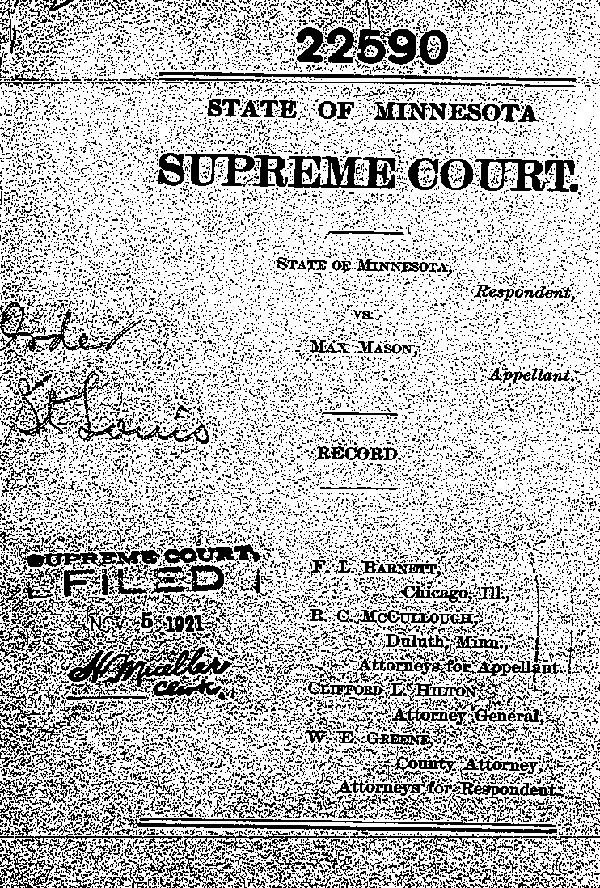
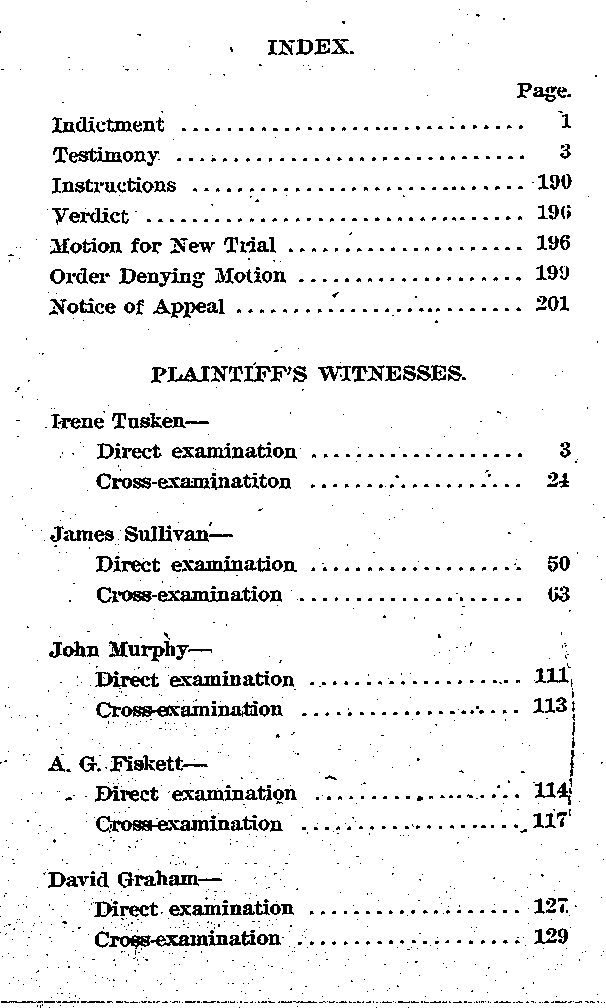
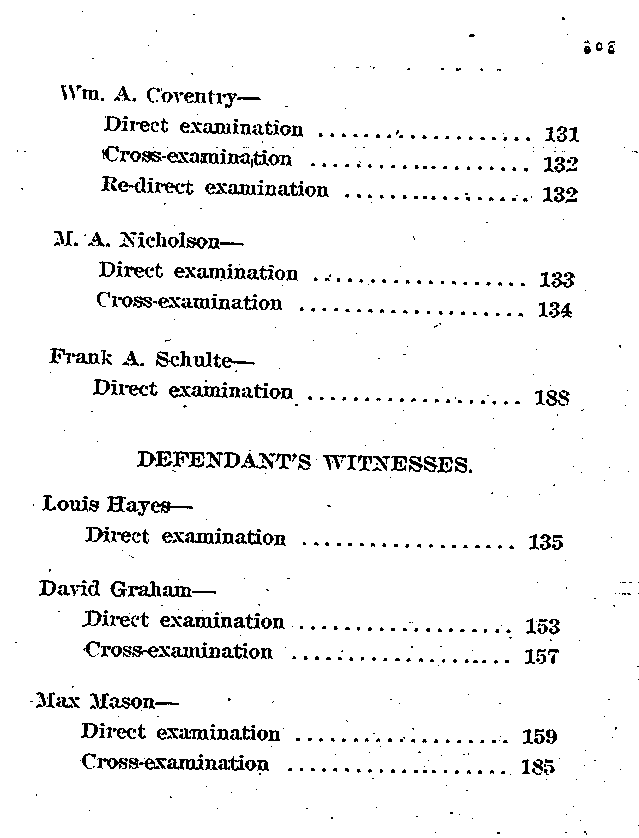
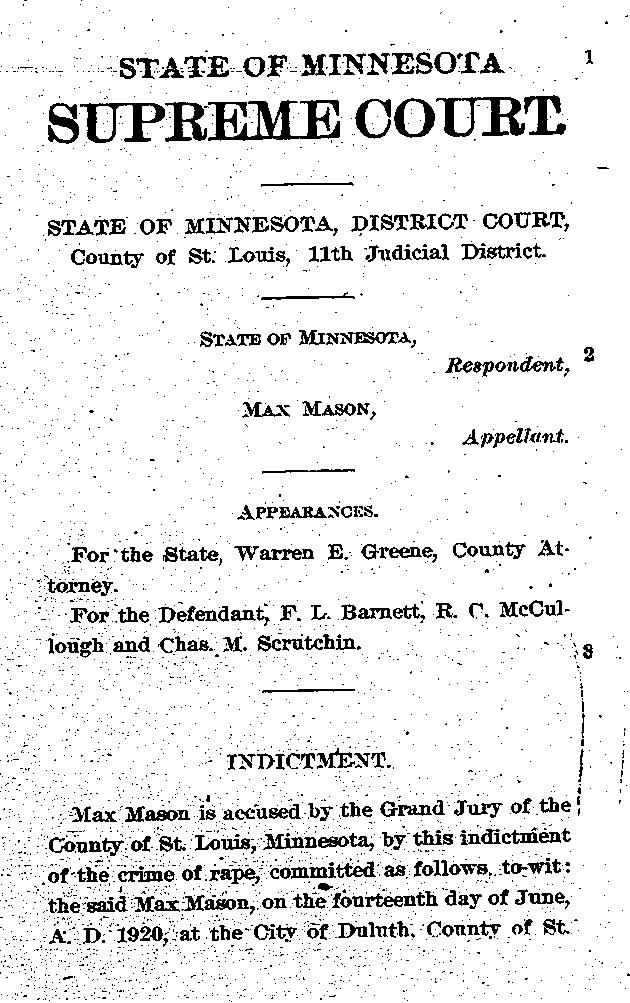
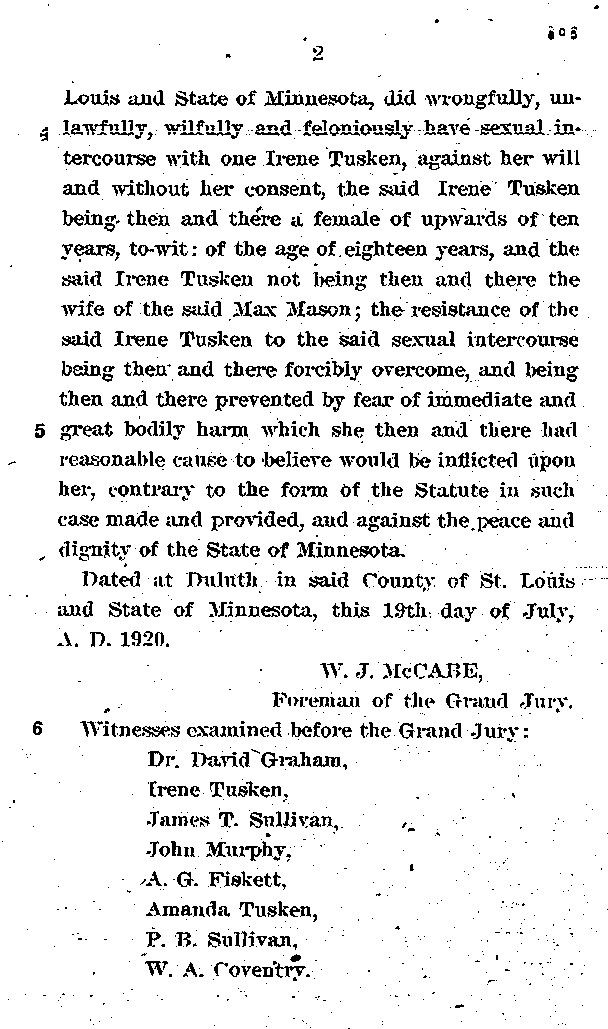
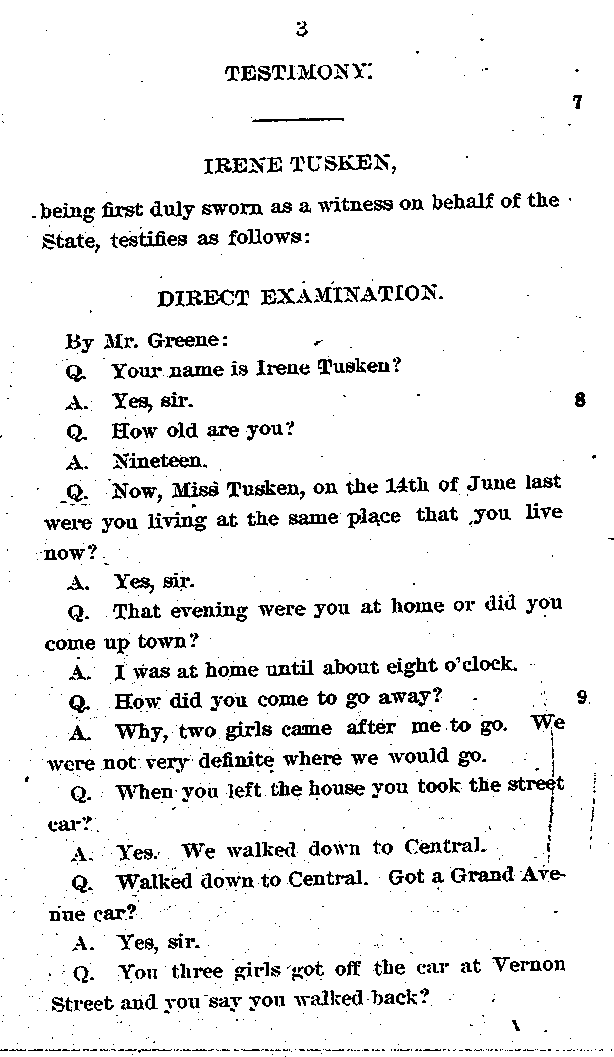
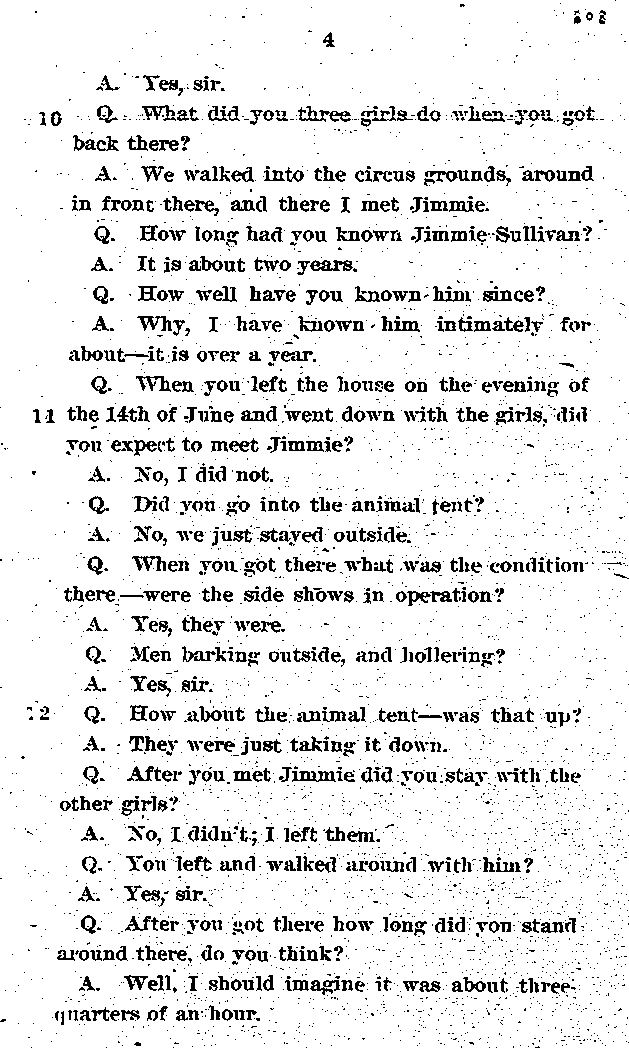
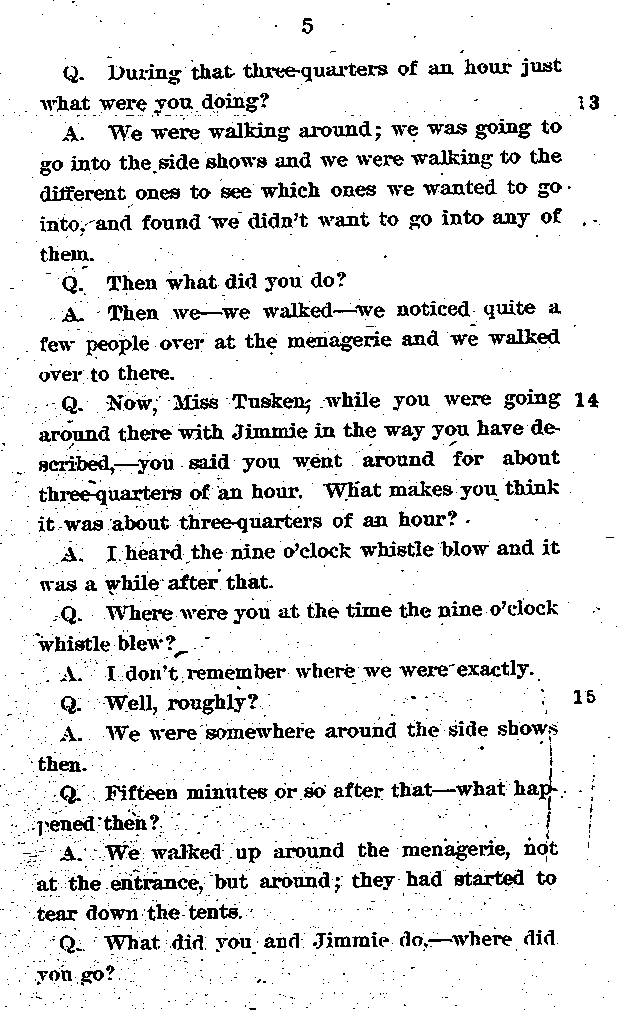
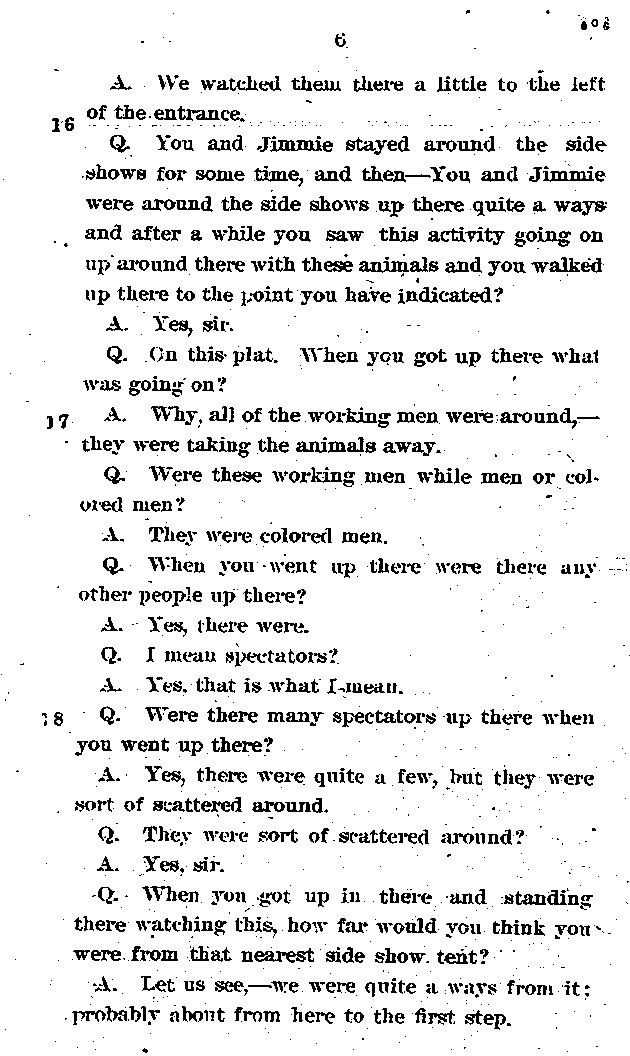
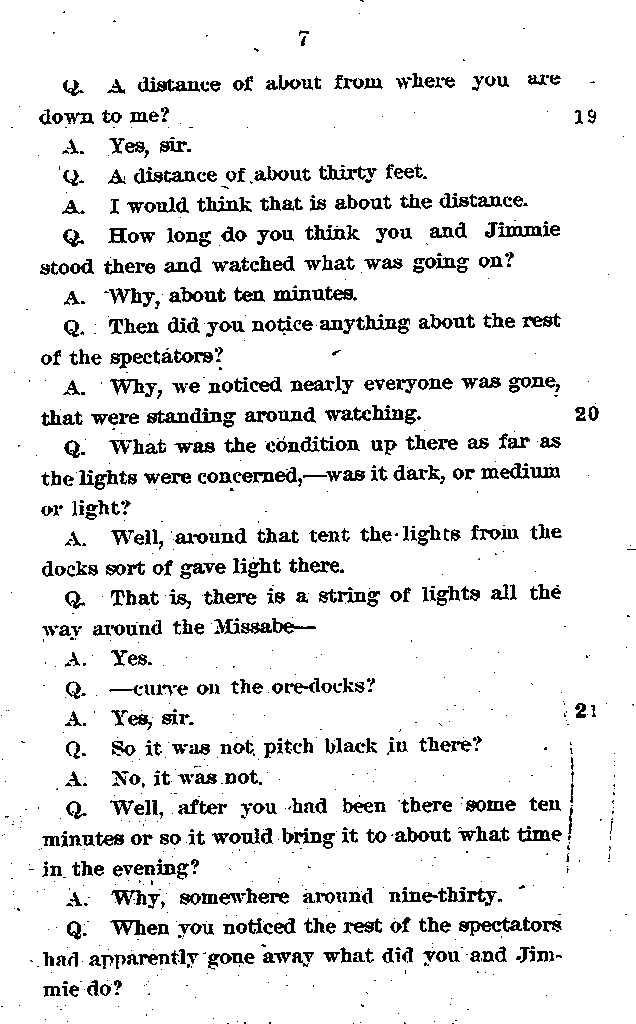
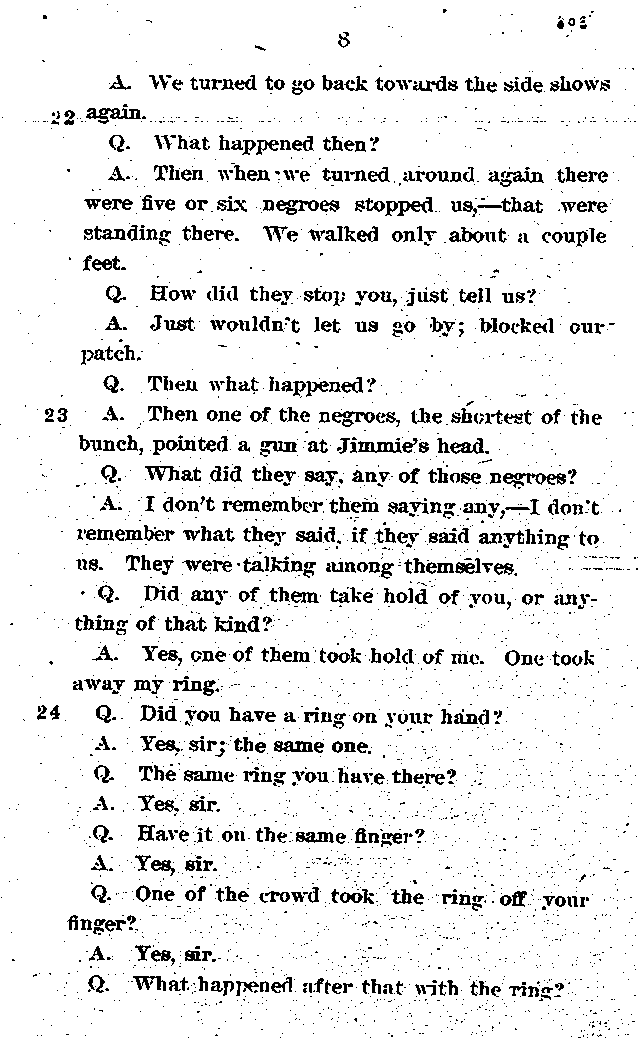
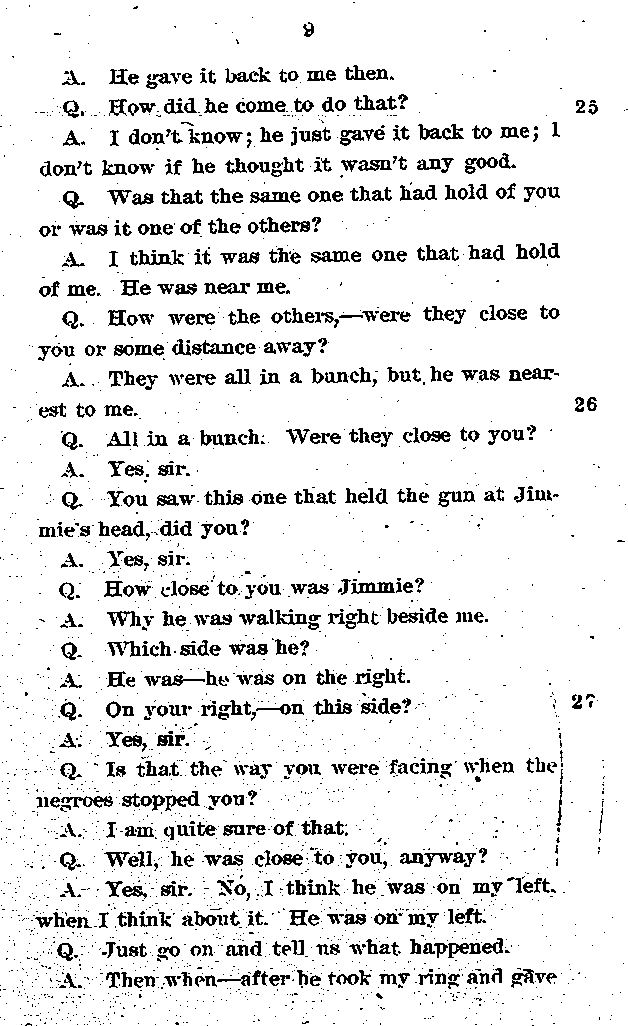
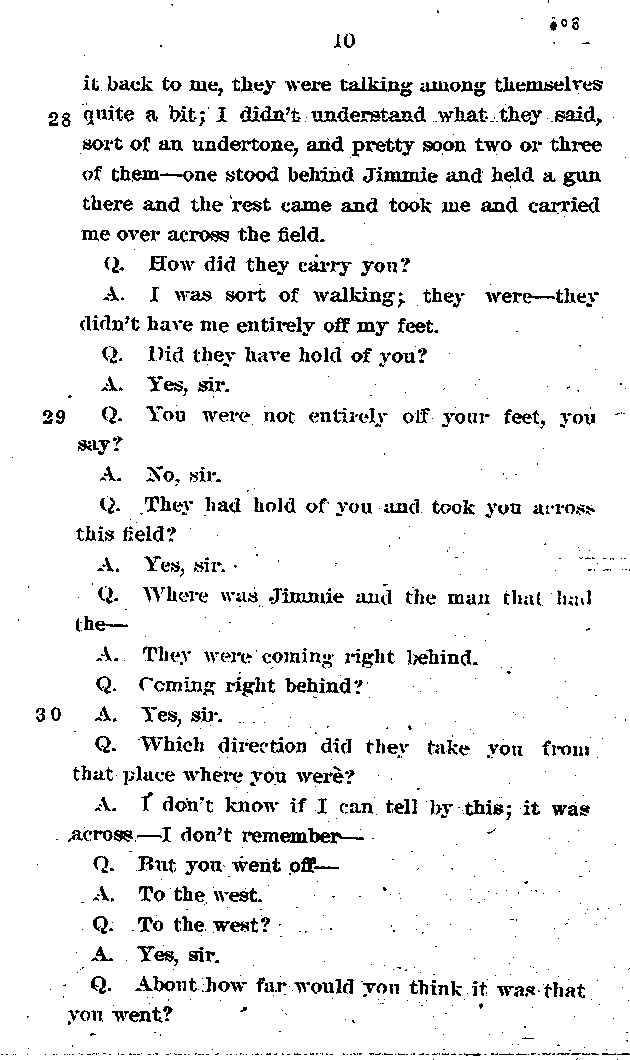
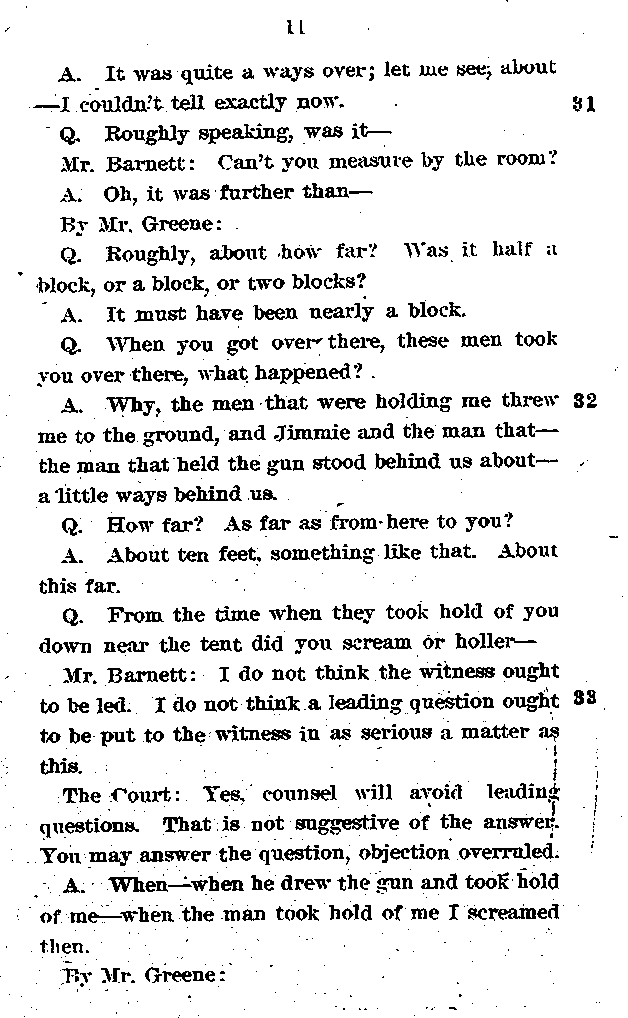
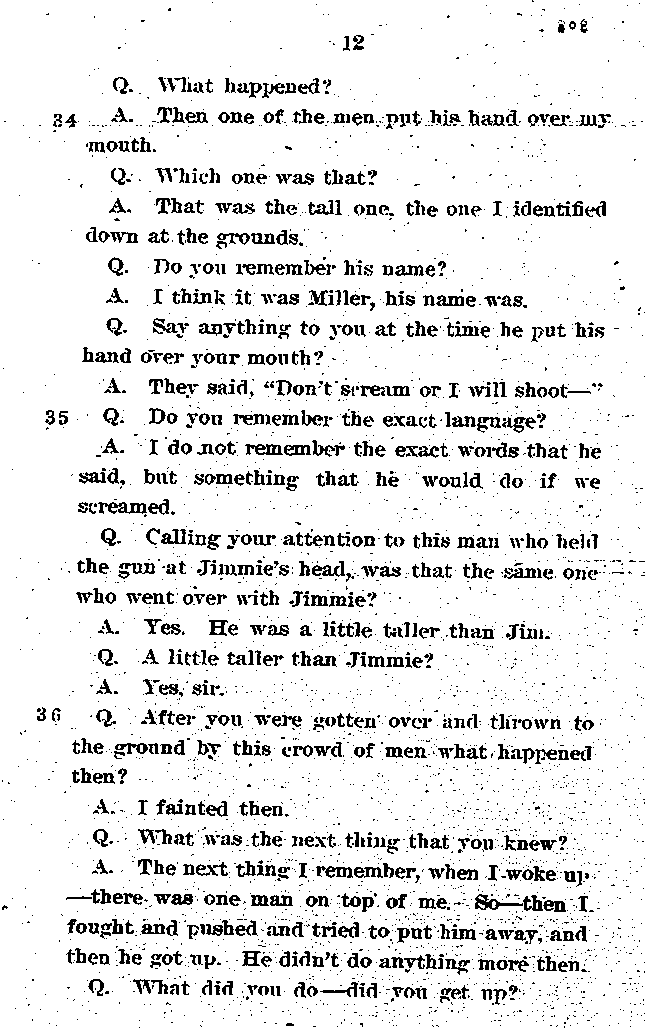
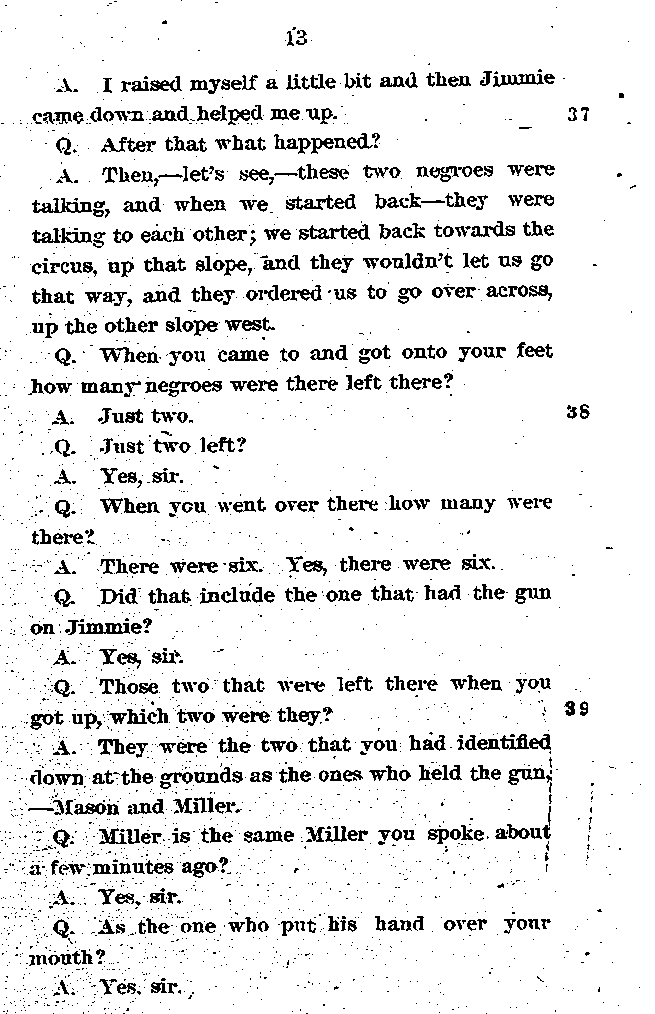
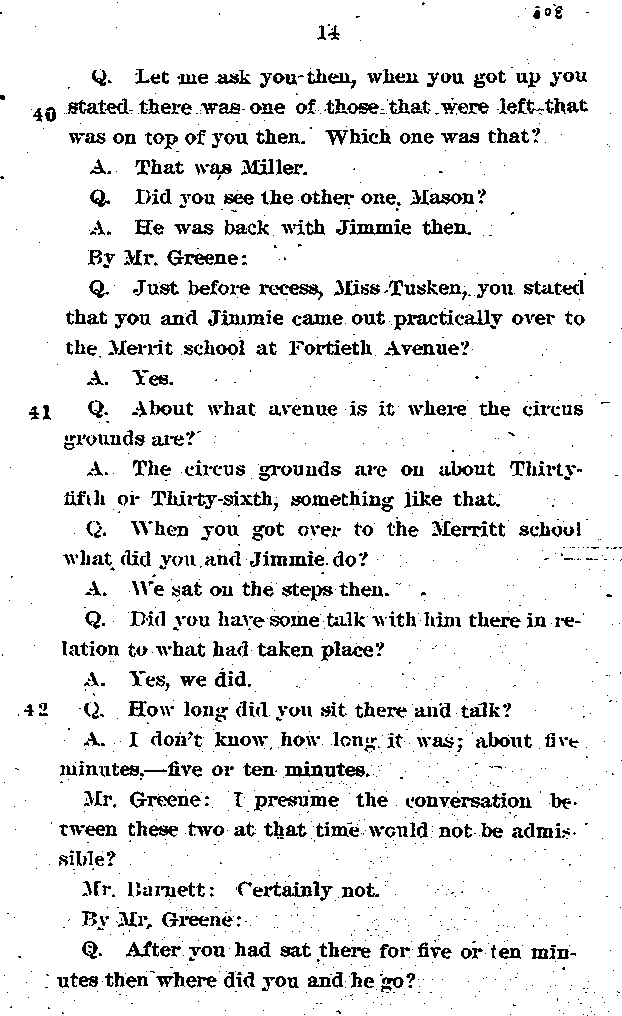
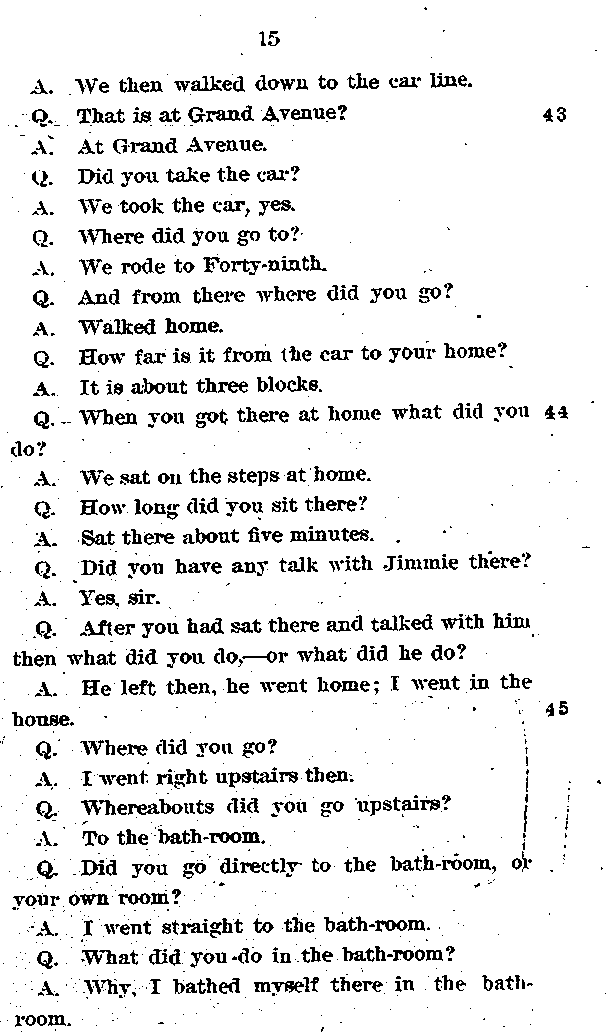
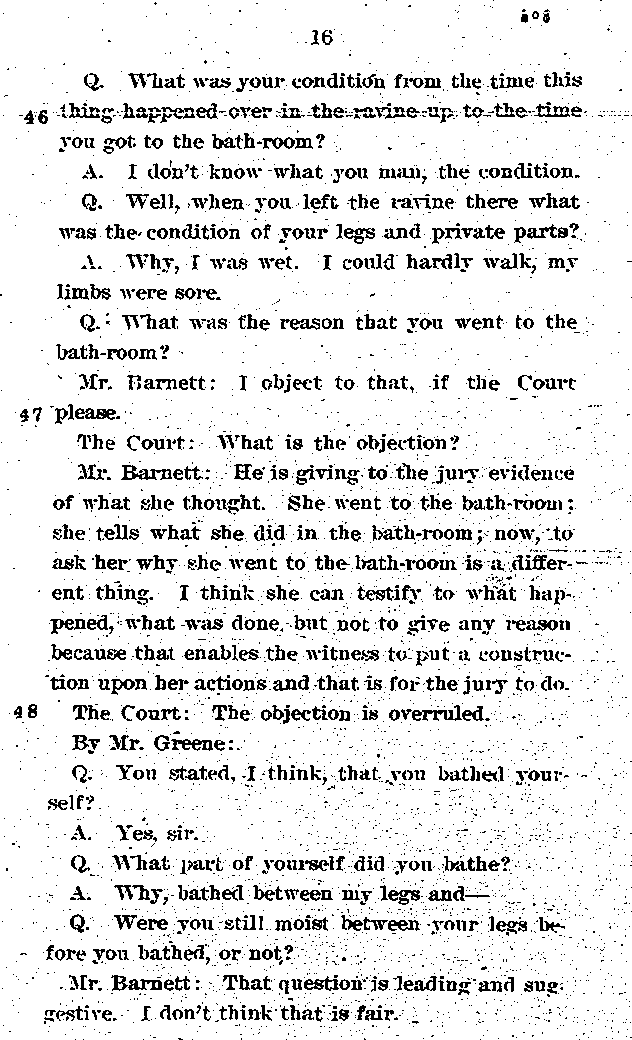
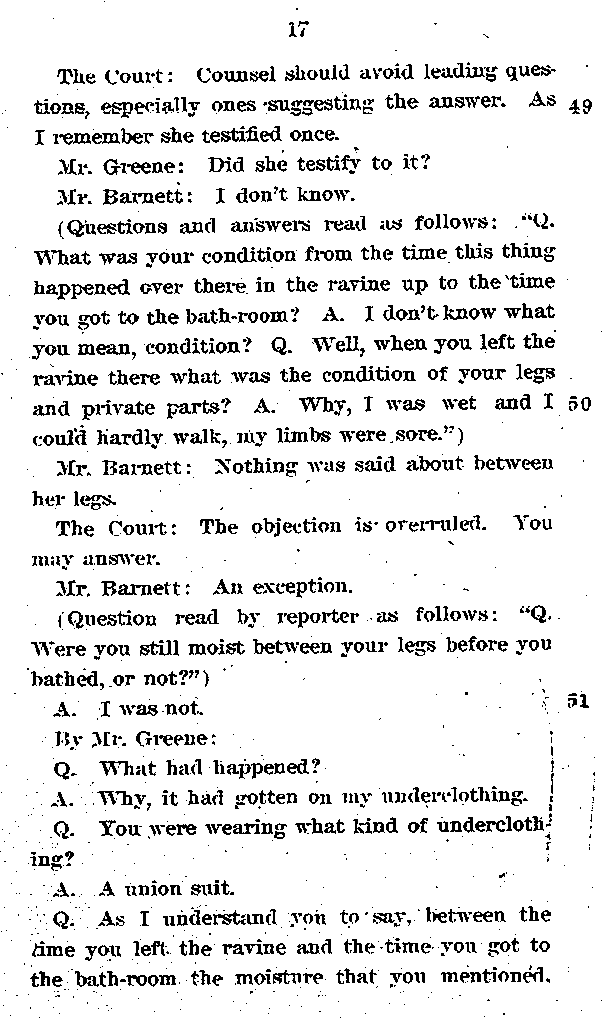
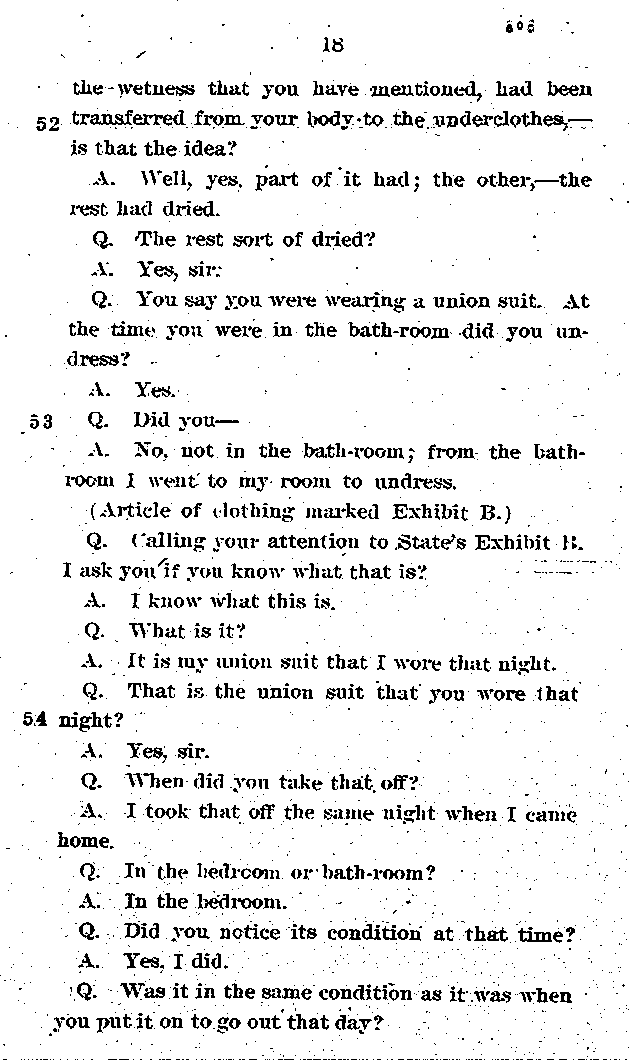
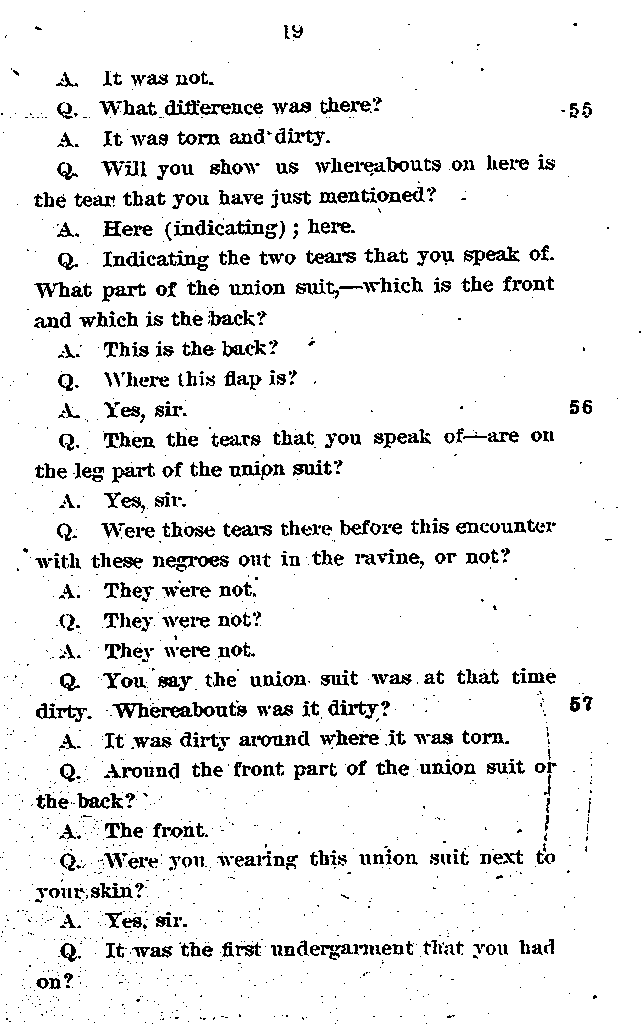
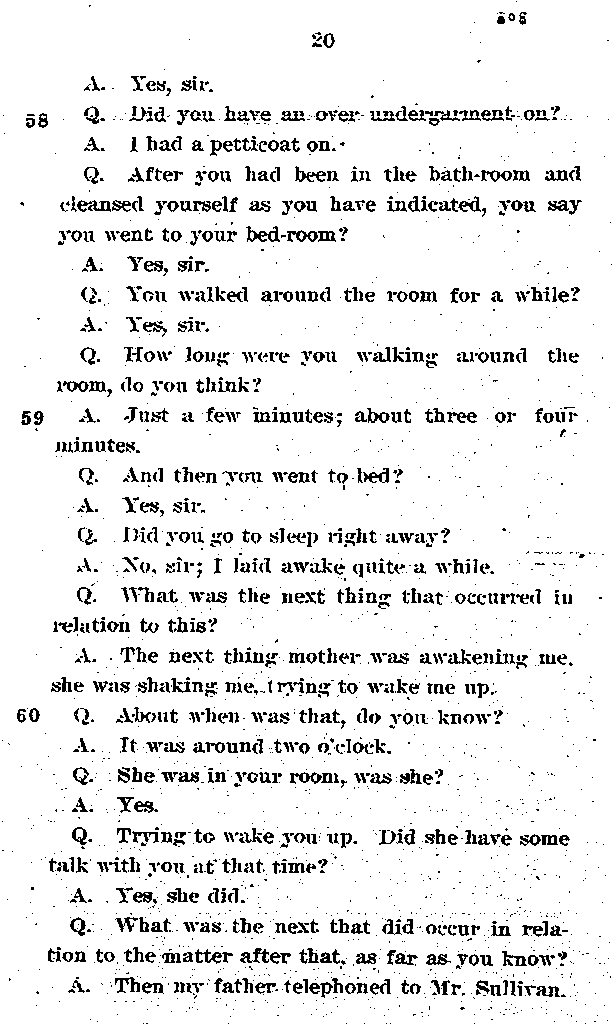
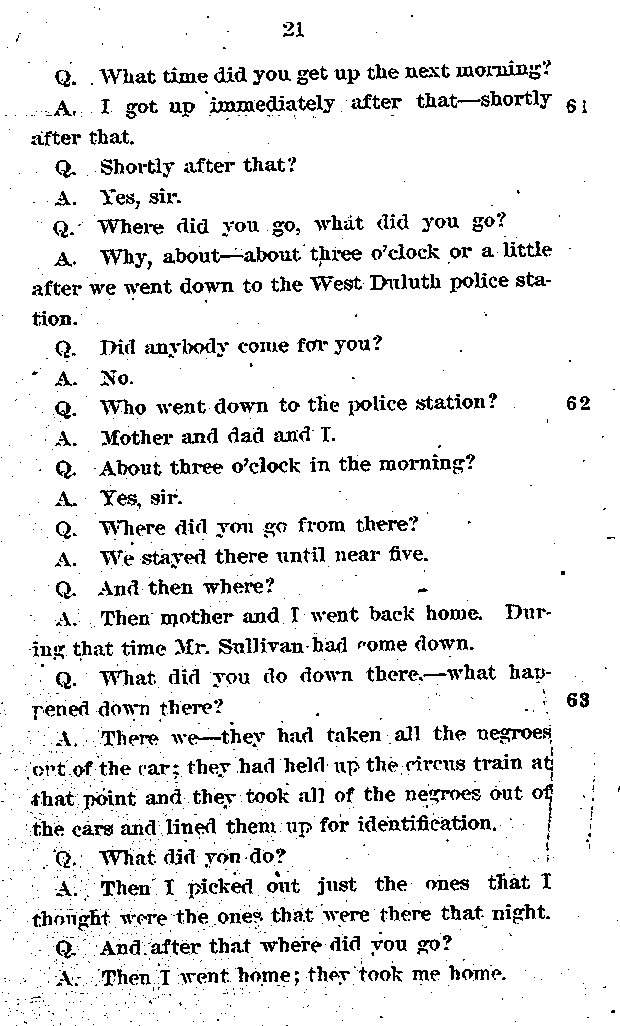
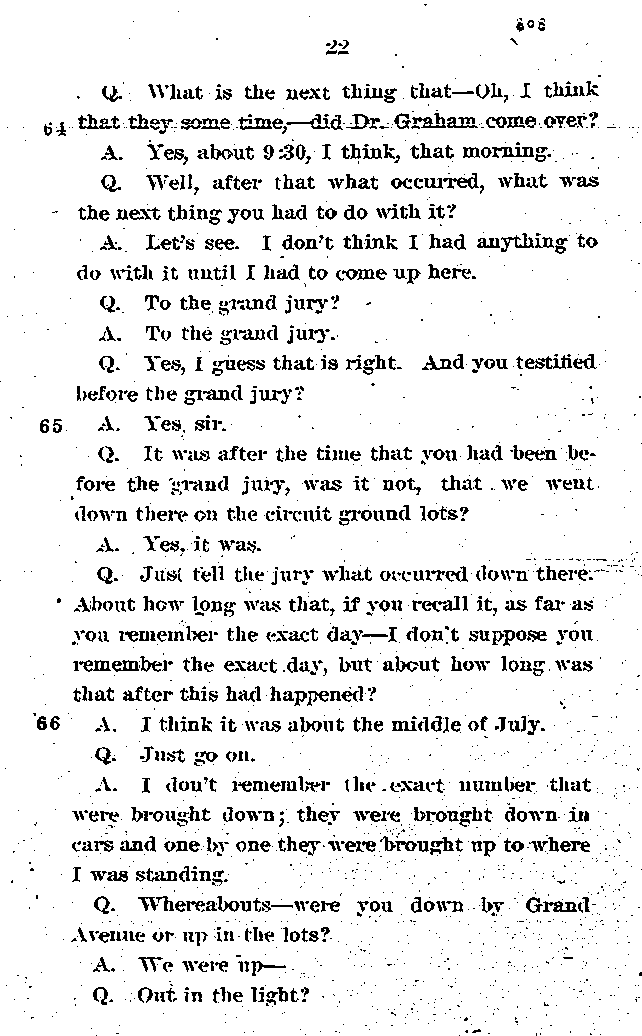
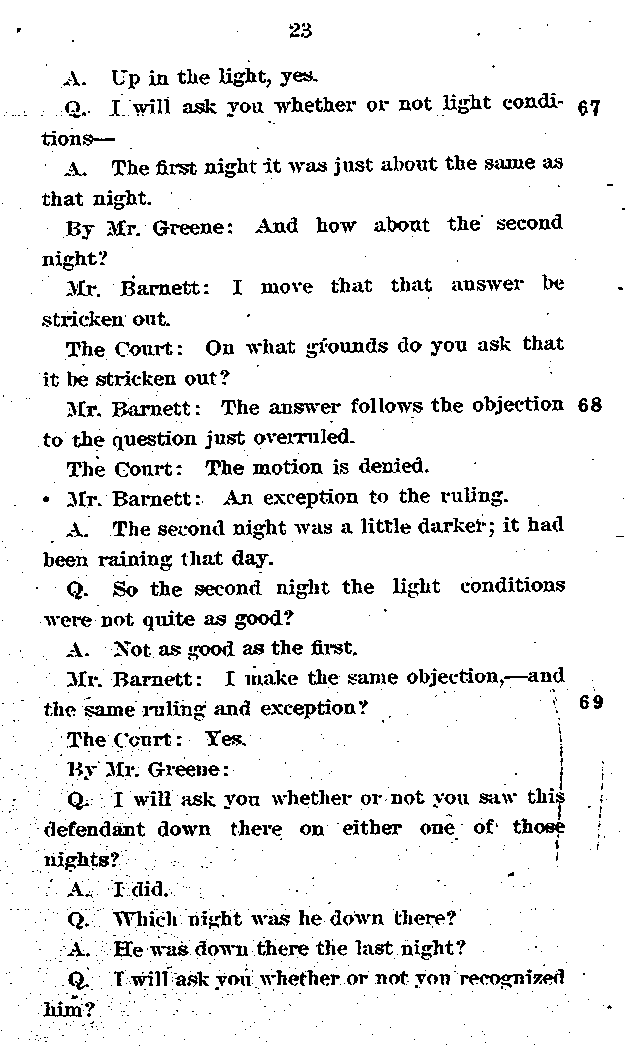
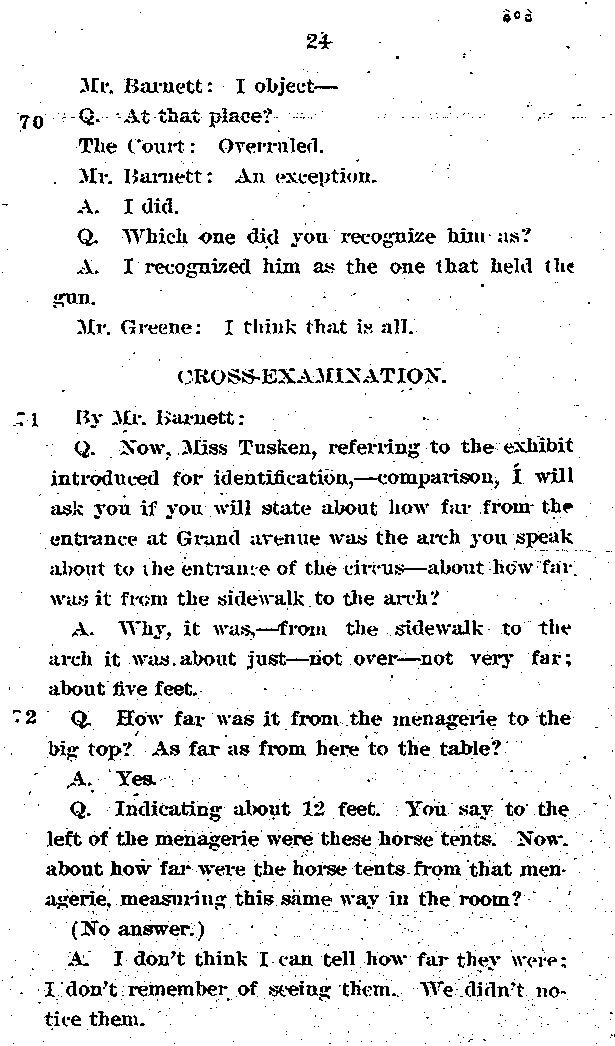
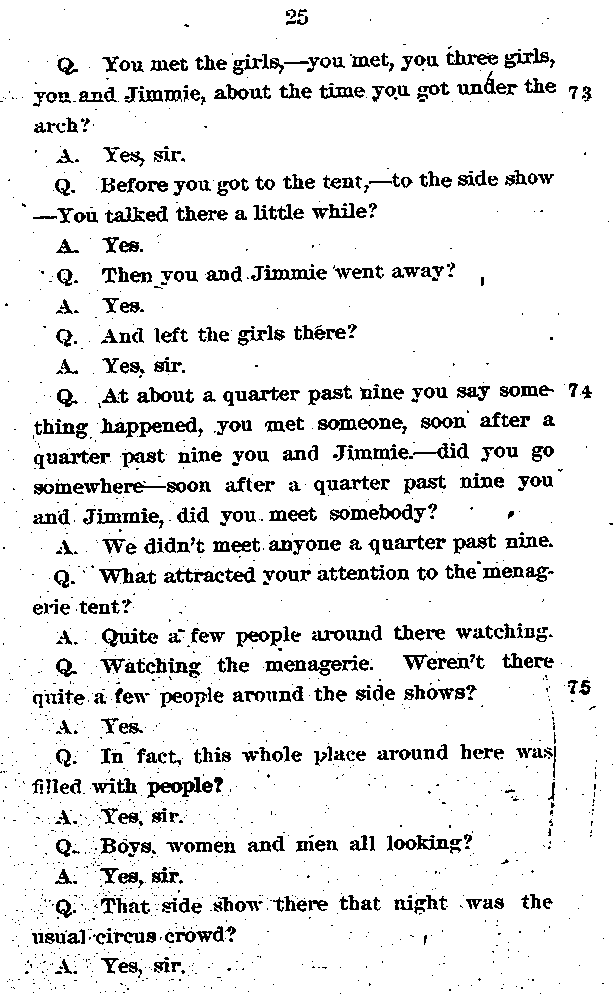
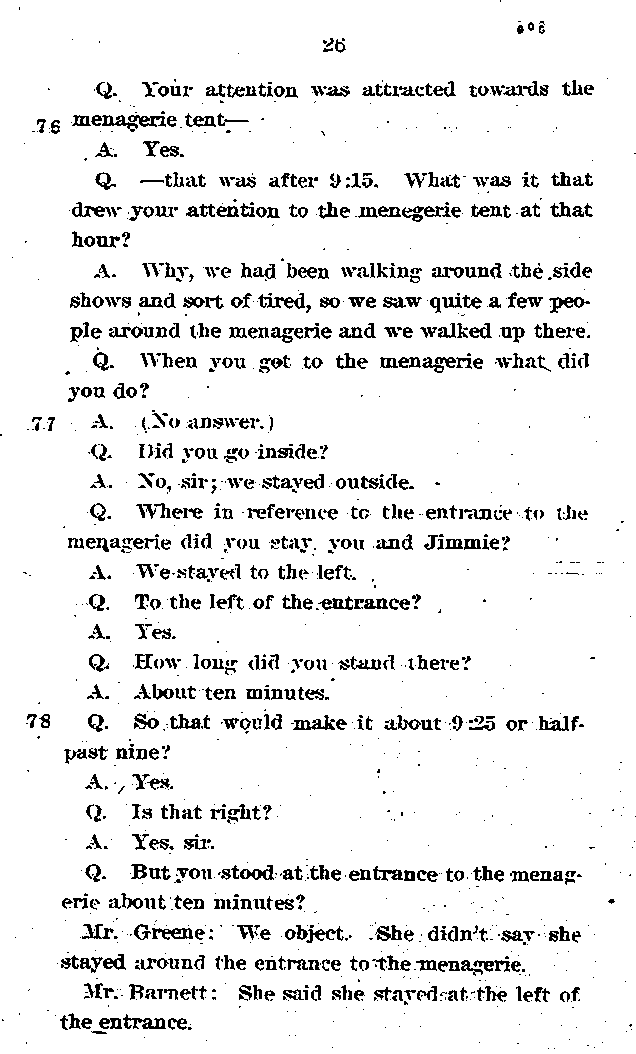
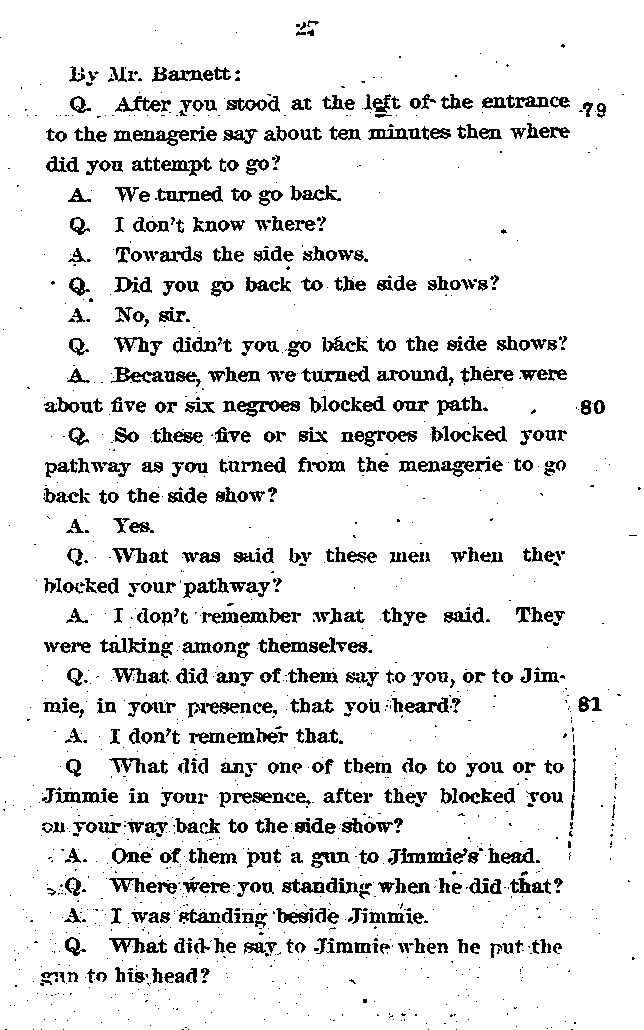
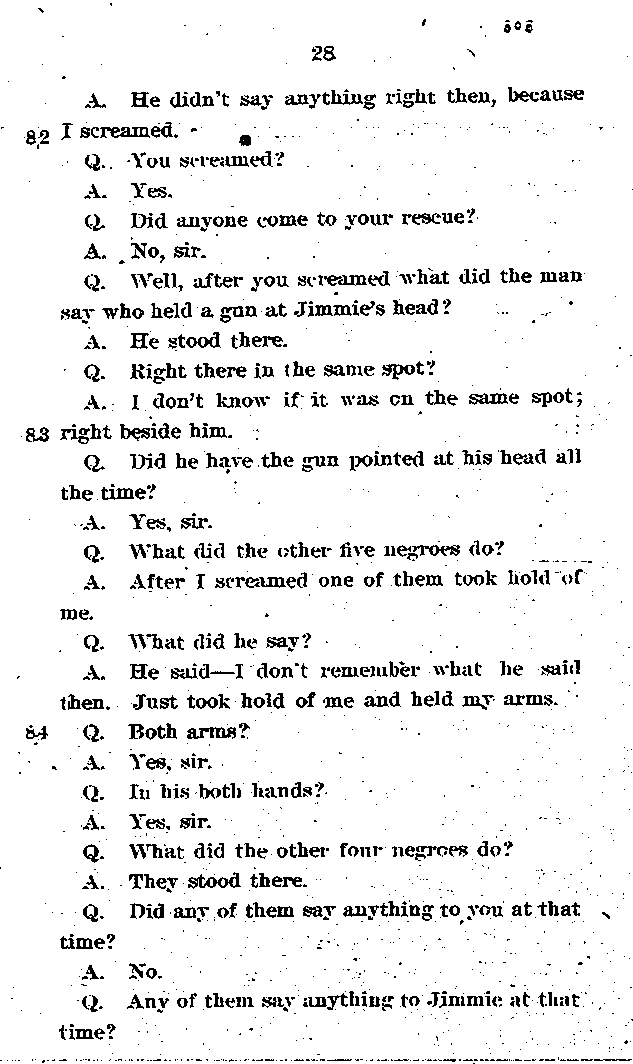
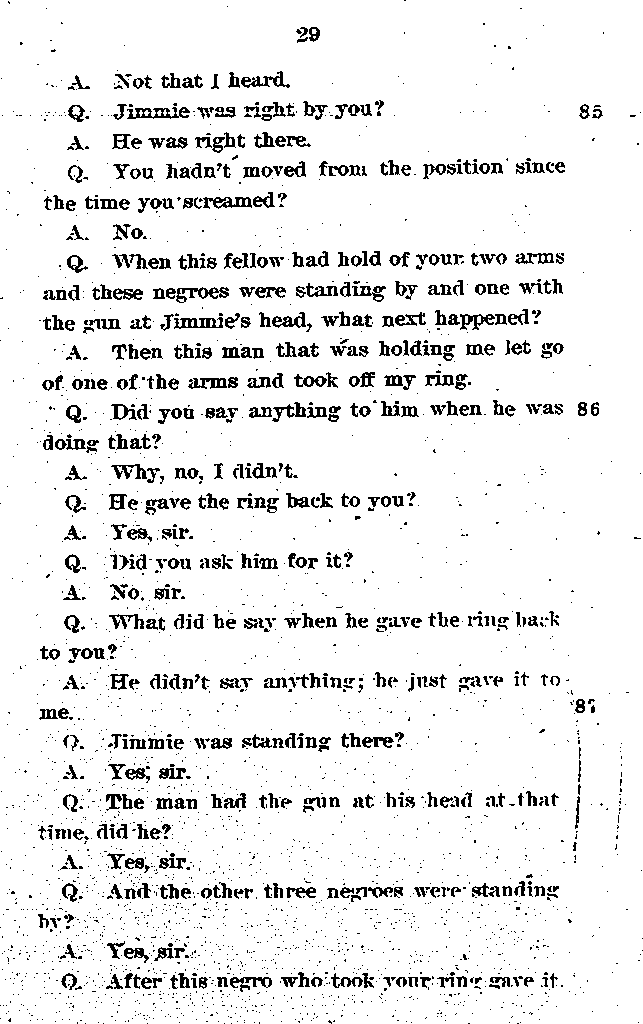
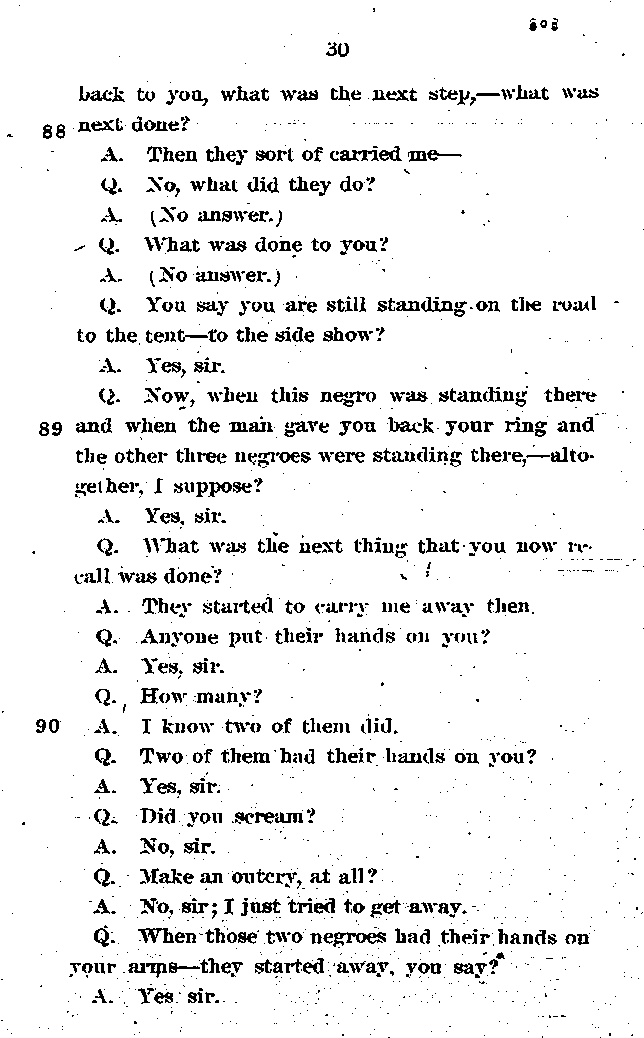
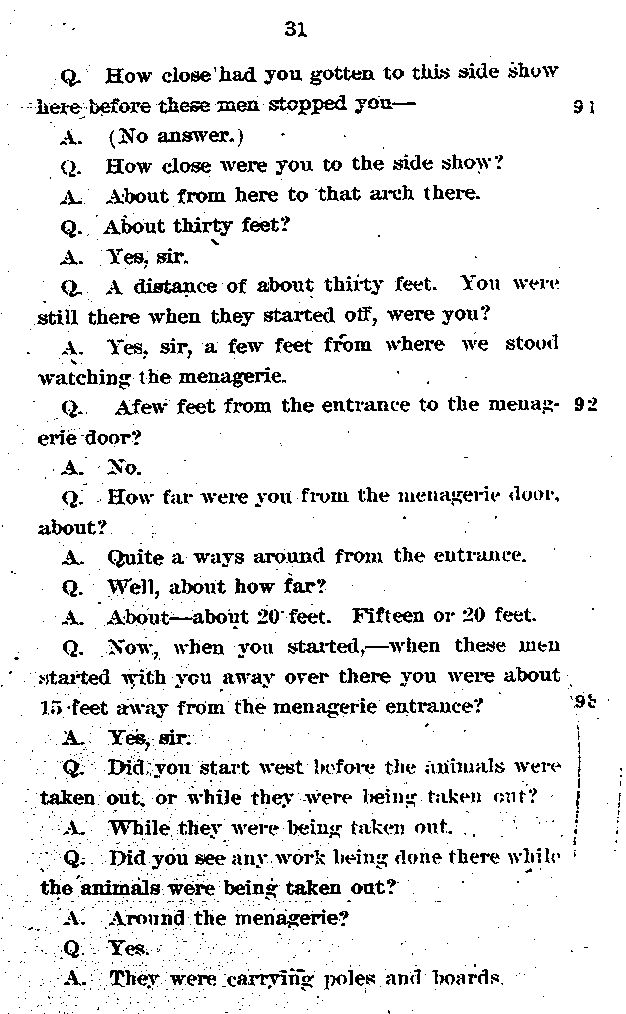
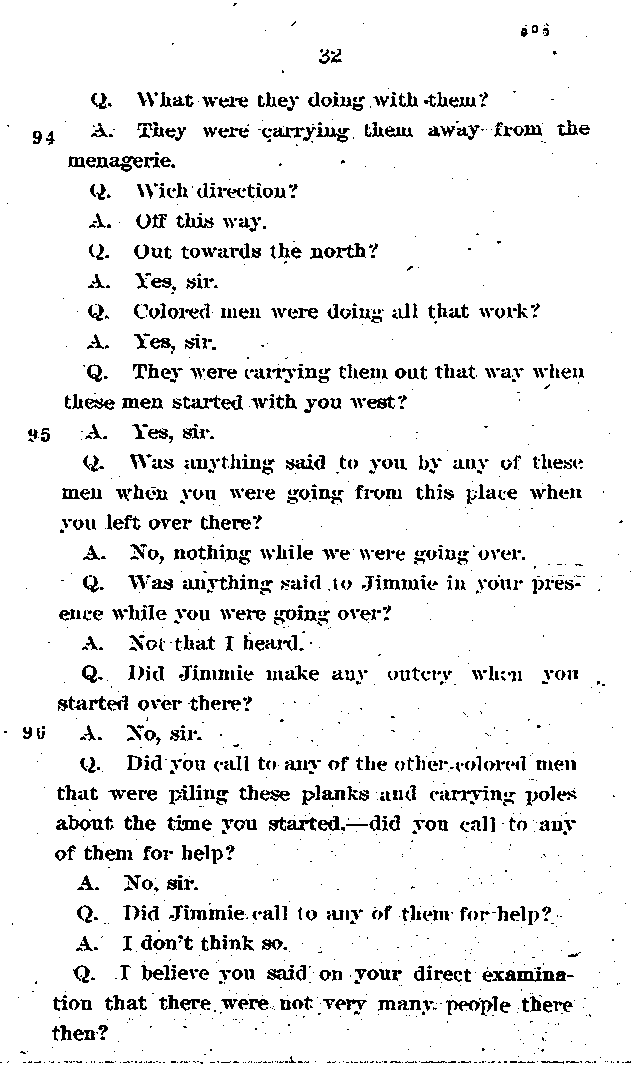
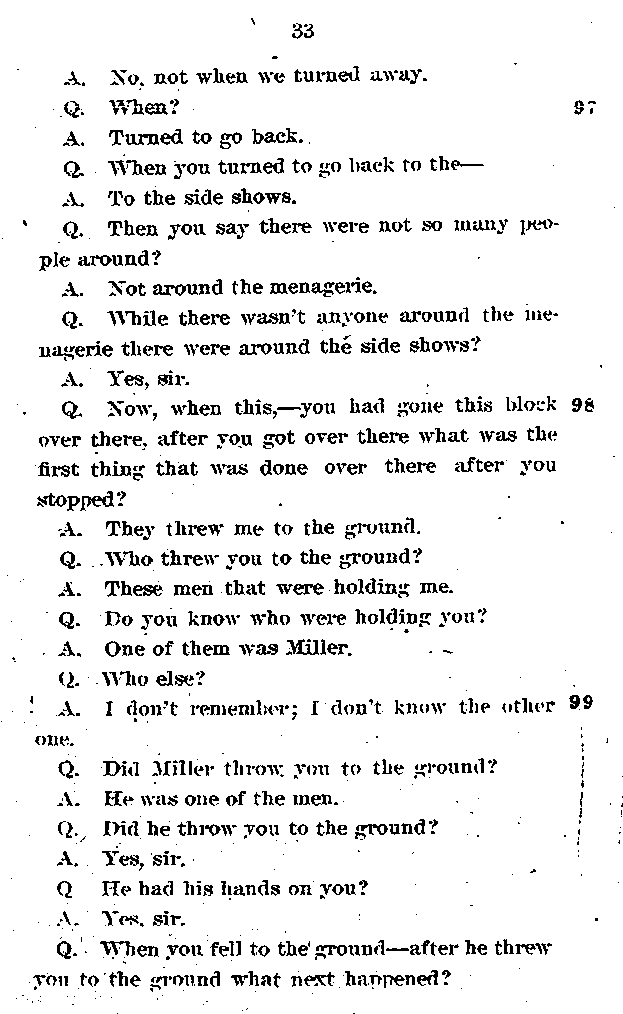
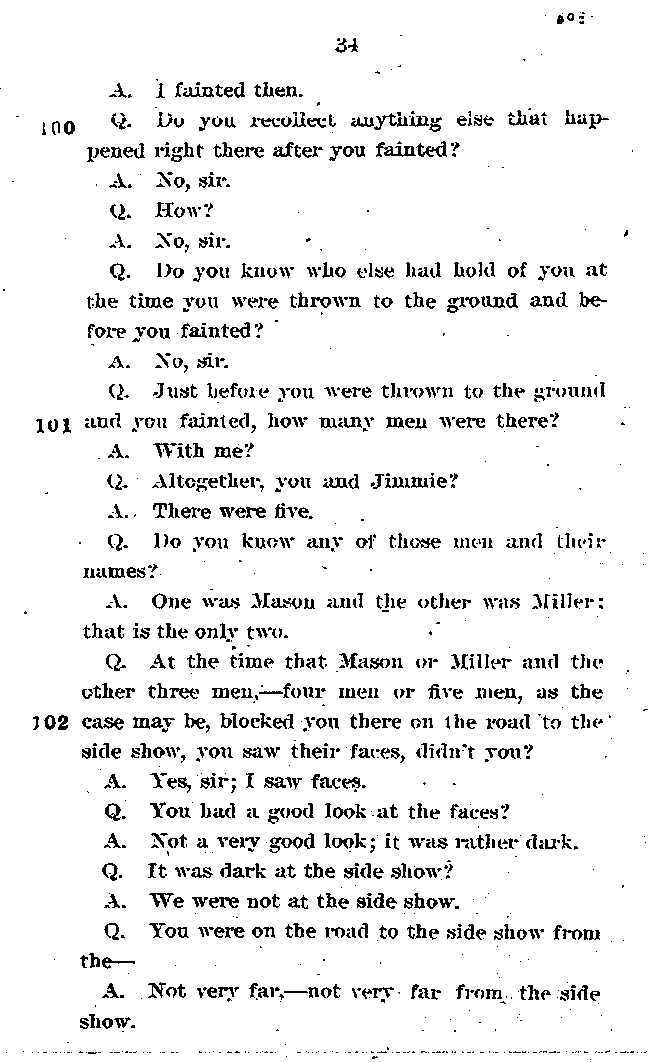
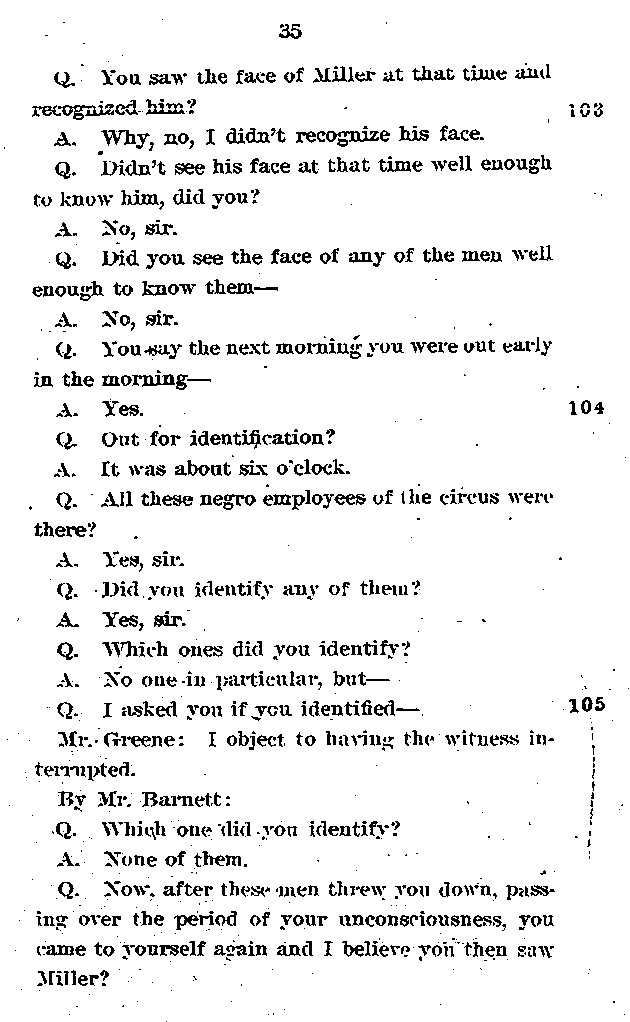
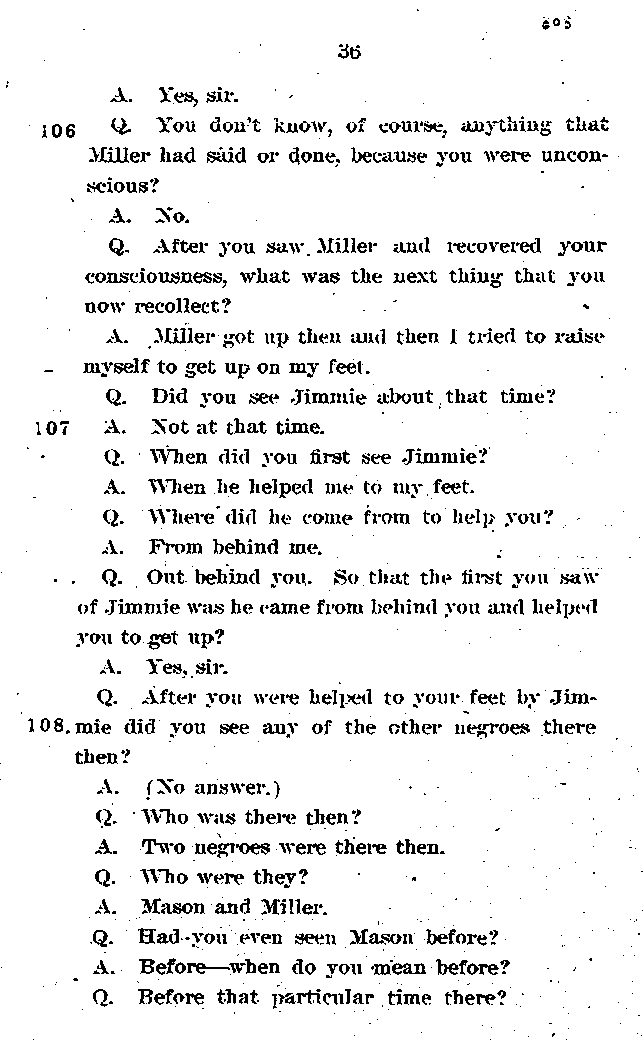
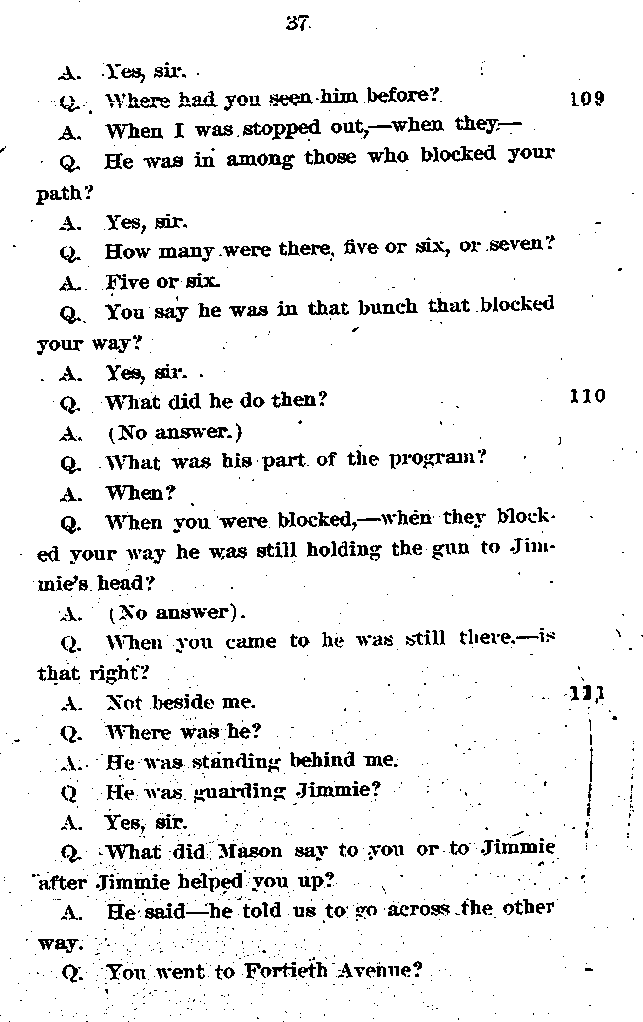
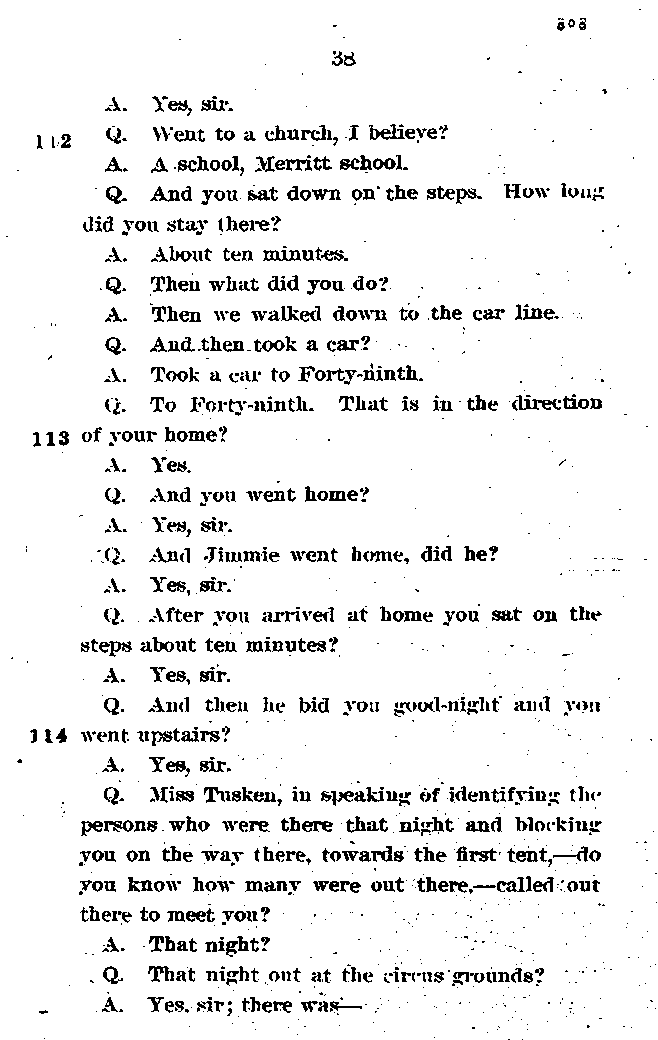
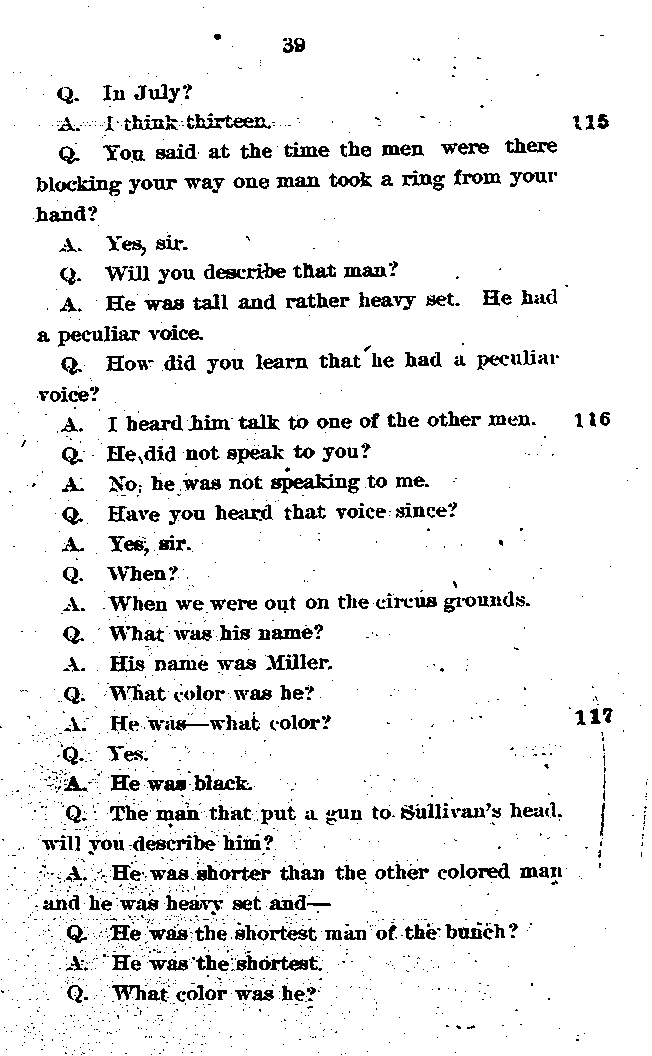
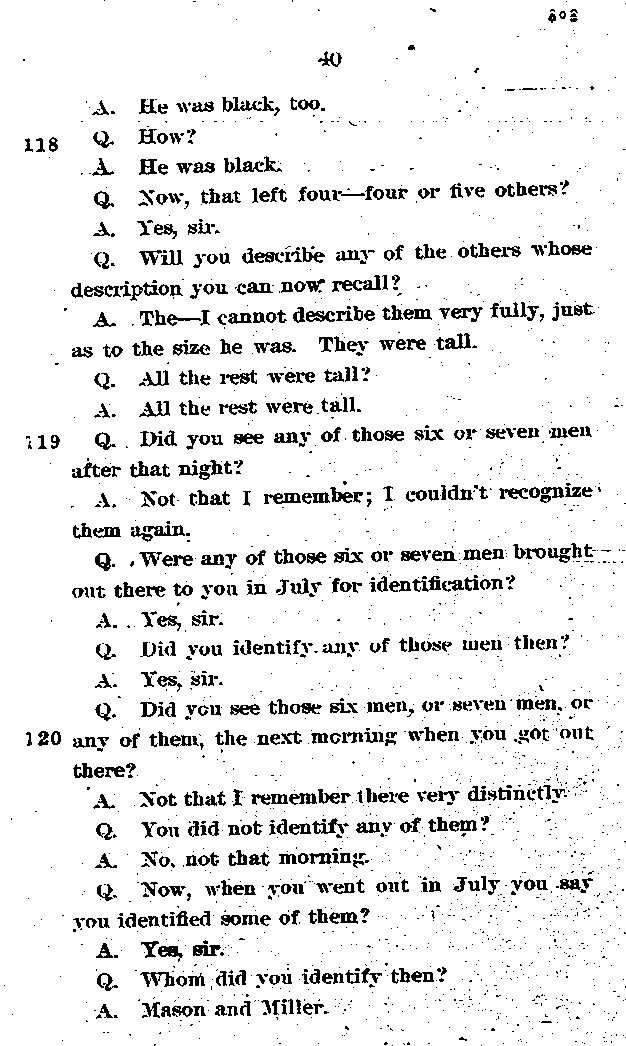
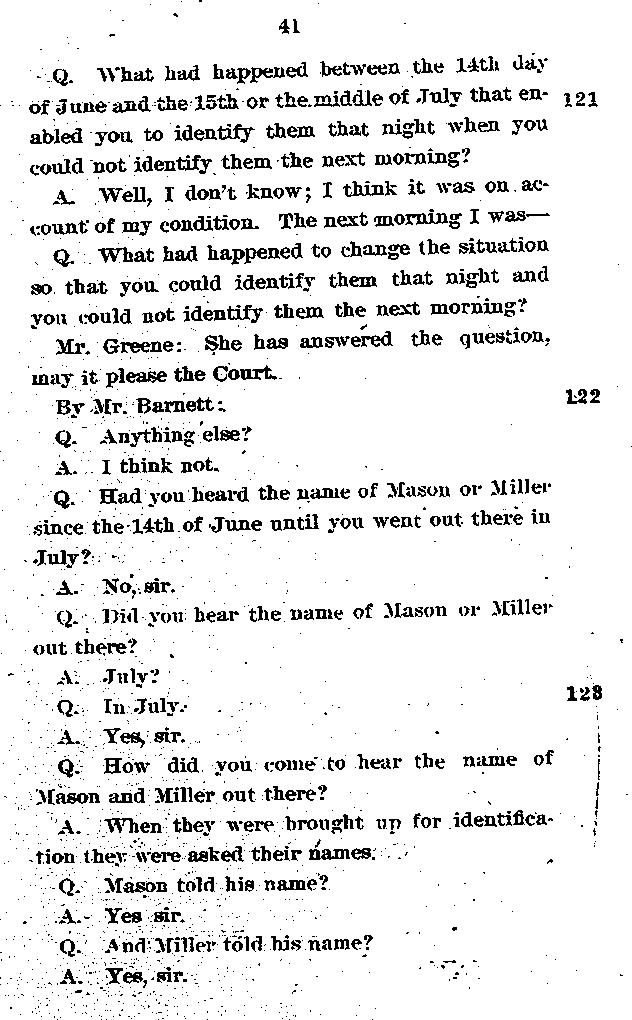
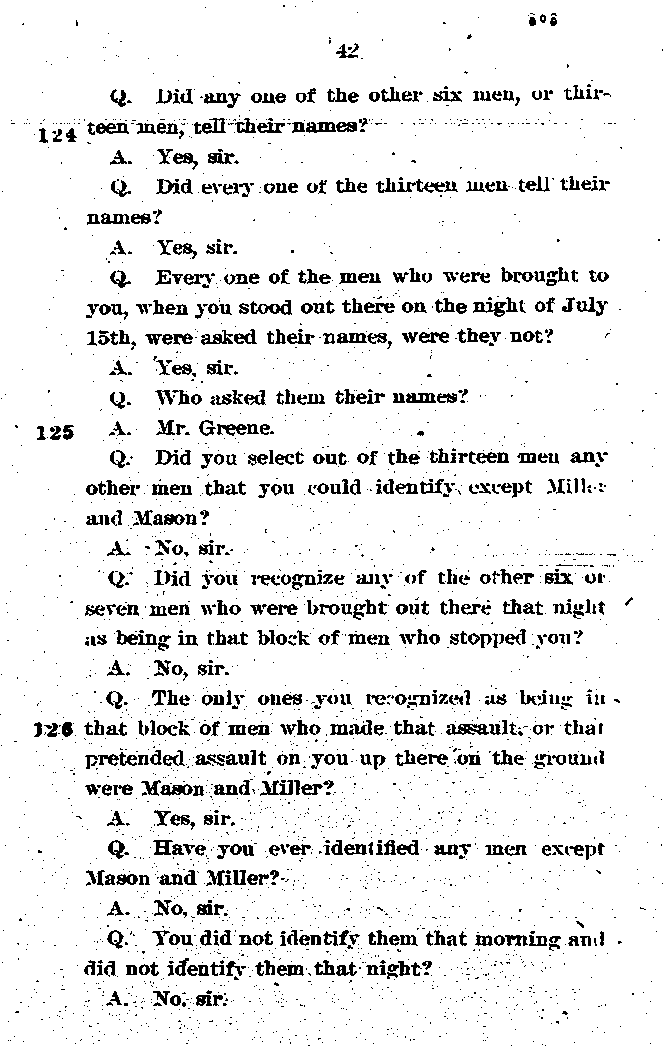
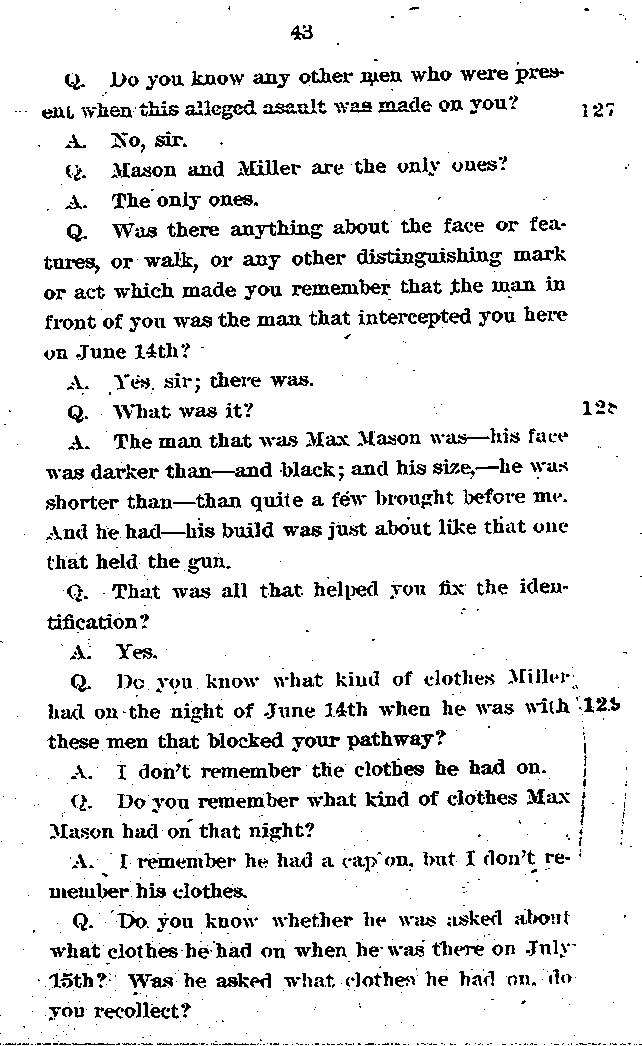
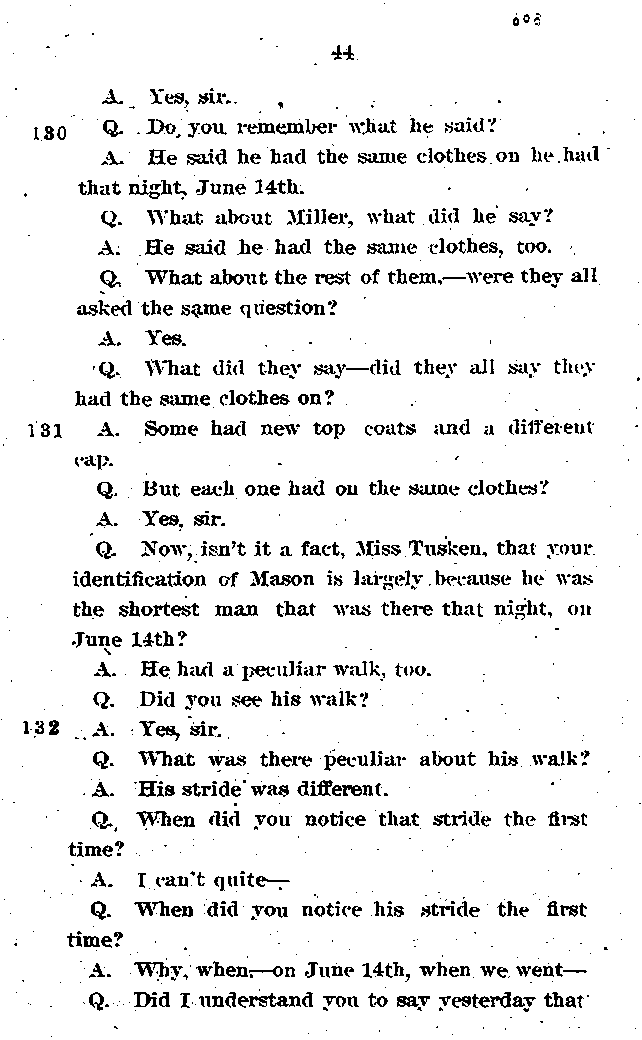
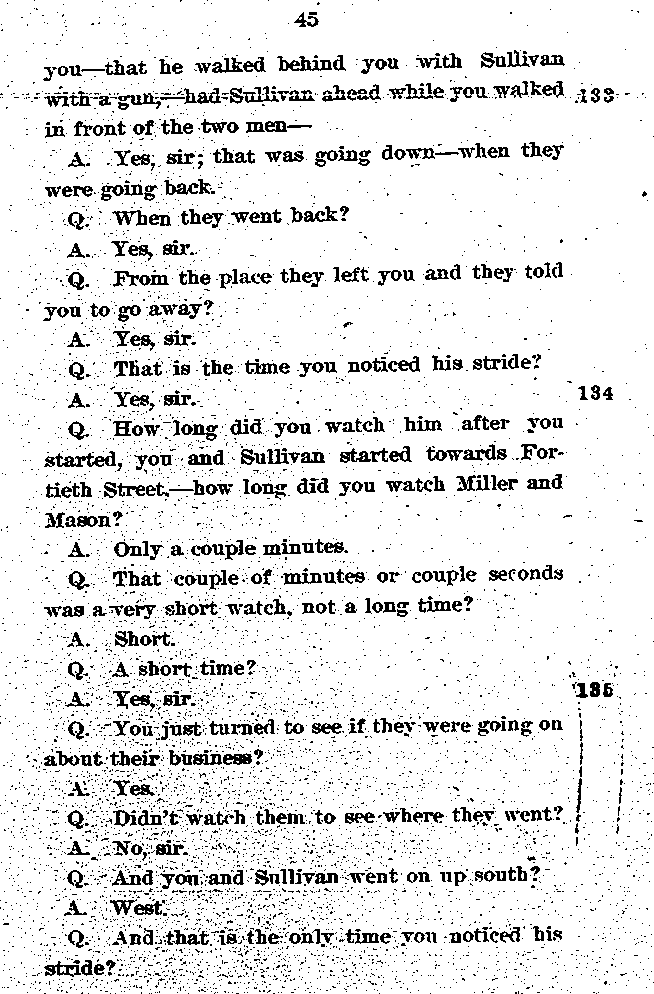
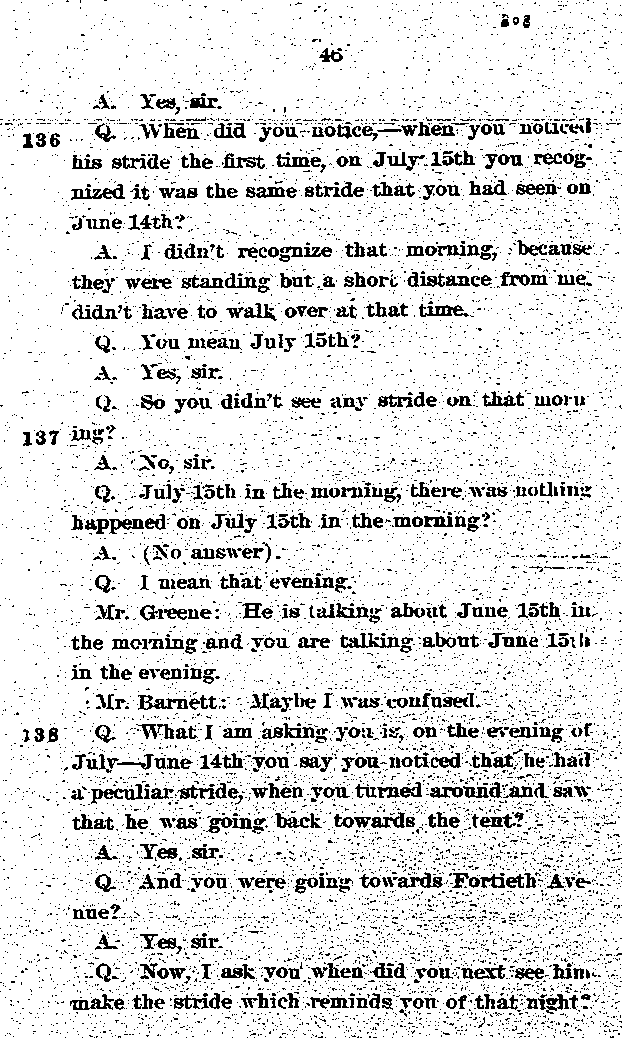
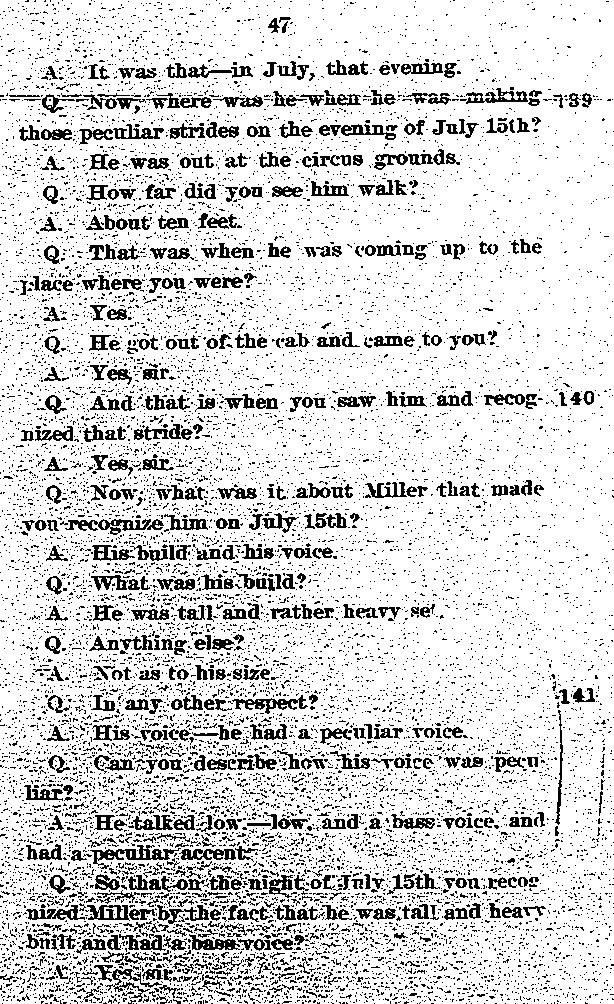
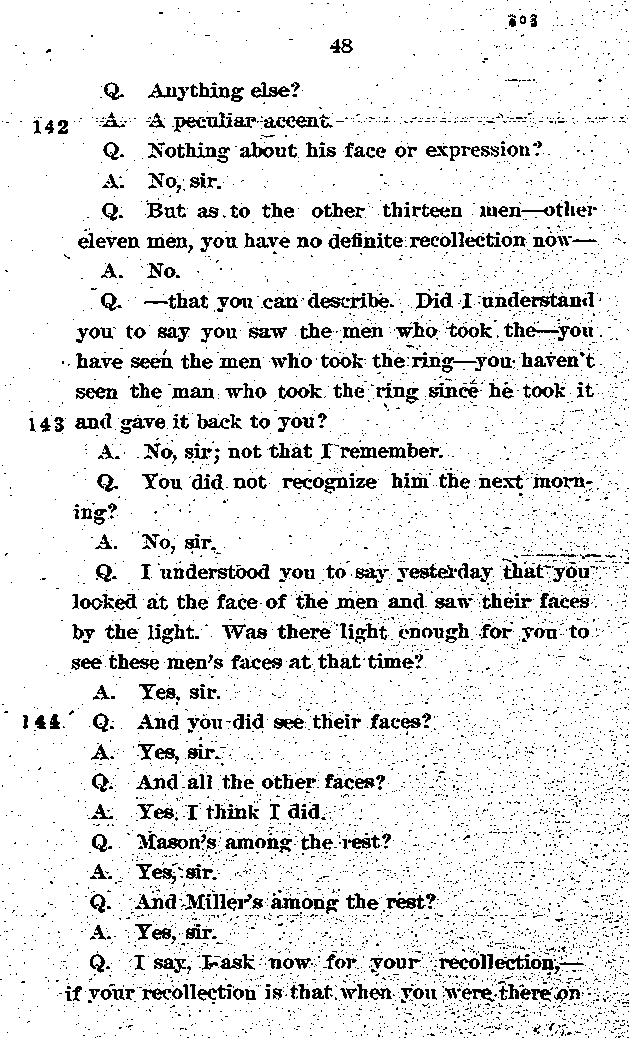
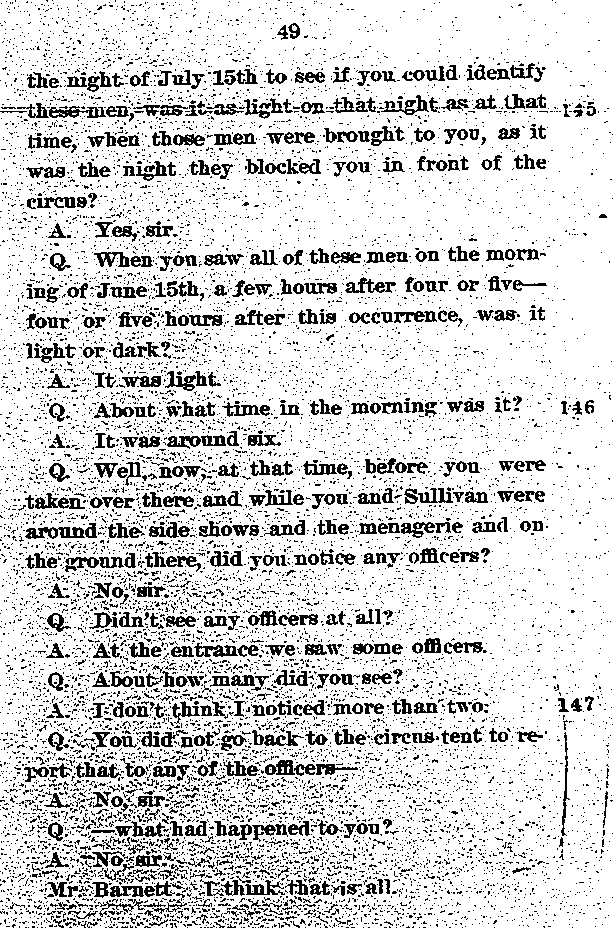
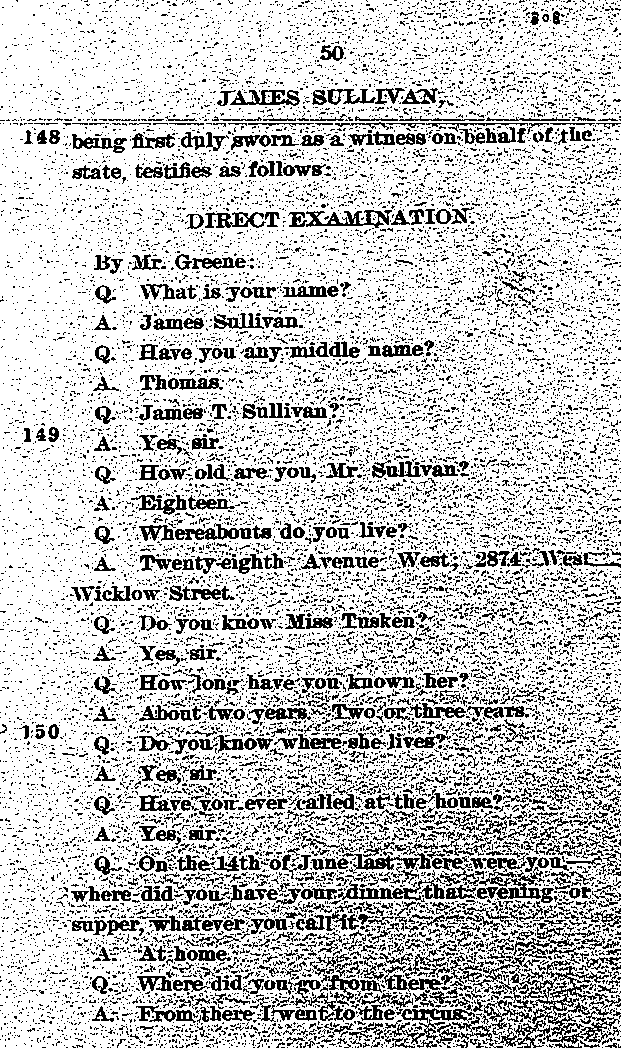
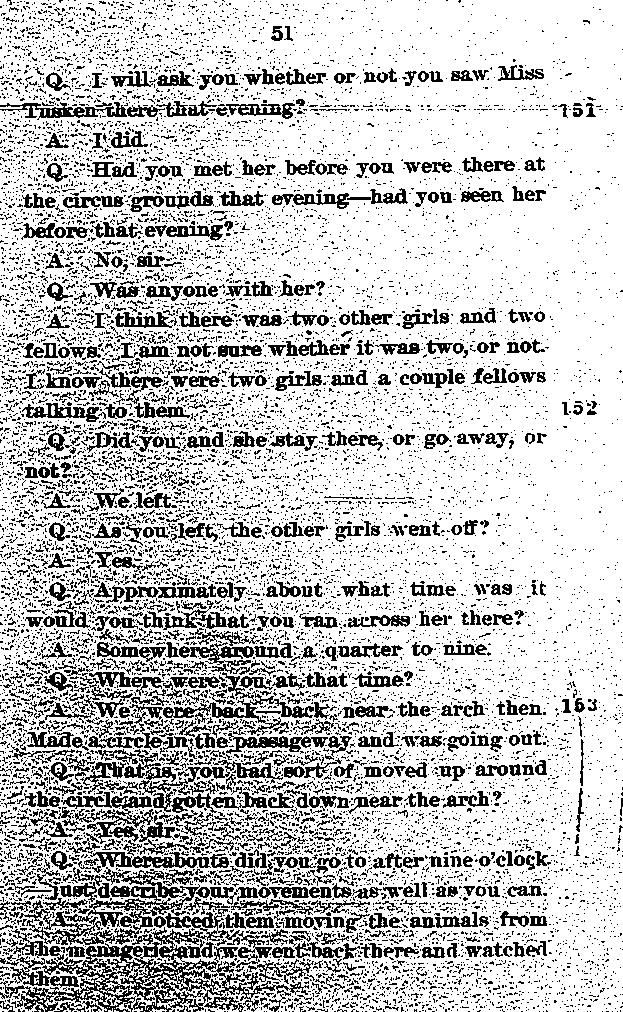
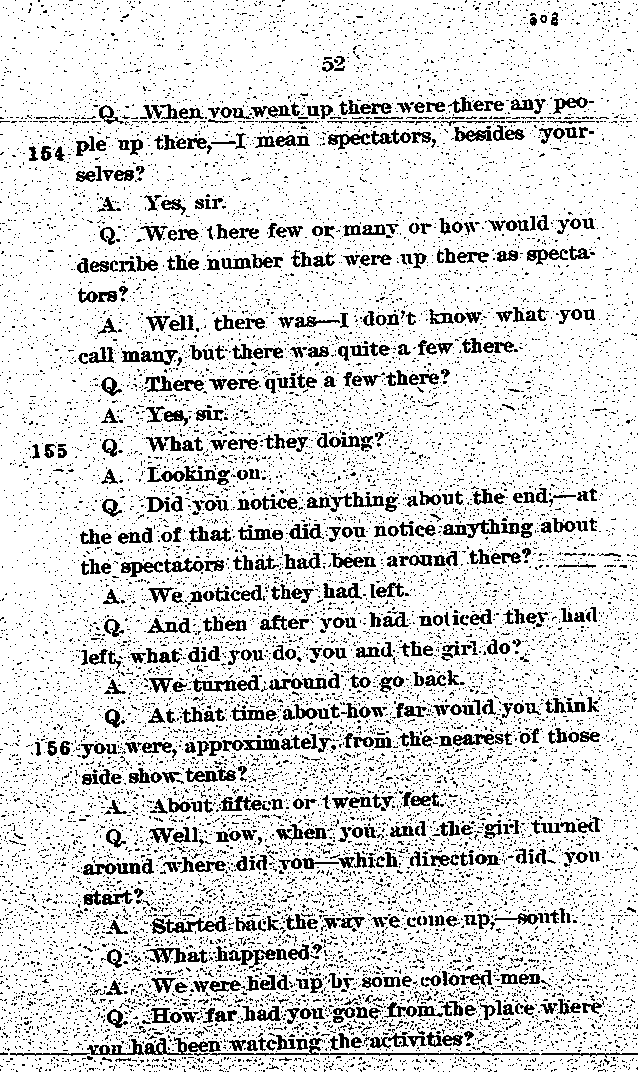
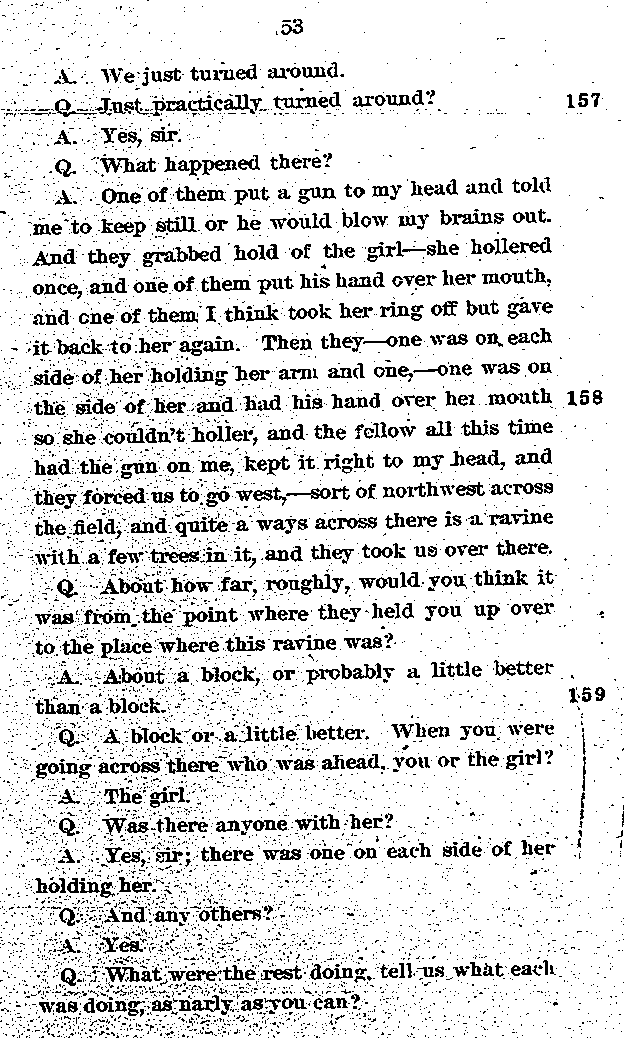
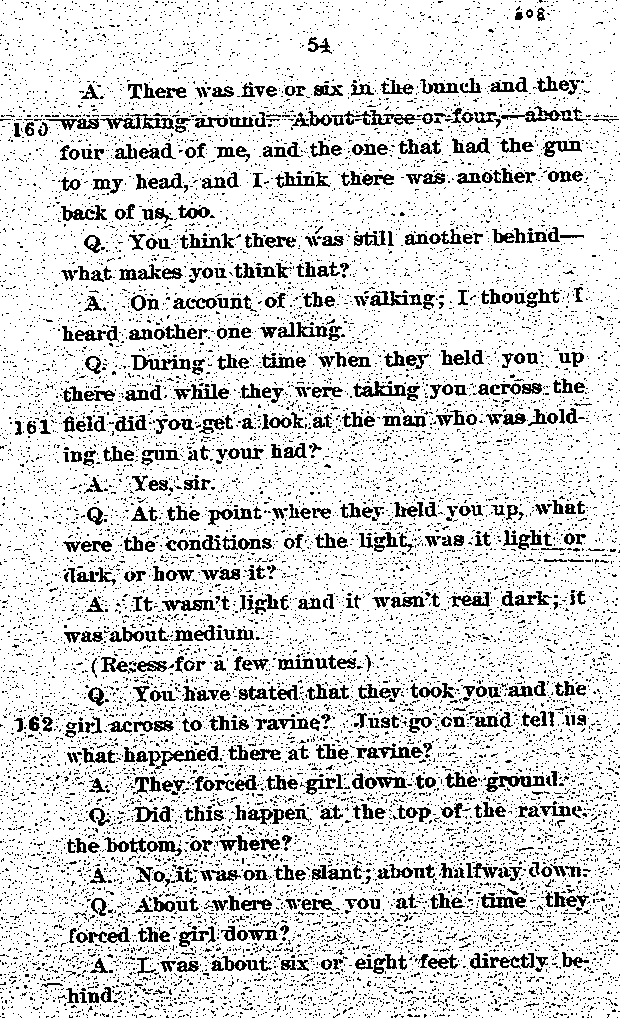
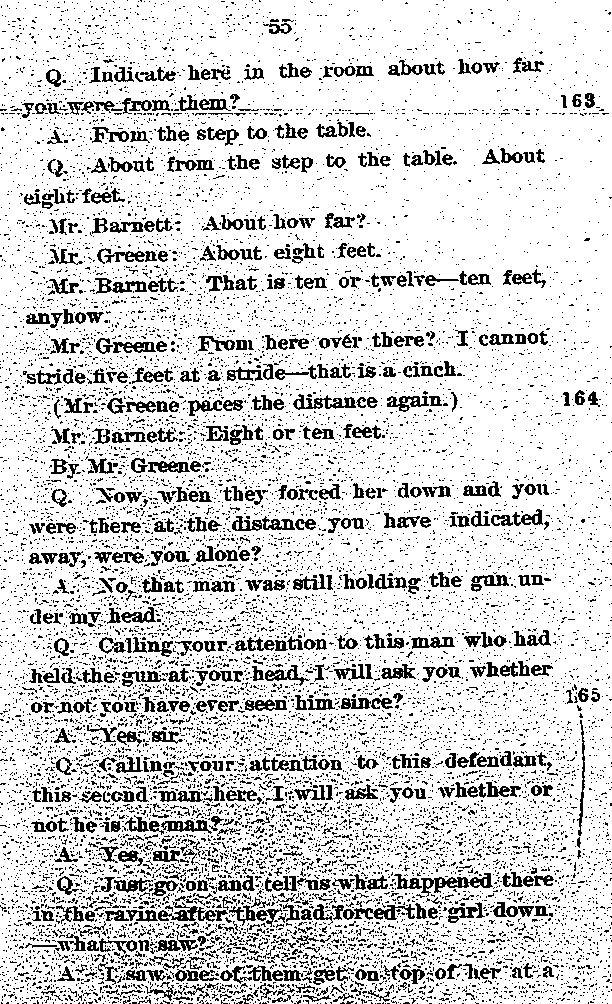
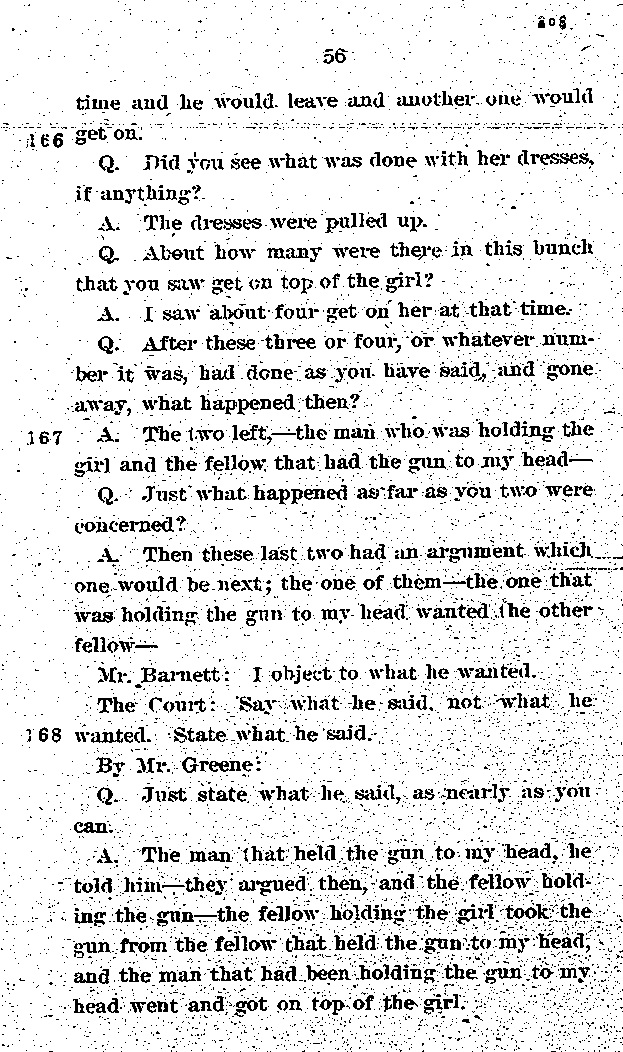
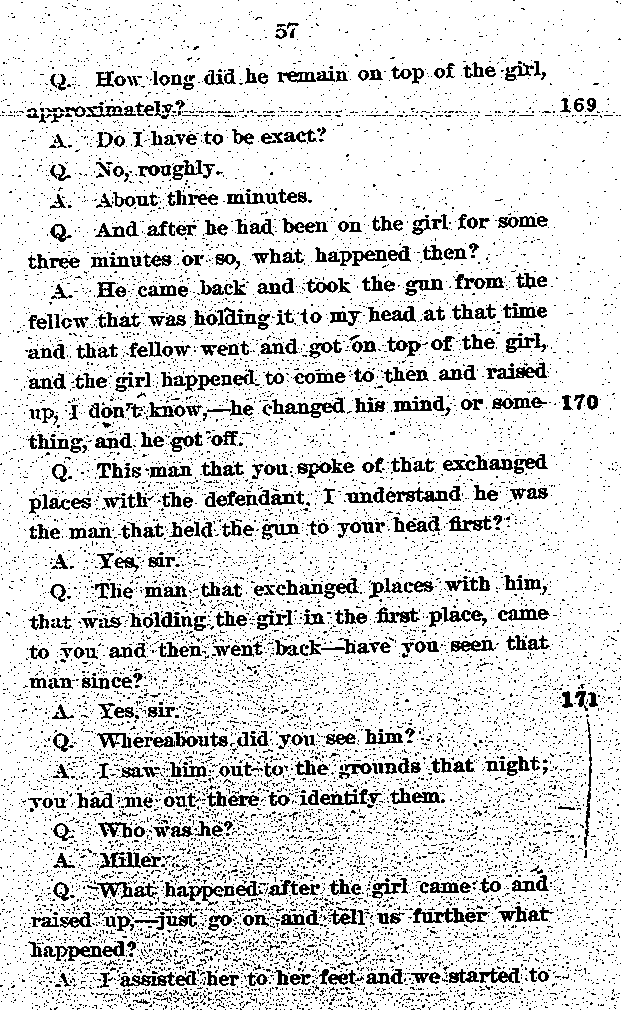
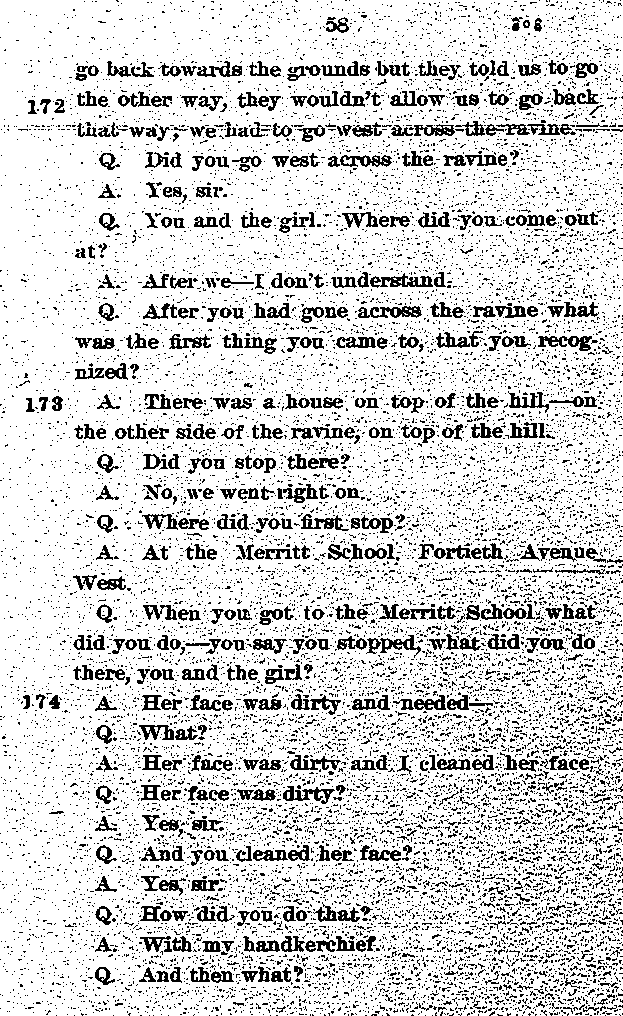
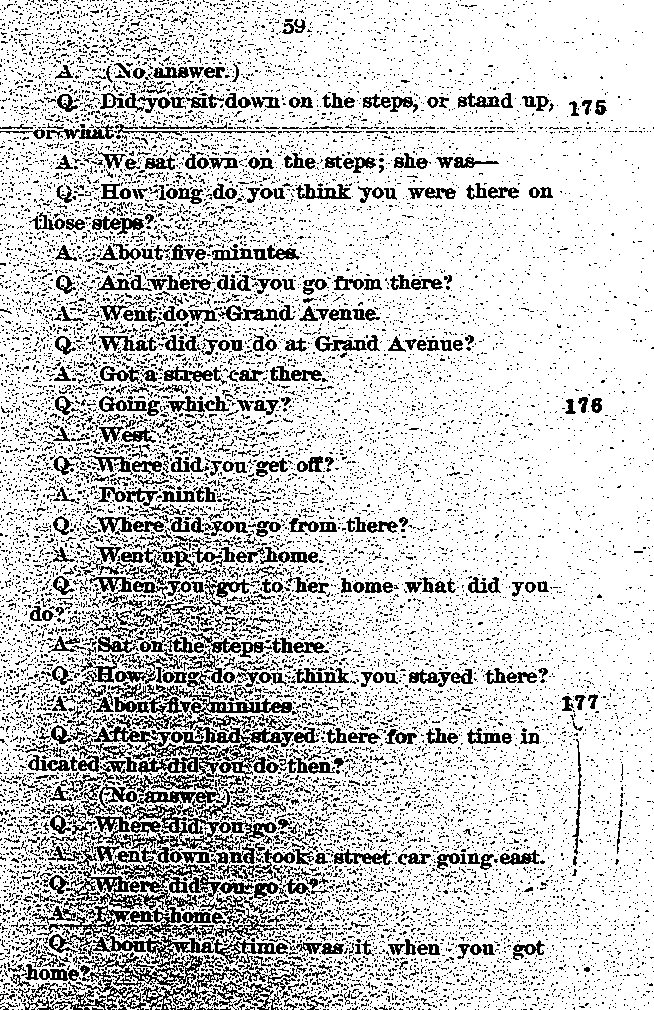
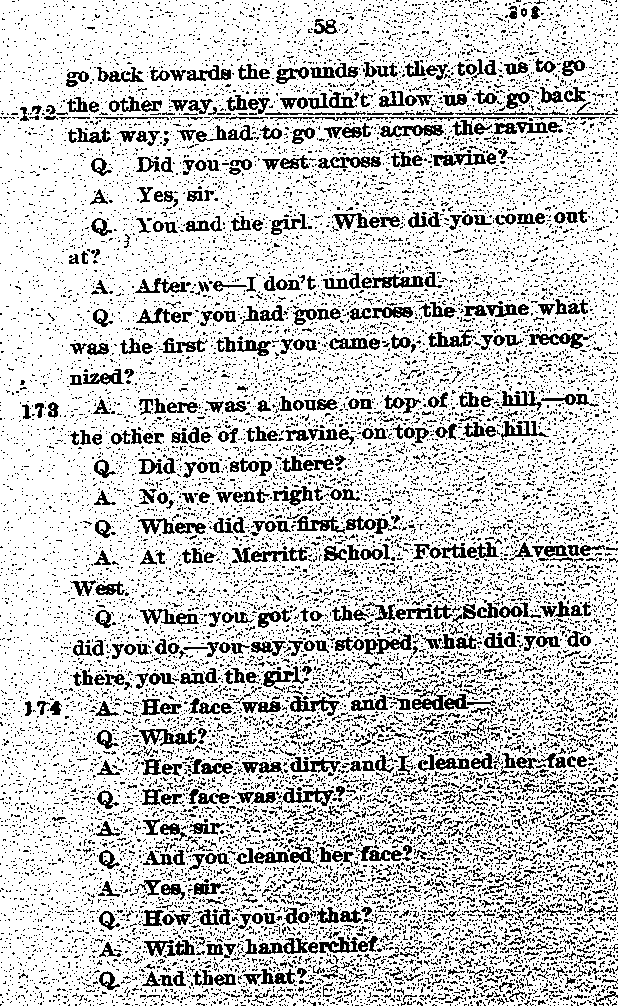
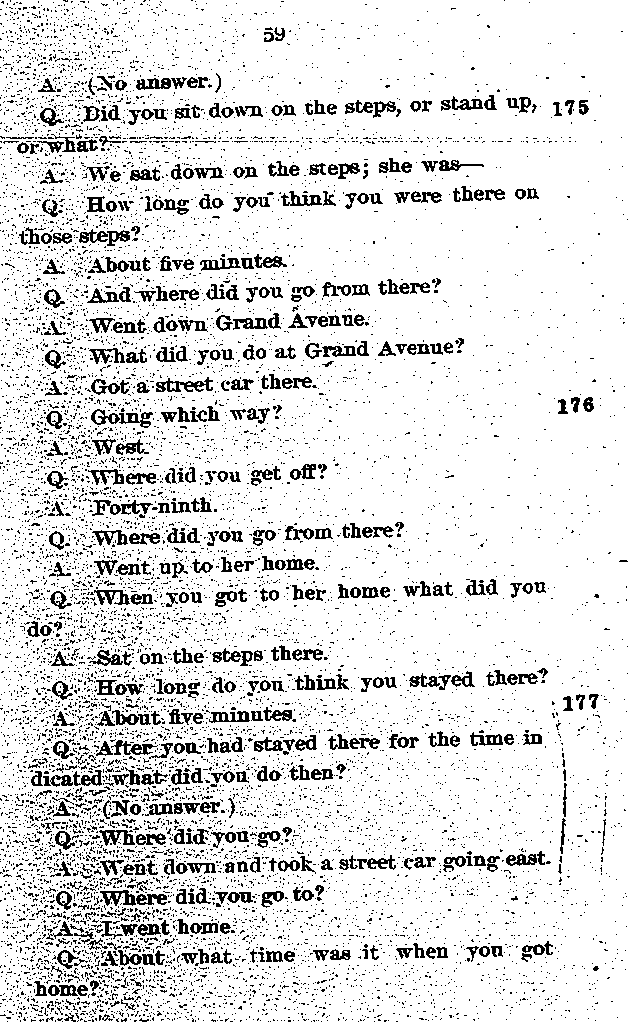
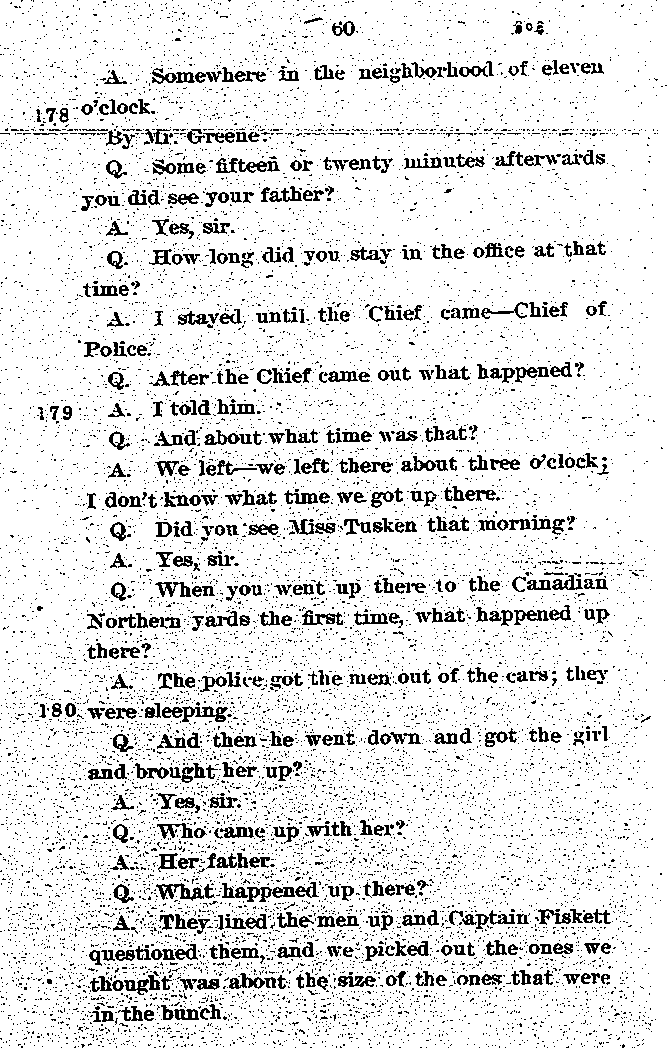
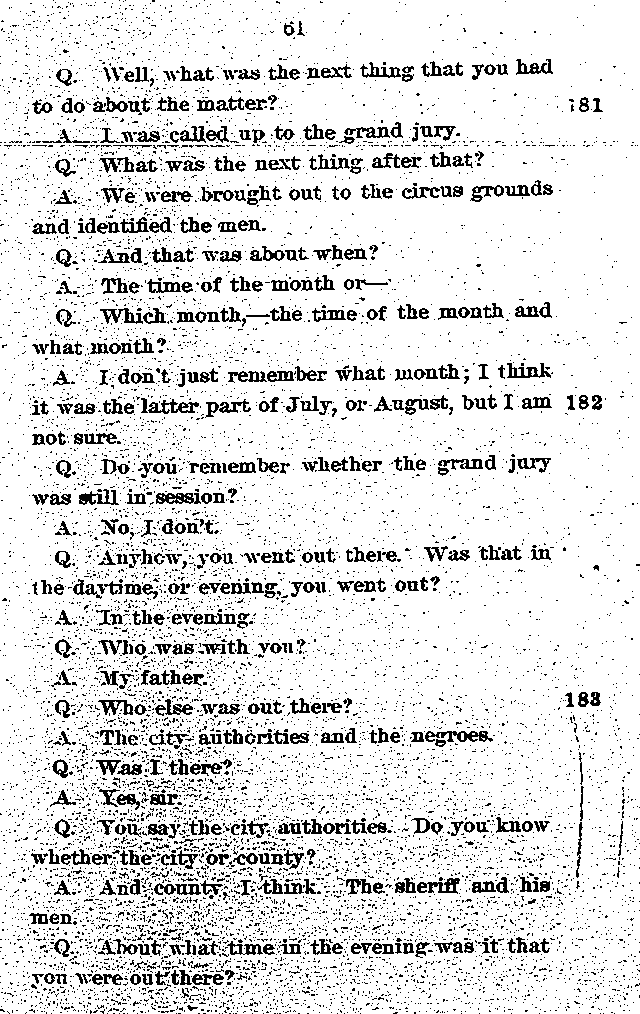
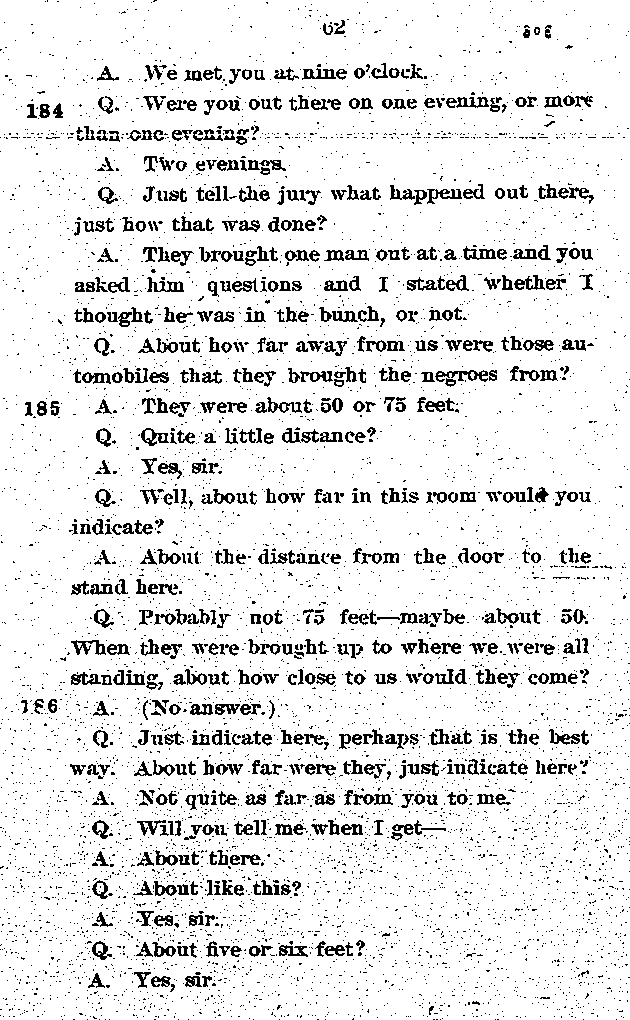
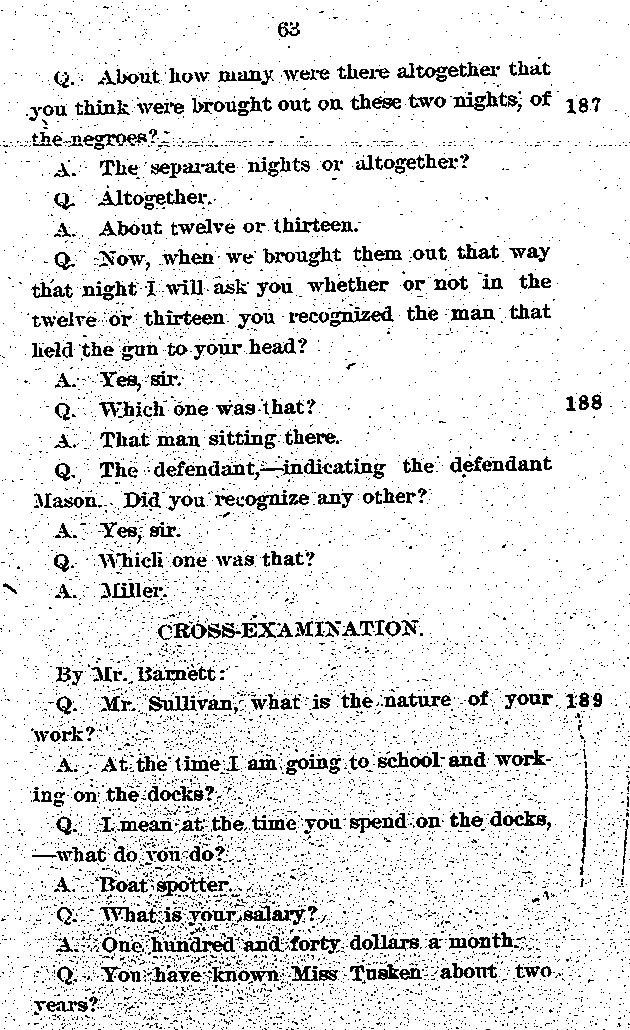
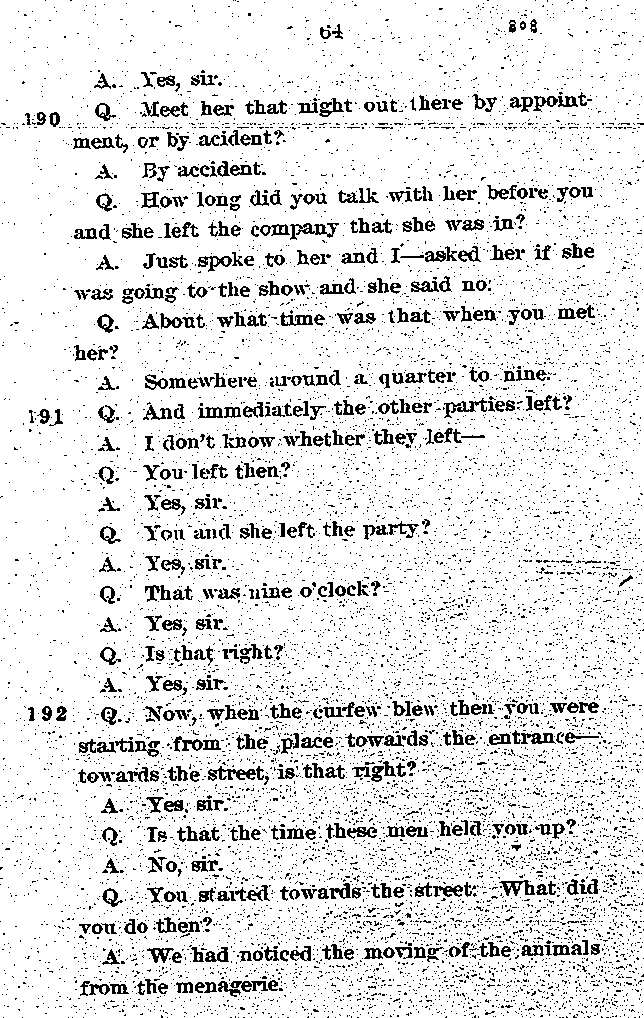
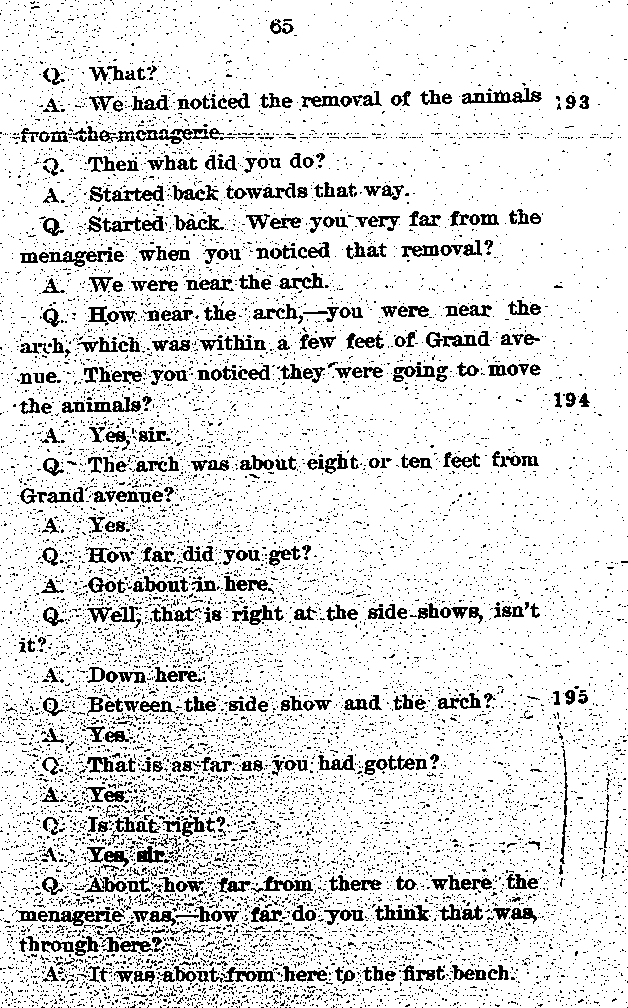
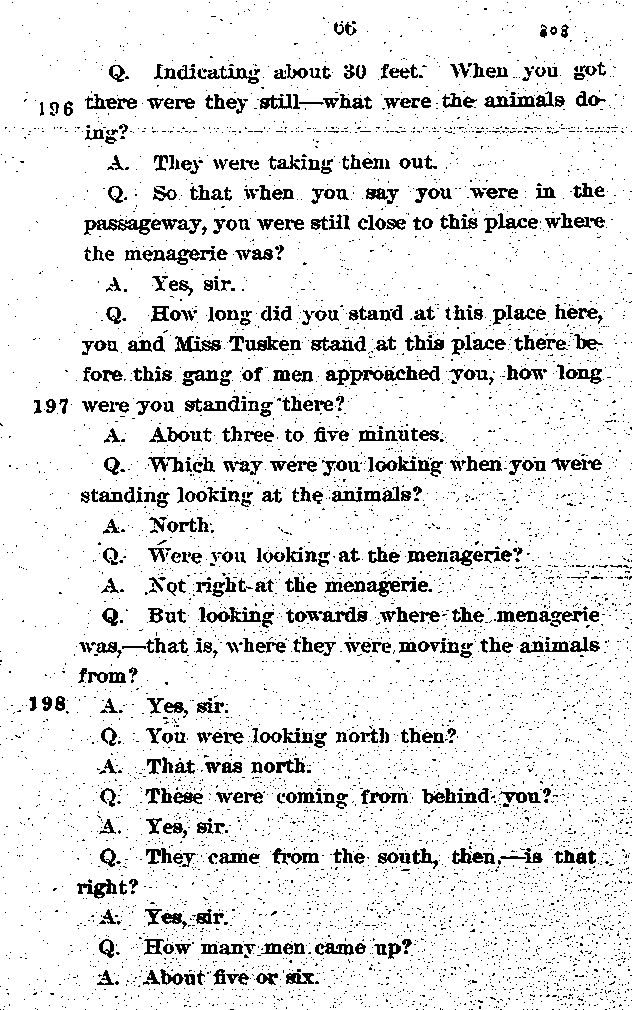
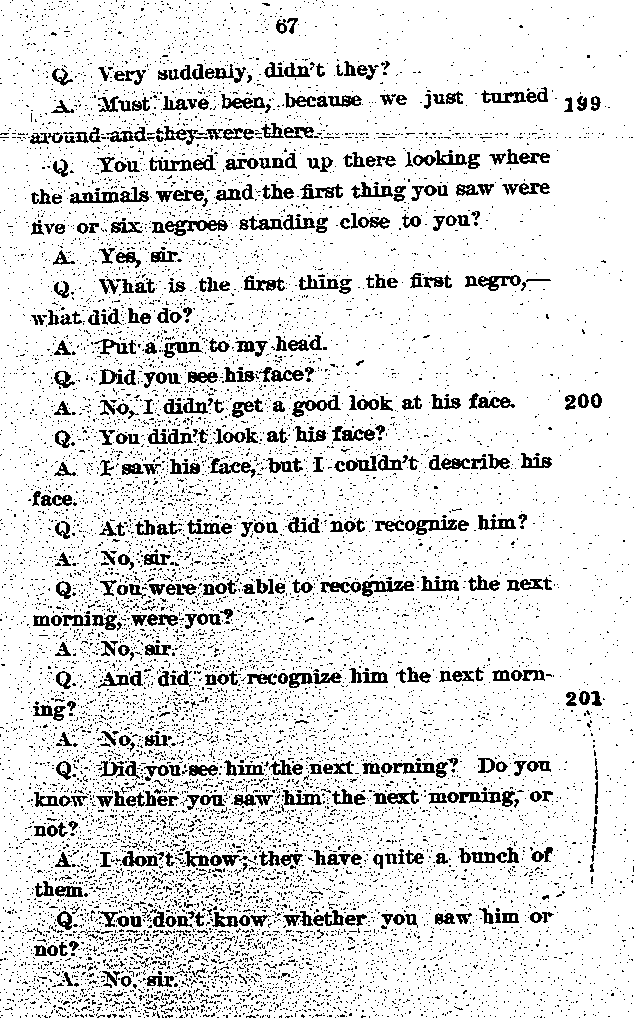
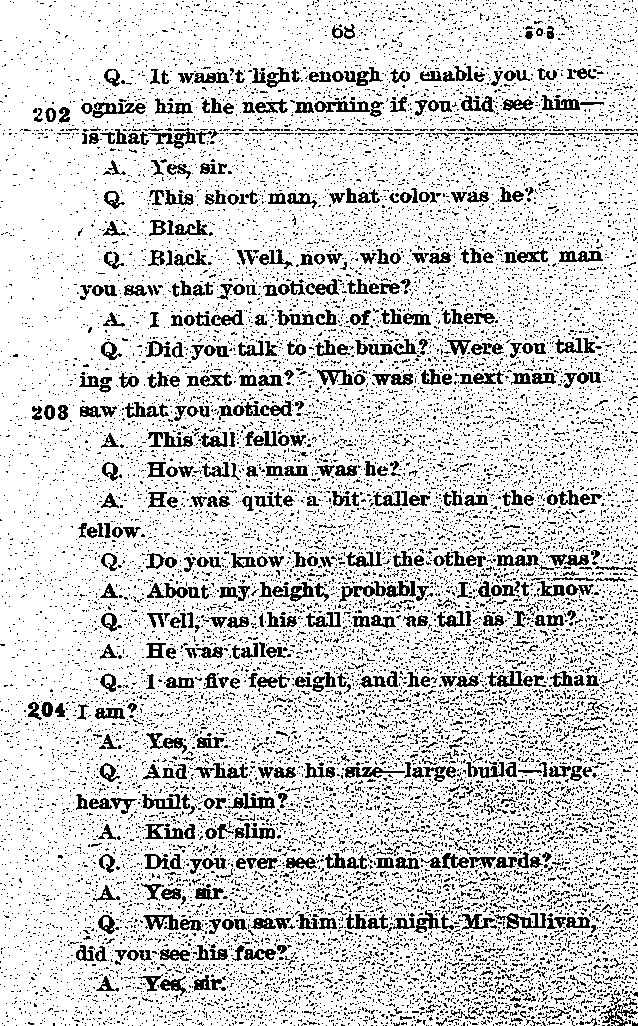
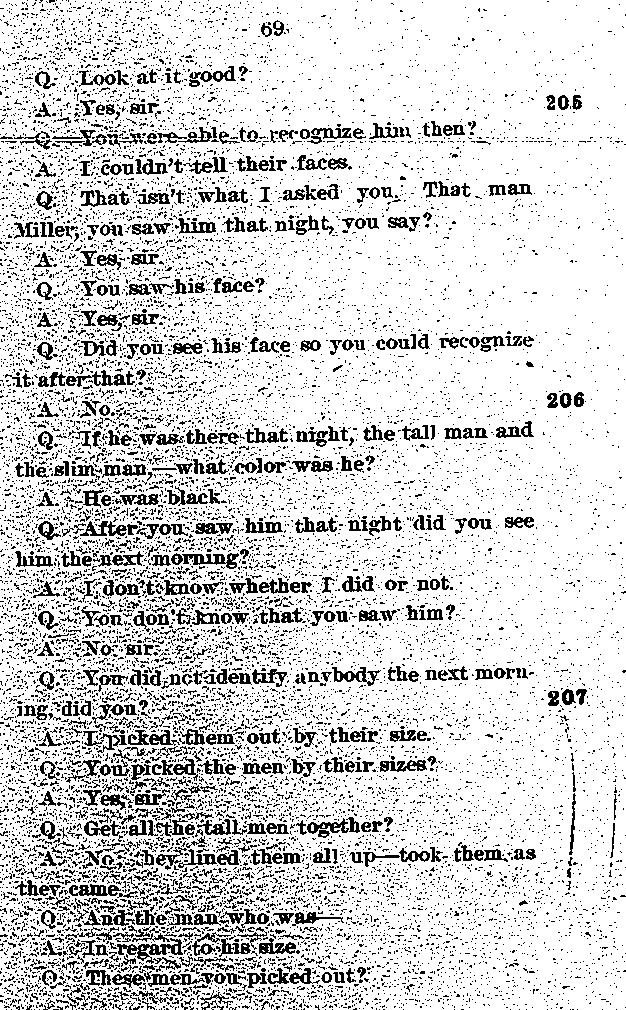
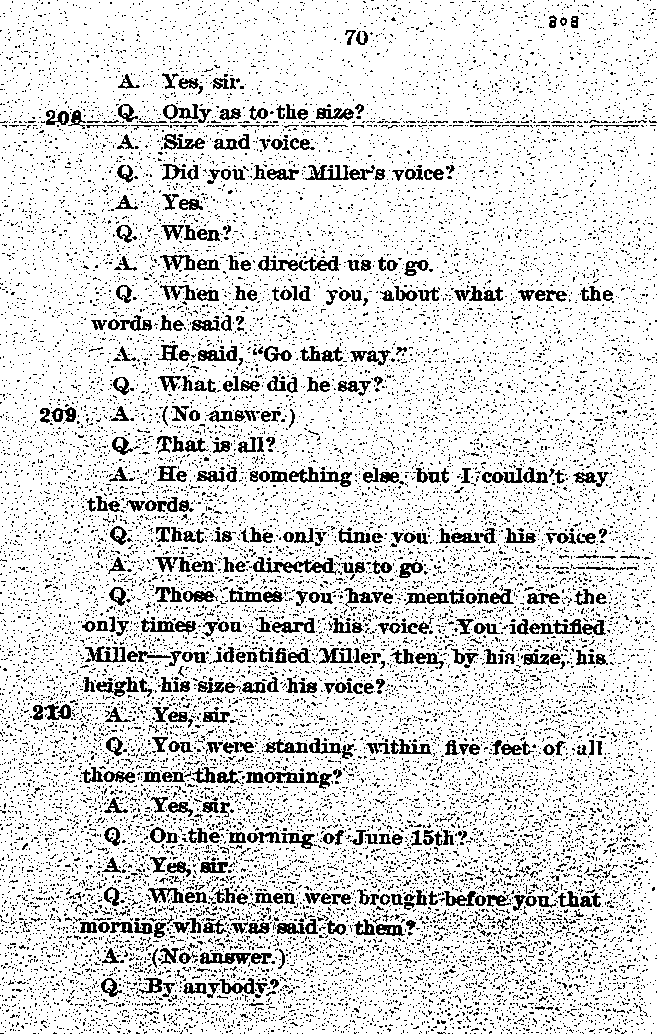
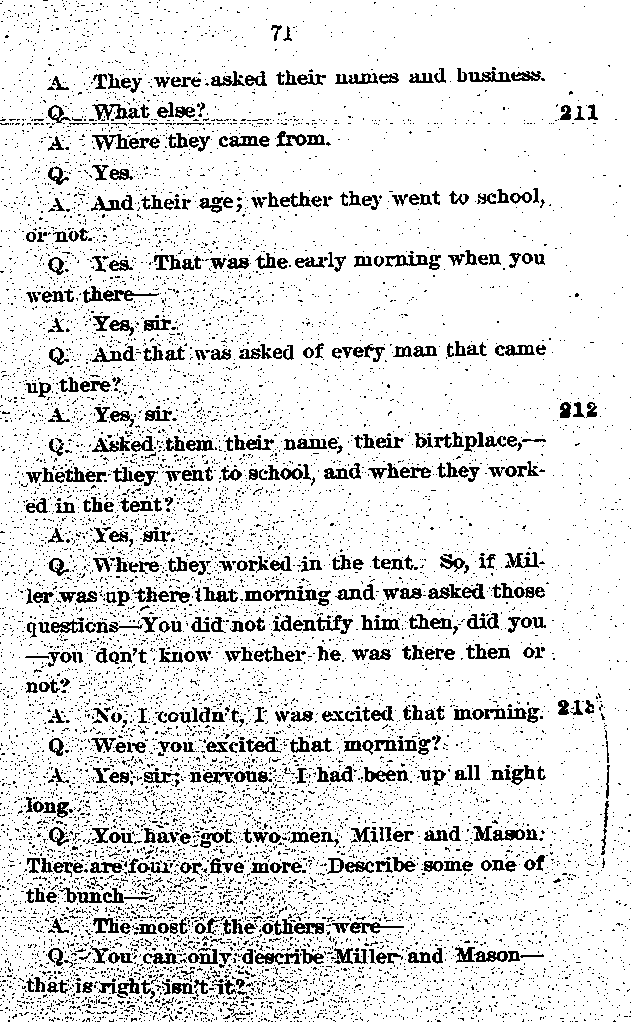
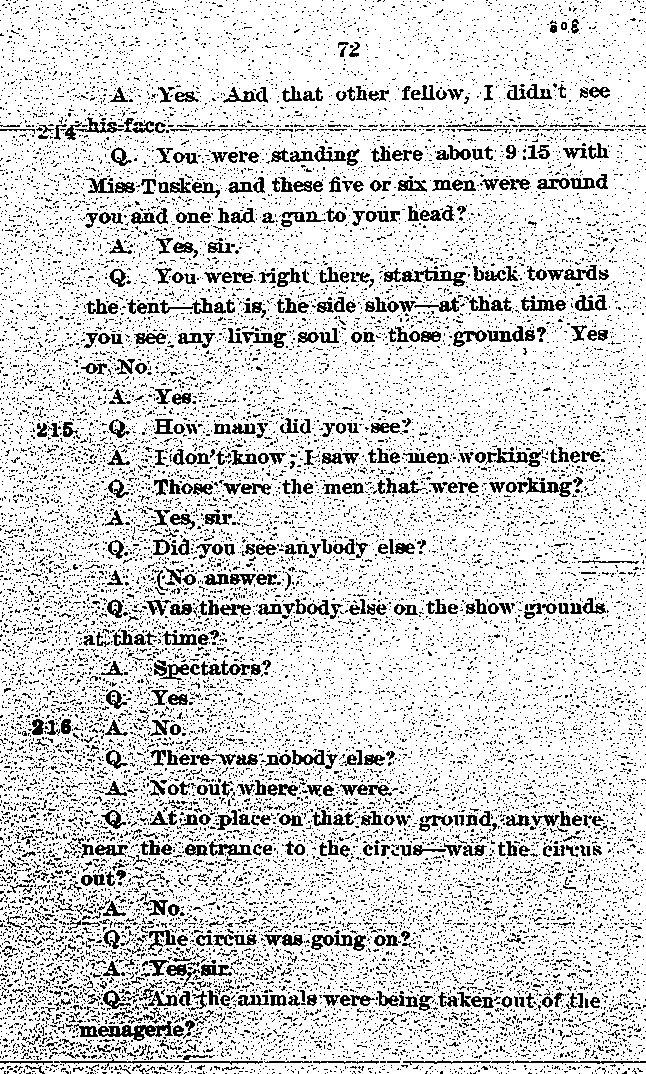
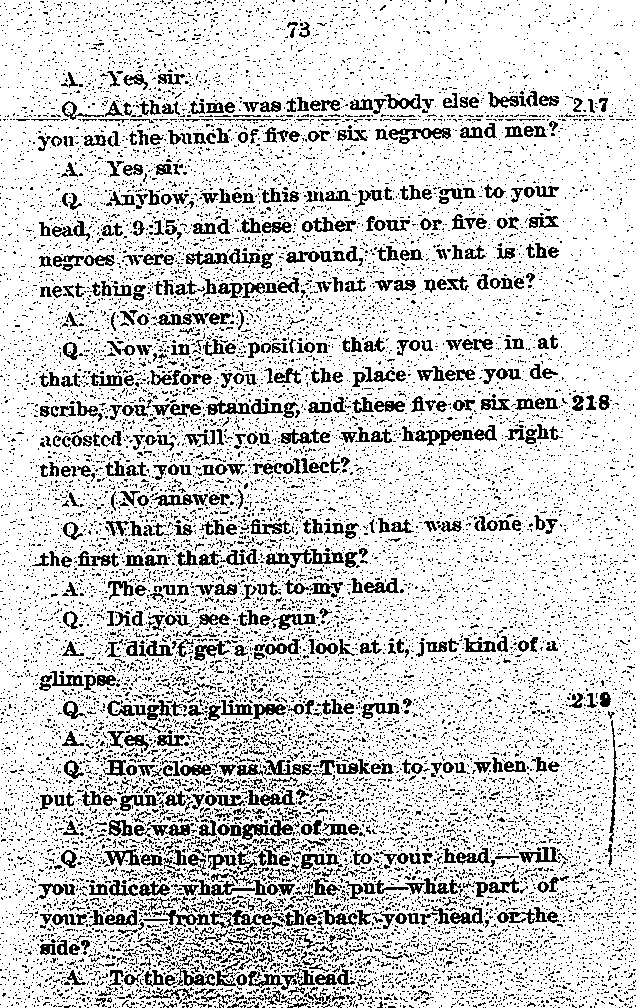
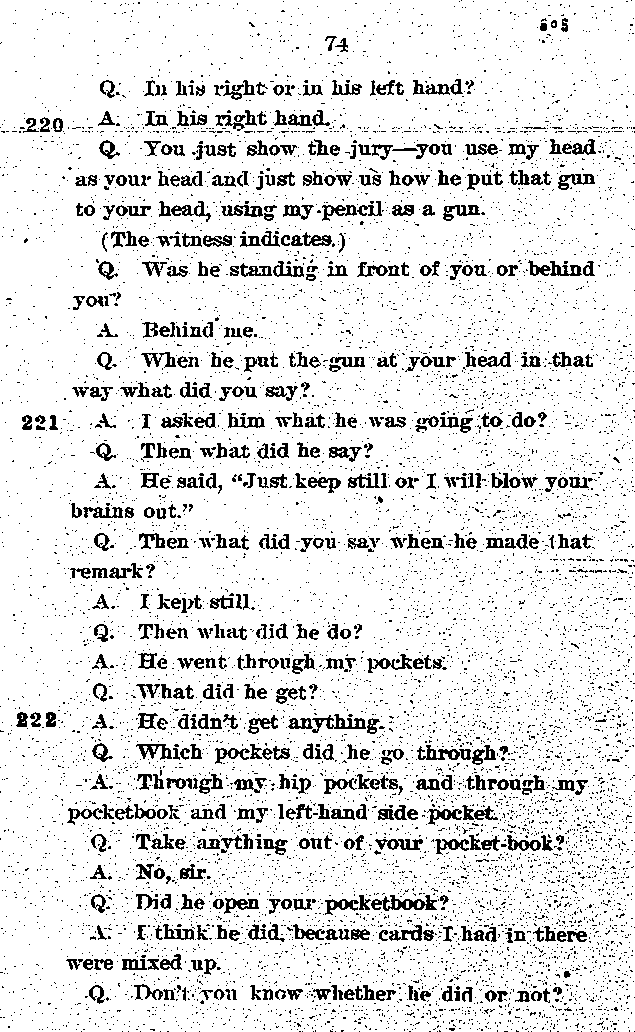
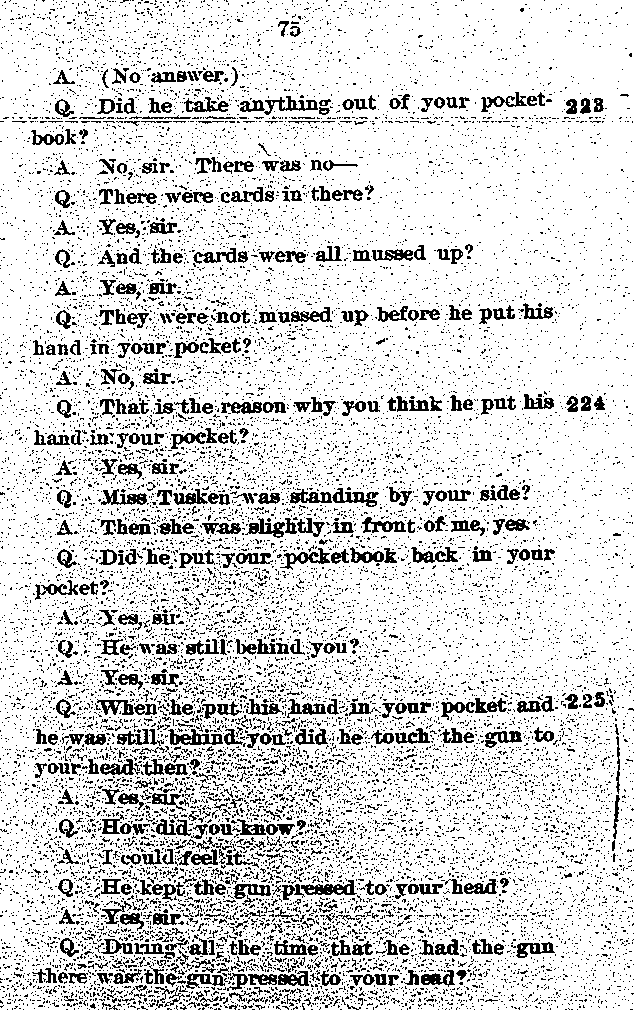
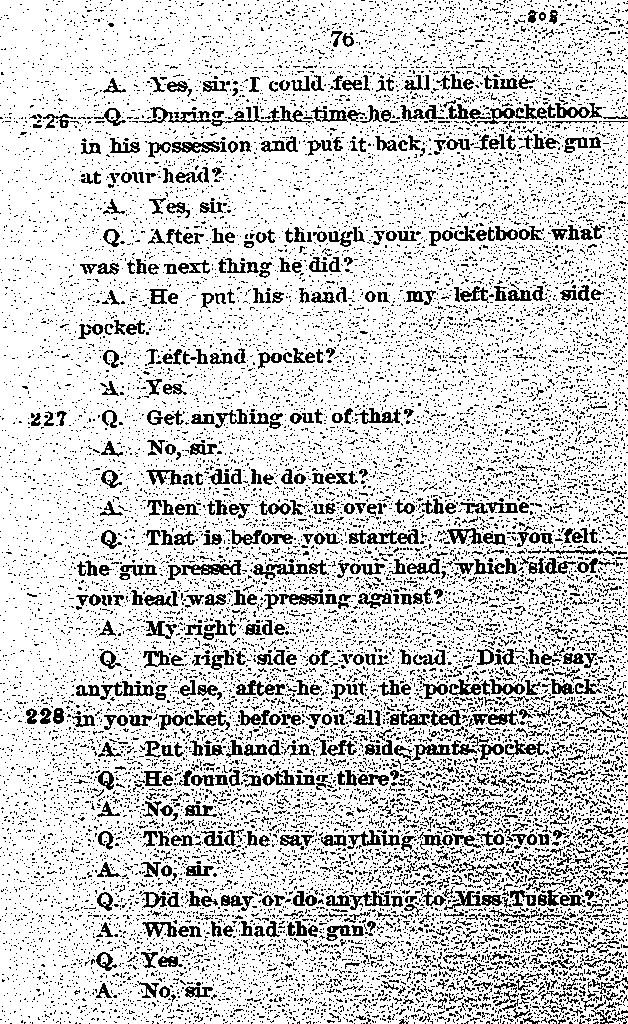
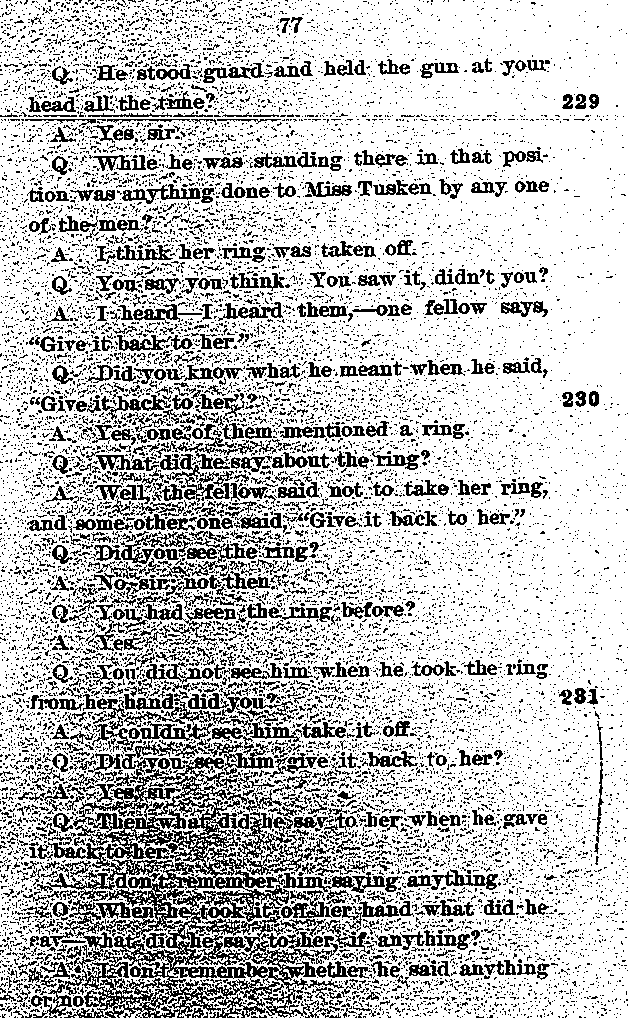
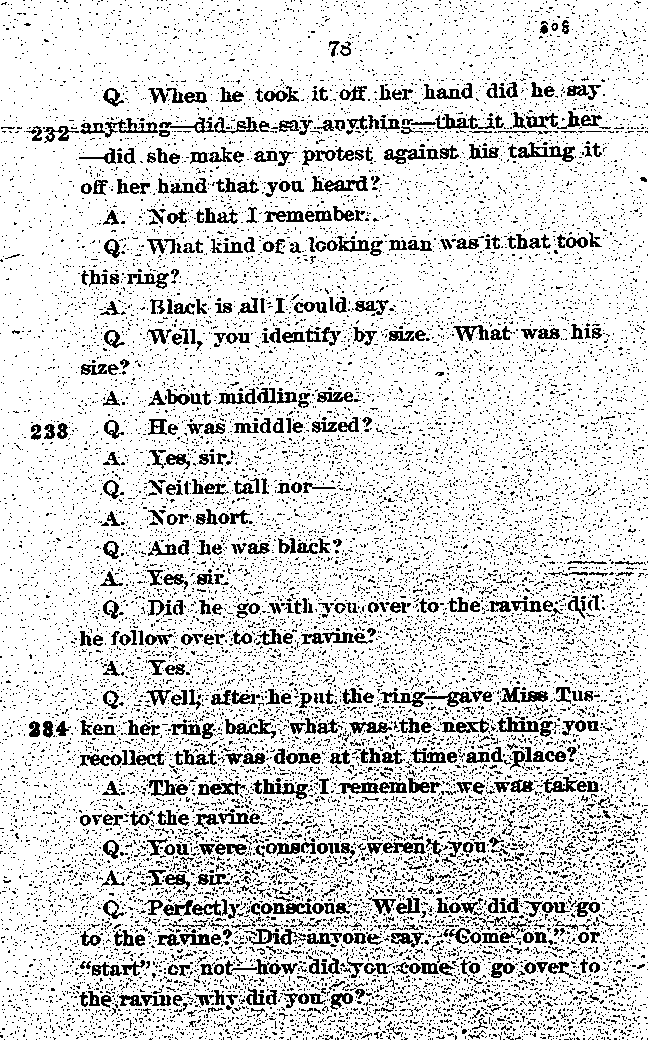
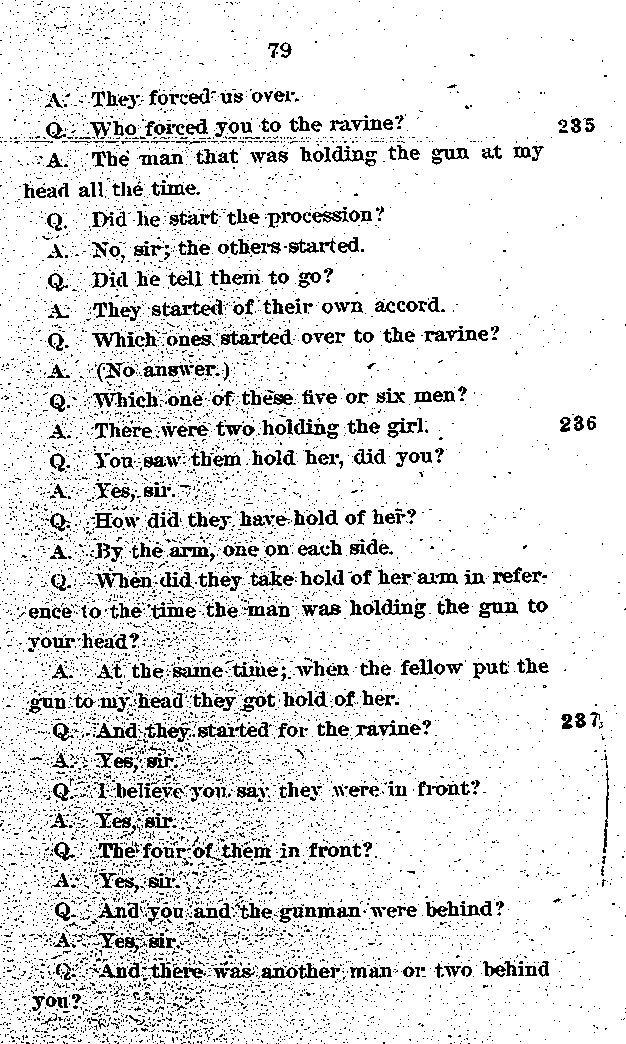
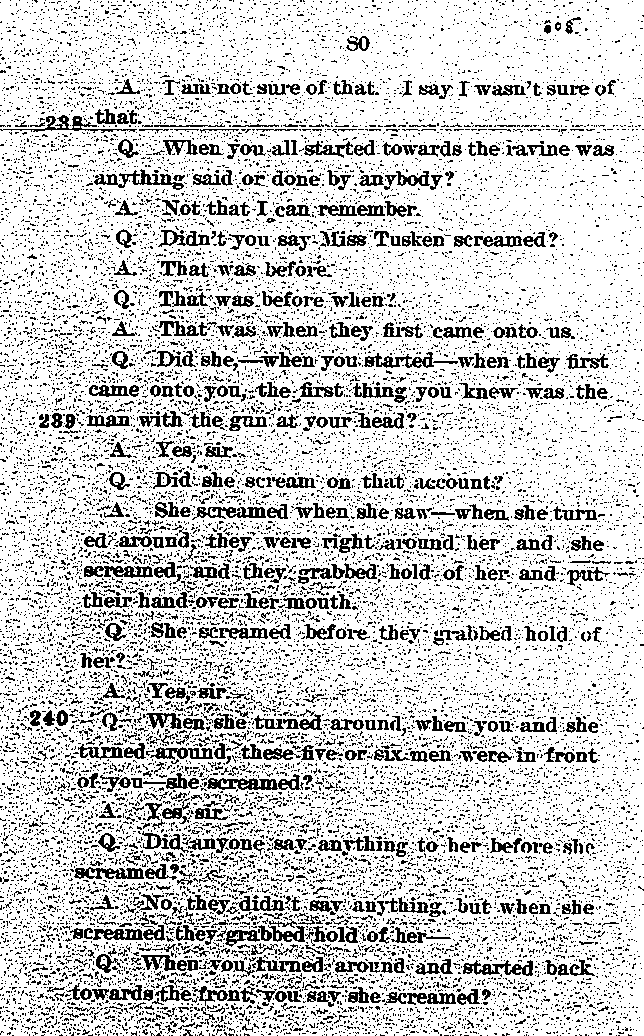
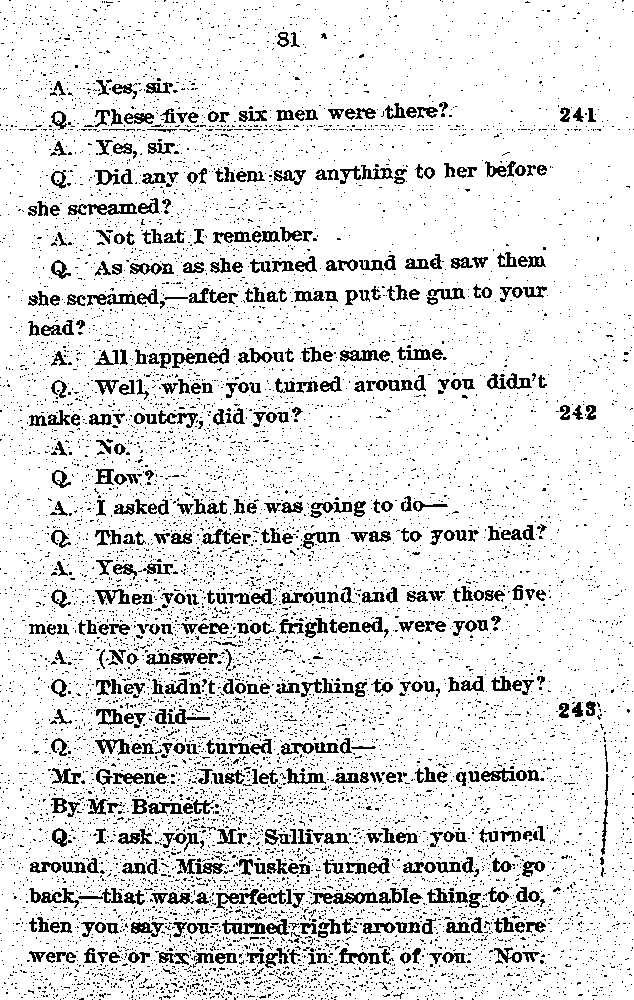
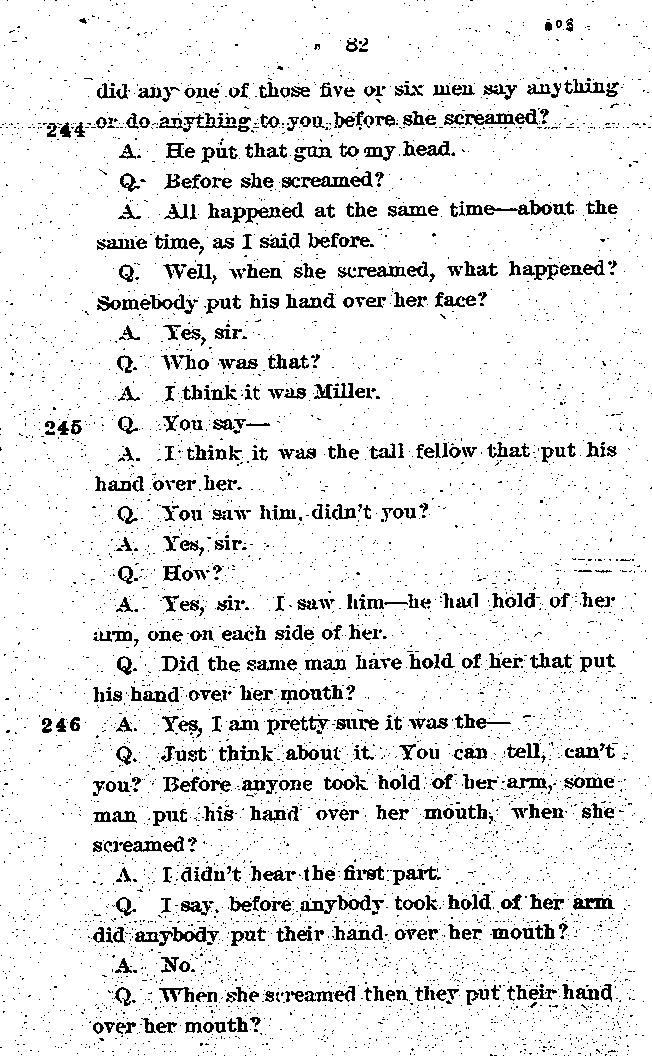
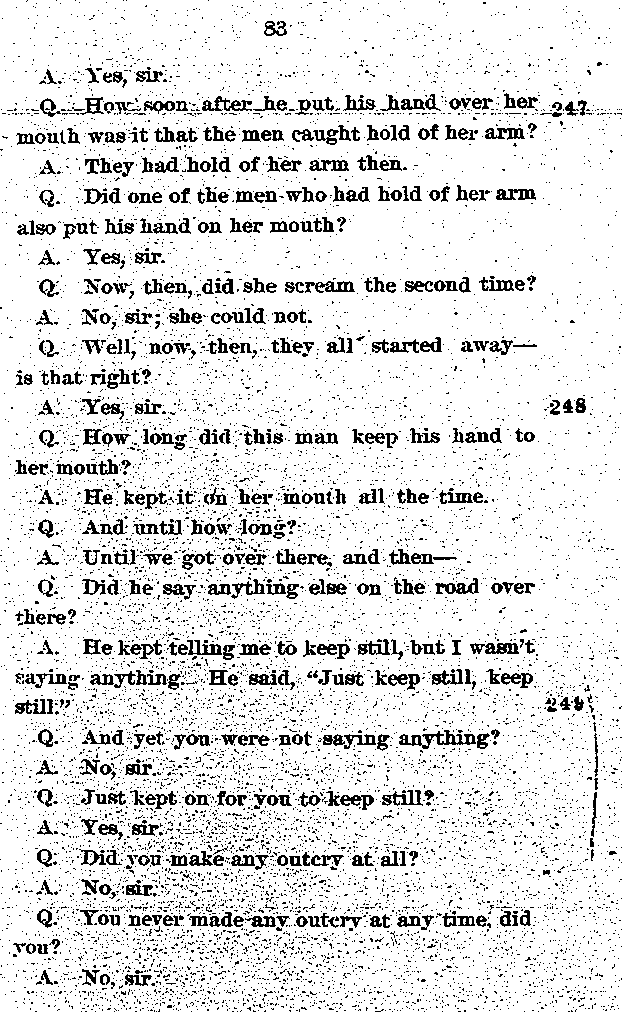
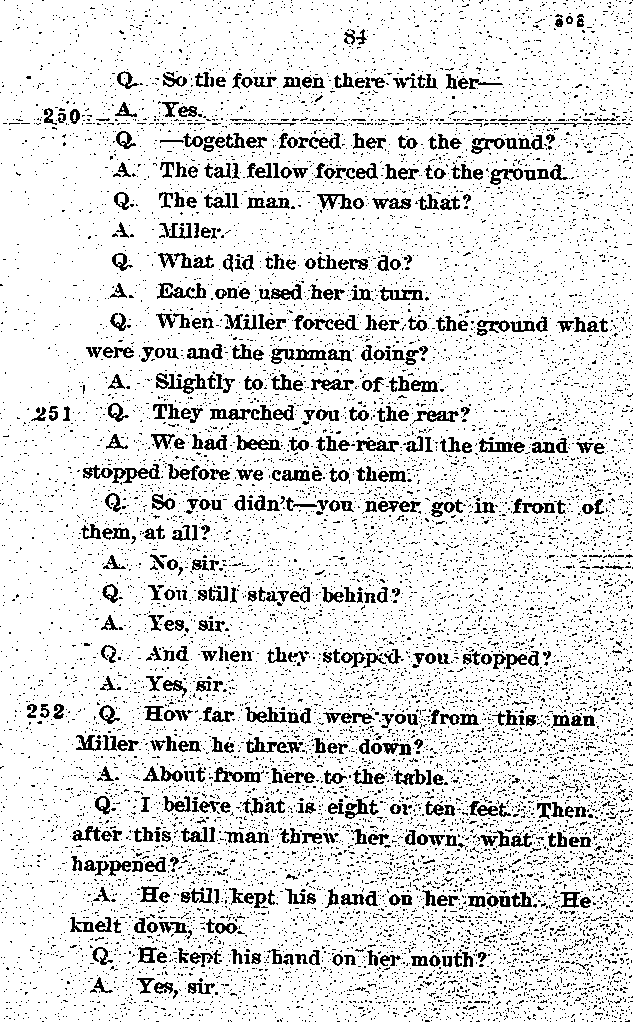
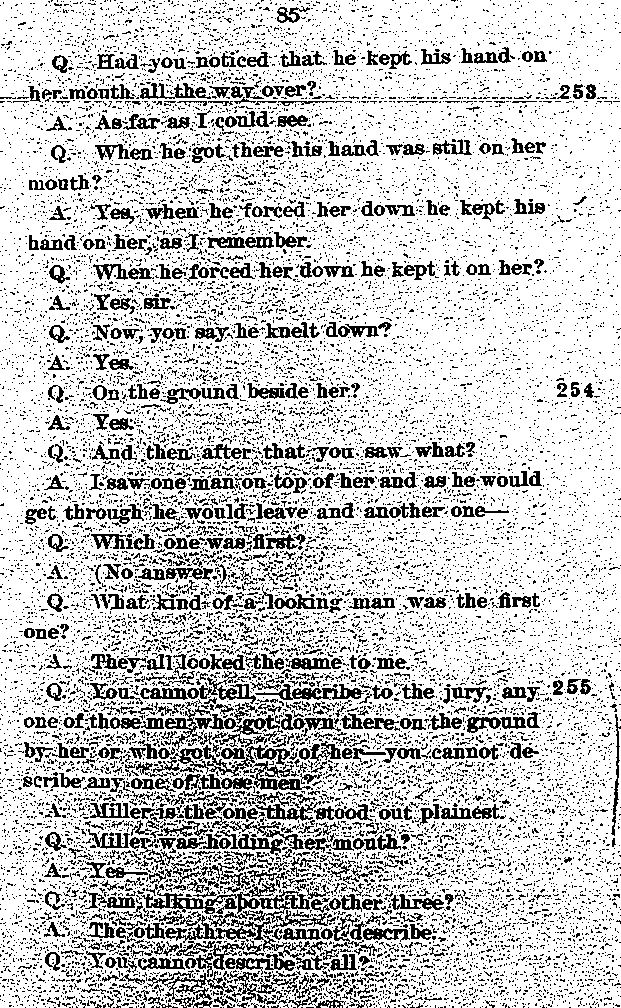
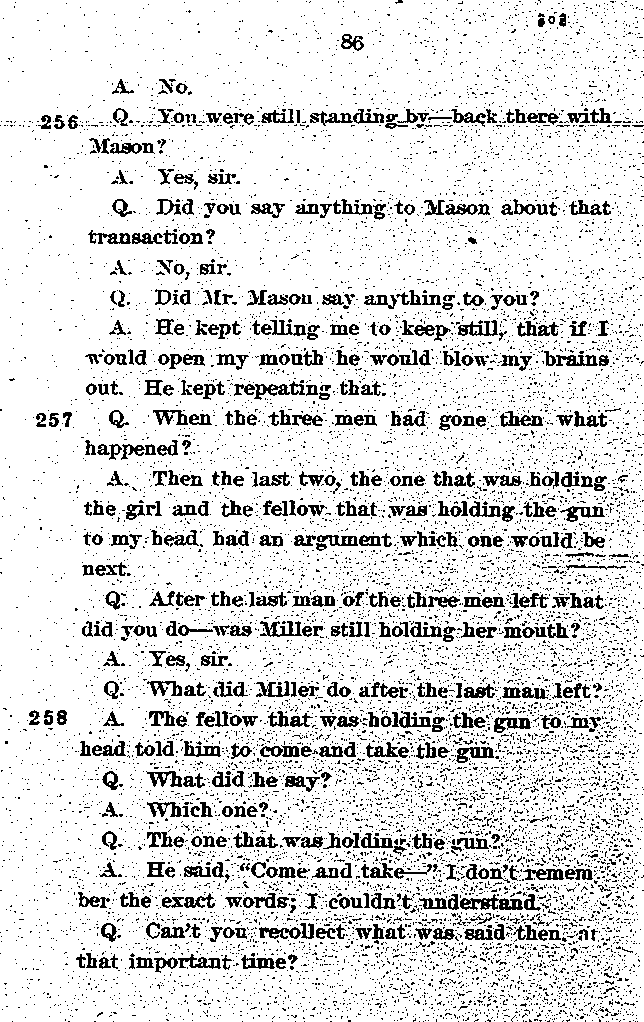
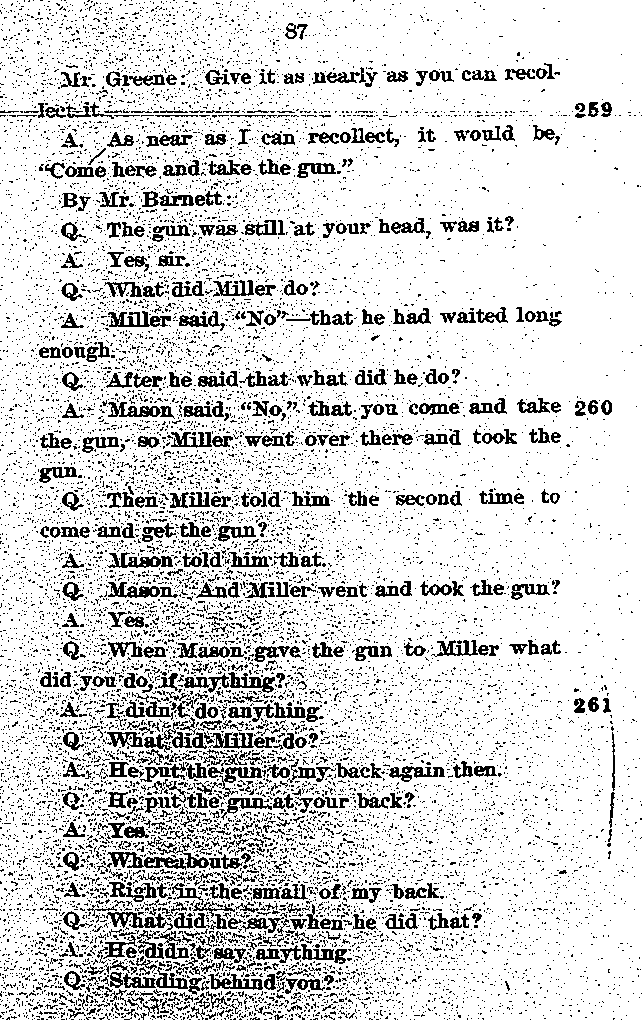
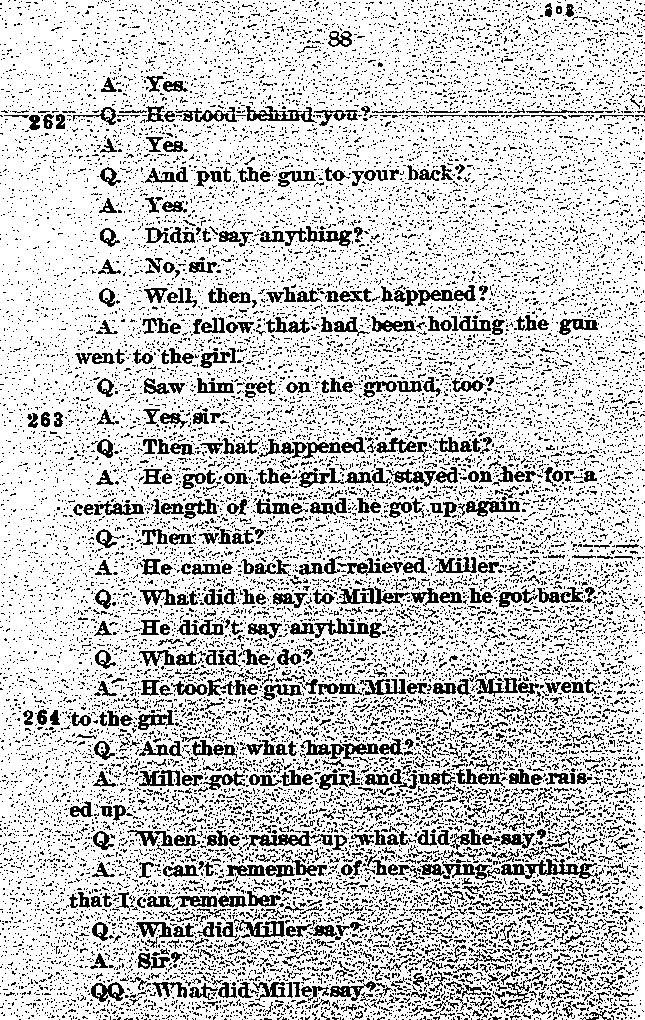
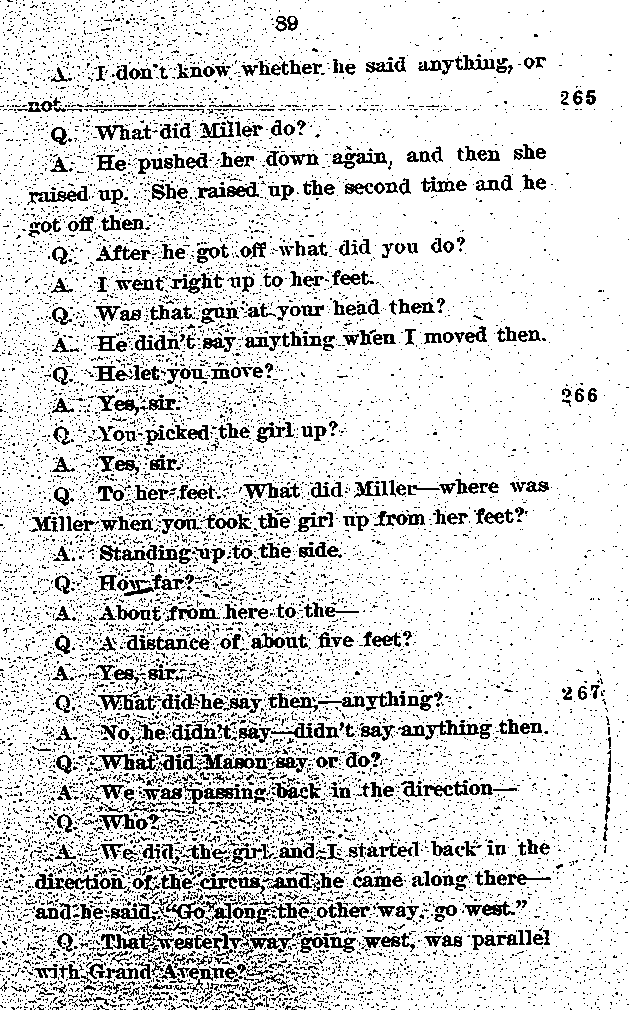
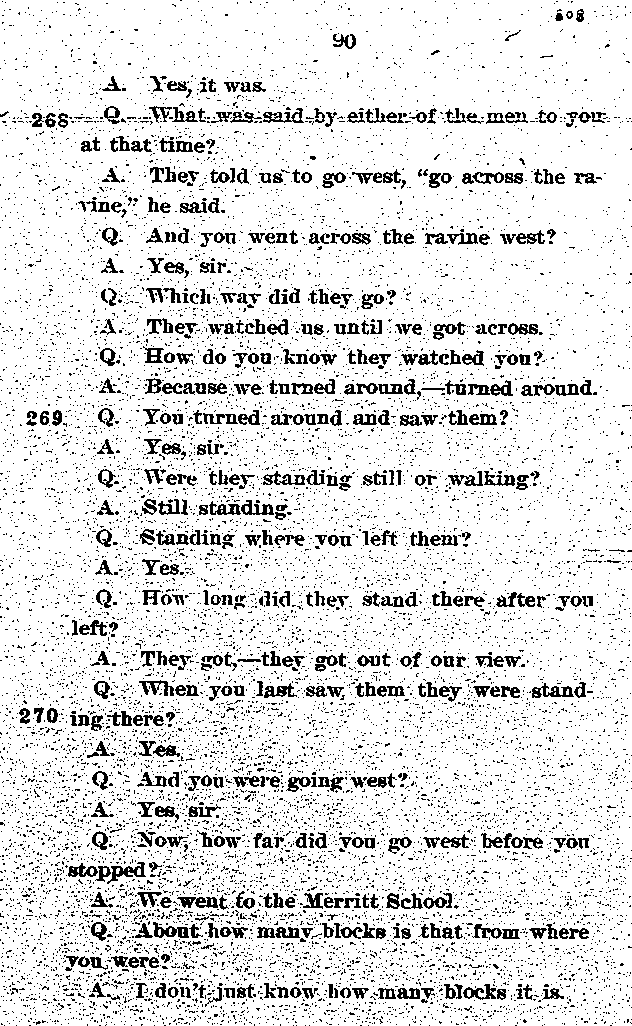
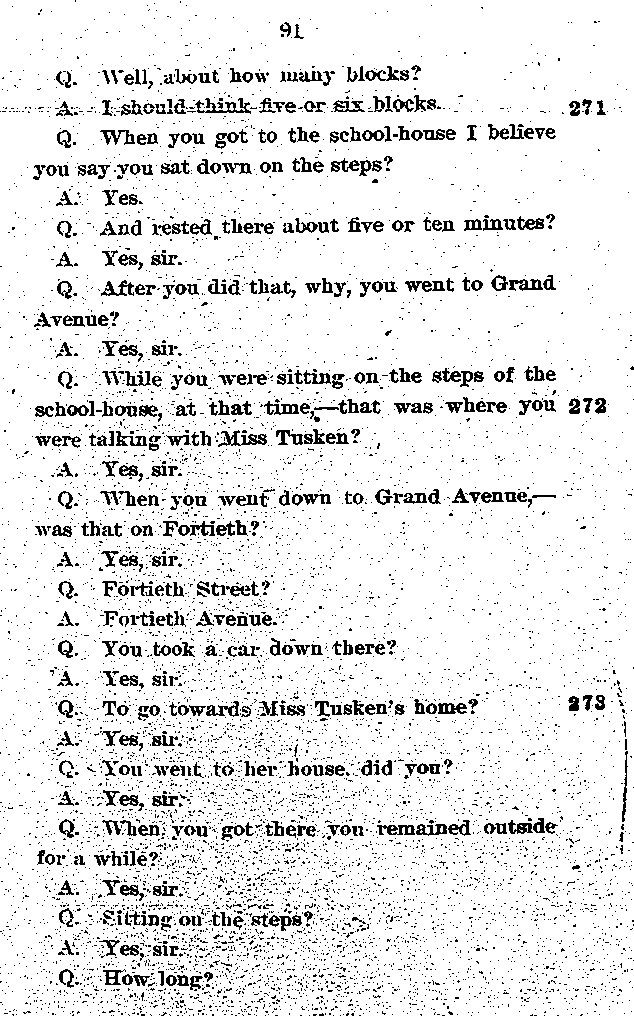
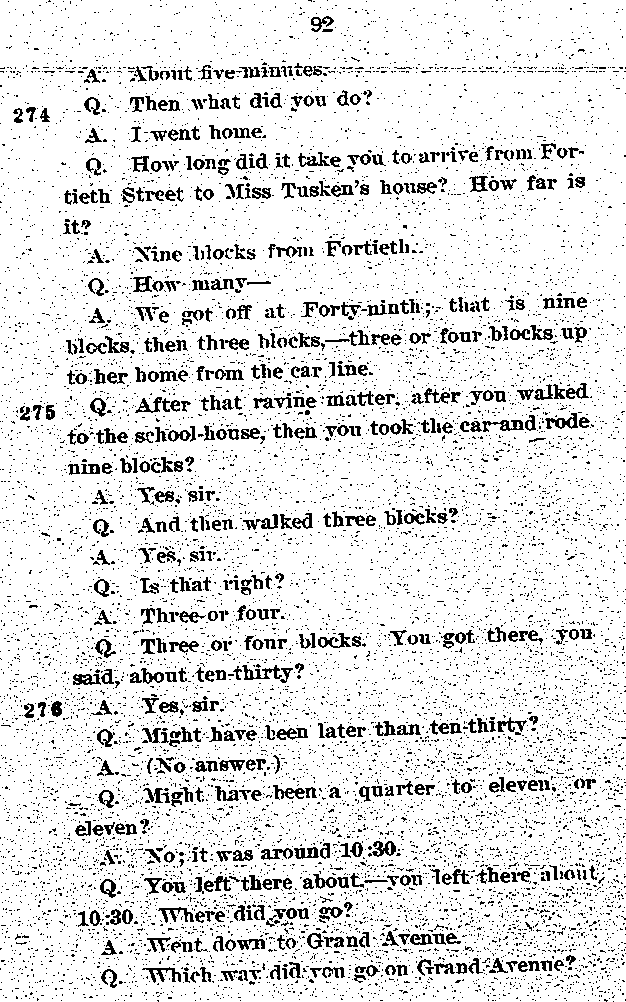
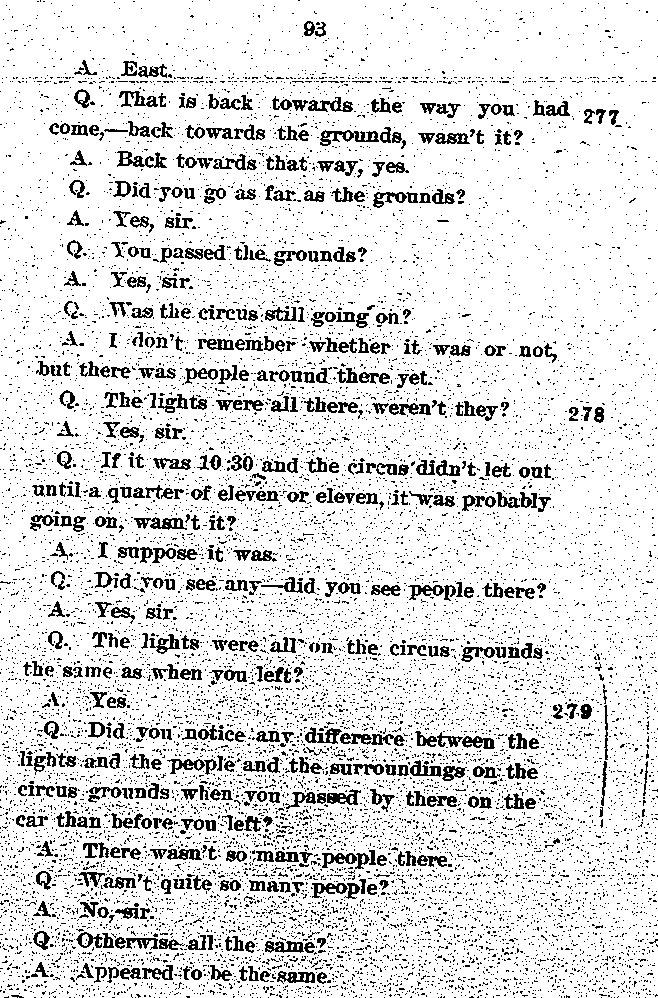
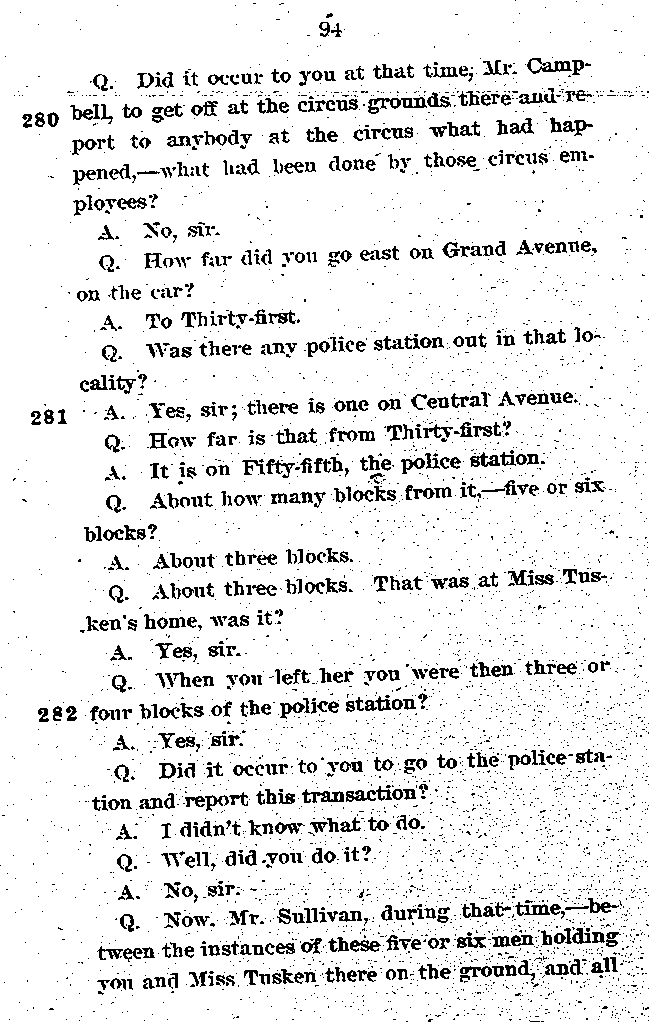
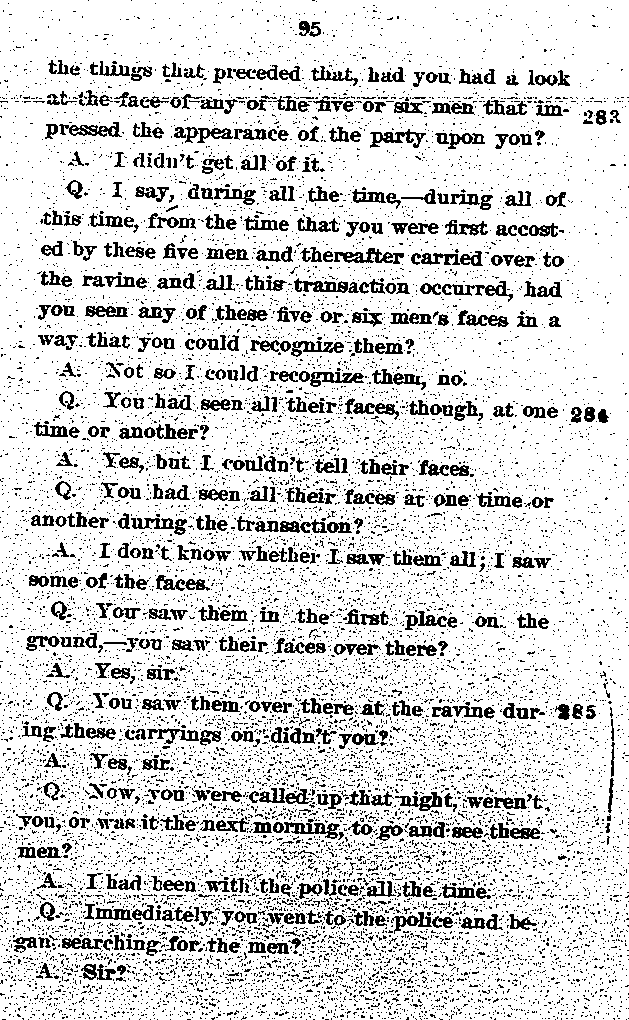
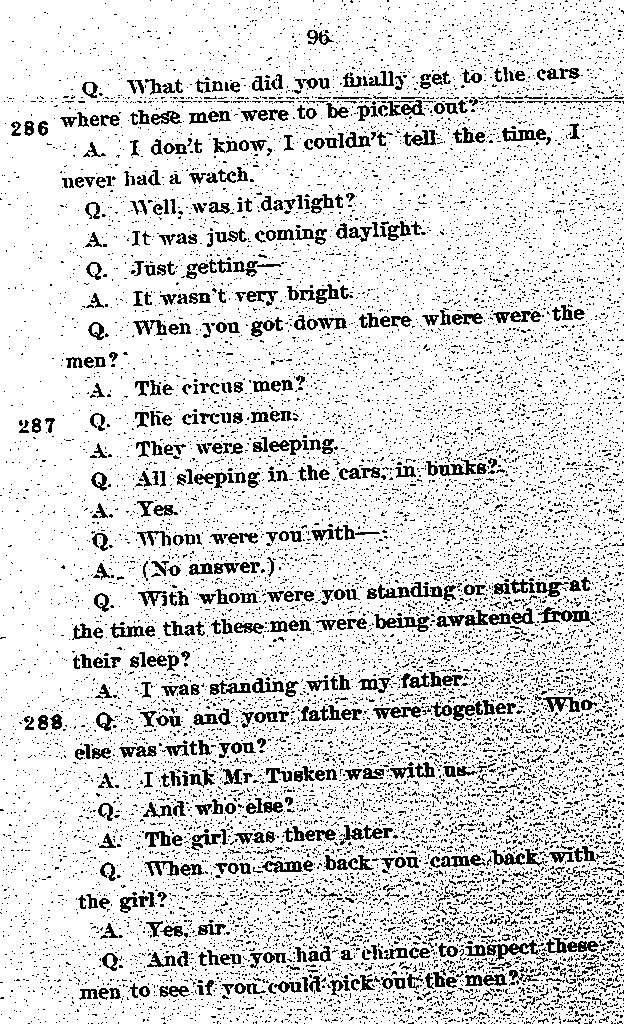
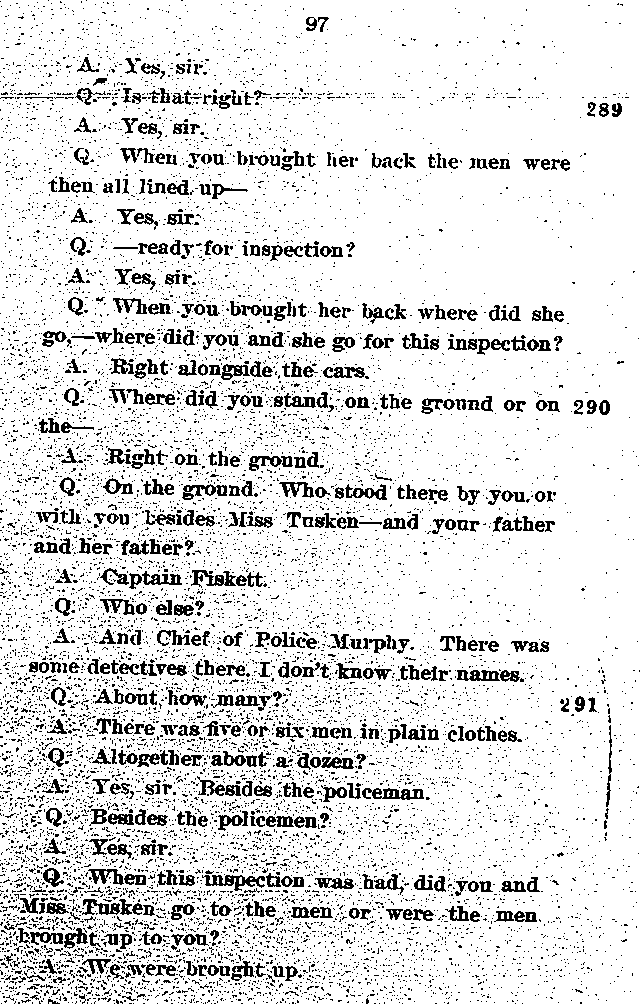
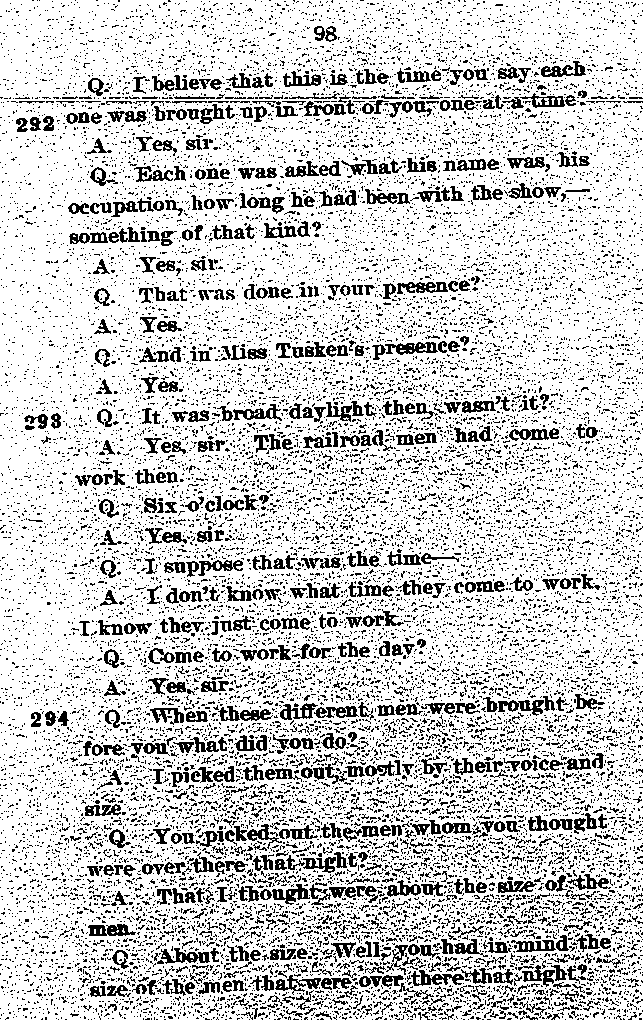
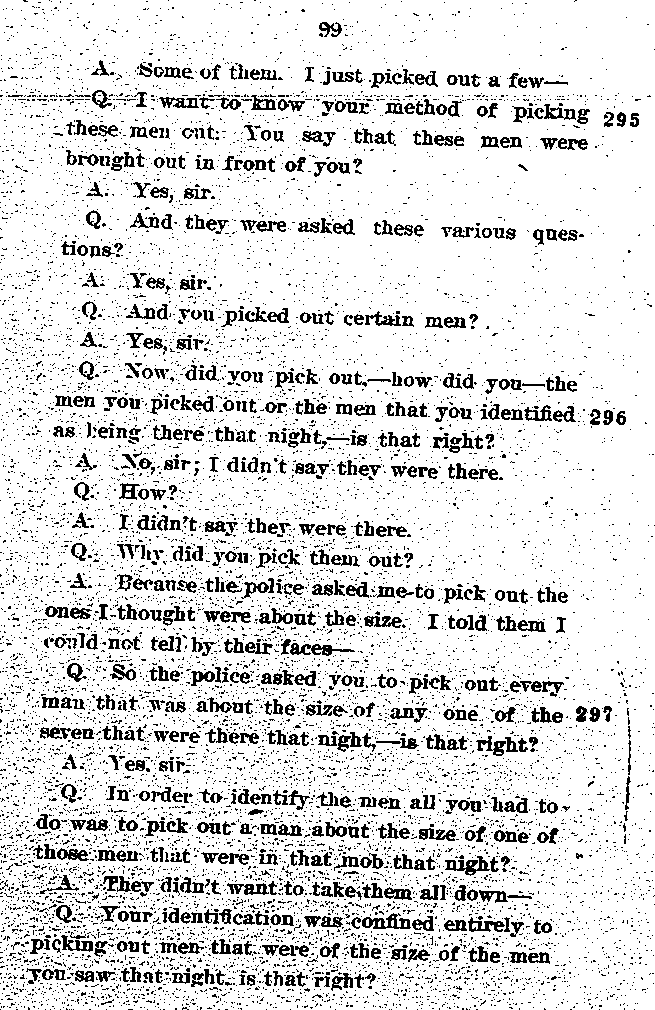
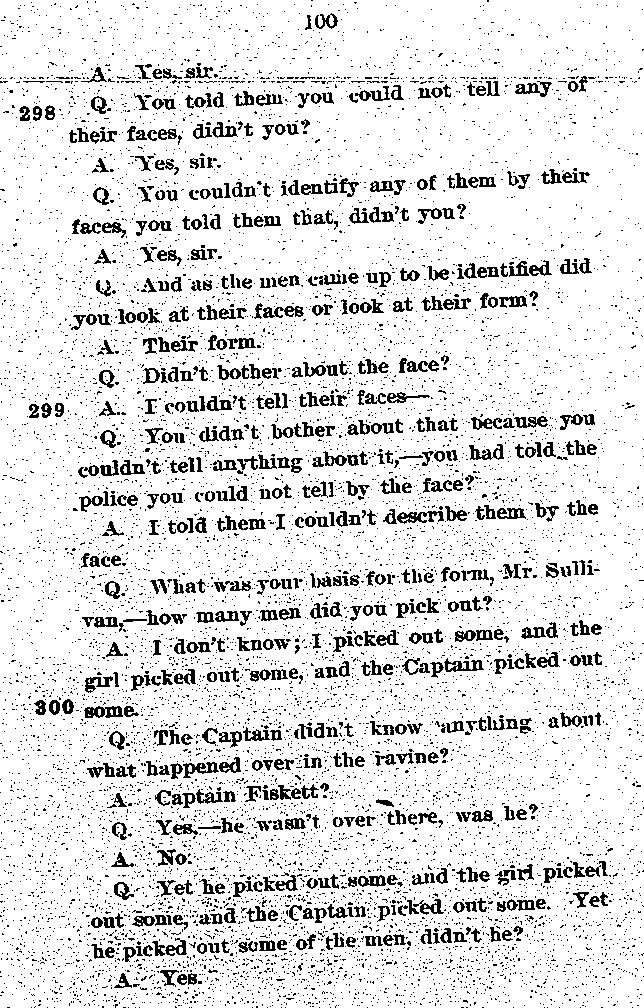
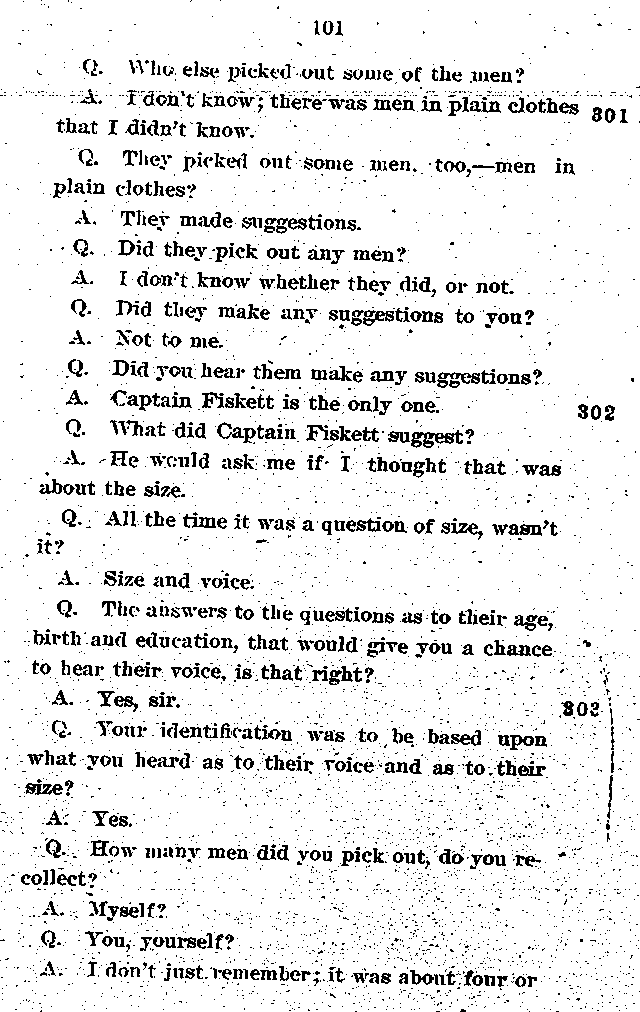
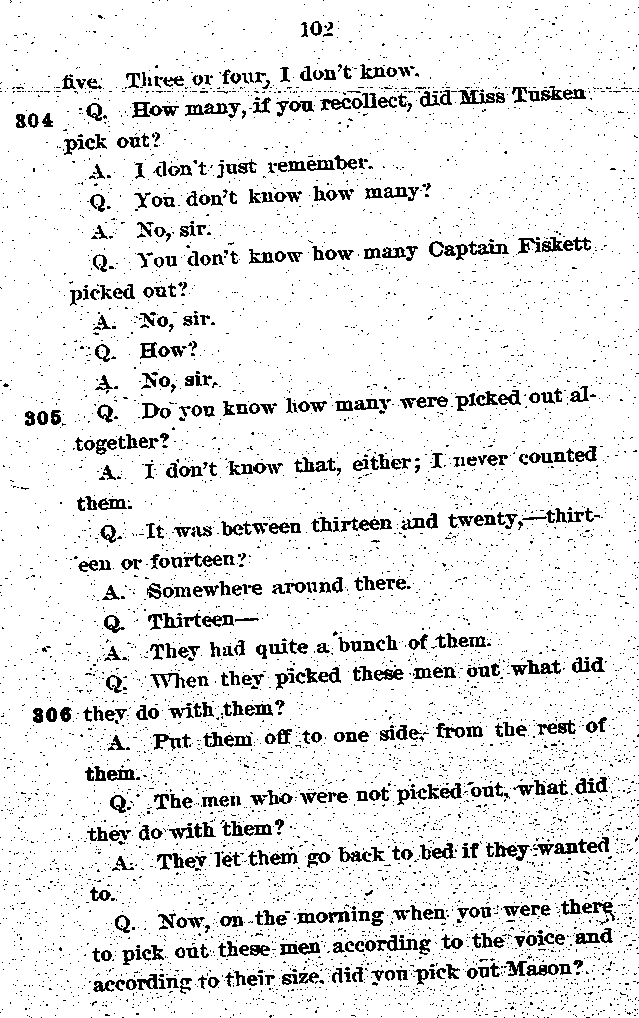
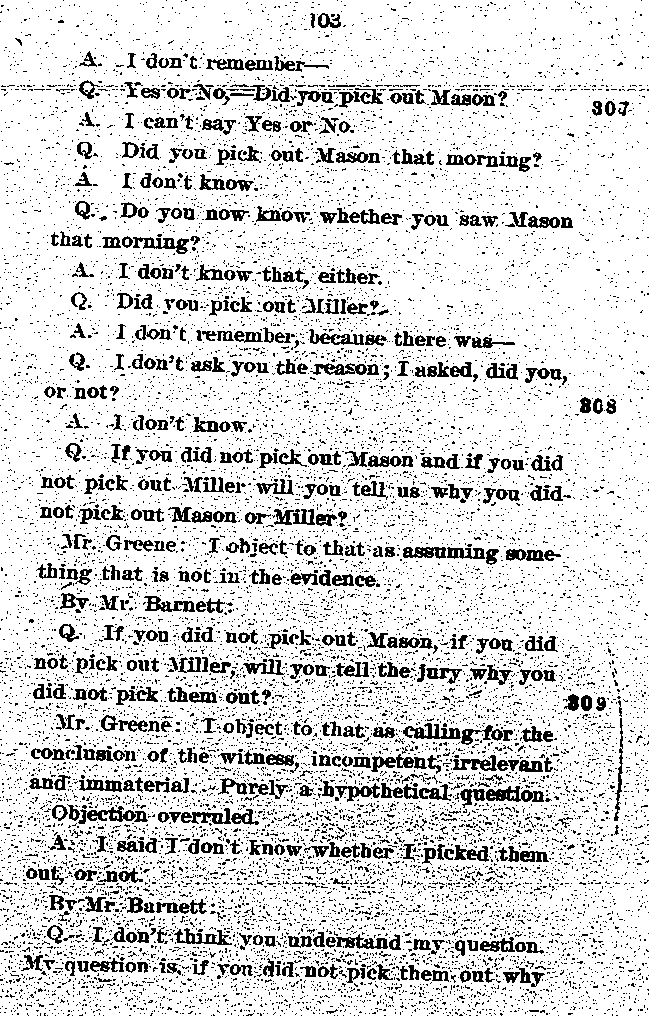
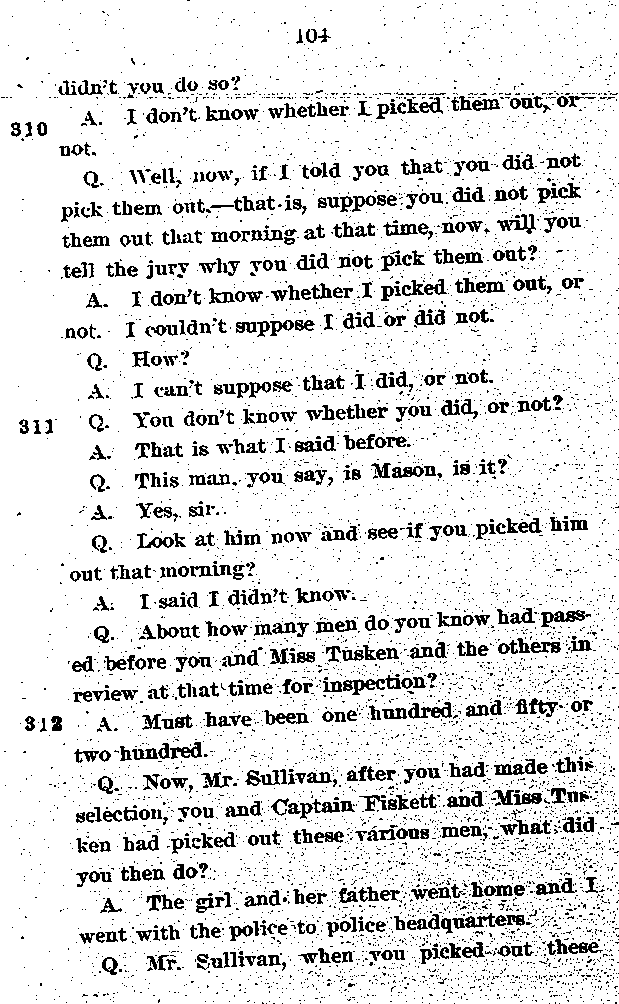
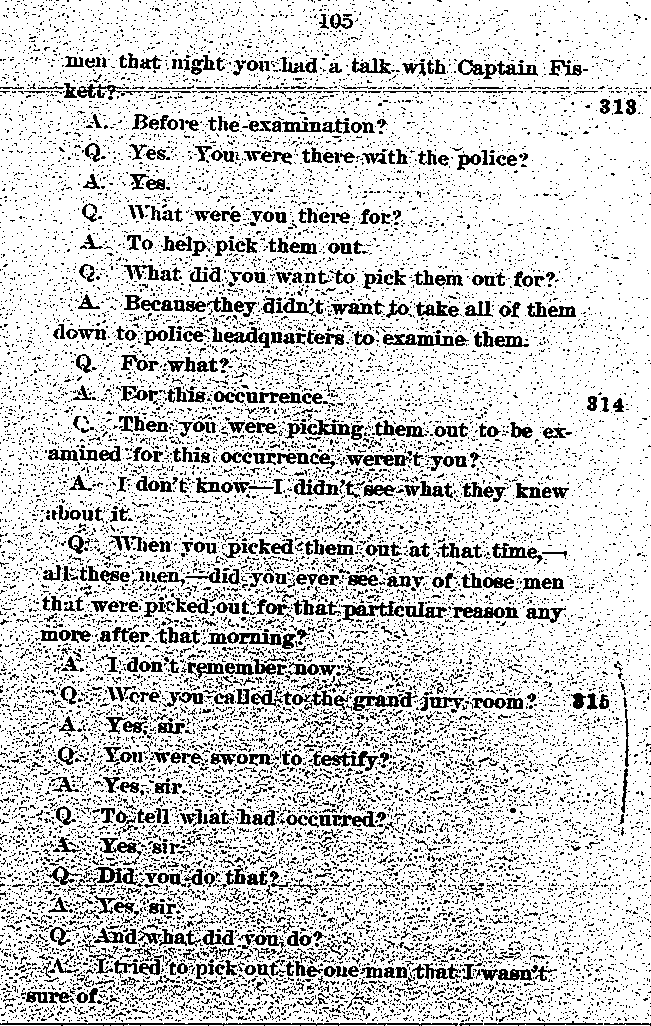
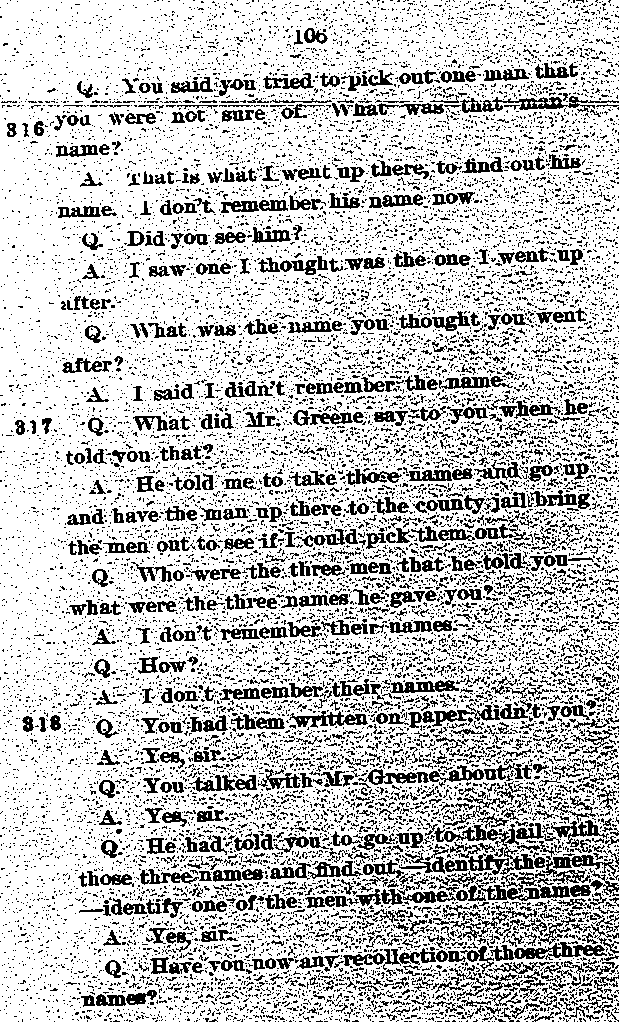
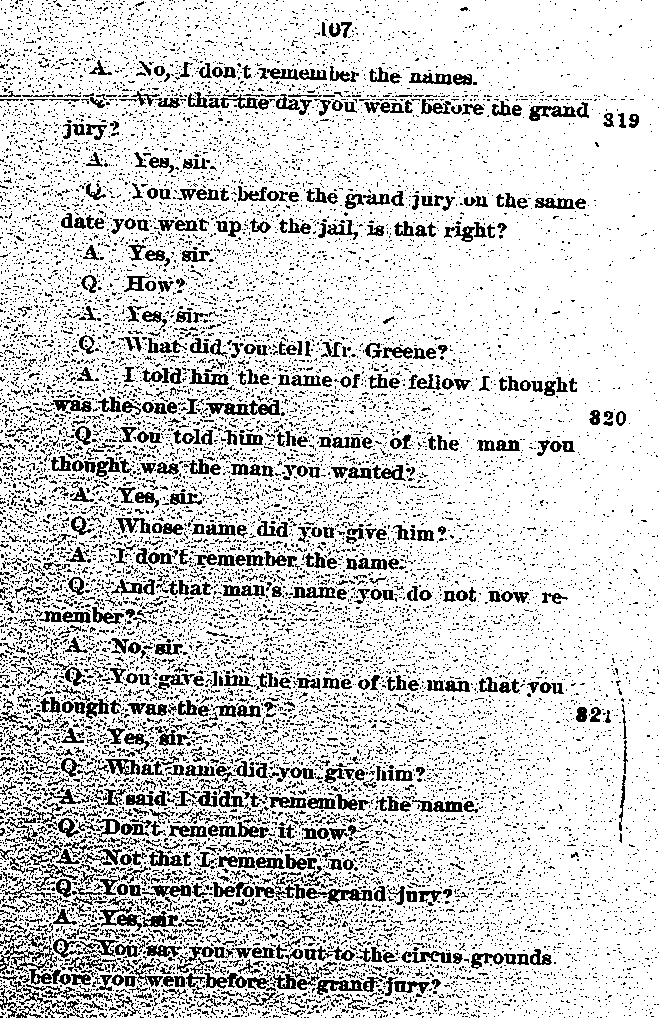
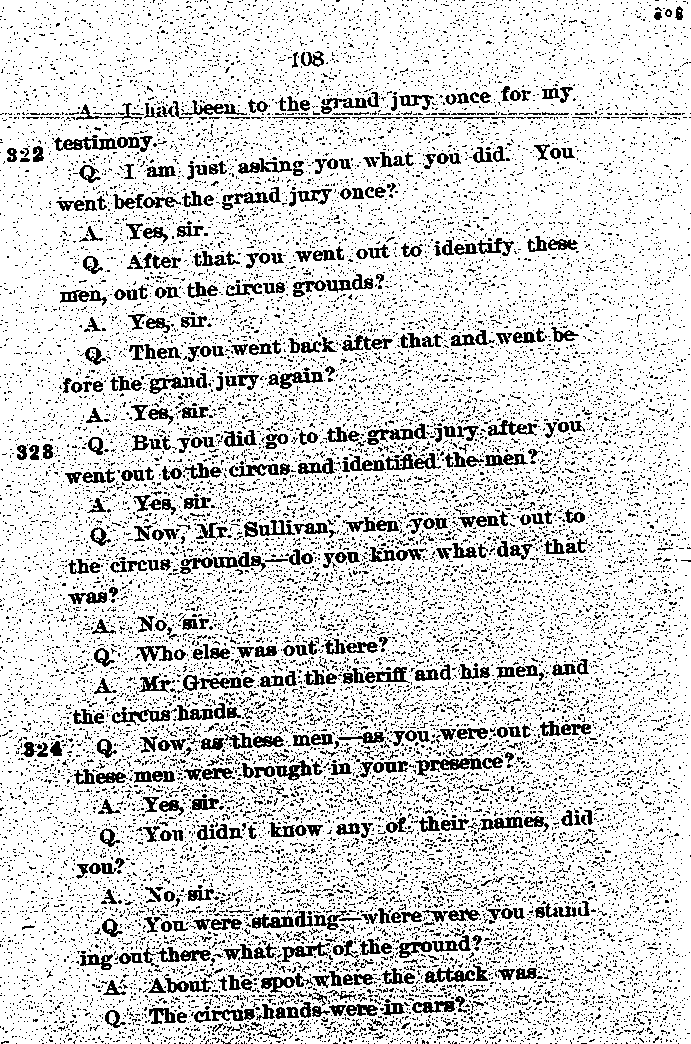
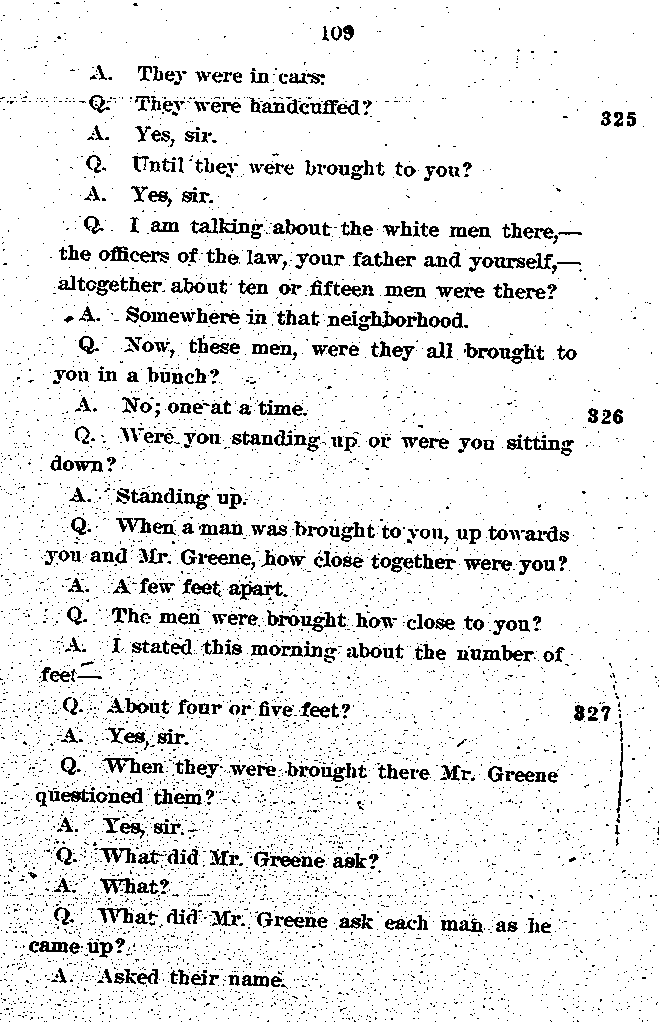
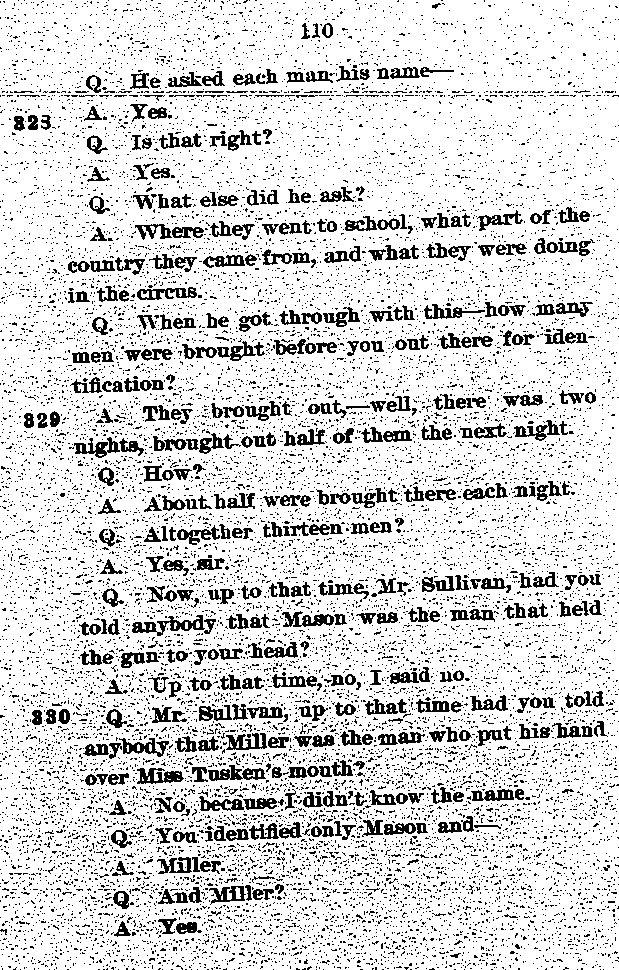
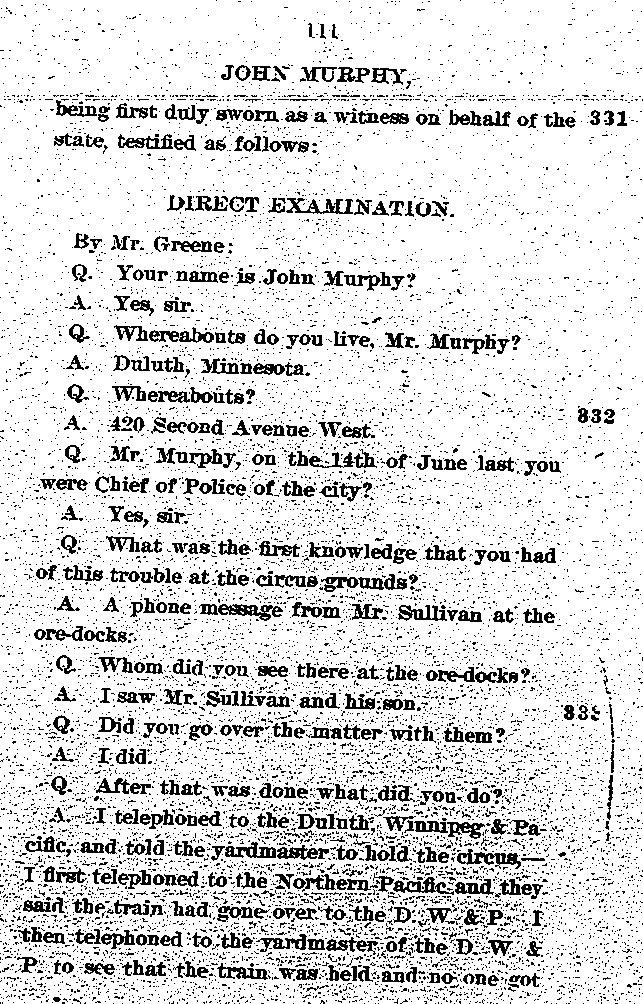
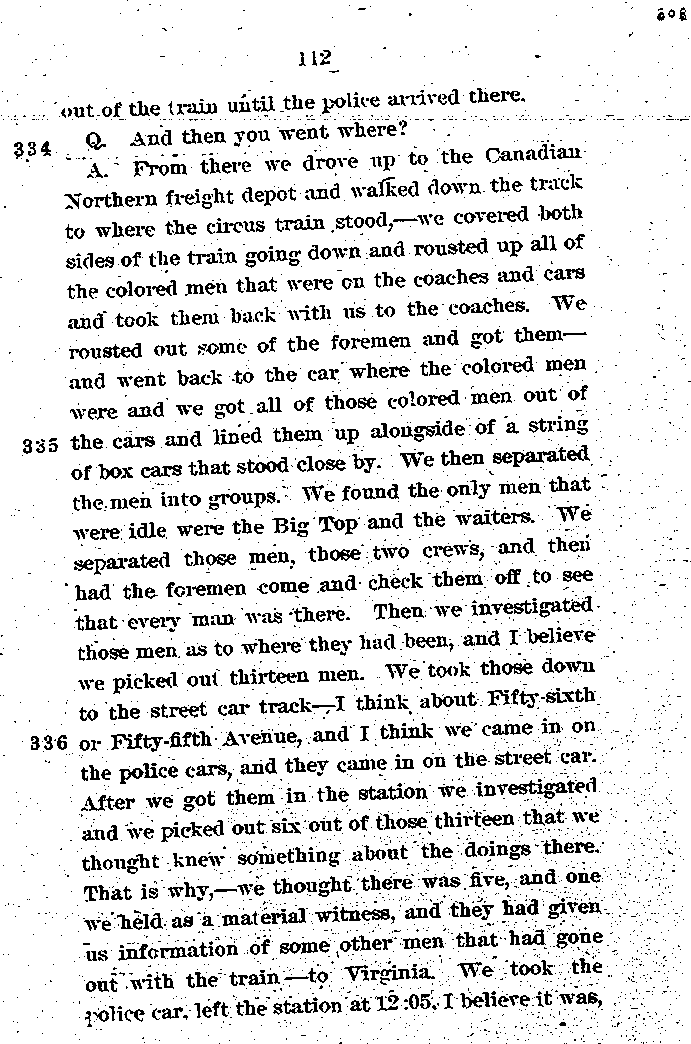
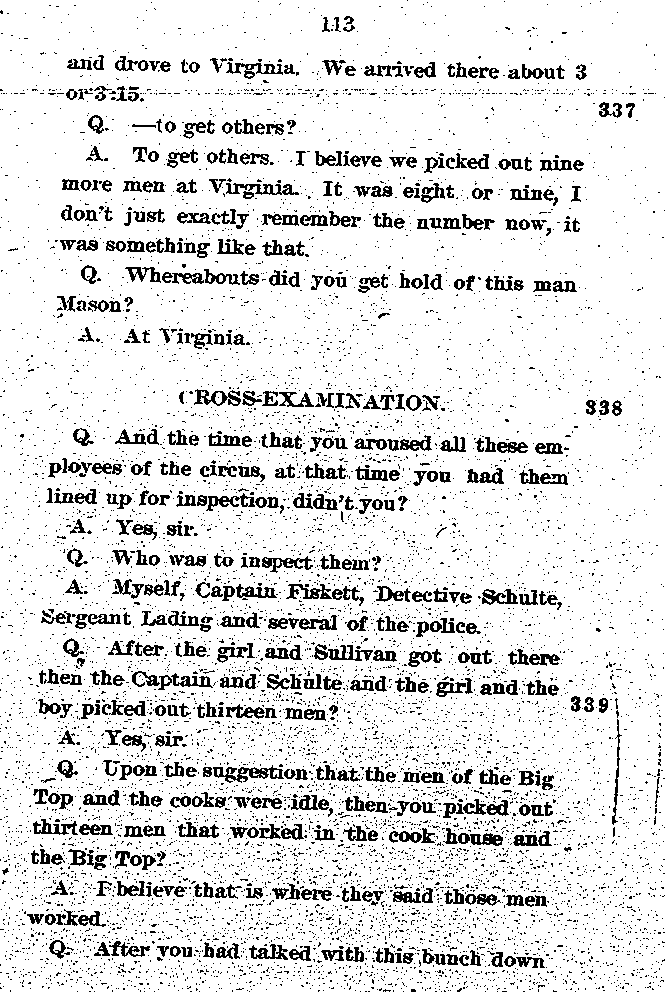
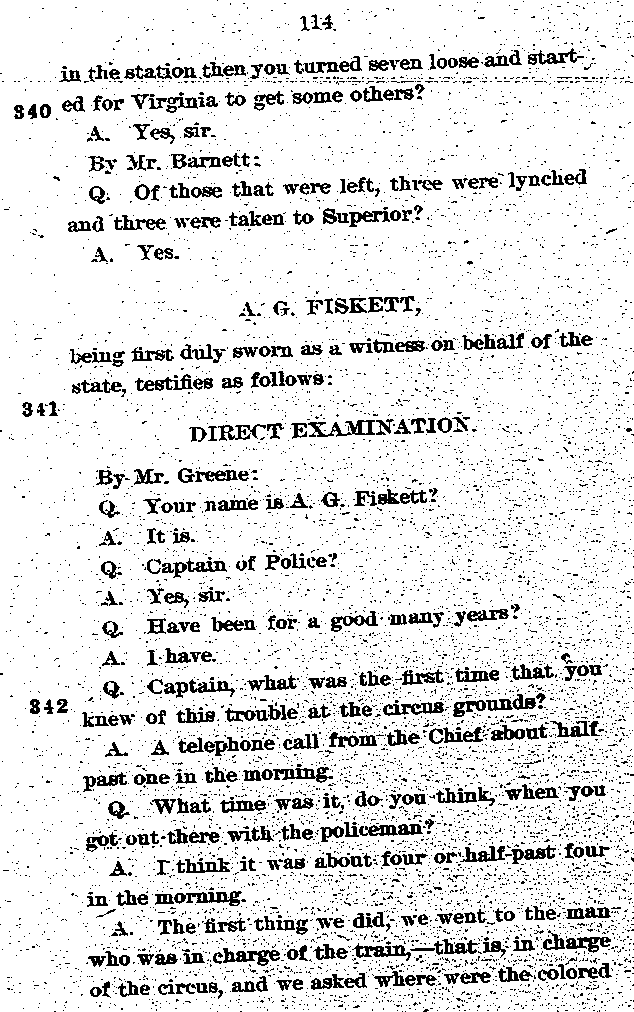
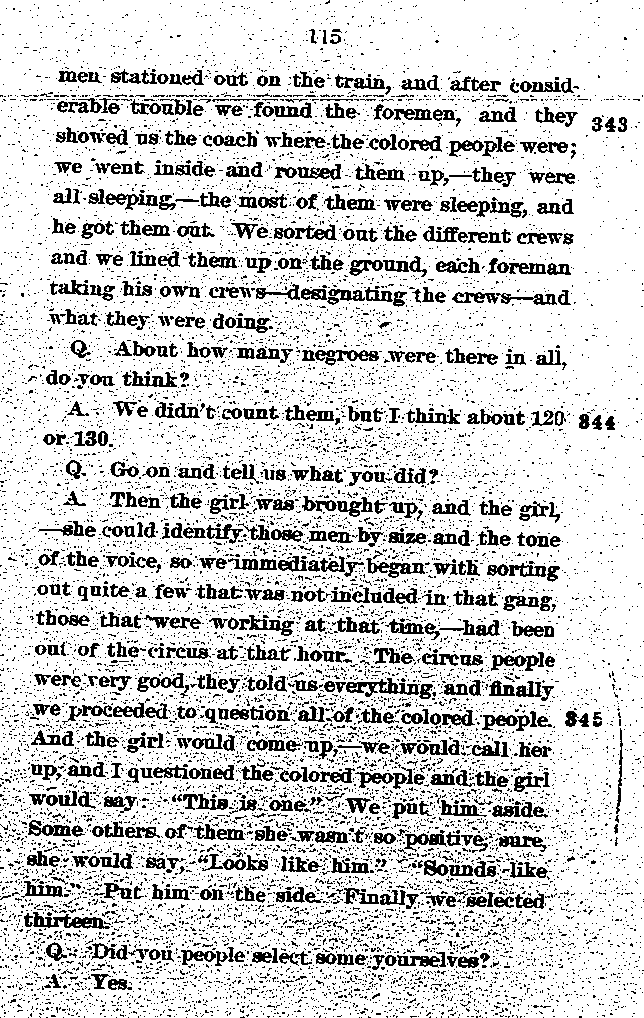
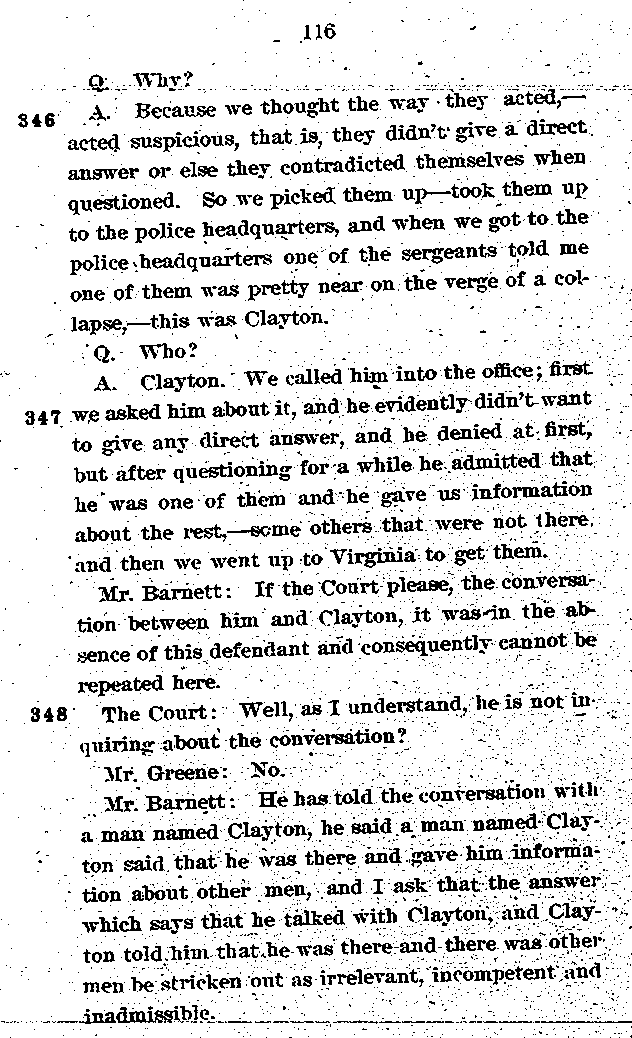
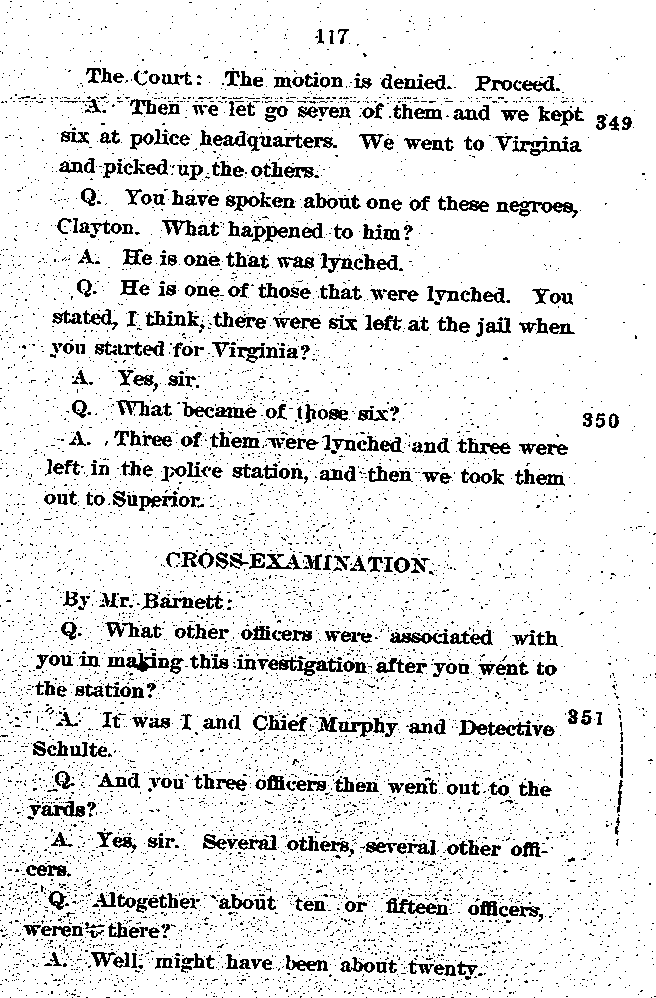
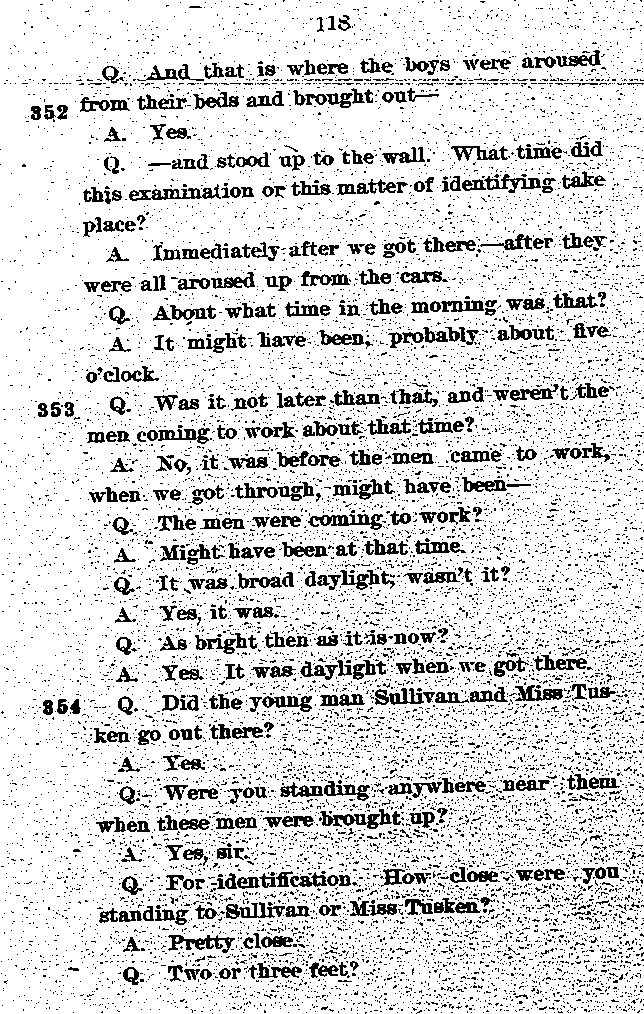
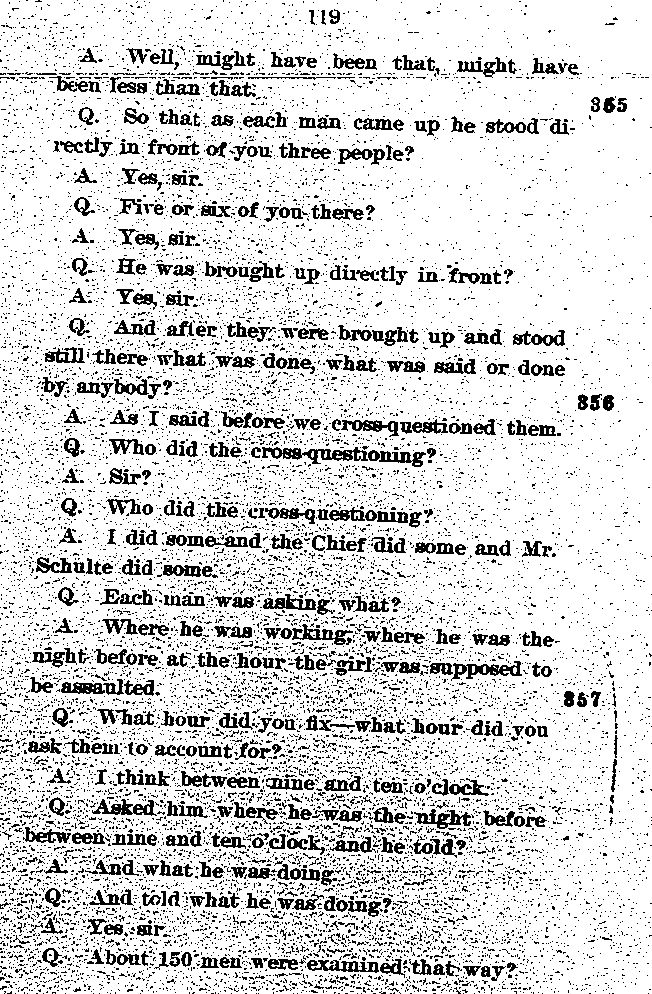
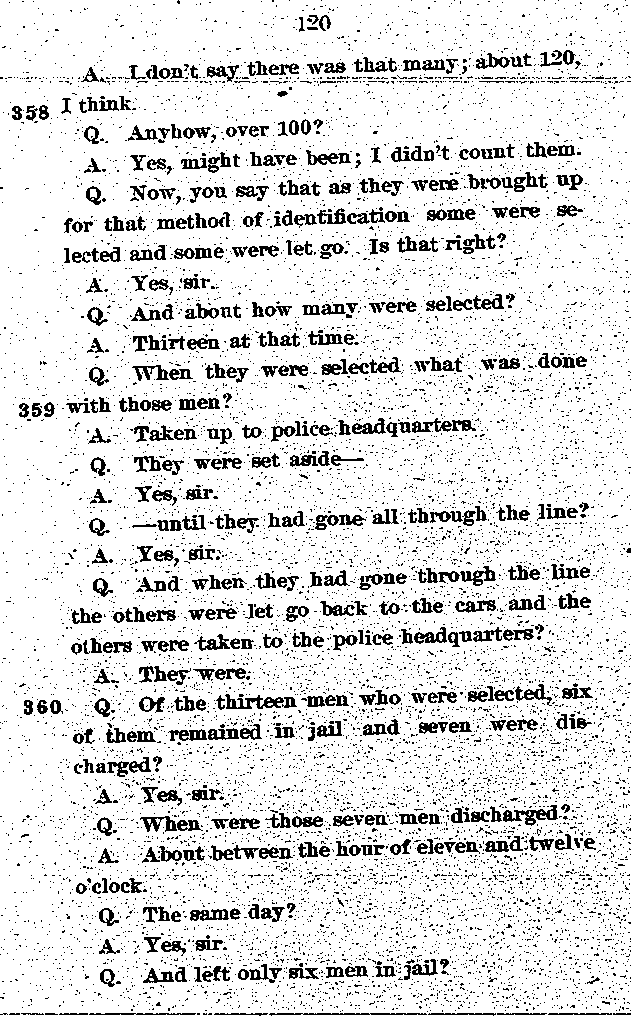
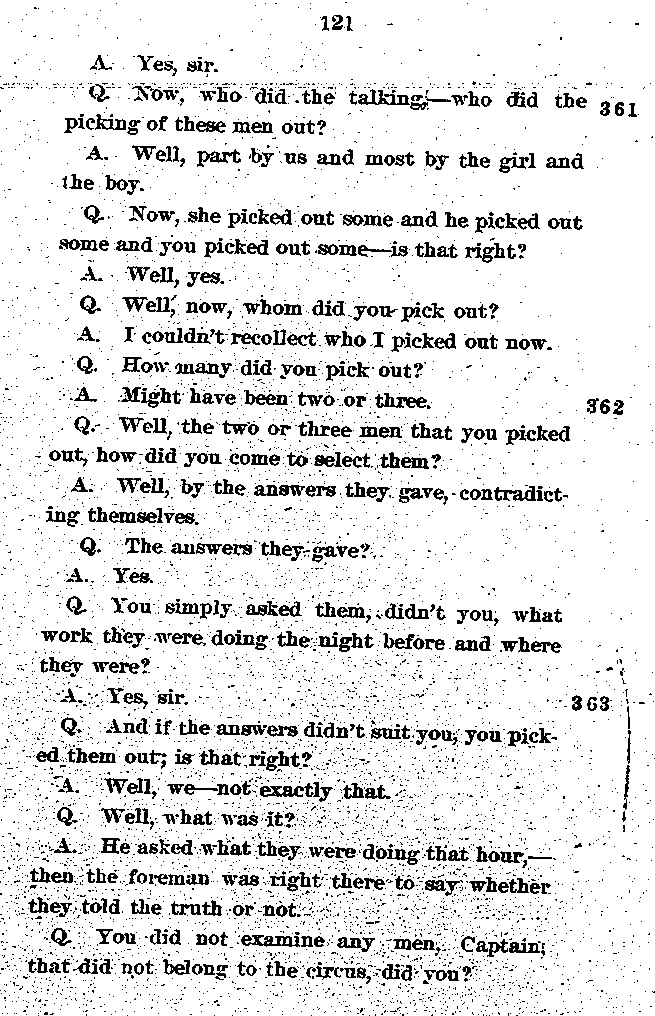
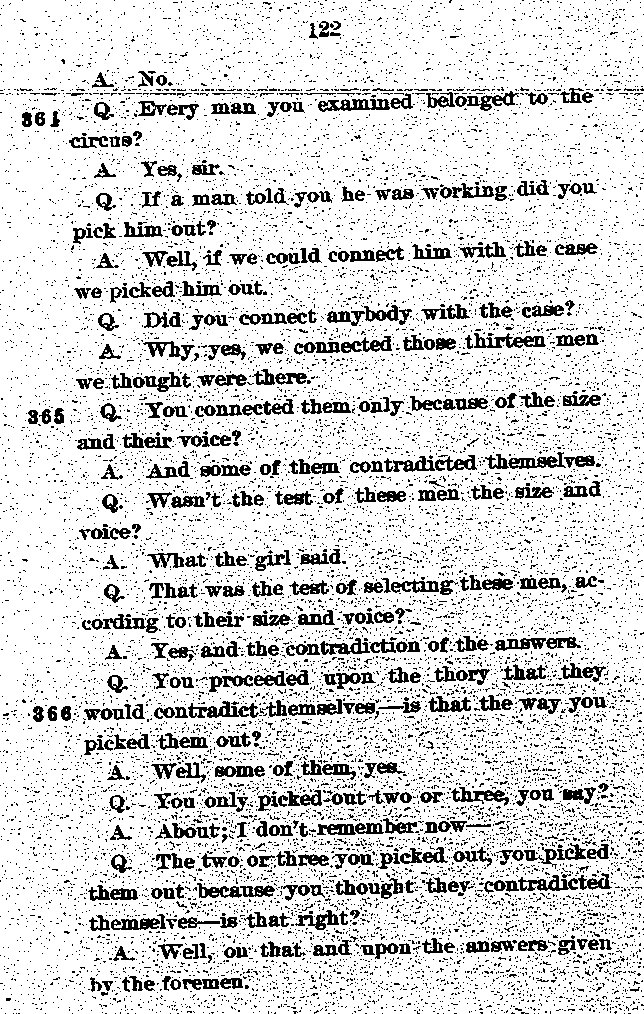
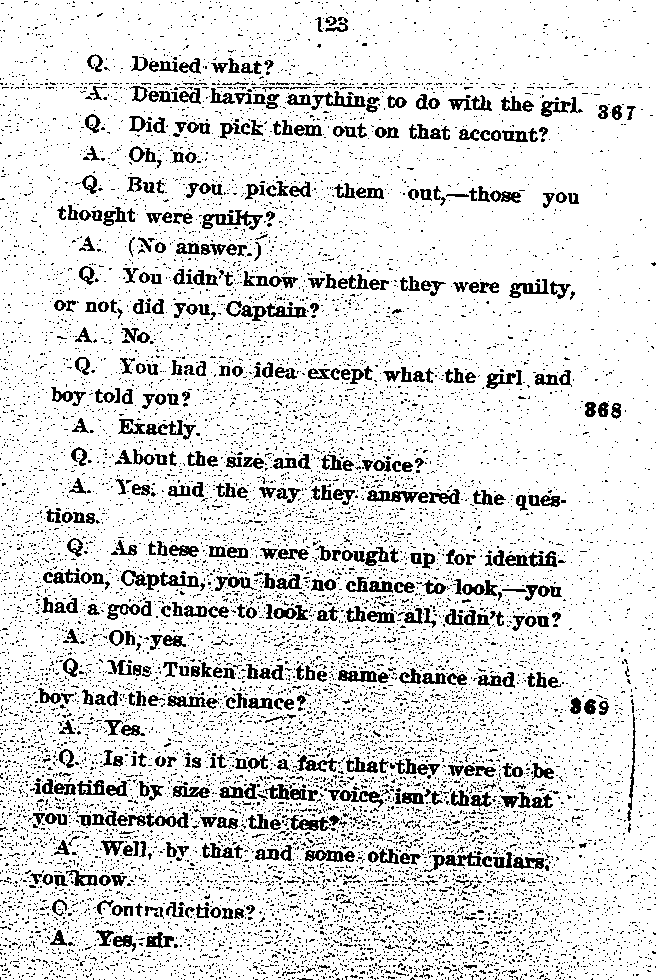
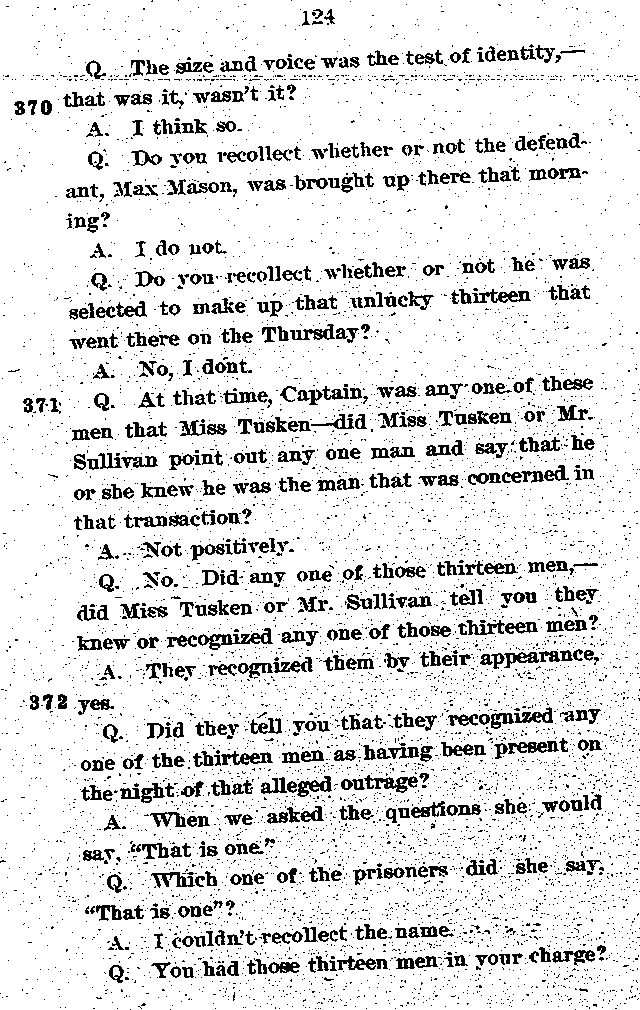
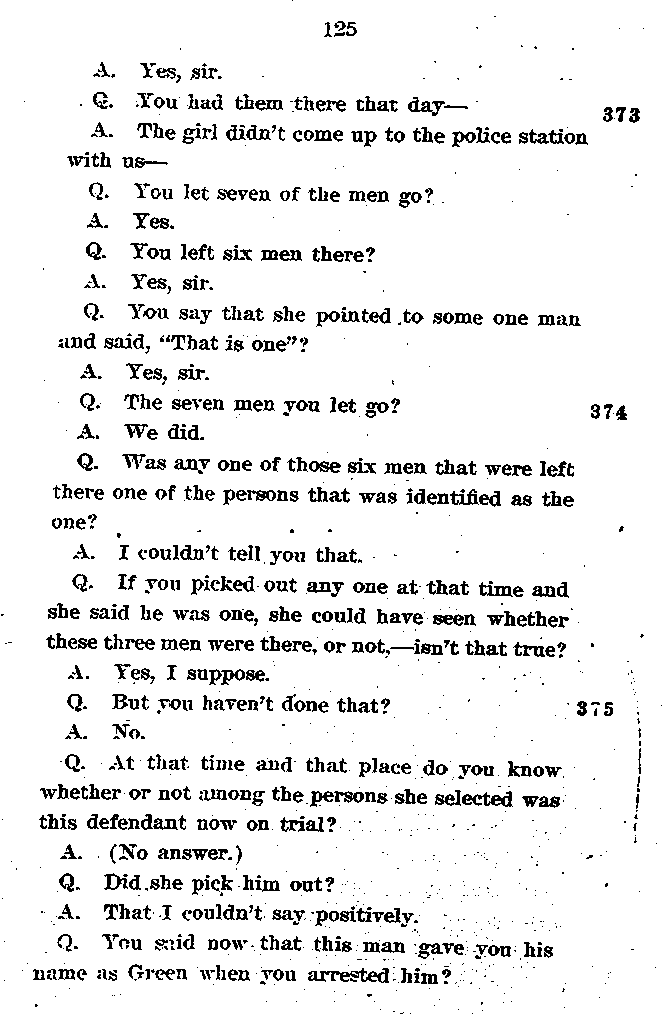
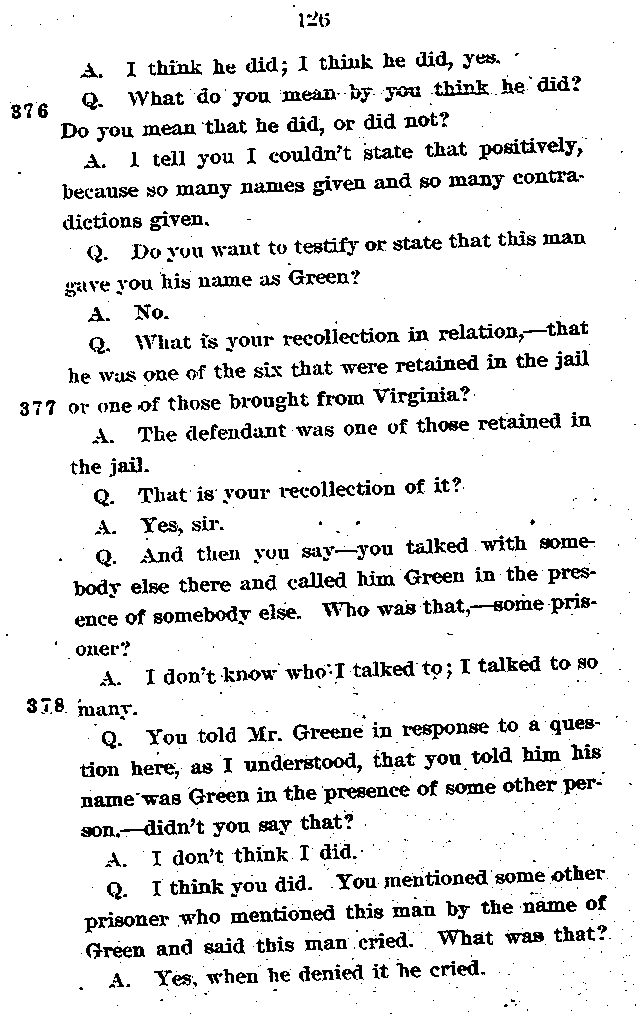
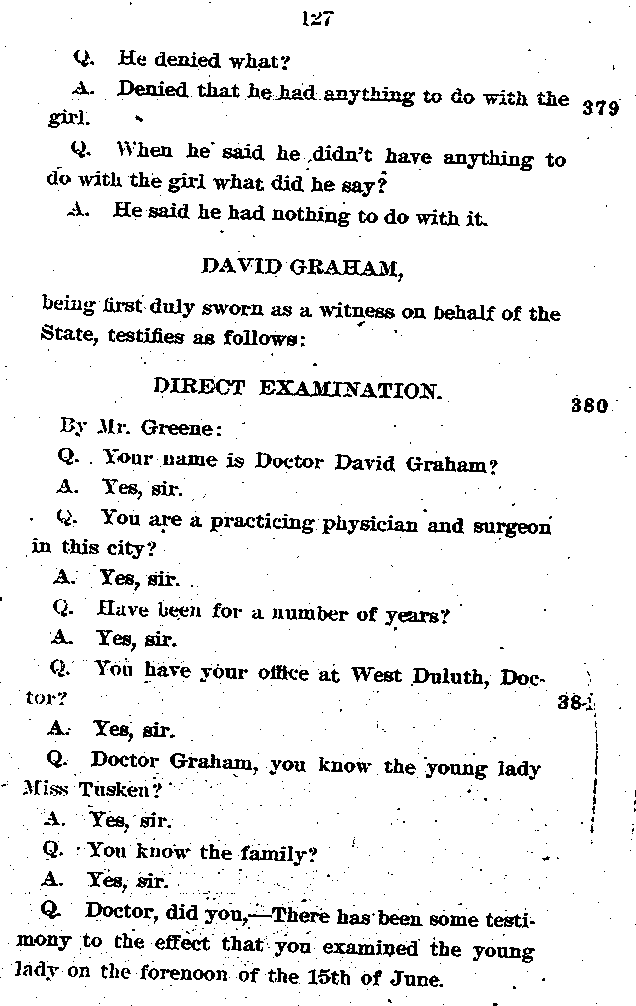
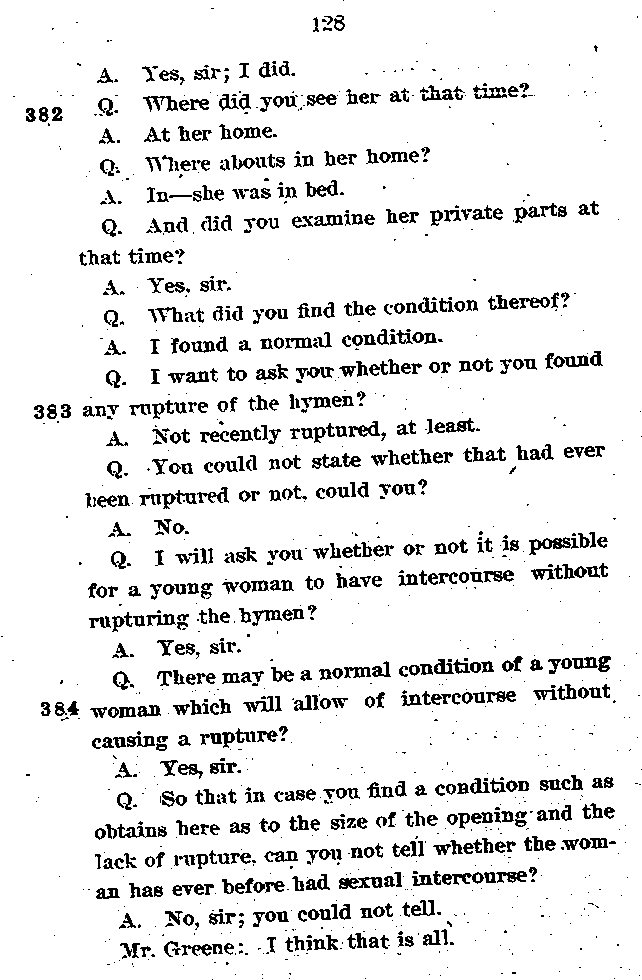
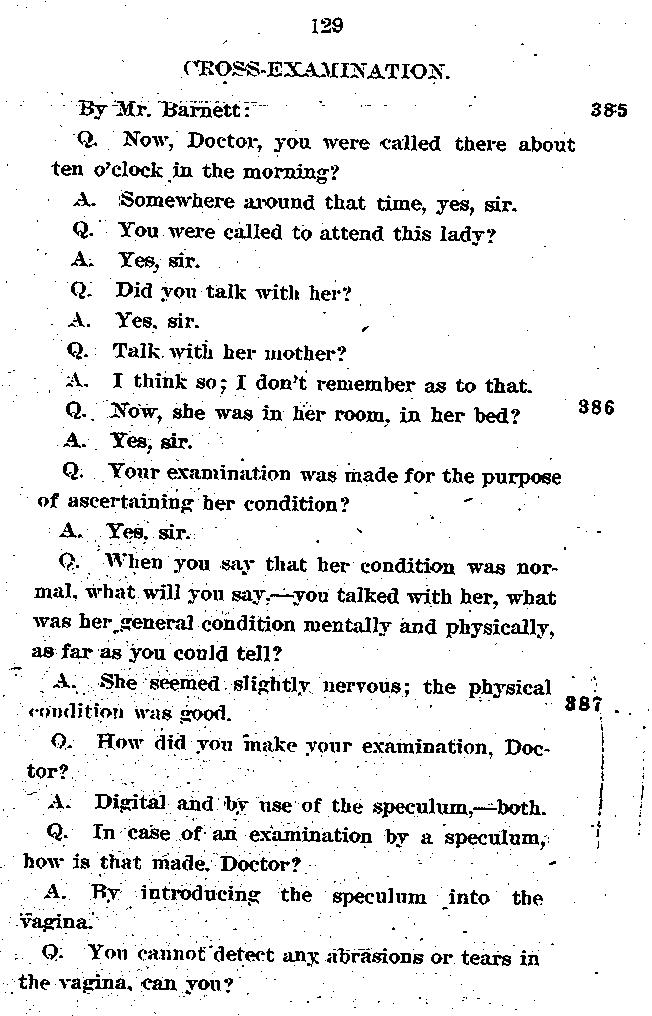
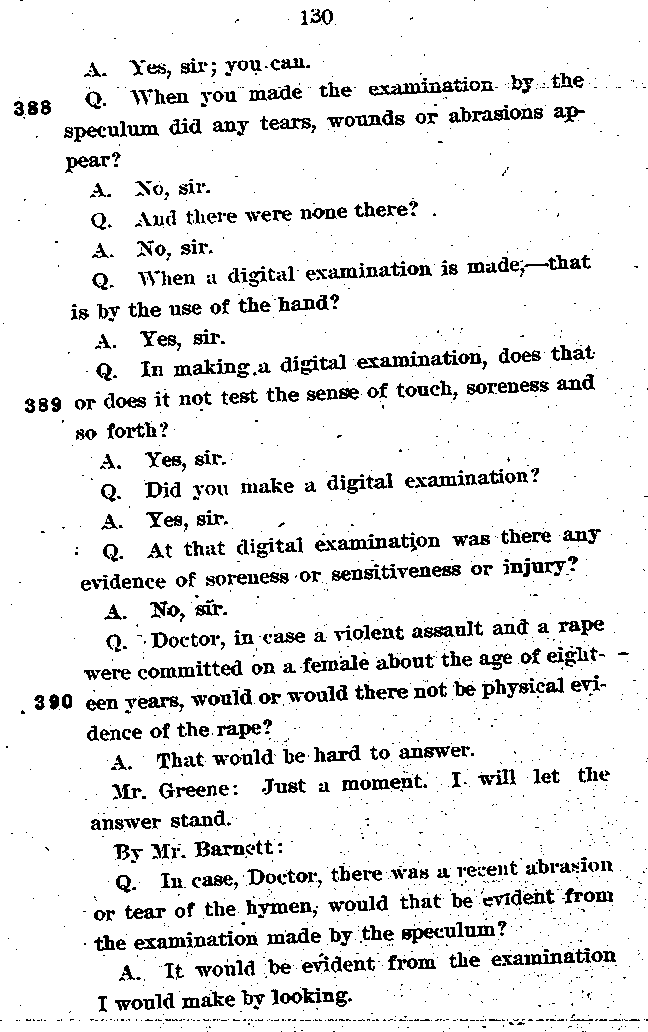
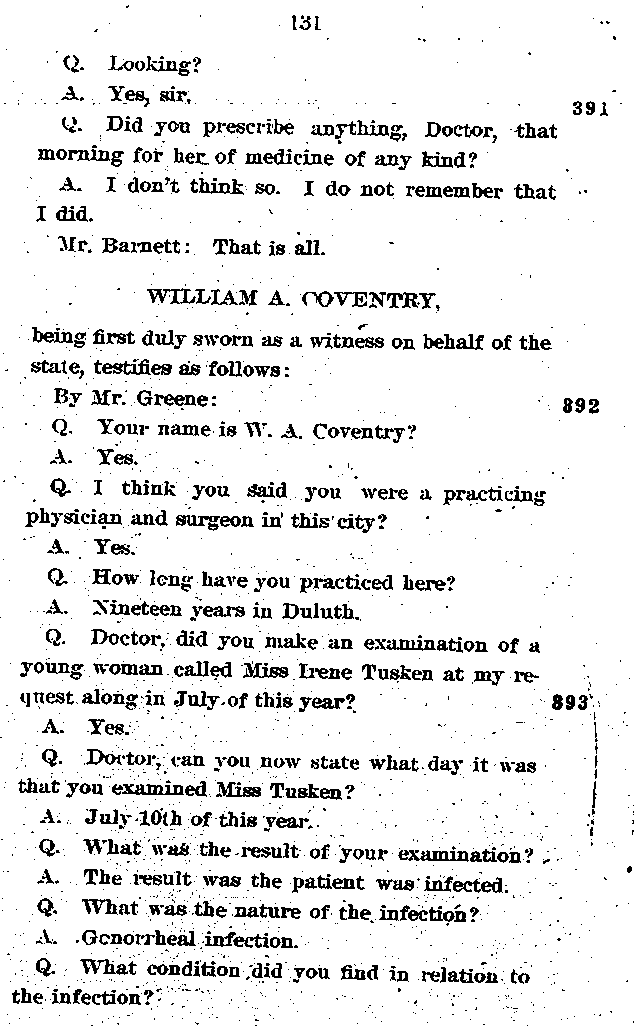
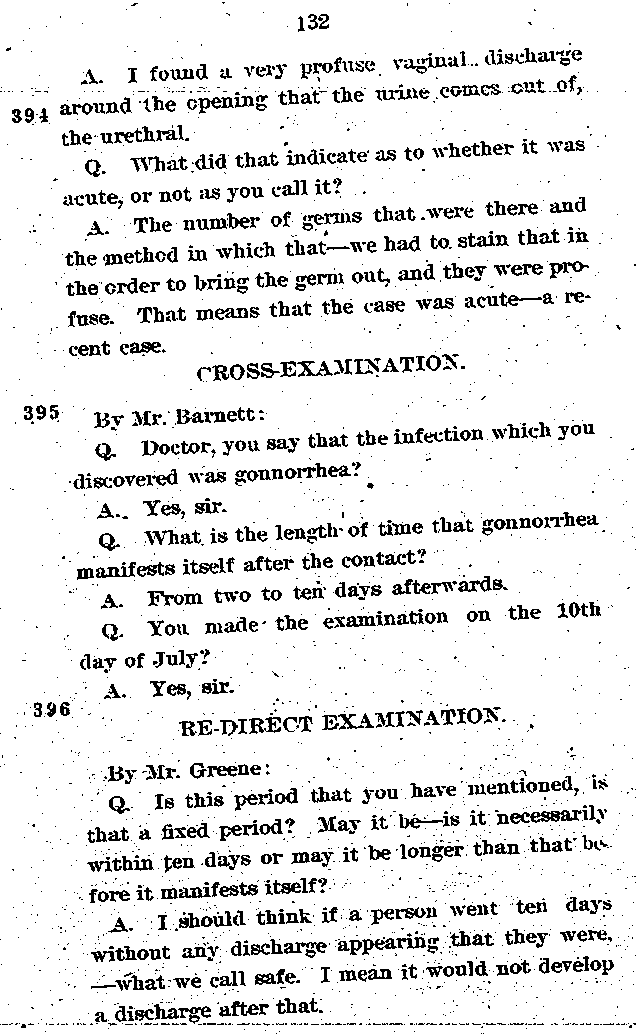
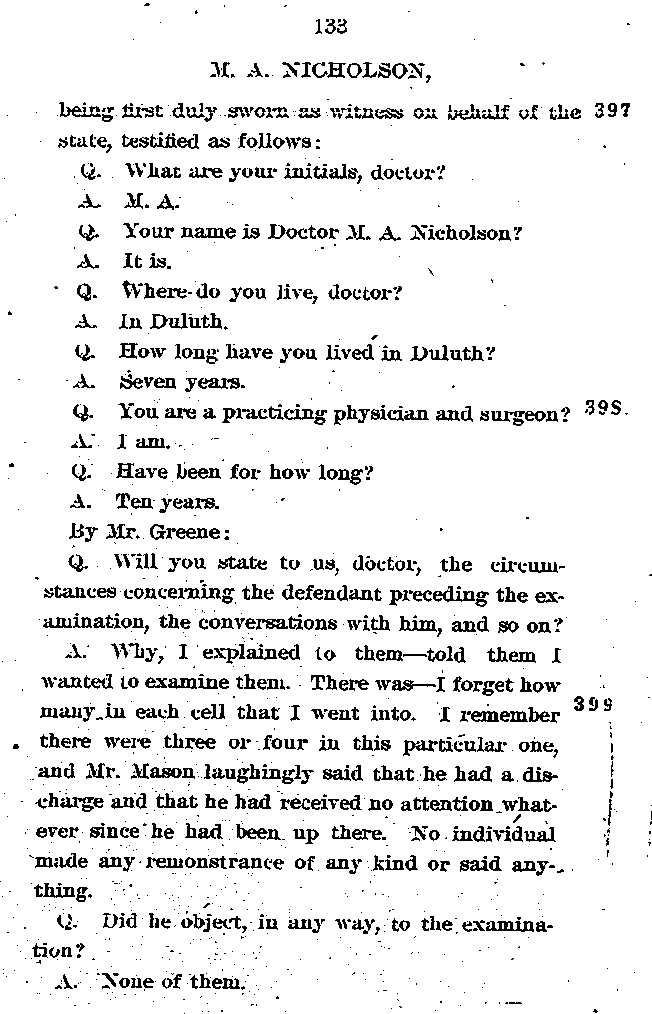
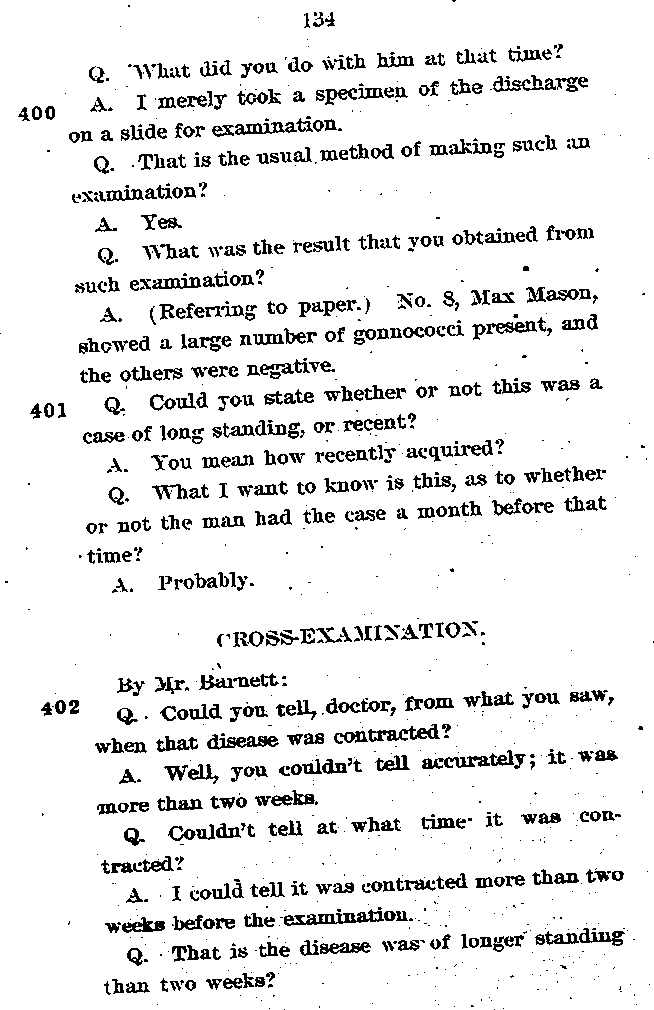
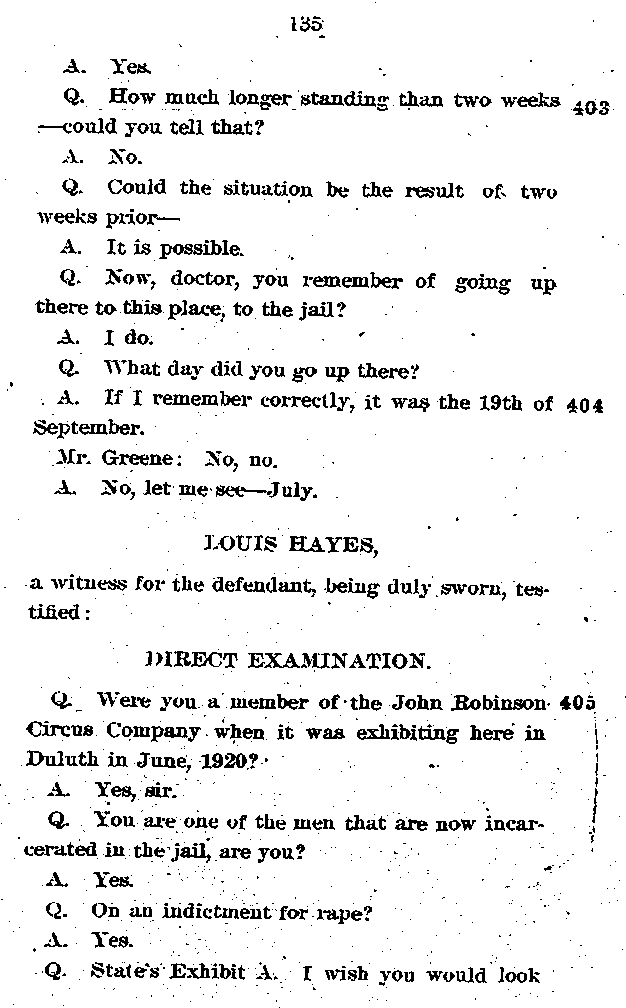
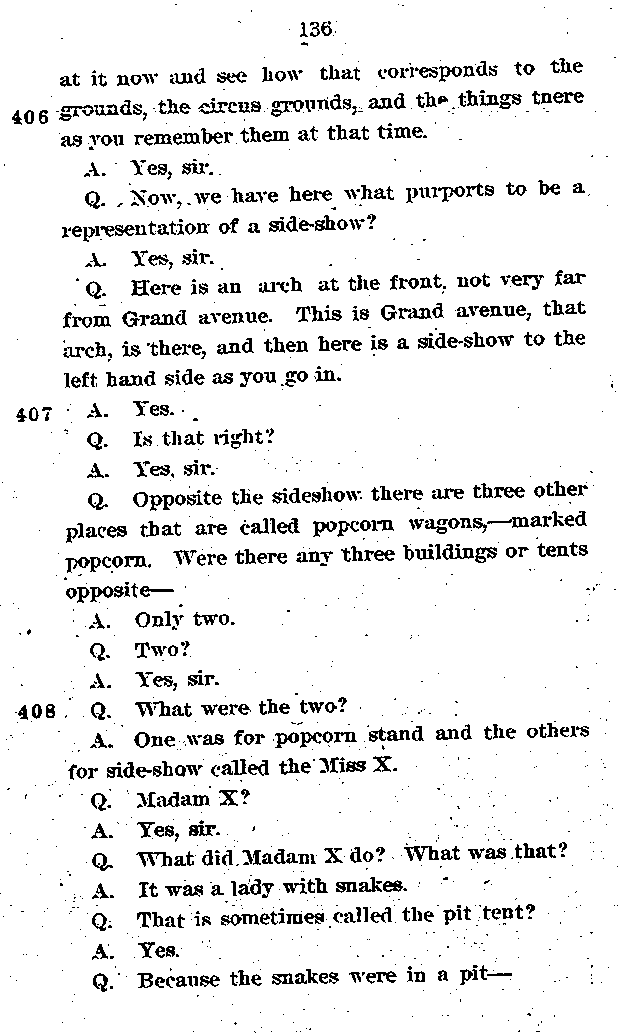
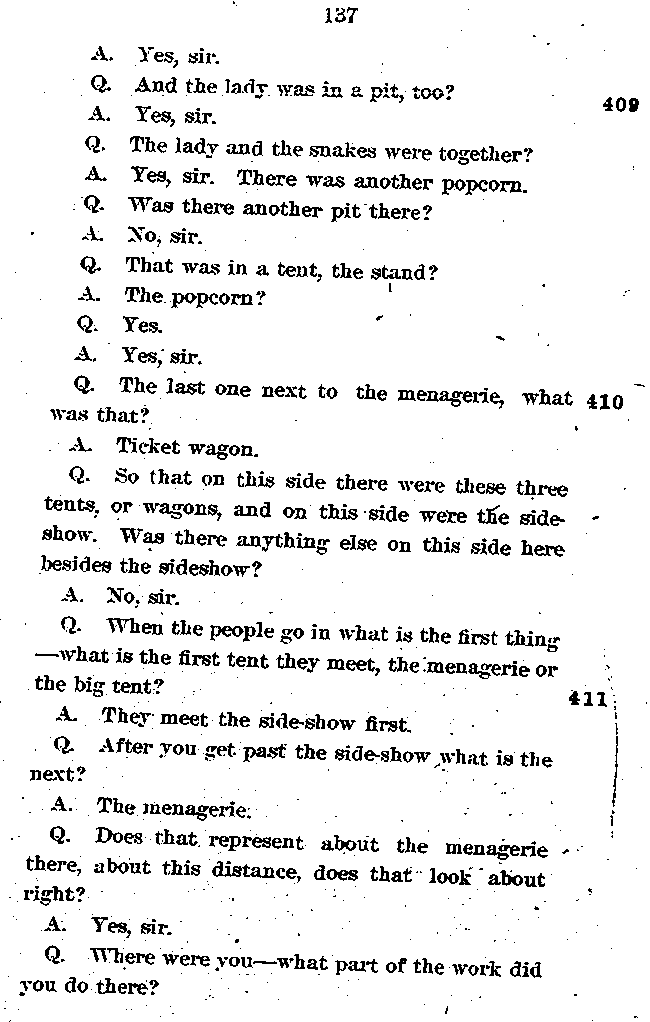
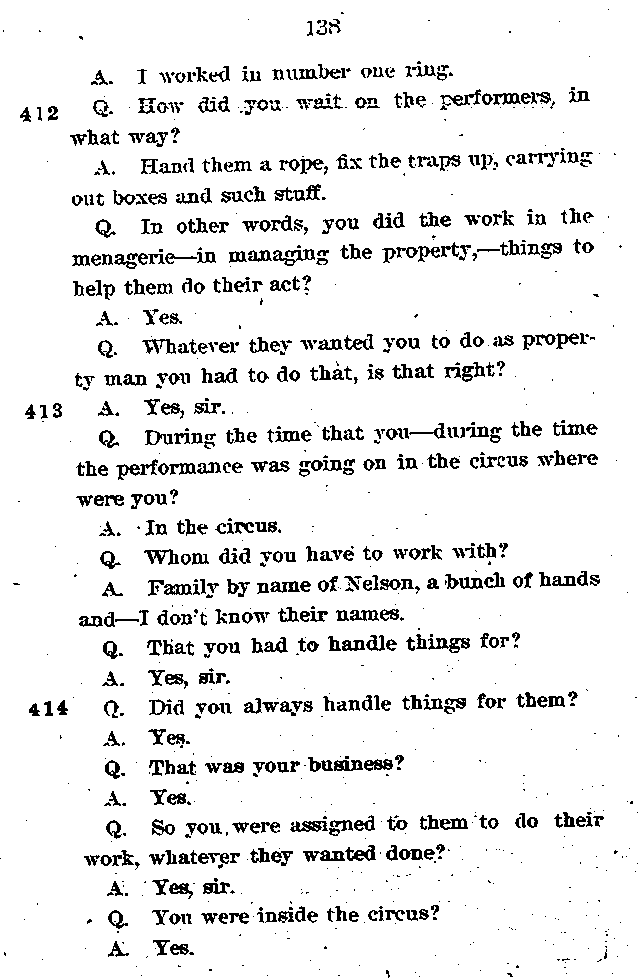
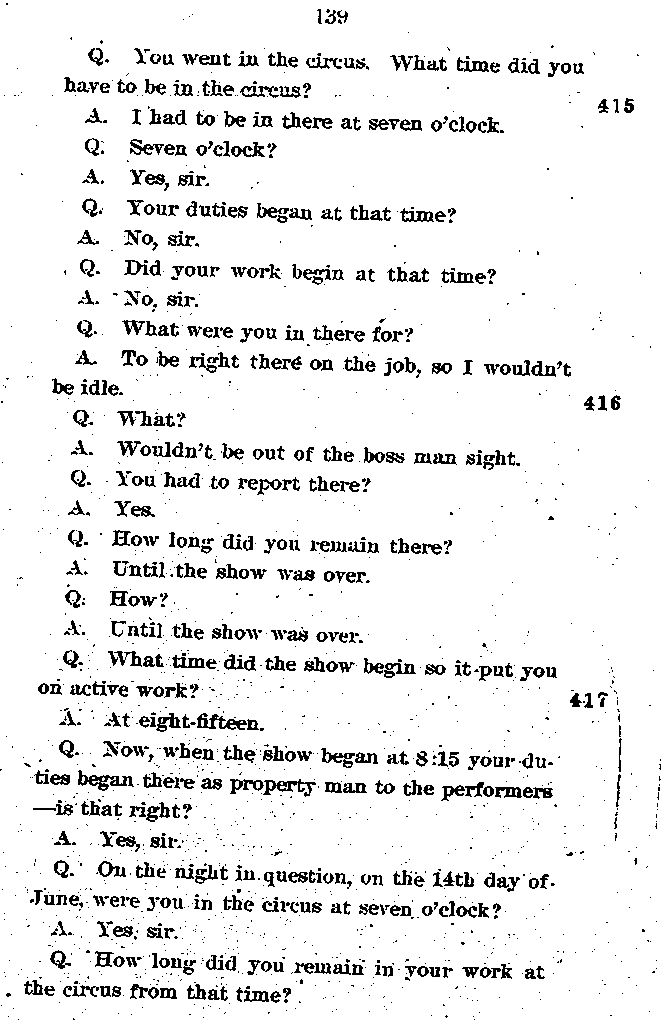
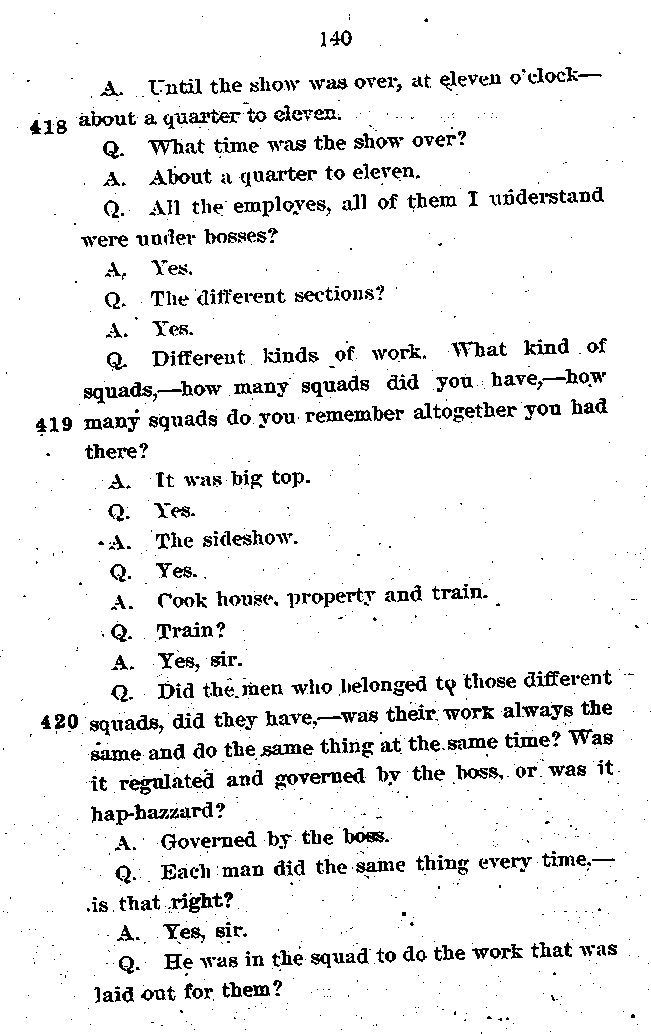
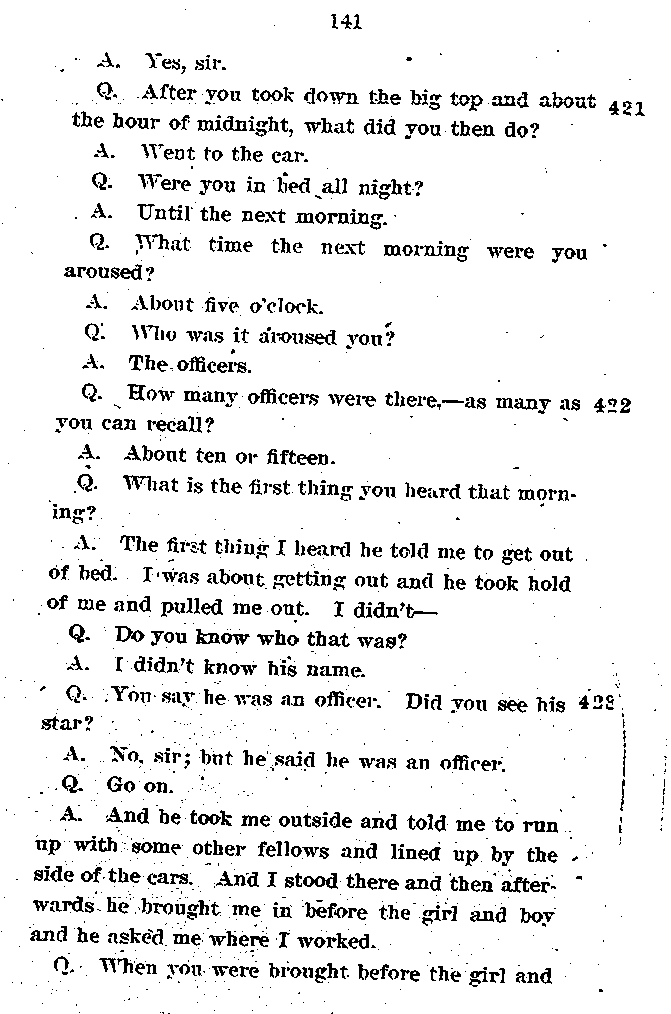
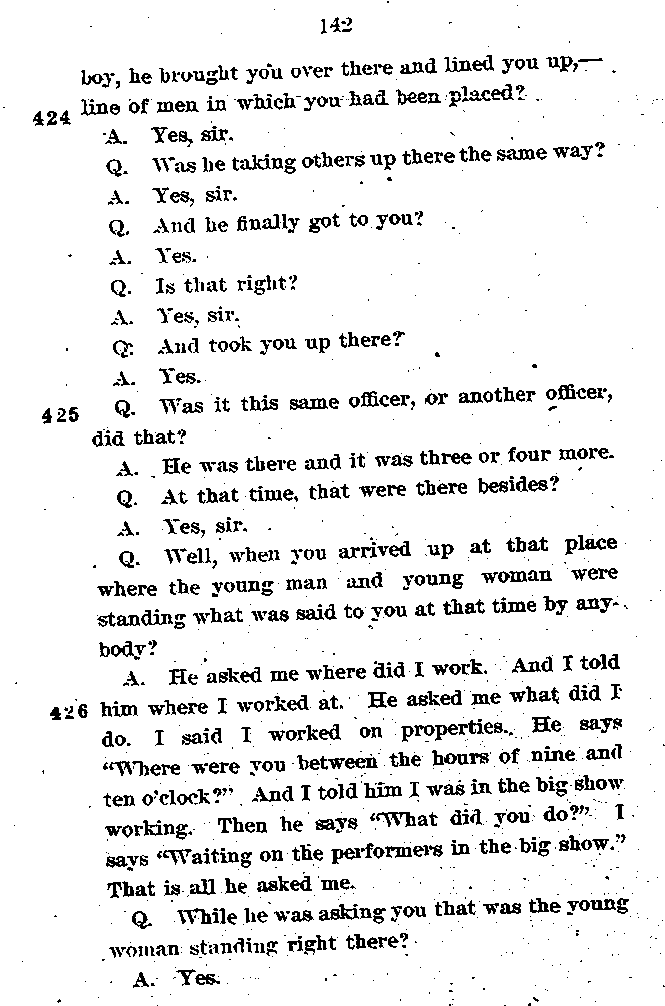
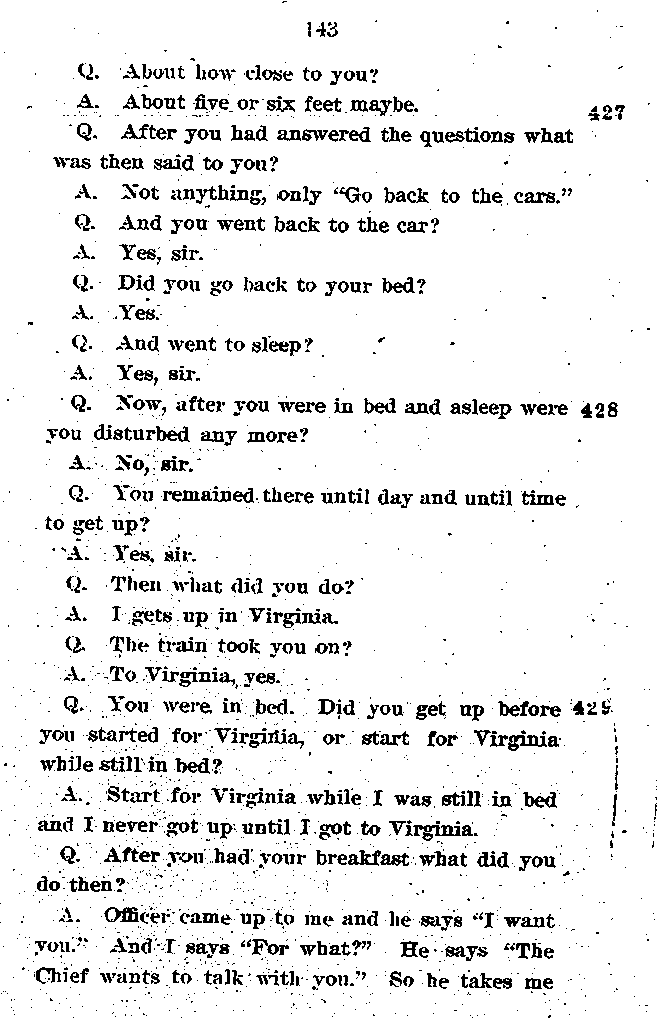
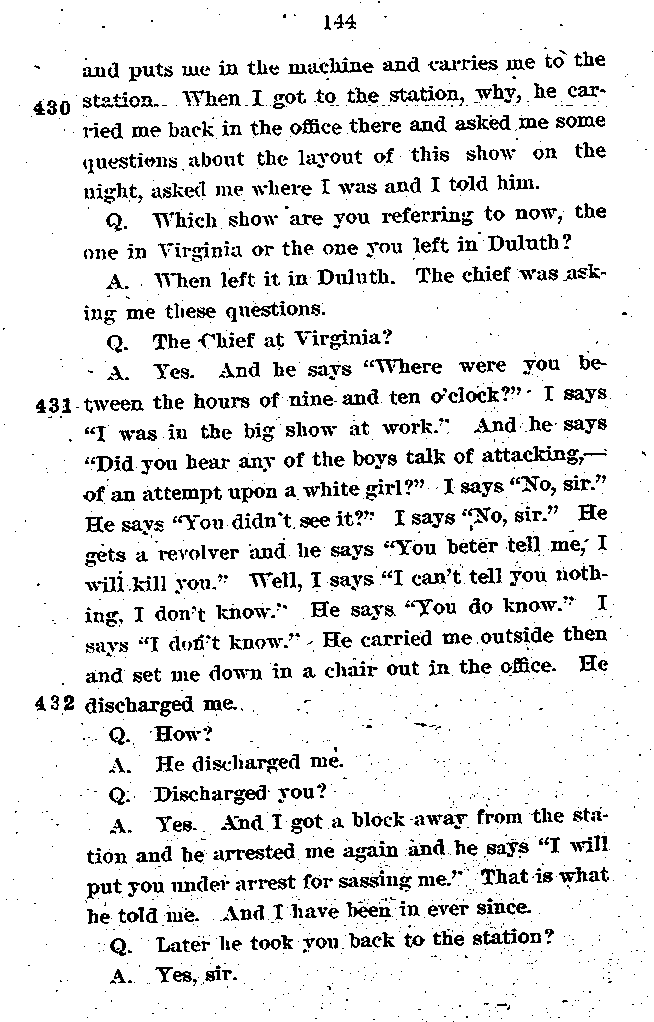
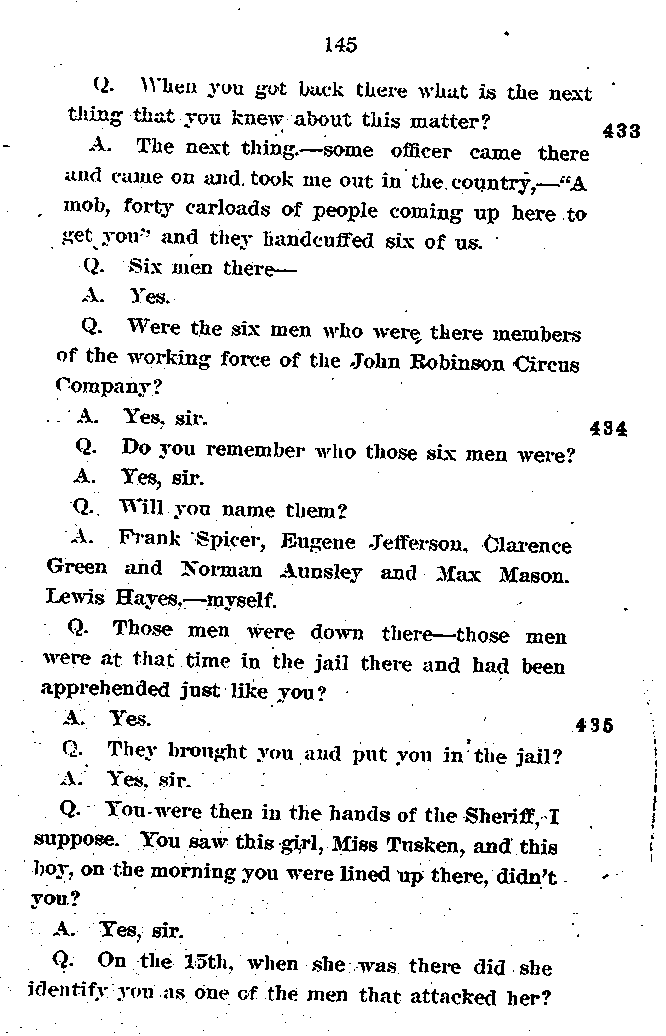
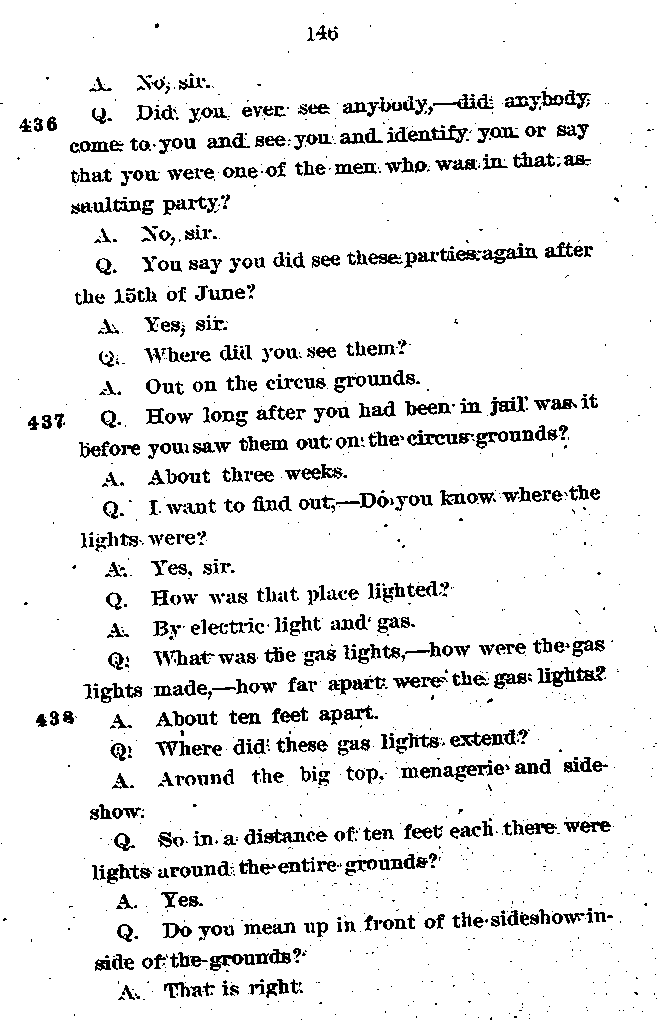
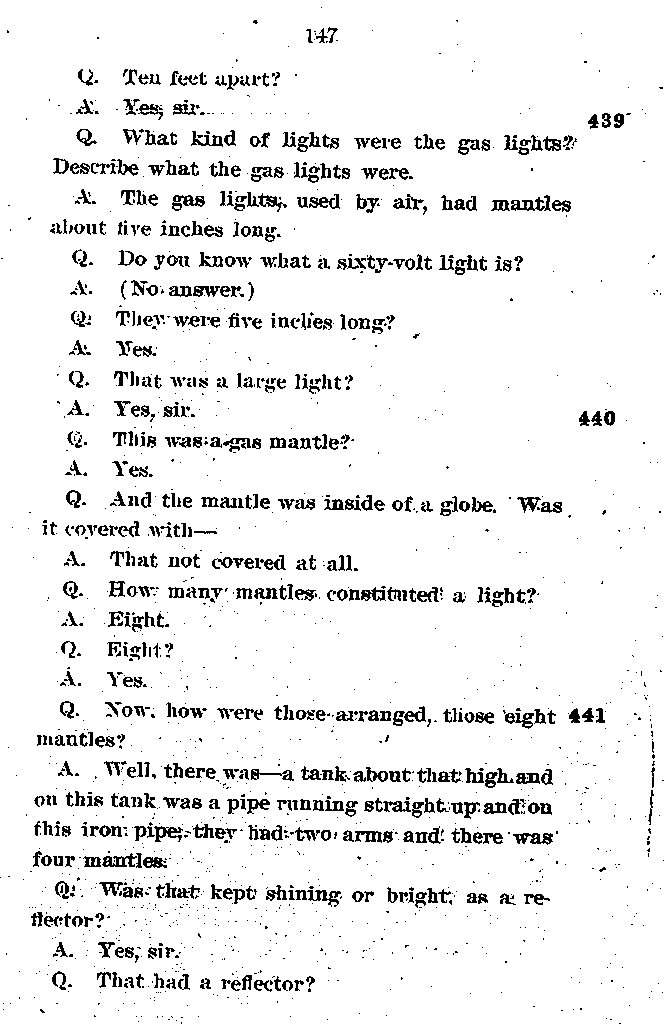
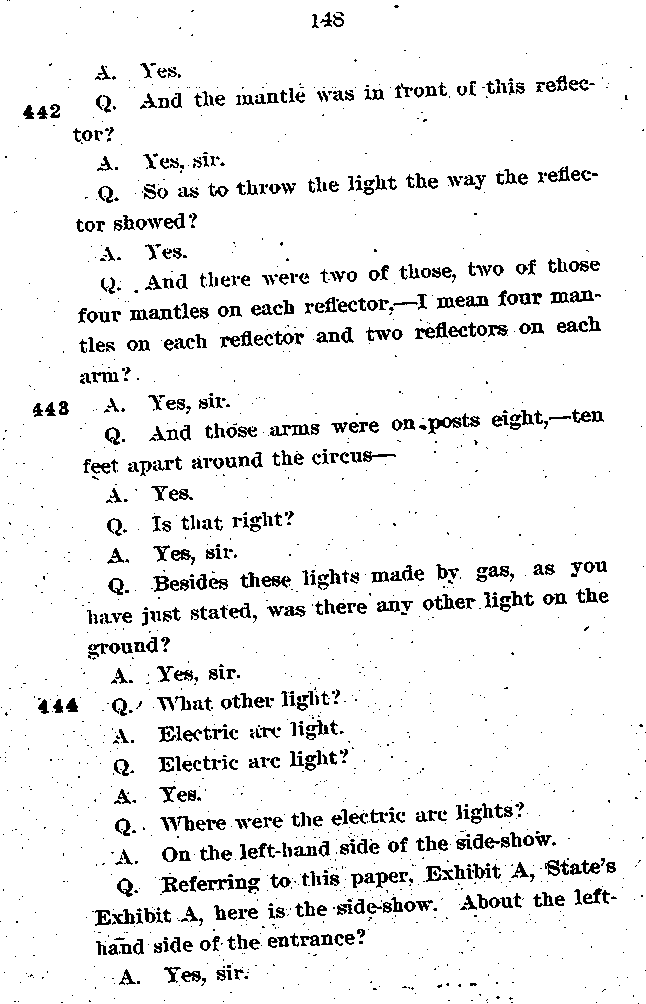
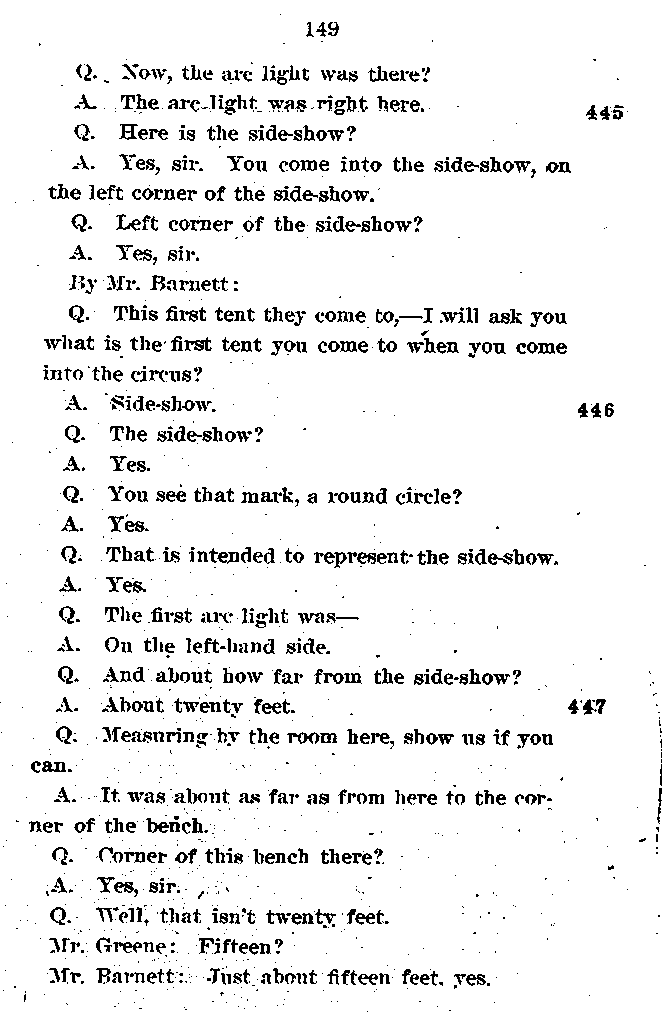
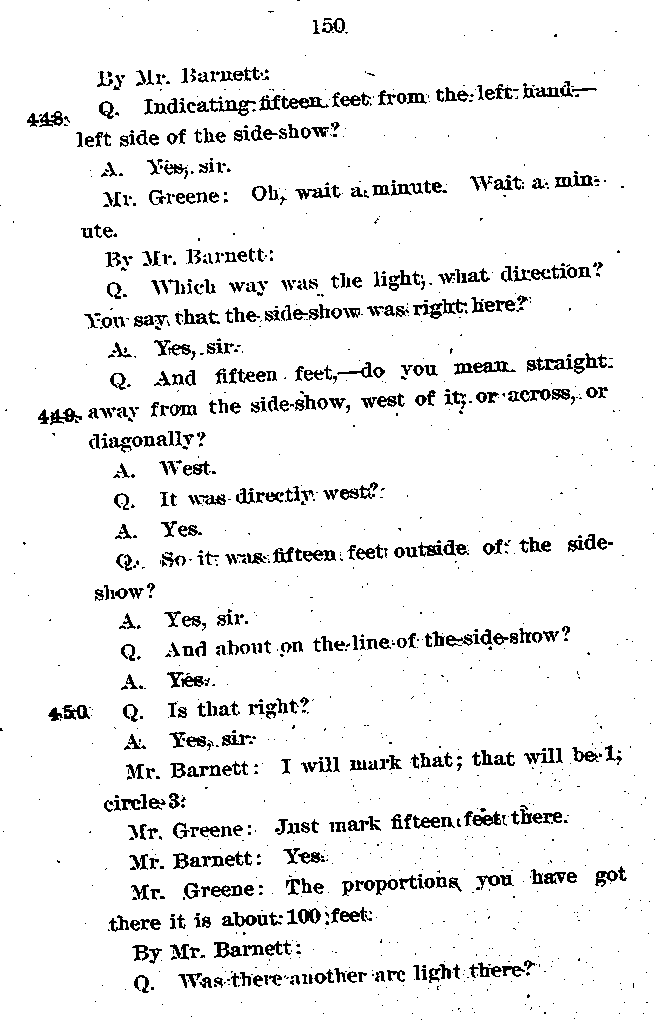
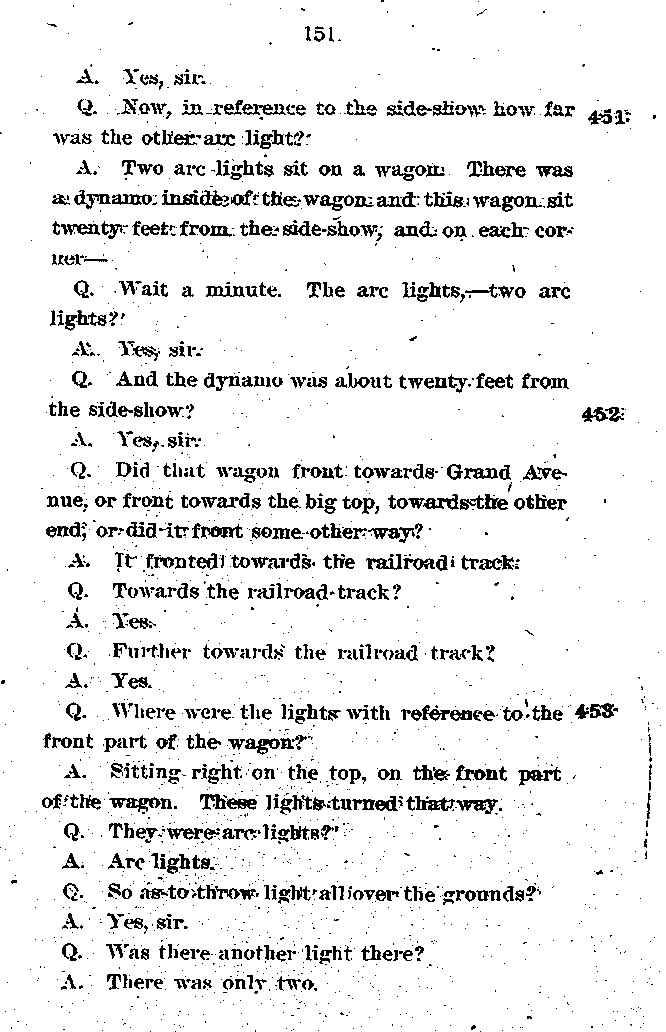
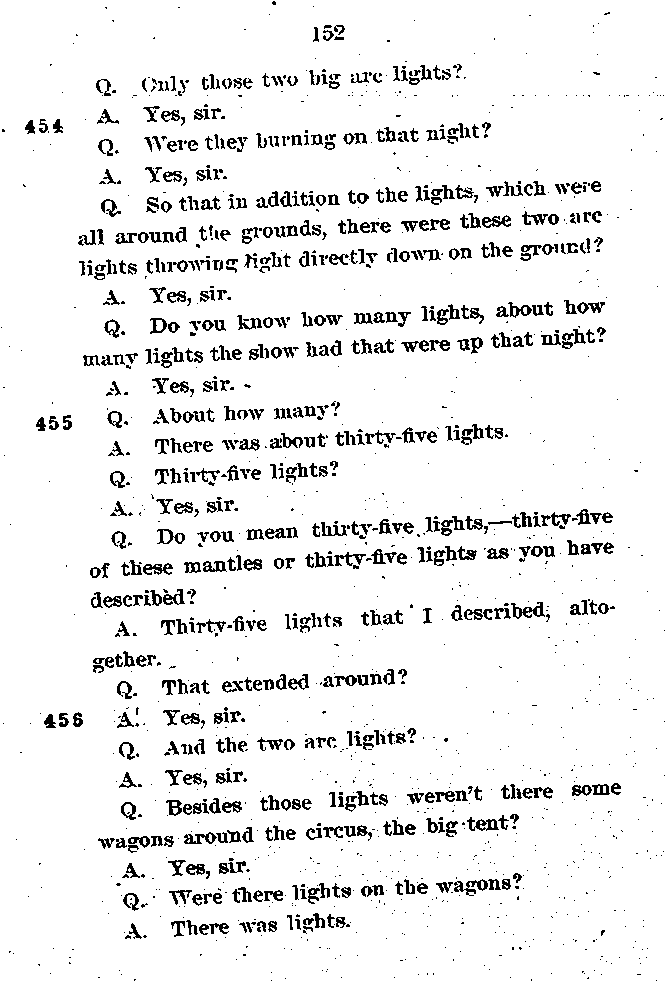
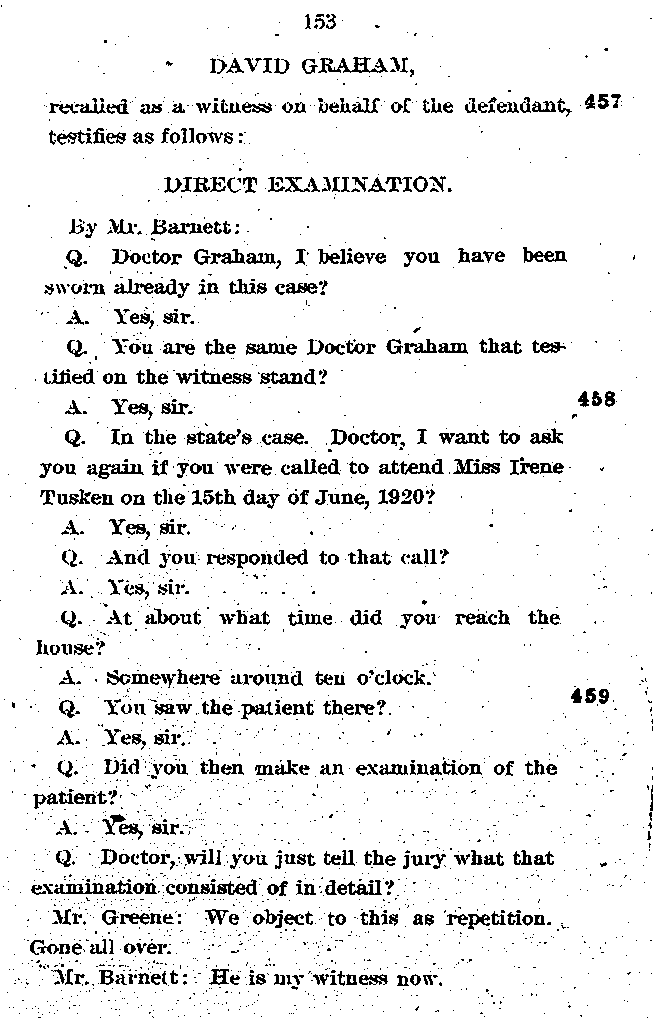
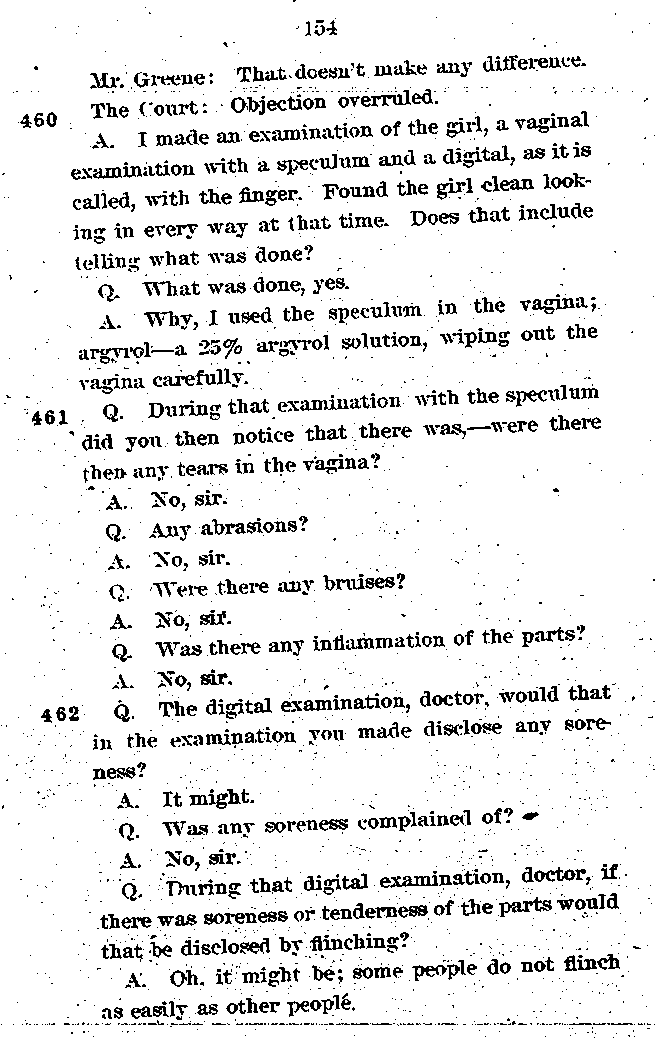
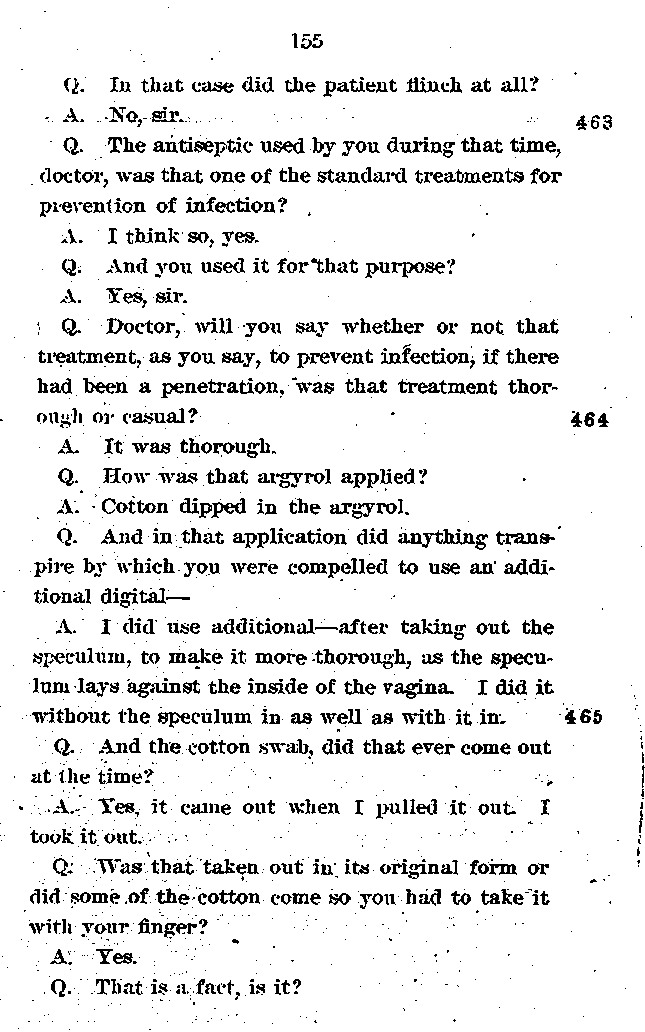
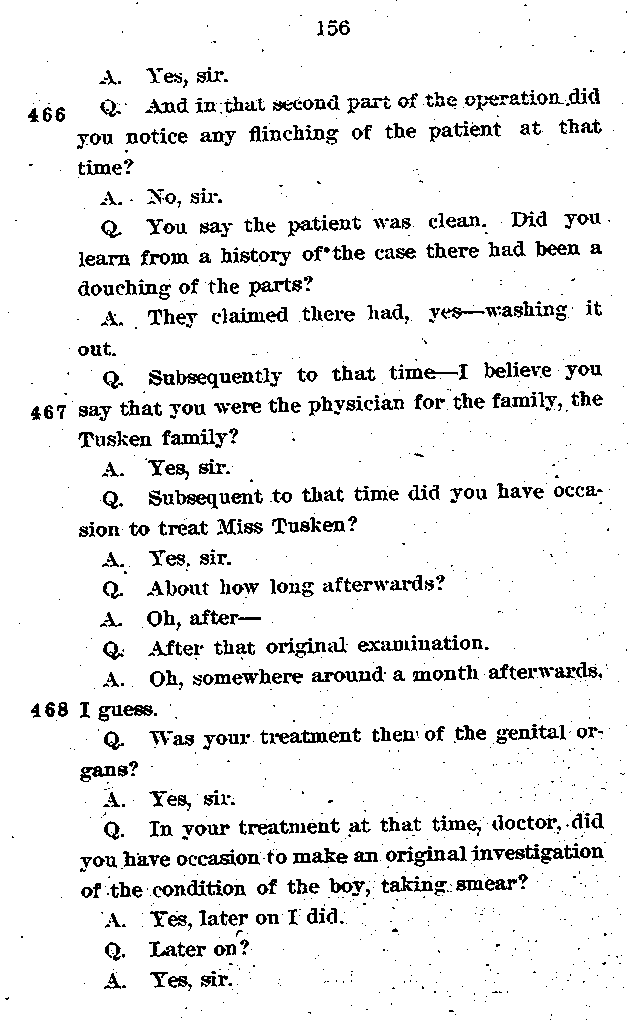
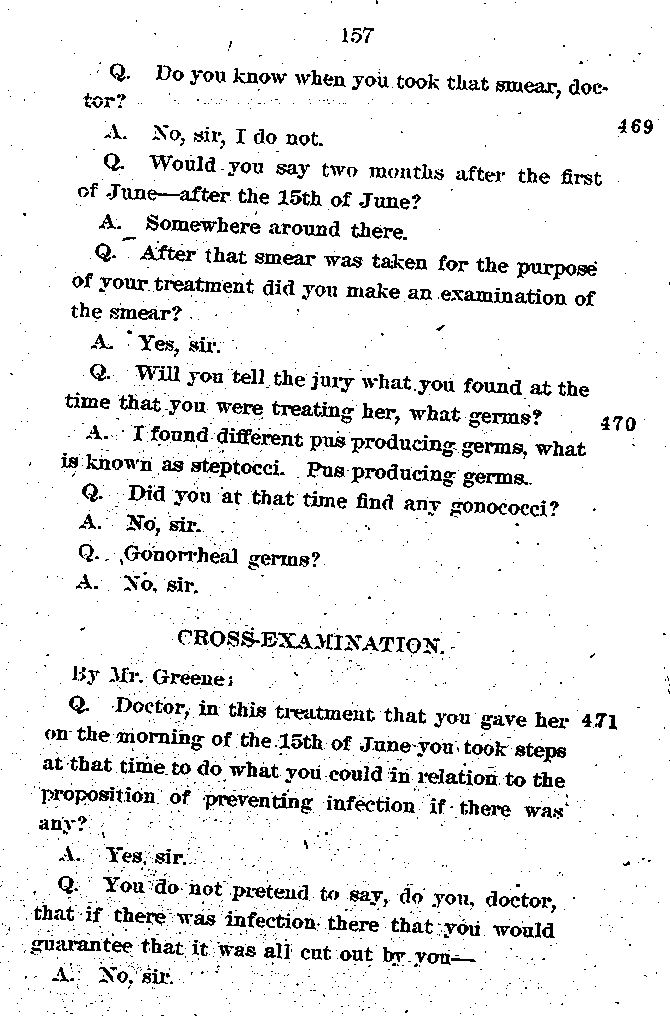
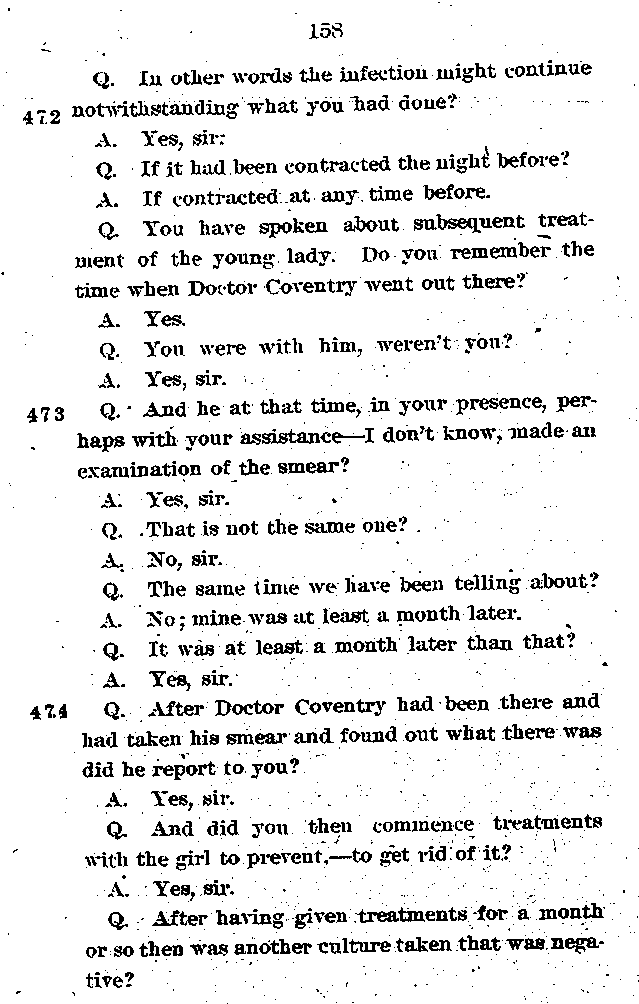
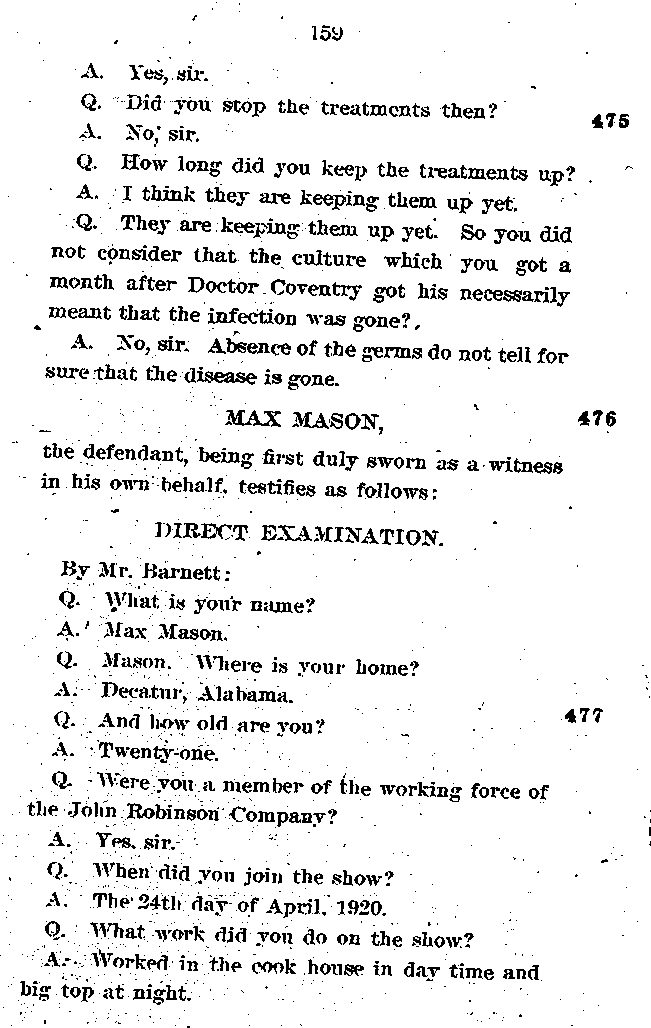
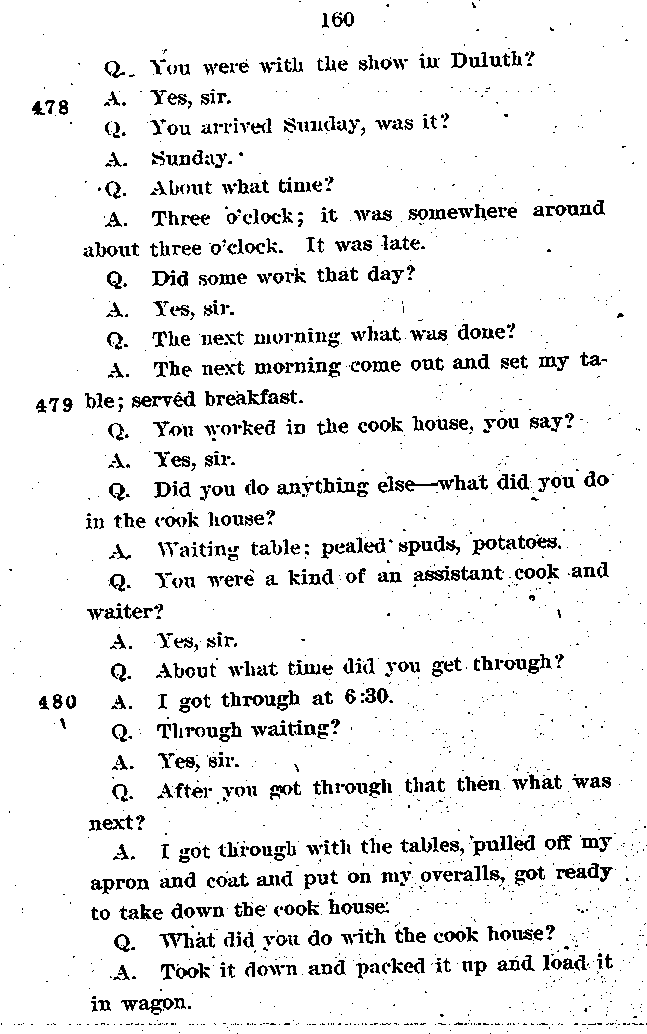
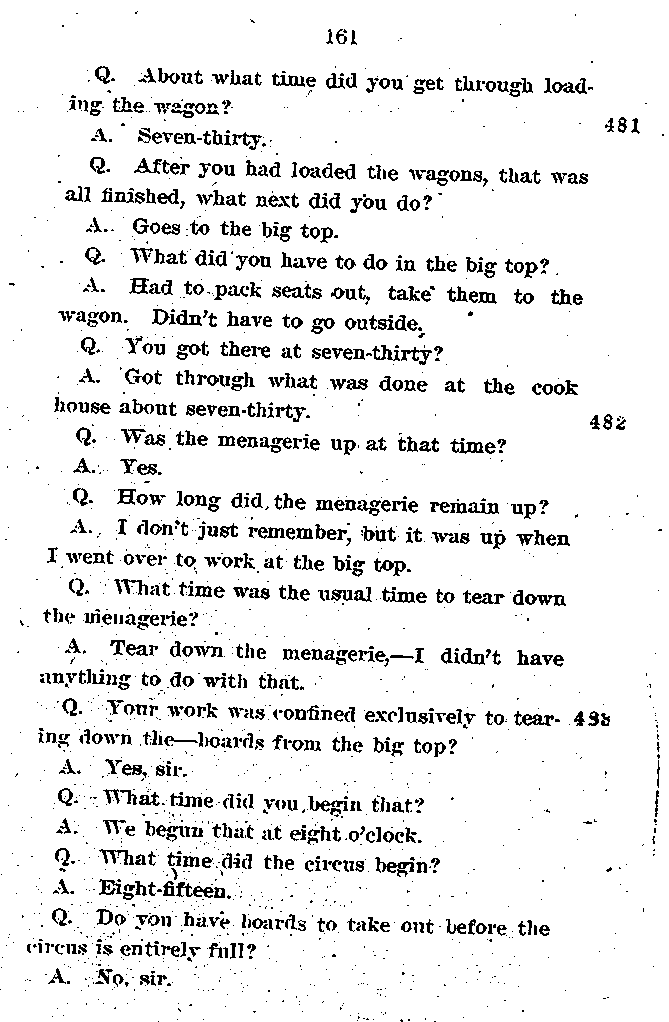
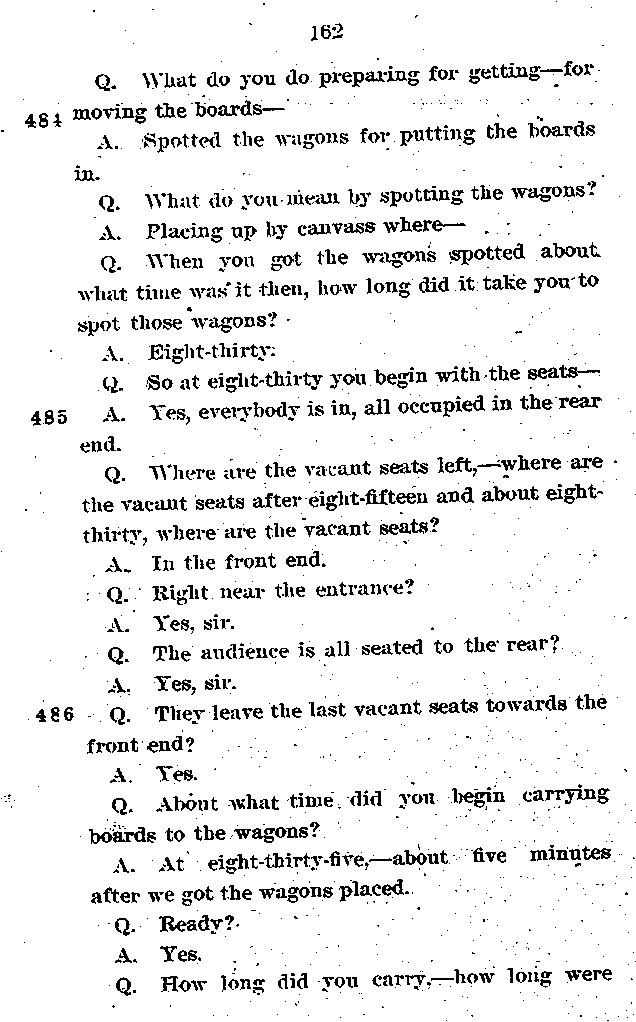
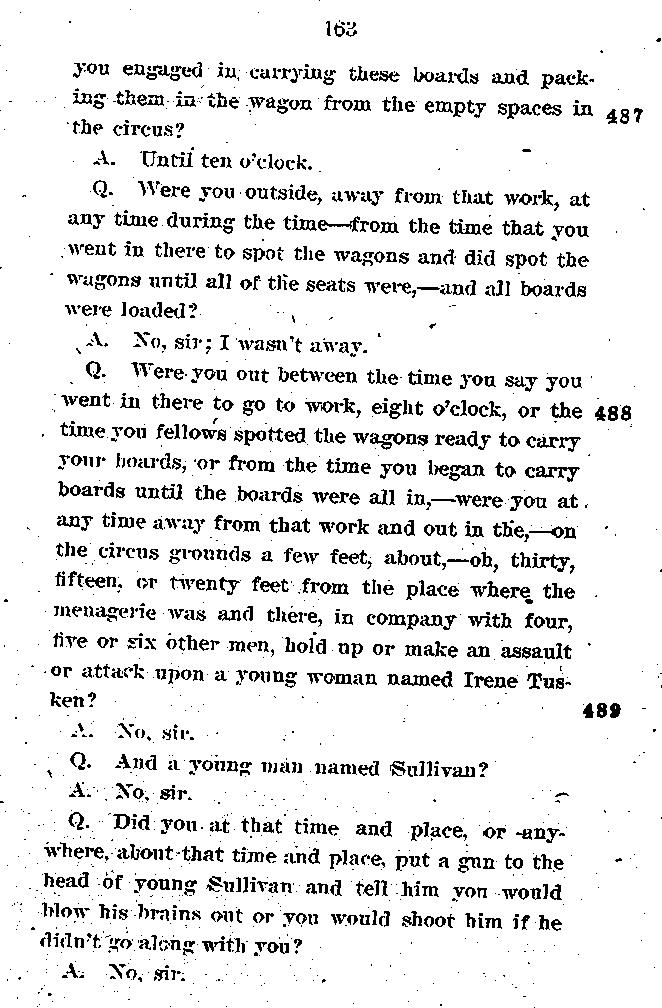
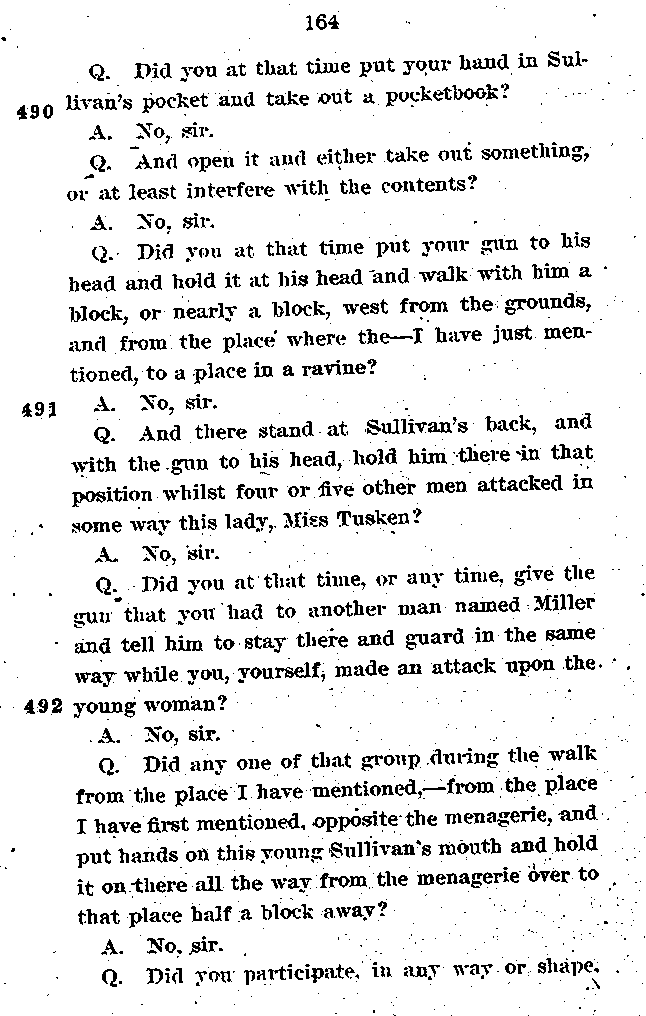
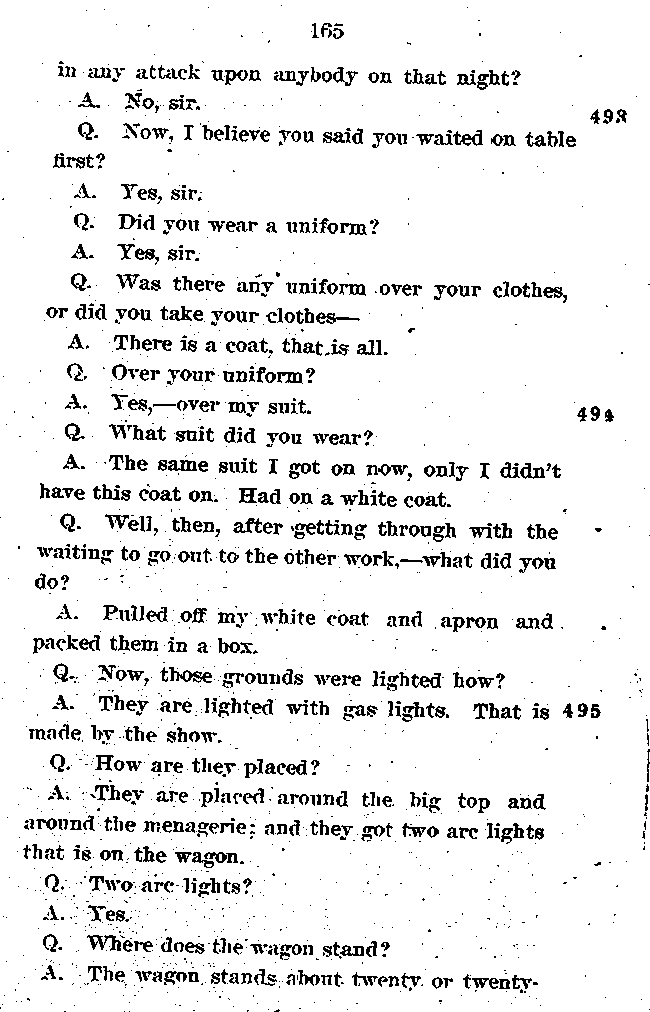
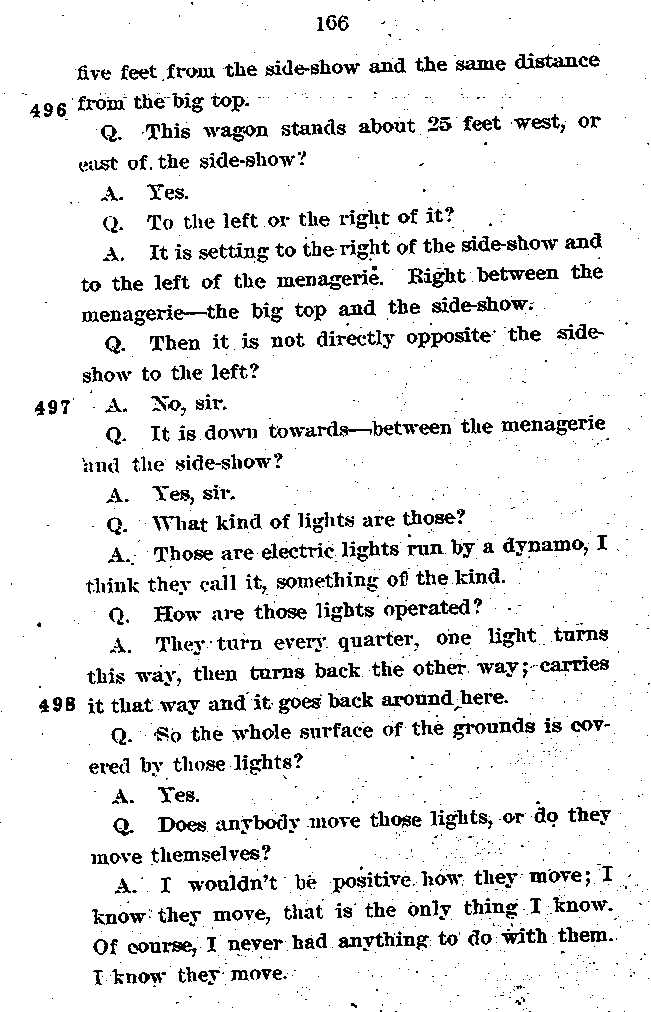
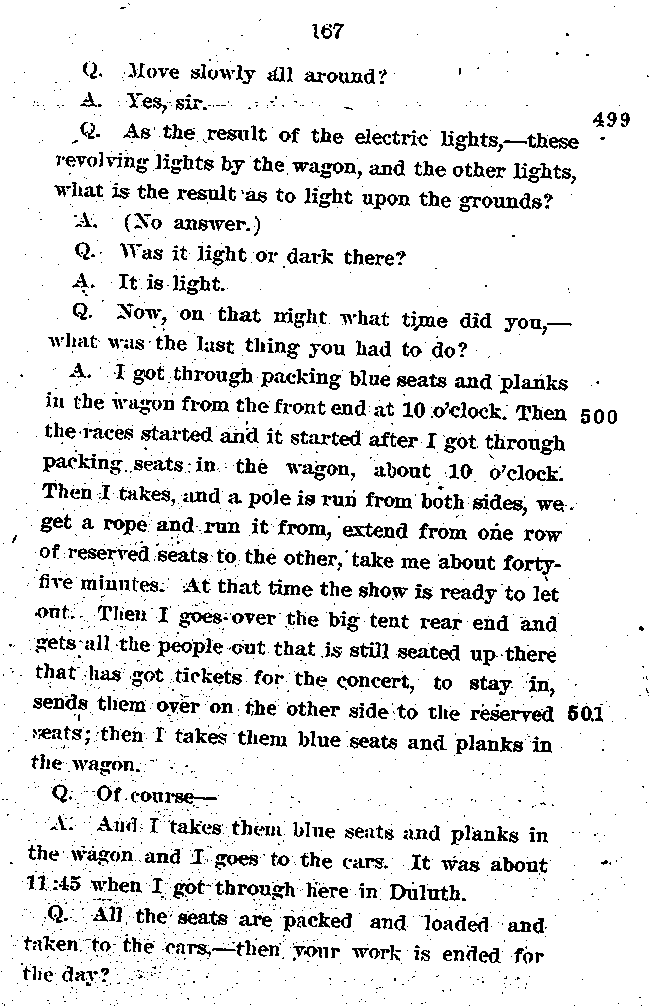
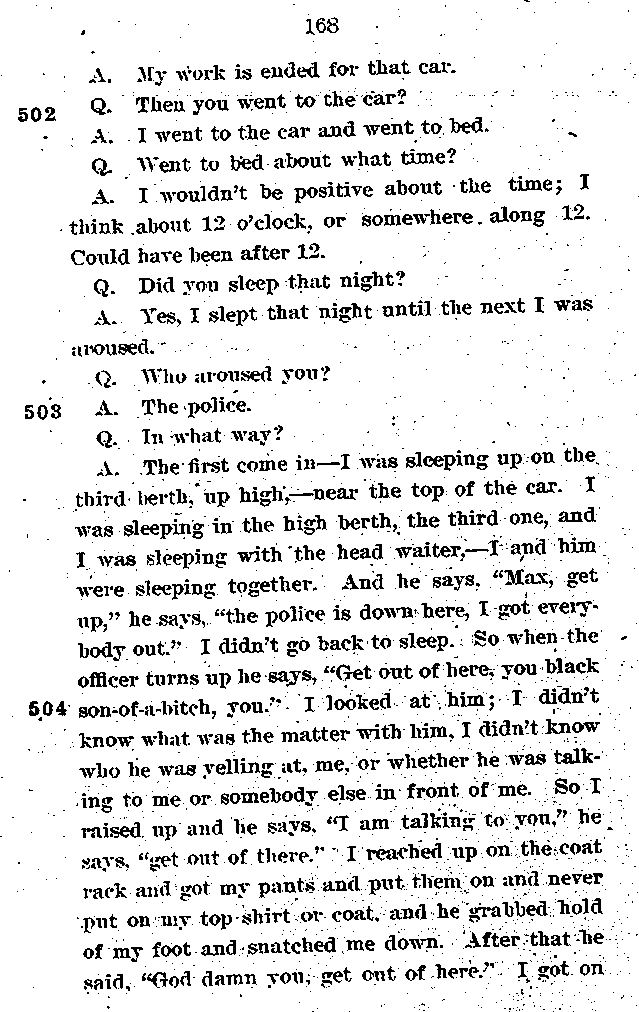
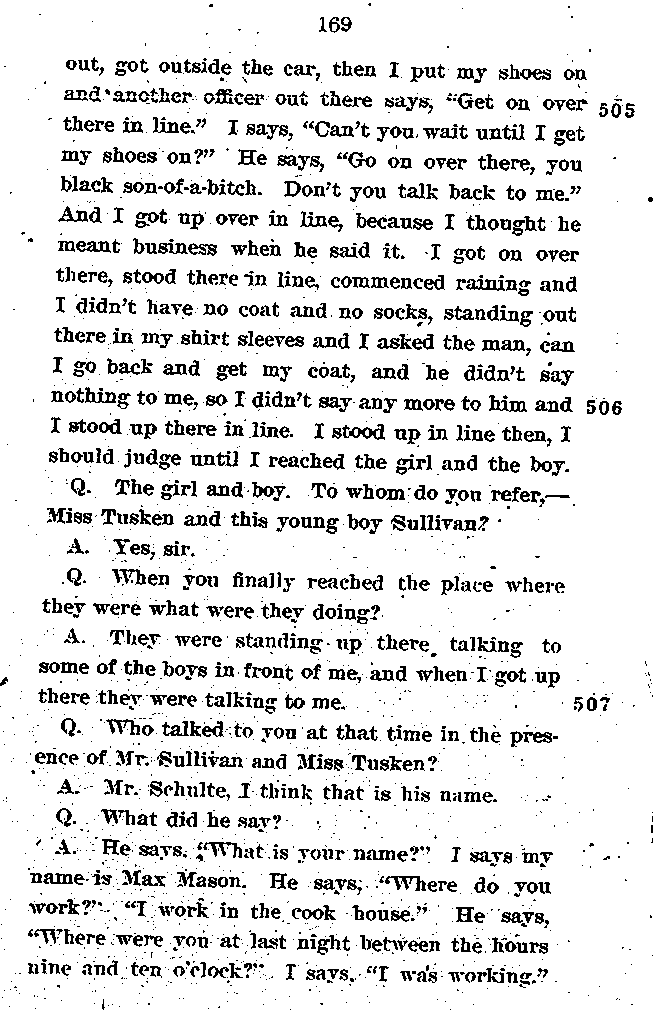
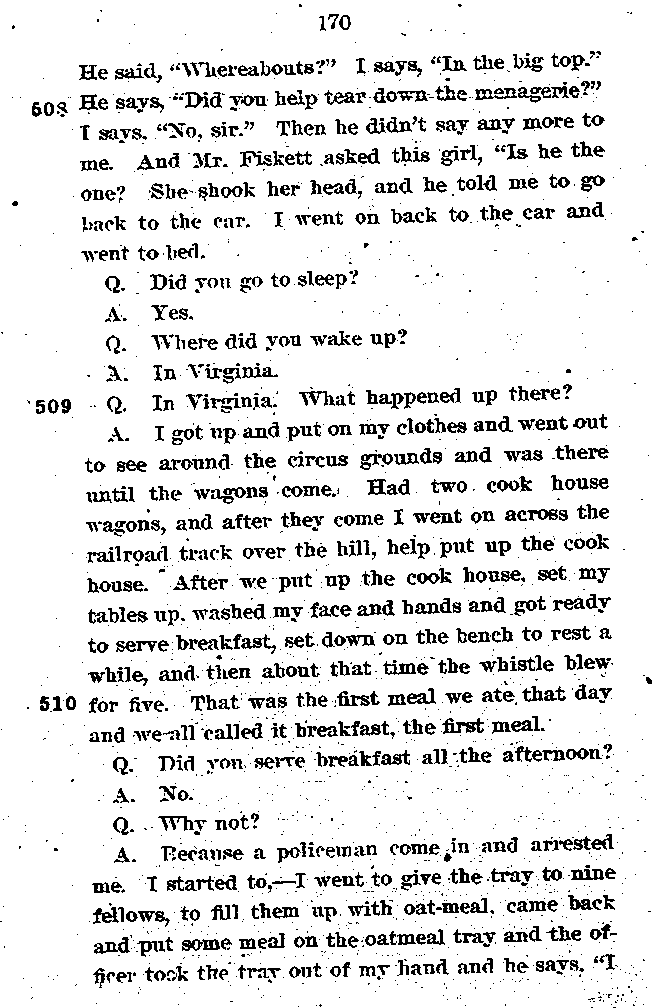
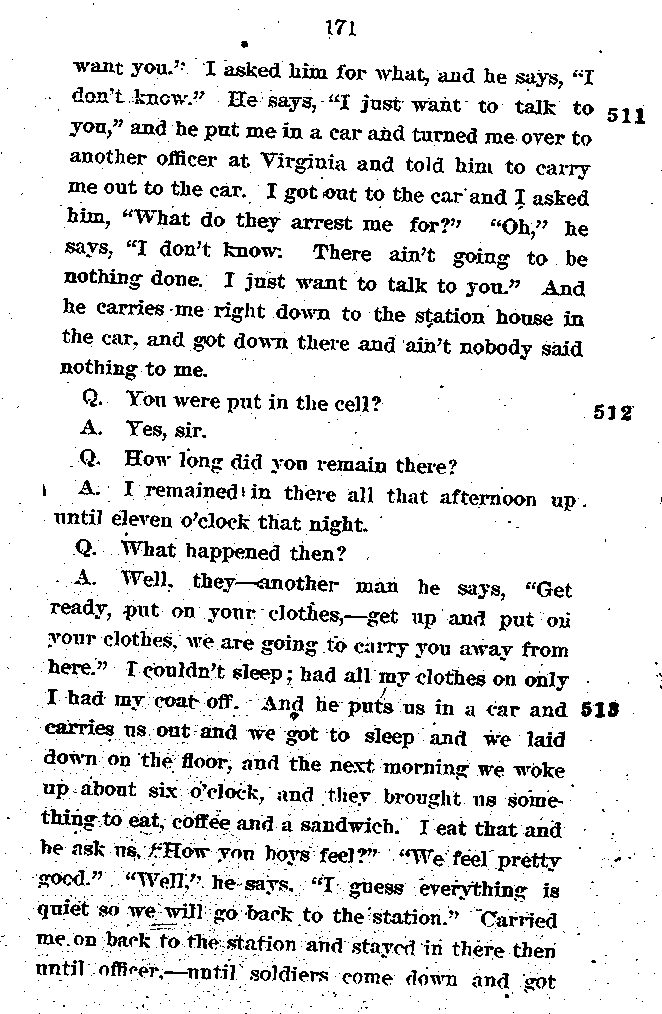
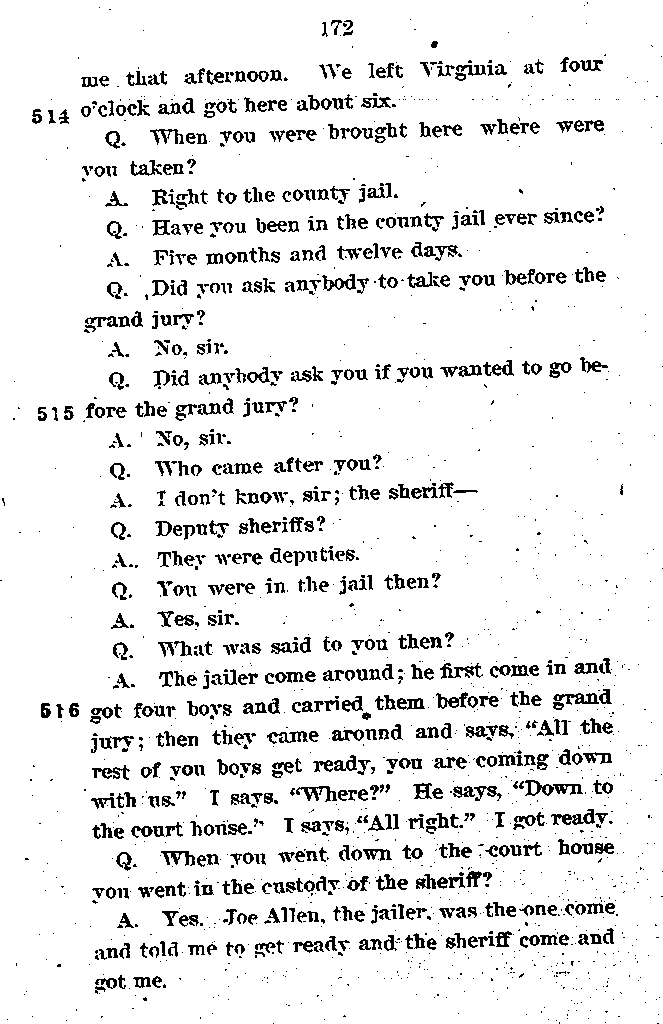
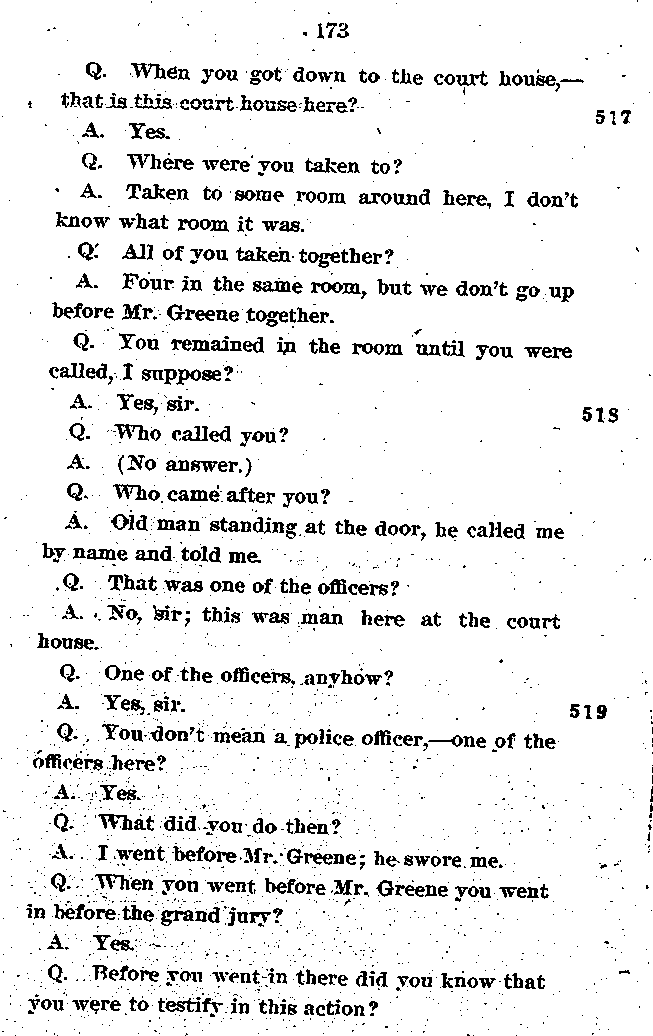
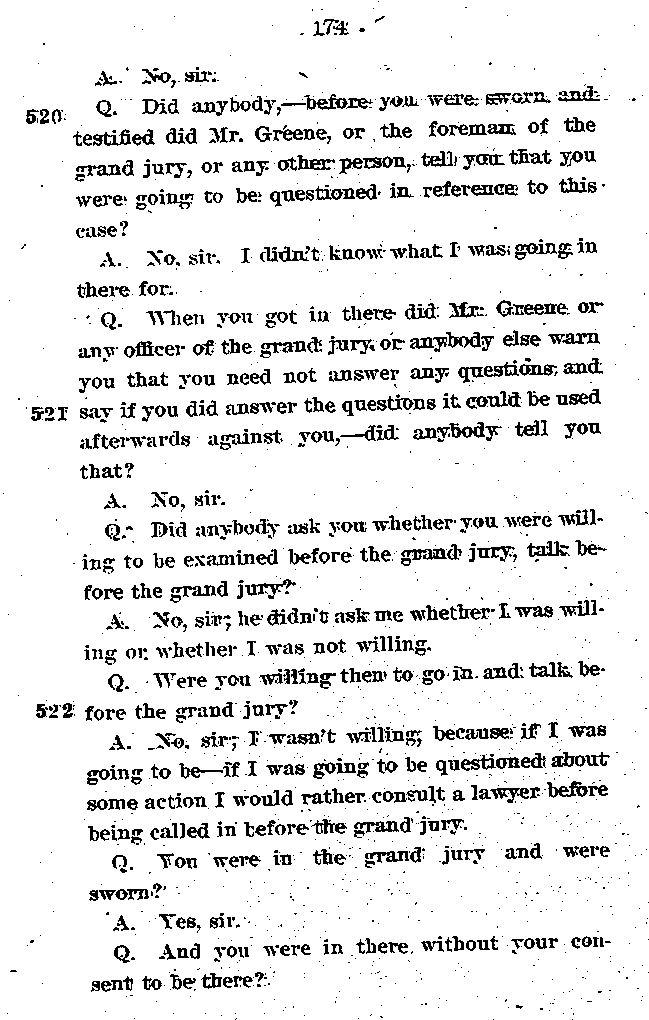
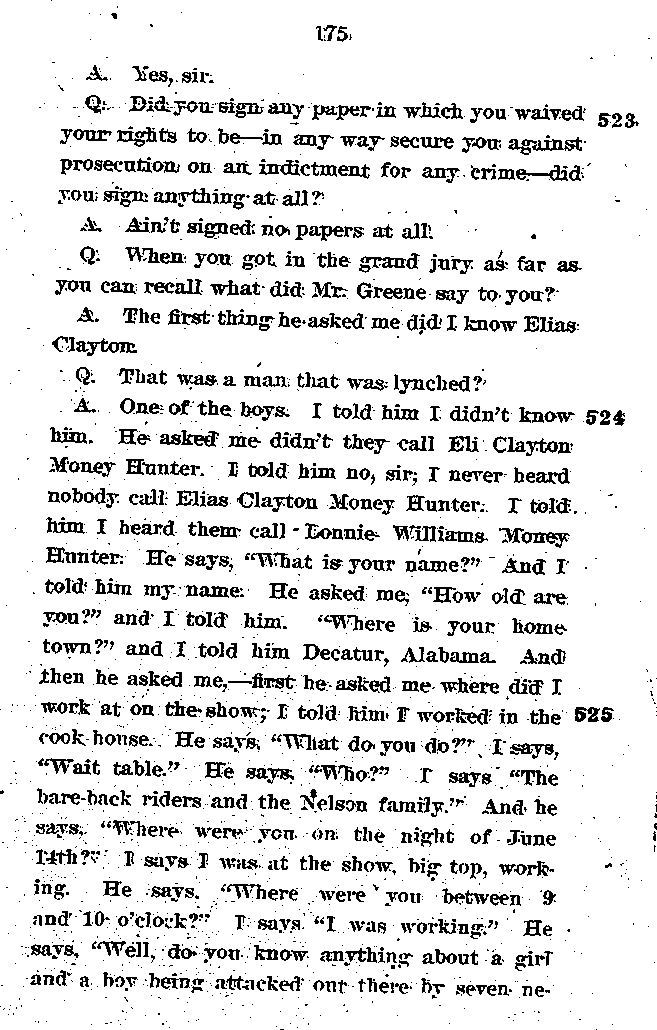
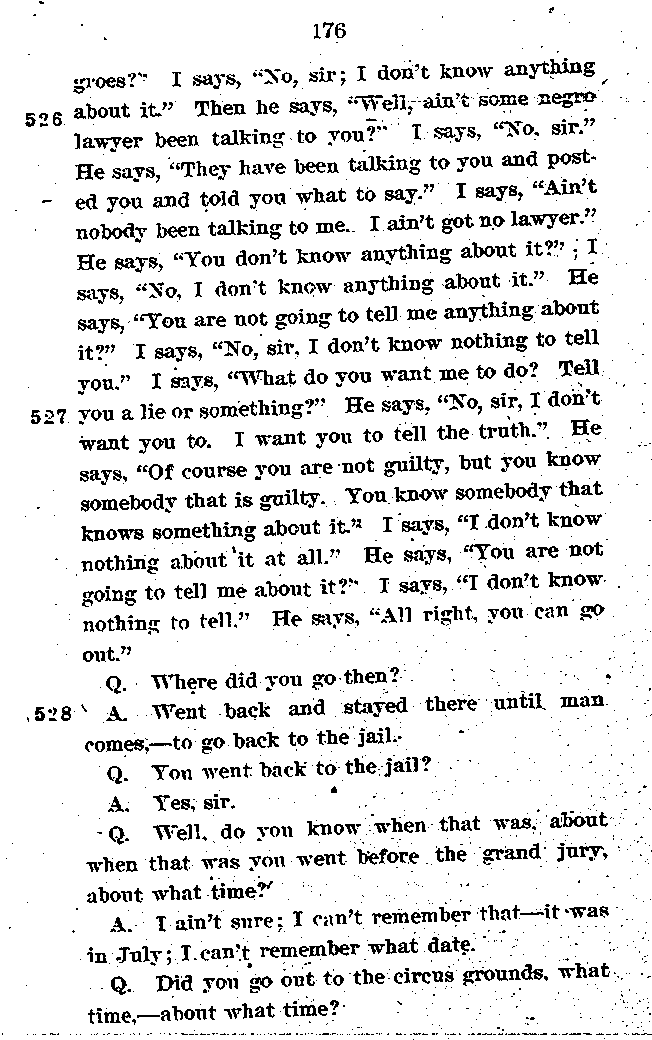
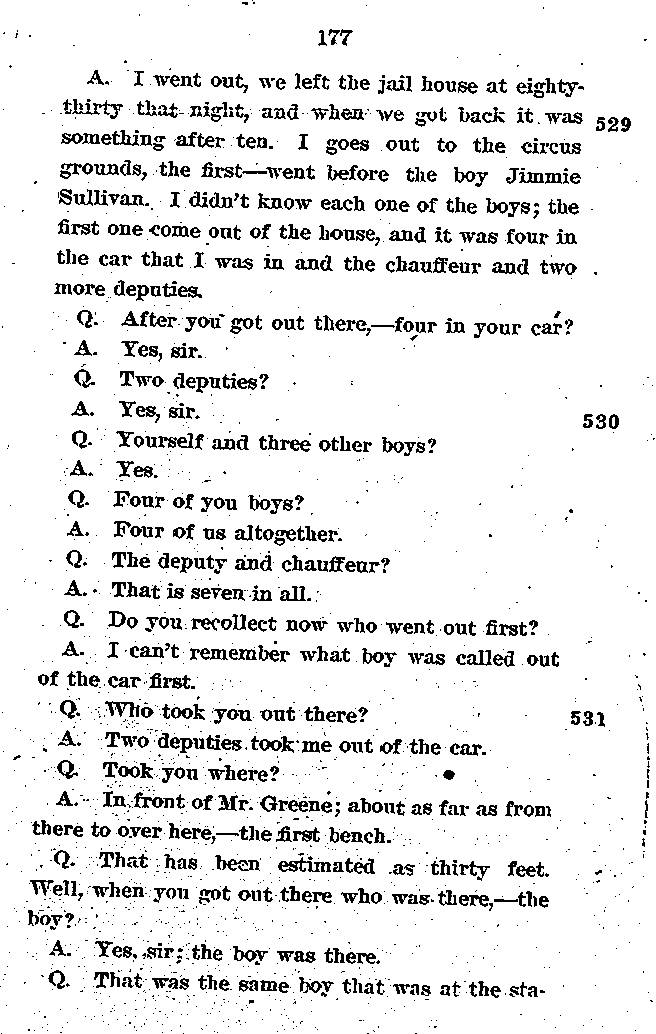
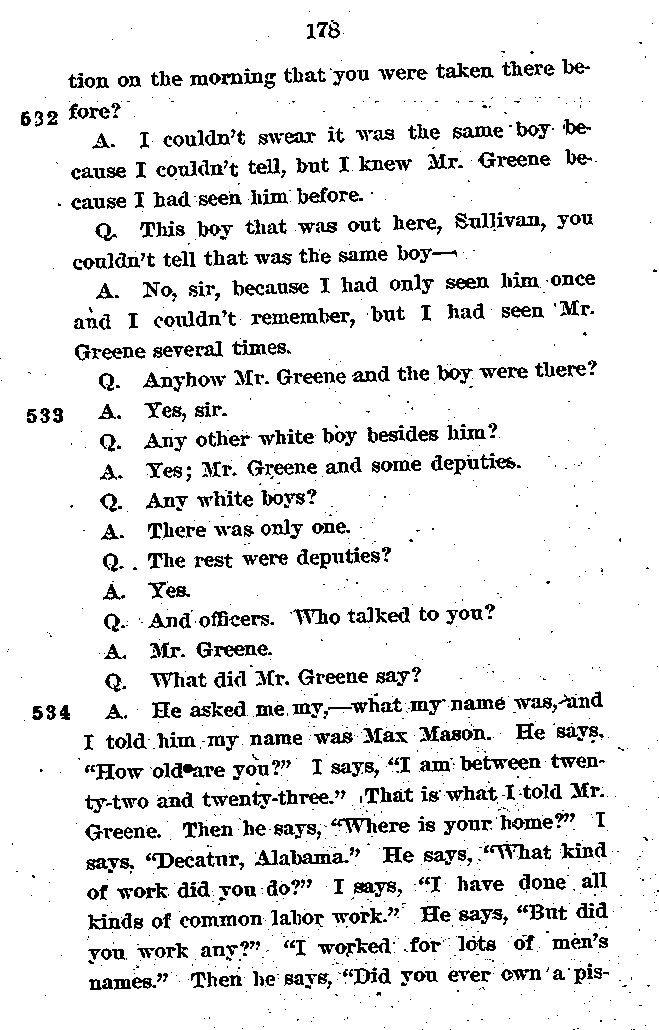
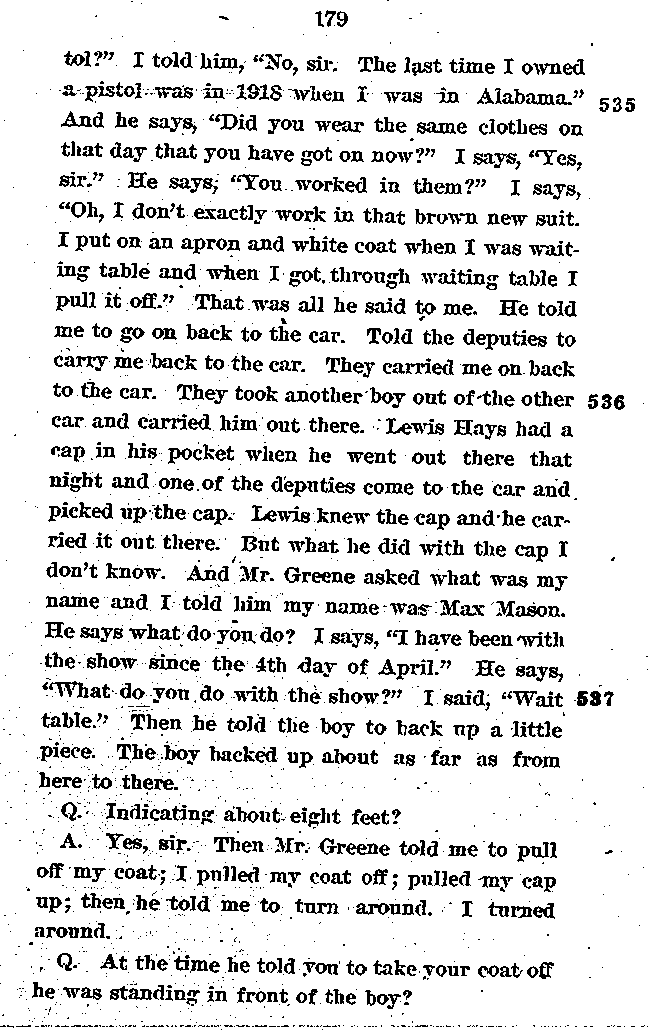
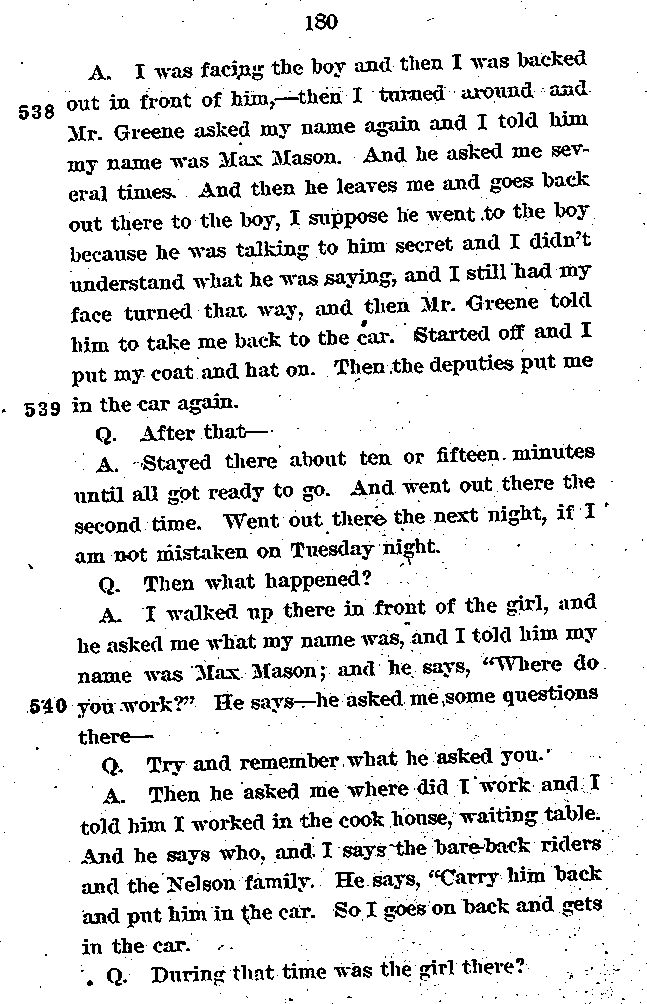
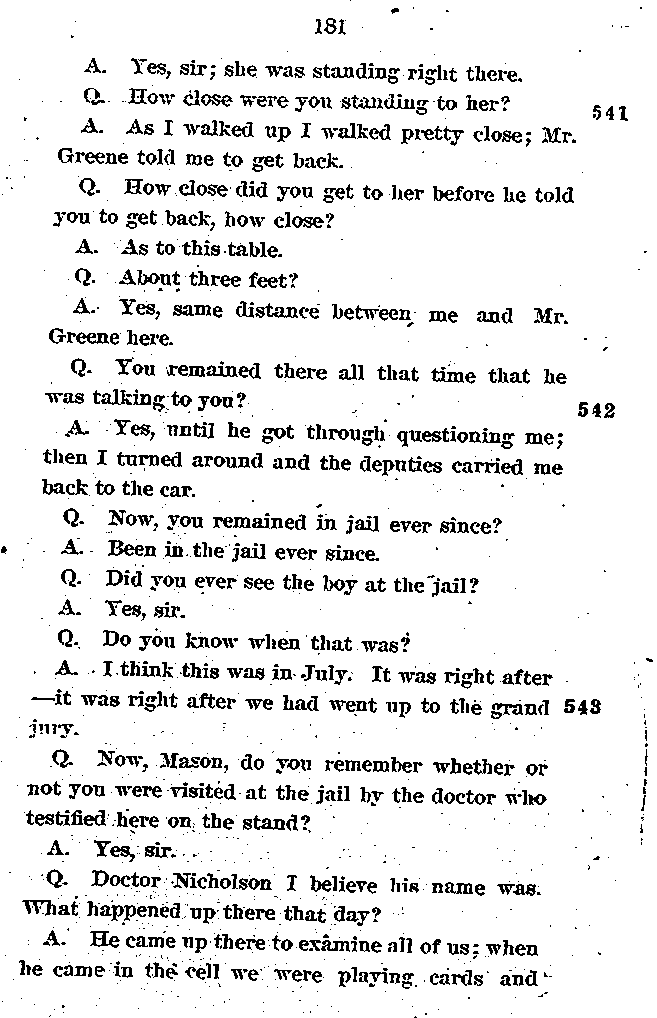
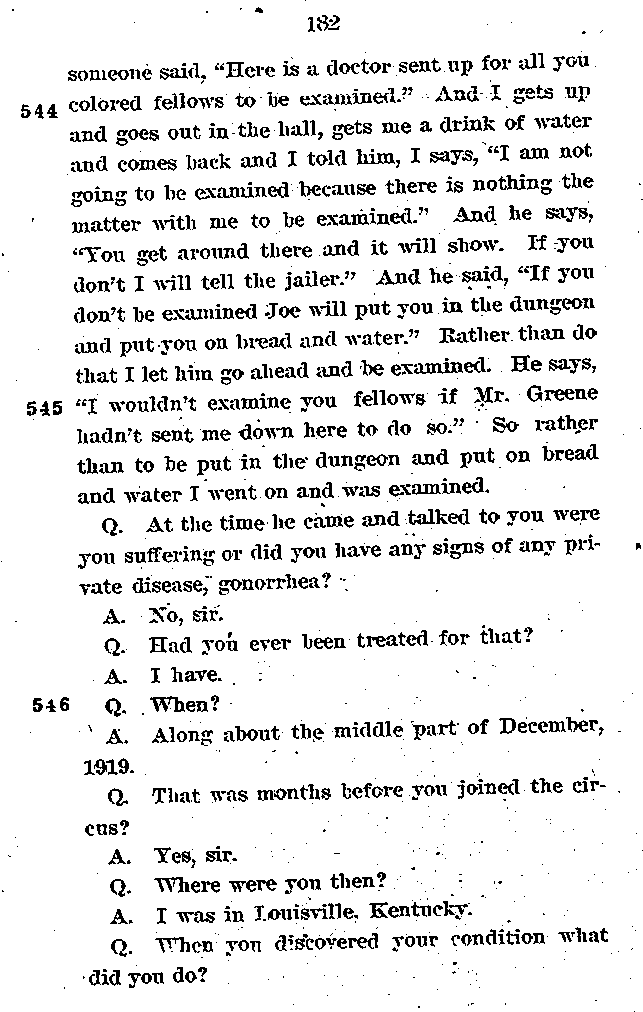
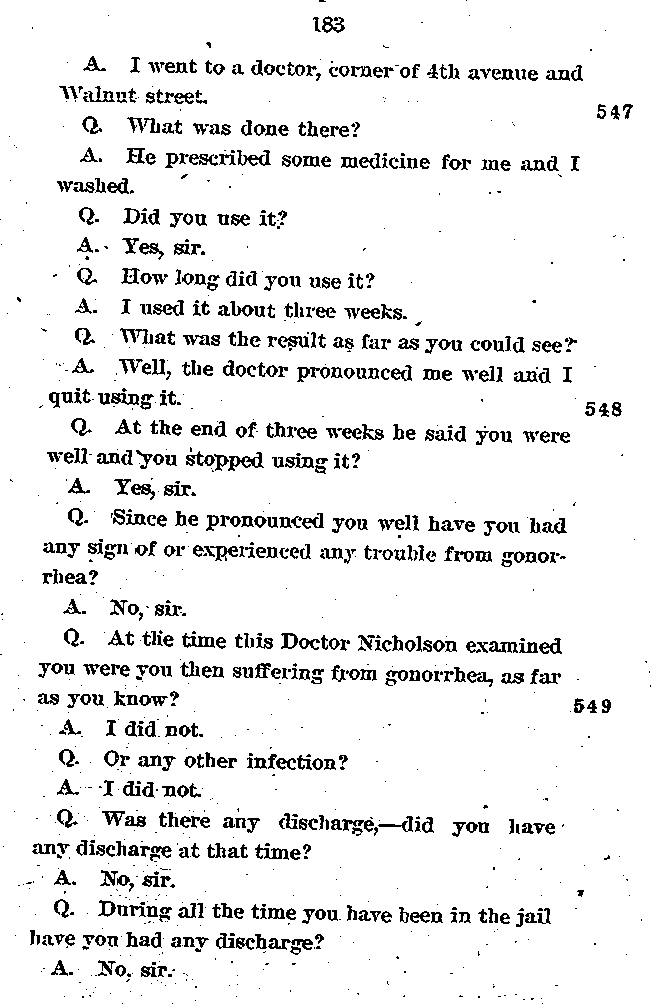
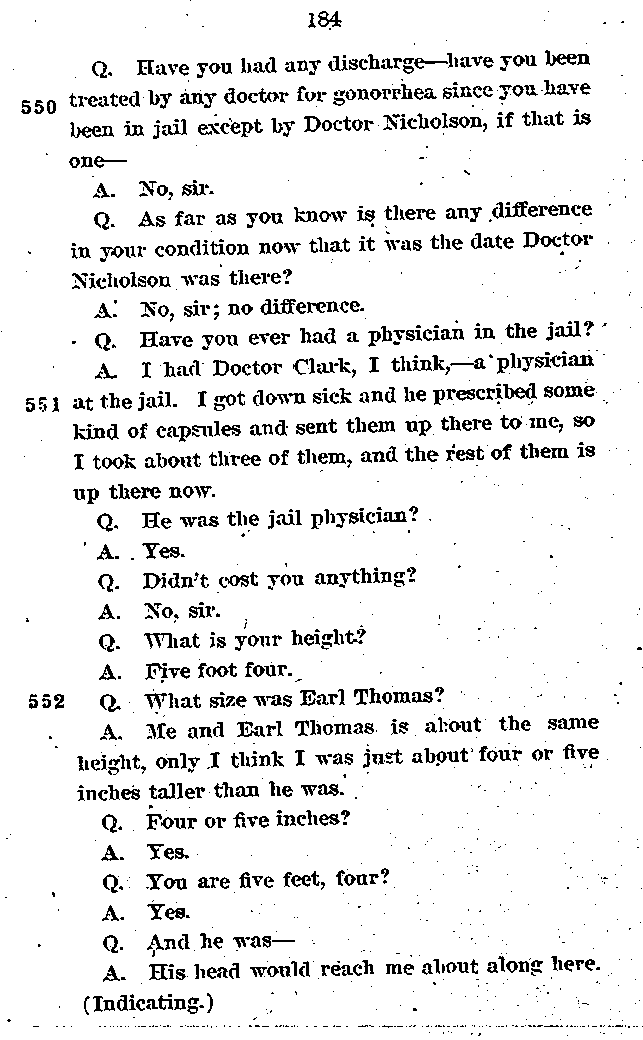
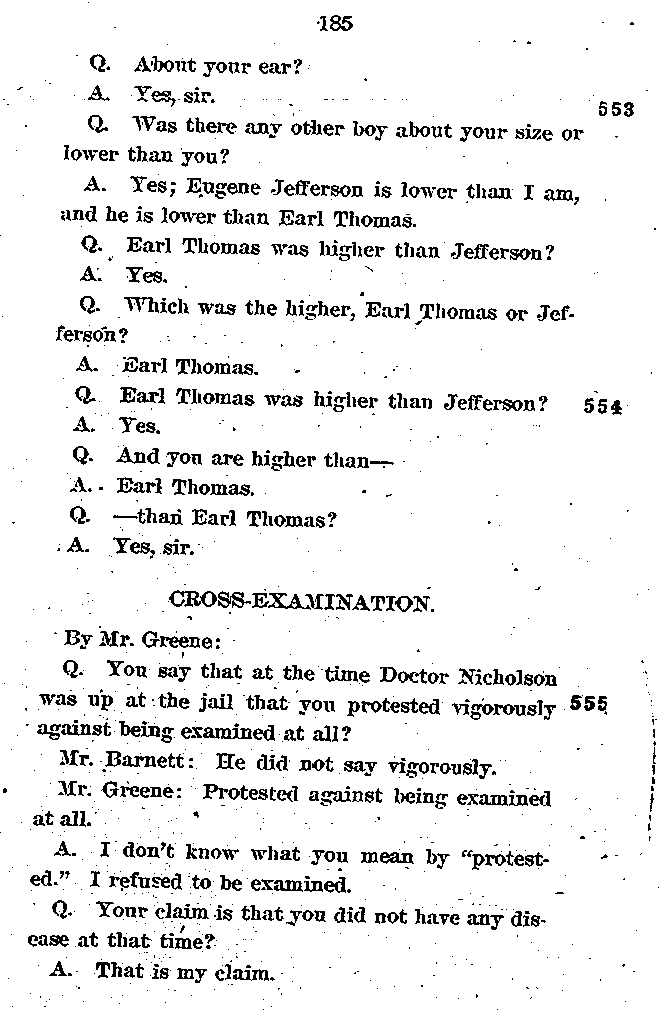
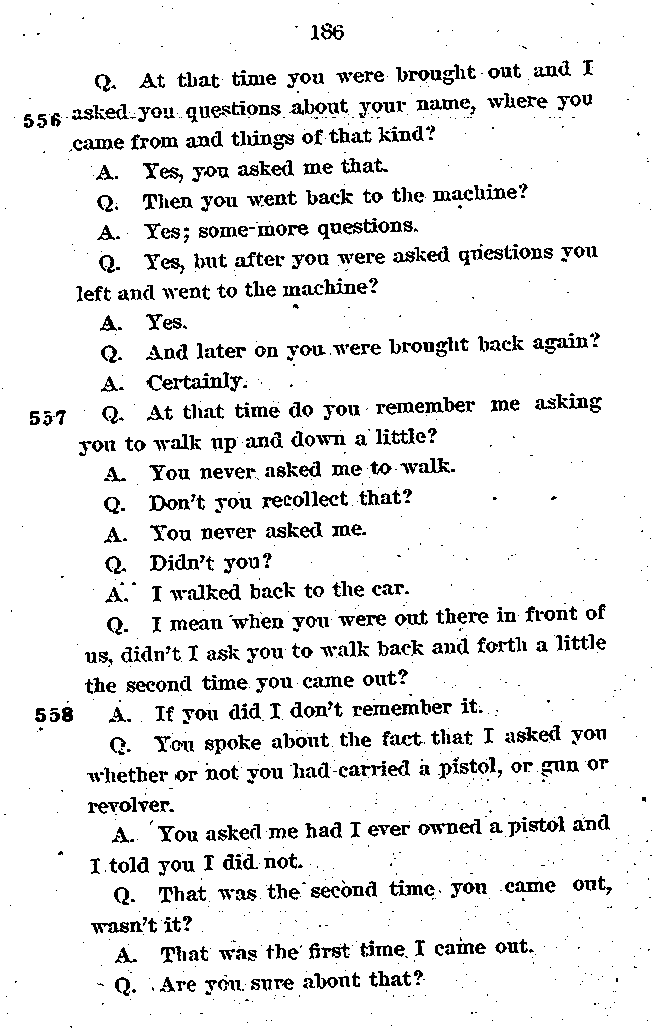
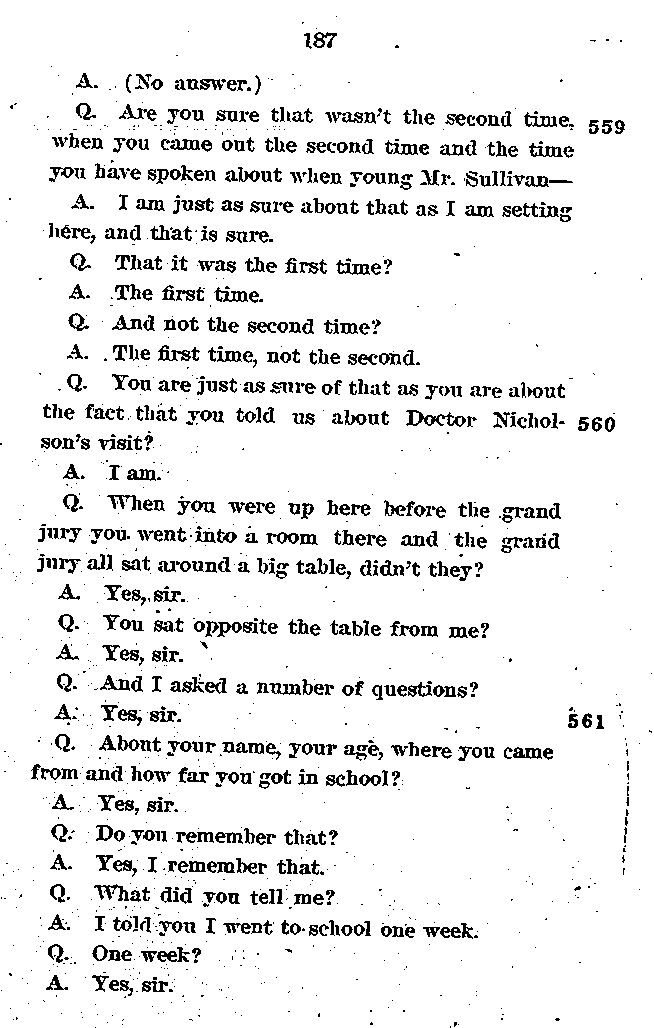
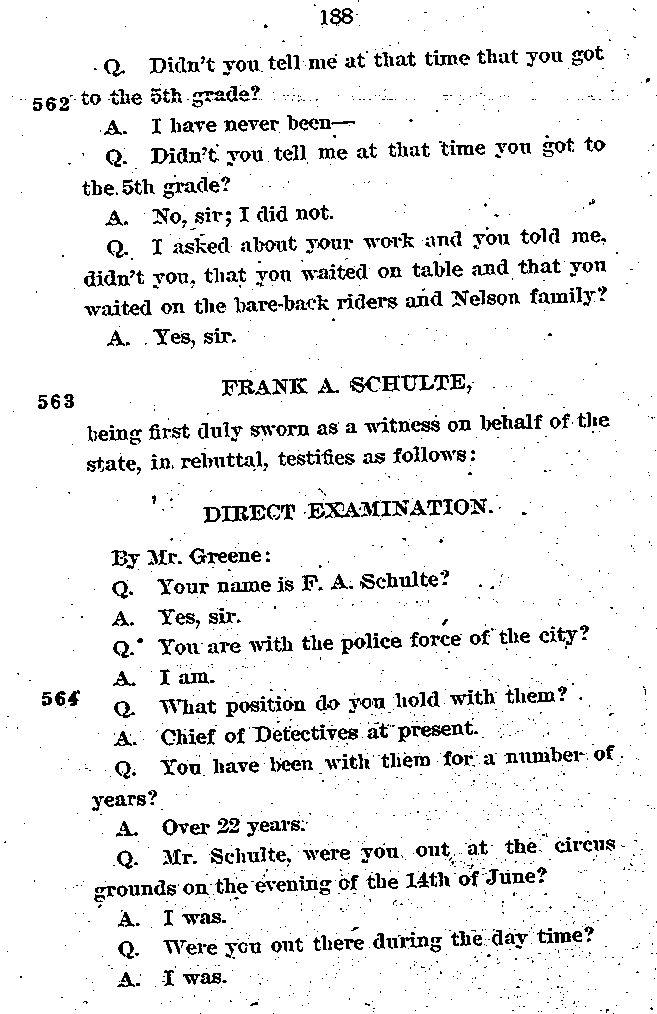
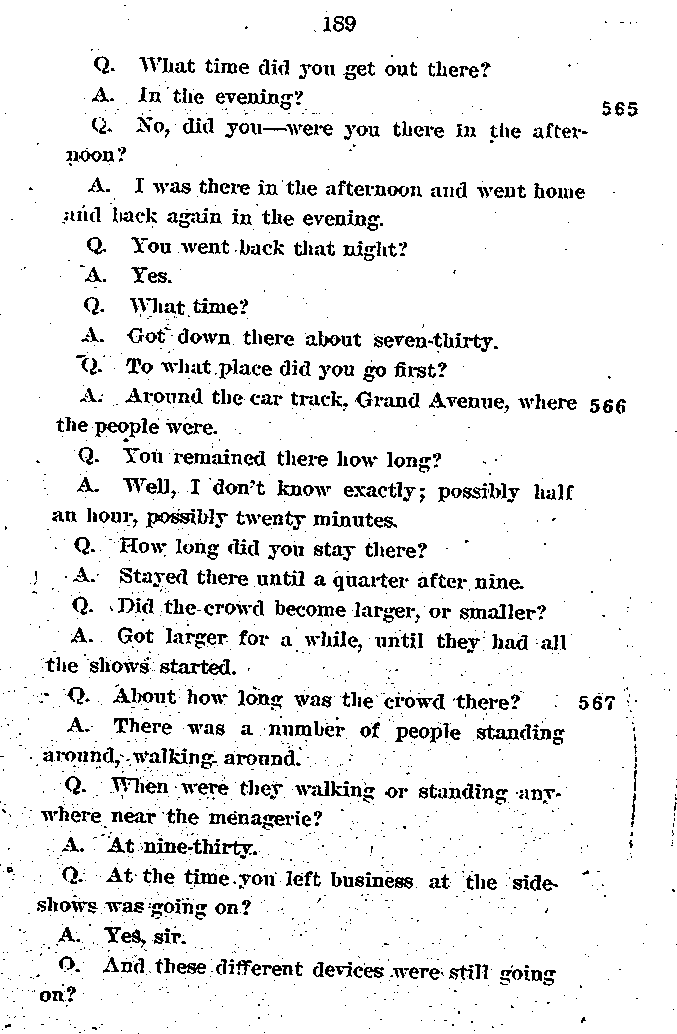
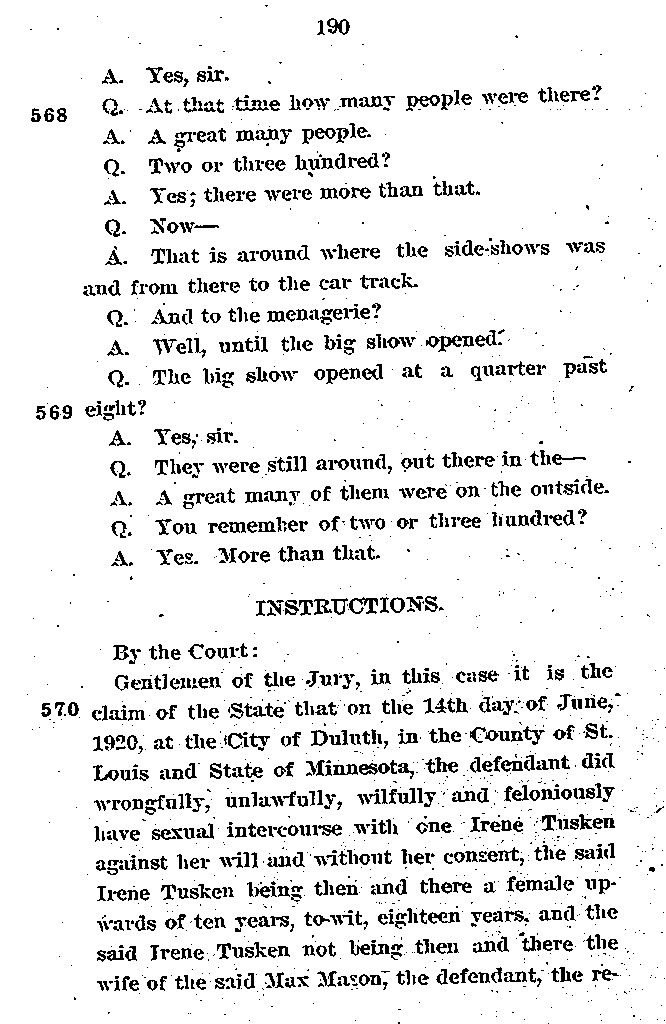
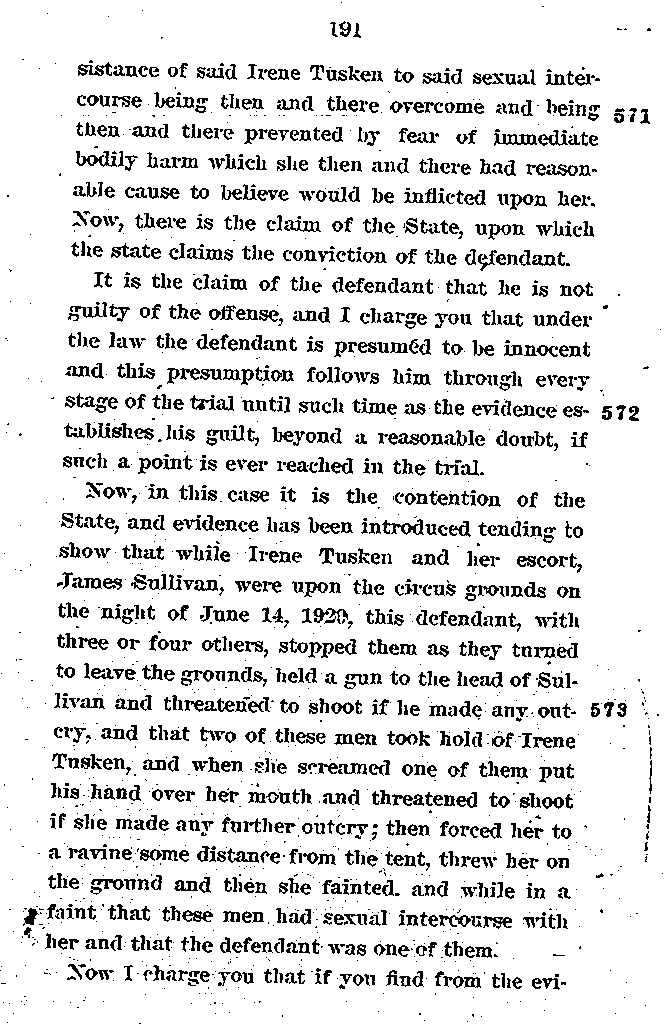
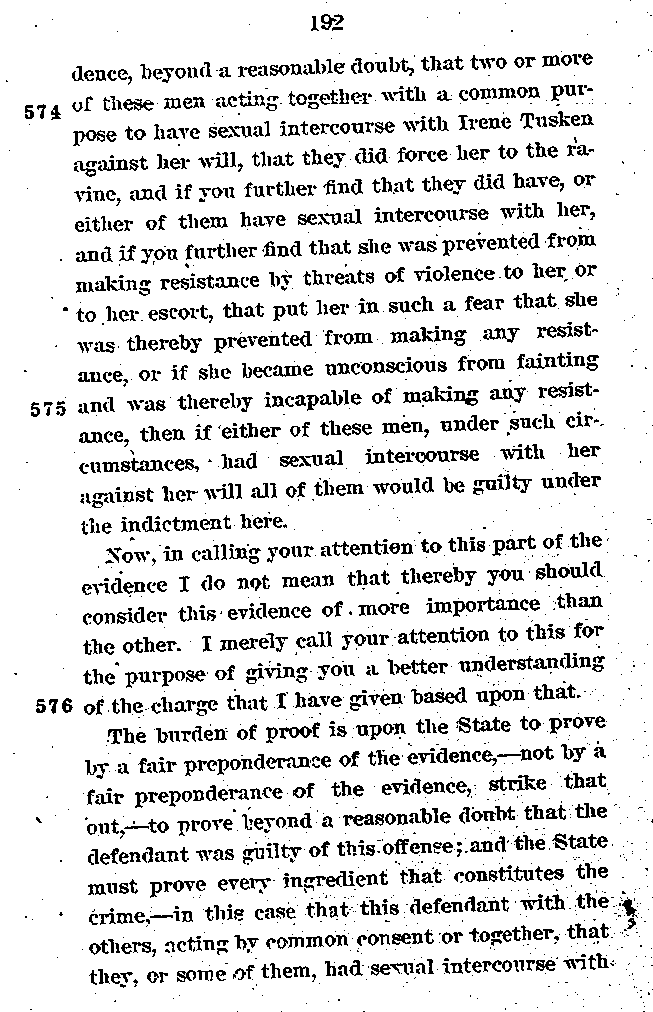
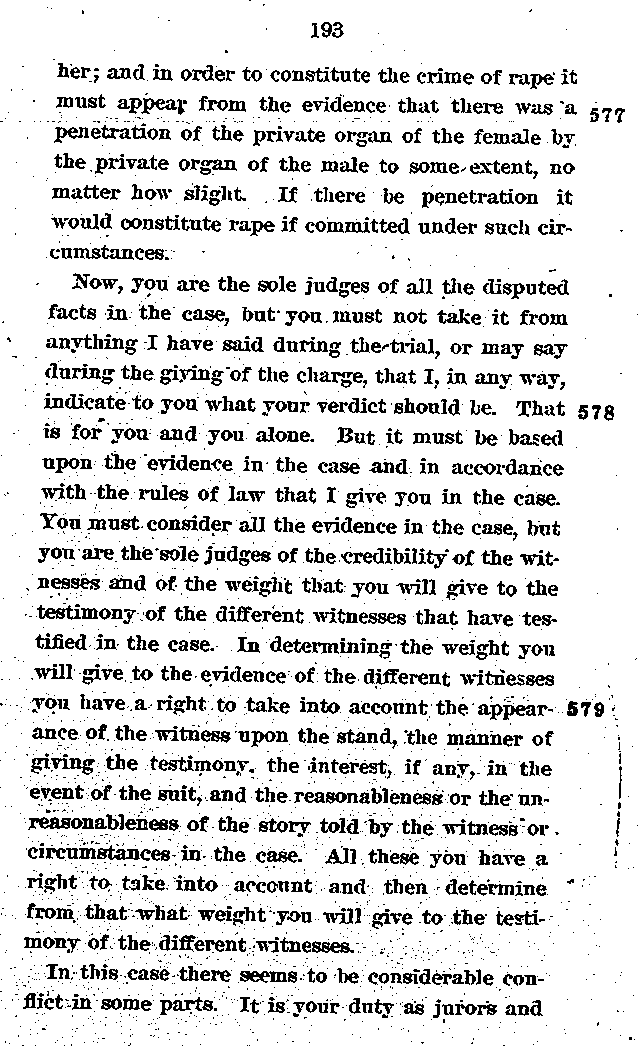
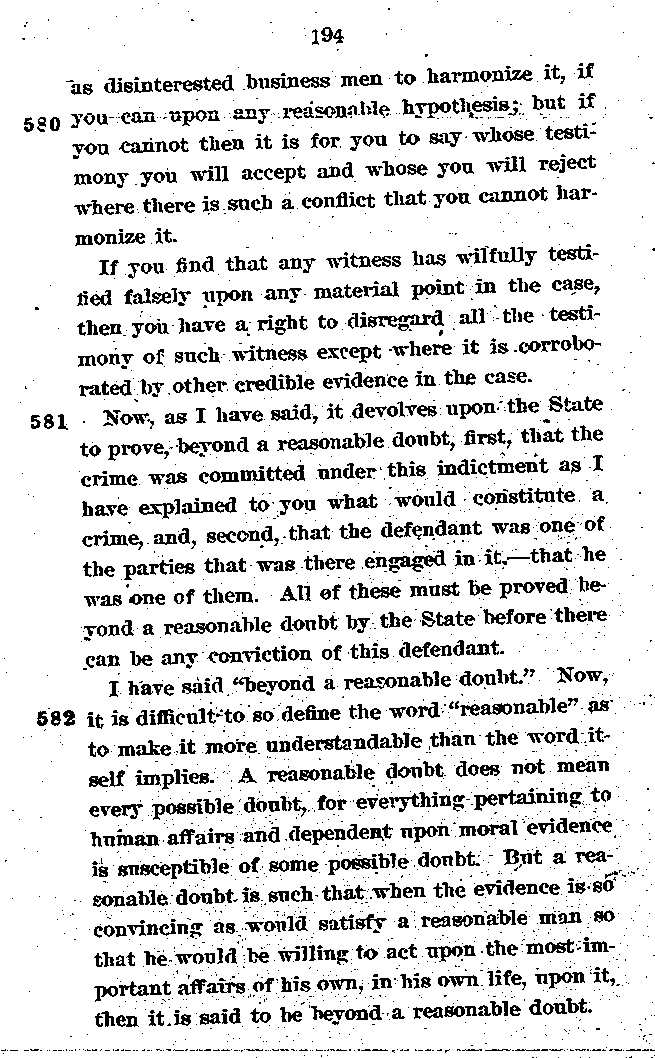
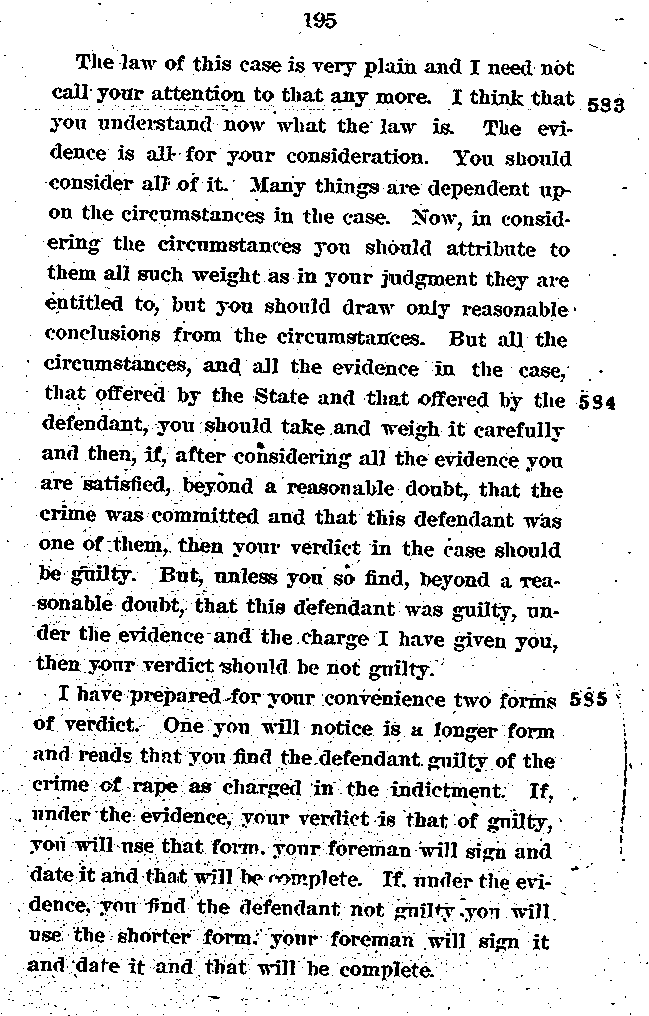
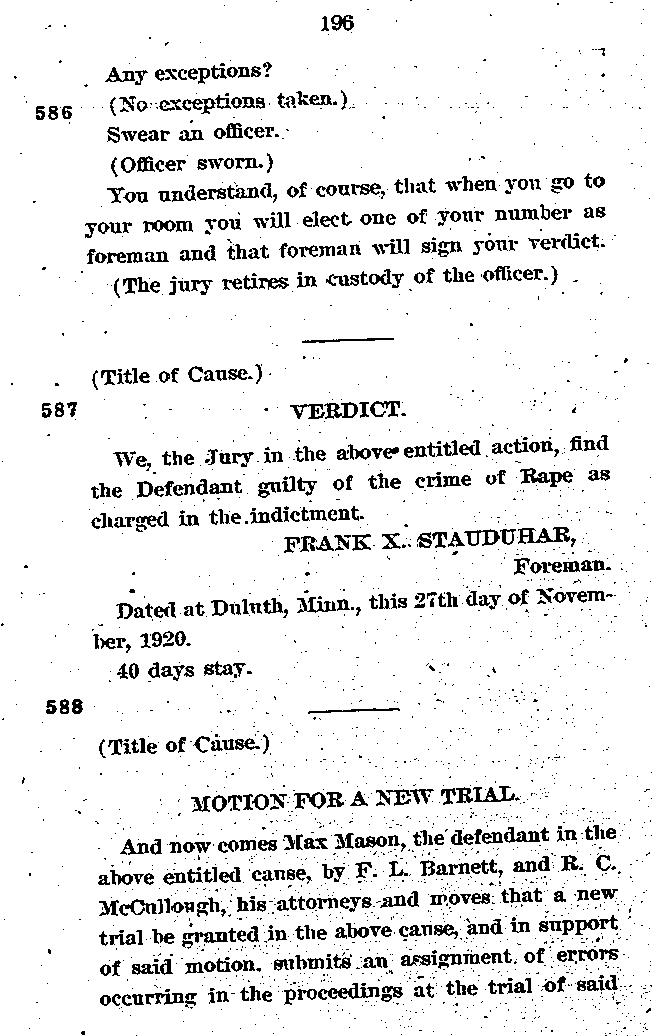
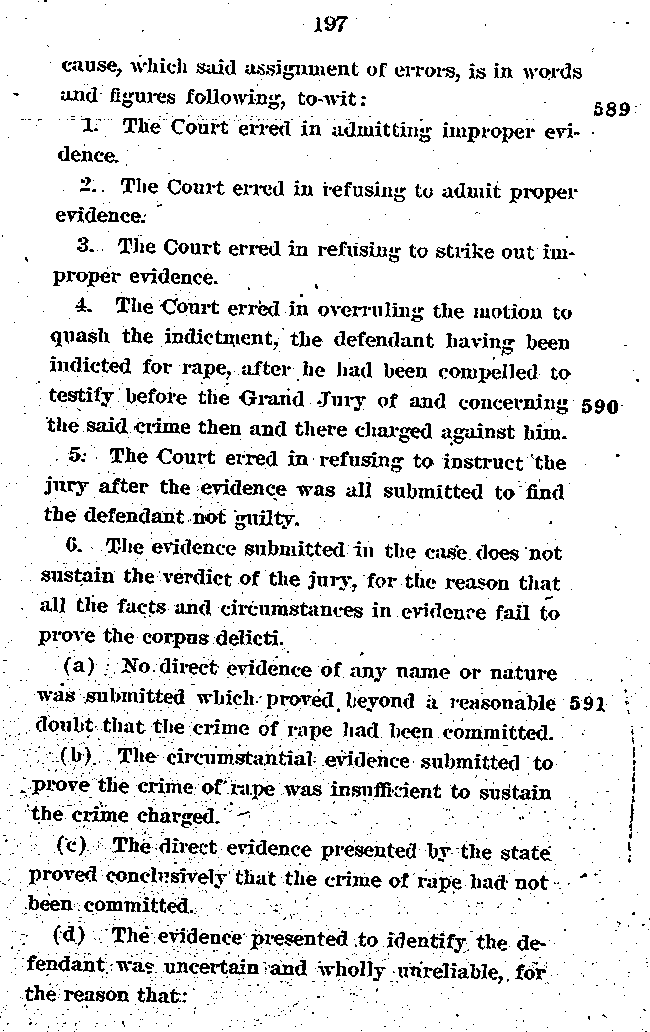
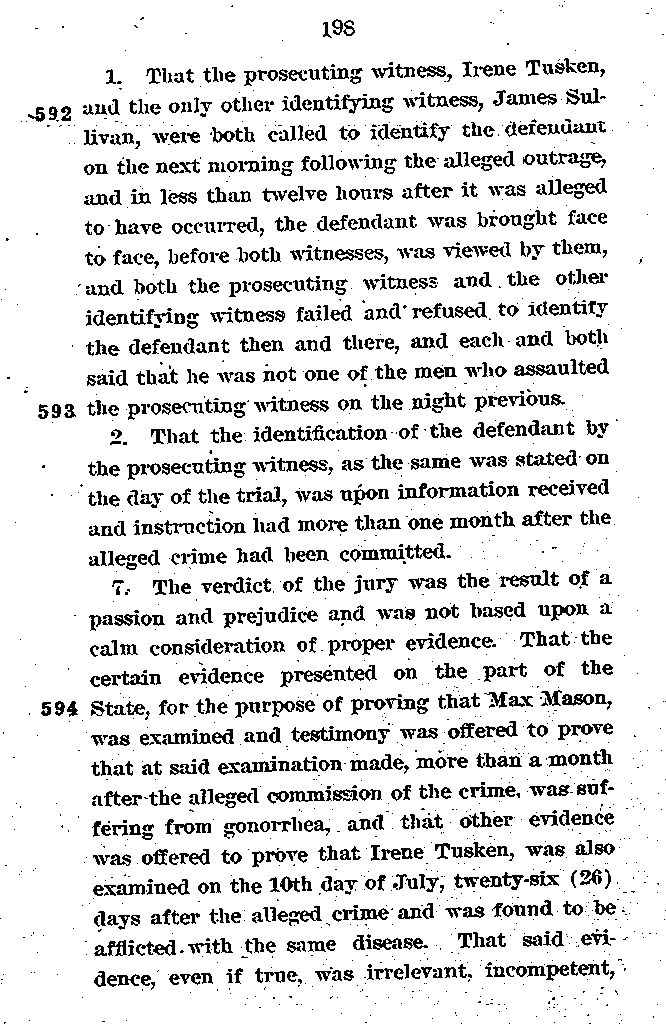
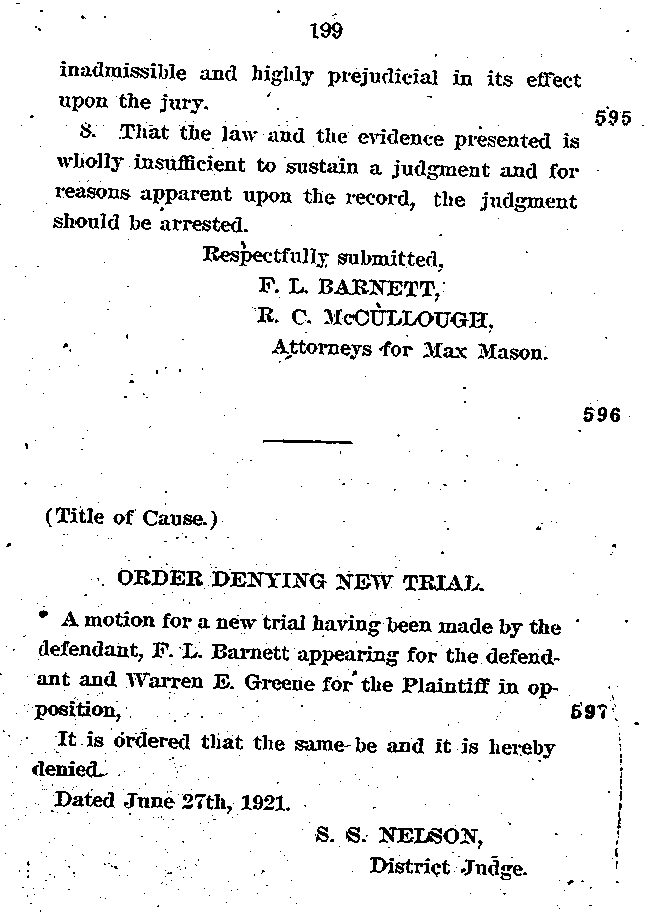
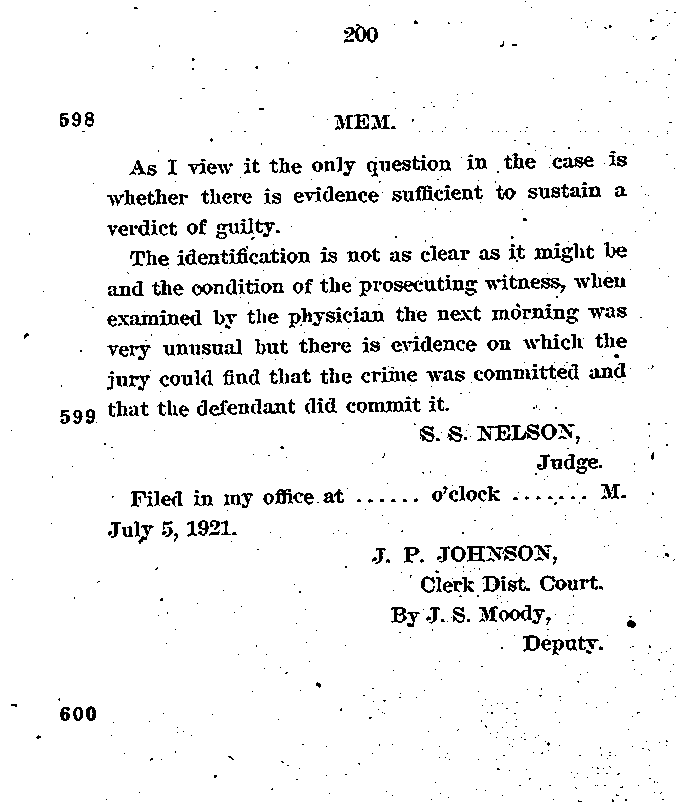
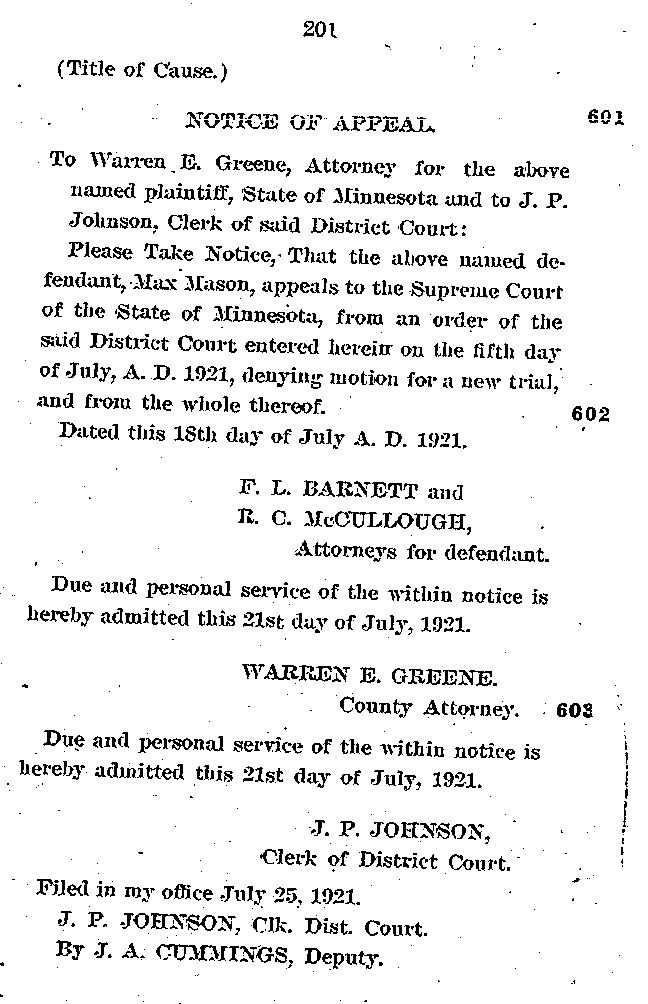
Image text
22590
STATE OF MINNESOTA
SUPREME COURT.
_________
STATE OF MINNESOTA
Respondent
vs.
MAX MASON,
Appellant
_________
RECORD
_________
F. L. BARNETT
Chicago, ILL,
R. C. McCULLOUGH
Duluth, Minn.,
Attorneys for Appellant
CLIFFORD L. HILTON
Attorney General
W. E. GREENE,
County Attorney
Attorneys for Respondent
INDEX
Indictment........................................... 1
Testimony........................................... 3
Instructions......................................... 190
Verdict............................................... 196
Motion for New Trial.............................. 196
Order Denying Motion ........................... 199
Notice of Appeal .................................. 201
PLAINTIFF’S WITNESSES.
Irene Tusken –
Direct examination .......................... 3
Cross-examination .......................... 24
James Sullivan –
Direct examination .......................... 50
Cross-examination .......................... 63
John Murphy
Direct examination .......................... 111
Cross-examination .......................... 113
A. G. Fiskett –
Direct examination .......................... 114
Cross-examination .......................... 117
David Graham –
Direct examination .......................... 127
Cross-examination .......................... 129
Wm. A. Coventry –
Direct examination .......................... 131
Cross-examination .......................... 132
Re-direct examination ...................... 132
M. A. Nicholson –
Direct examination .......................... 133
Cross-examination .......................... 134
Frank A. Schulte –
Direct examination .......................... 188
DEFENDANT’S WITNESS.
Louis Hayes –
Direct examination .......................... 135
David Graham –
Direct examination .......................... 153
Cross-examination .......................... 157
Max Mason –
Direct examination .......................... 159
Cross-examination .......................... 185
STATE OF MINNESOTA
SUPREME COURT
__________
STATE OF MINNESOTA, DISTRICT COURT,
County of St. Louis, 11th Judicial District.
State of Minnesota
Respondent, 2
MAX MASON,
Appellant.
__________
APPEARANCES
For the State, Warren E. Greene, County Attorney
For the Defendant, F. L. Barnett, R. C. McCullough
and Chas M. Scrutchin.
____________
INDICTMENT.
Max Mason is accused by the Grand Jury of the
County of St. Louis, Minnesota, by this indictment
of the crime of rape, committed as follows, to-wit:
the said Max Mason, on the fourteenth day of June,
A. D. 1920, at the city of Duluth. County of St.
Louis and State of Minnesota, did wrongfully, un-
4 lawfully, willfully and feloniously have sexual in-
tercourse with one Irene Tusken, against her will and without her consent, the said Irene Tusken being then a there a female of upwards of ten years, to-wit: of the age of eighteen years, and the said Irene Tusken not being then and there the wife of the said Max Mason; the resistance of the said Irene Tusken to the said sexual intercourse being then and there forcibly overcome, and being then and there prevented by fear of immediate and
5 great bodily harm which she then and there had reasonable cause to believe would be inflicted upon her, contrary to the form of the Statute in such case made and provided, and against the peace and dignity of State of Minnesota.
Dated at the Duluth in said County of St. Louis and State of Minnesota, this 19th day of July, A. D. 1920.
W. J. McCABE,
Foreman of the Grand Jury.
6 Witnesses examined before the Grand Jury:
Dr. David Graham,
Irene Tusken
James T. Sullivan,
John Murphy
A. G. Fiskett,
Amanda Tusken,
P. B. Sullivan,
W. A. Coventry
TESTIMONY
__________
IRENE TUSKEN,
being first duty sworn as a witness on behalf of the State, testifies as follows:
DIRECT EXAMINATION.
By Mr. Greene:
Q. Your name is Irene Tusken?
A. Yes, sir.
Q. How old are you?
A. Nineteen.
Q. Now, Miss Tusken, on the 14th of June last were you living at the same place that you live now?
A. Yes, sir.
Q. That evening were you at home or did you come up town?
A. I was at home until about eight o’clock.
Q. How did you come to go away?
A. Why, two girls came after me to go. We were not very definite where we would go.
Q. When you left the house you took the street car?
A. Yes. We walked down to Central.
Q. Walked down to Central. Got a Grand Avenue car?
A. Yes, sir.
Q. You three girls got off the car at Vernon Street and you say you walked
back?
A. Yes, sir.
10 Q. What did you three girls do when you got back there?
A. We walked into the circus grounds, around in front there, and there I met Jimmie.
Q. How long had you know Jimmie Sullivan?
A. It is about two years.
Q. How well have you know him since?
A. Why, I have known him intimately for about—it is over a year.
Q. When you left the house on the evening of the
11 14th of June and went down with the girls, did you expect to meet Jimmie?
A. No, I did not.
Q. Did you go into the animal tent?
A. No, we just stayed outside.
Q. When you got there what was the condition there—were the side shows in operation?
A. Yes, they were.
Q. Men barking outside, and hollering?
A. Yes, sir.
12 Q. How about the animal tent—was that up?
A. They were just taking it down.
Q. After you met Jimmie did you stay with the other girls?
A. No, I didn’t; I left them.
Q. You left and walked around with him?
A. Yes, sir.
Q. After you got there how long did you stand around there, do you think?
A. Well, I should imagine it was about three quarters of an hour.
13 Q. During that three quarters of an hour just what were you doing?
A. We were walking around; we was going to go into the side shows and we were walking to the different ones to see which ones we wanted to go into, and found we didn’t want to go into any of them.
Q. Then what did you do?
A. Then we—we walked—we noticed quite a few people over at the menagerie and we walked over to there.
14 Q. Now, Miss Tusken, while you were going around there with Jimmie in the way you have described,—you said you went around for about three quarters of an hour. What makes you think it was about three quarters of an hour?
A. I heard the nine o’clock whistle blow and it was a while after that.
Q. Where were you at the time the nine o’clock whistle blew?
A. I don’t remember where we were exactly.
15 Q. Well, roughly?
A. We were somewhere around the side shows then.
Q. Fifteen minutes or so after that—what hap-pended then?
A. We walked up around the menagerie, not at the entrance, but around; they had started to tear down the tents.
Q. What did you and Jimmie do,—where did you go?
A. We watched them there a little to the left of the entrance.
16 Q. You and Jimmie stayed around the side shows for some time, and then—You and Jimmie were around the side shows up there quite a ways and after a while you saw this activity going on up around there with these animals and you walked up there to the joint you have indicated?
A. Yes, sir.
Q. On this plat. When you got up there what was going on?
17 A. Why all of the working men were around,—they were taking the animals away.
Q. Were these working men white men or colored men?
A. They were colored men.
Q. When you went up there were there any other people up there?
A. Yes, there were.
Q. I mean spectators?
A. Yes, that is what I mean.
18 Q. Were there many spectators up there when you went up there?
A. Yes, there were quite a few, but they were sort of scattered around.
Q. They were sort of scattered around?
A. Yes, sir.
Q. When you got up in there and standing there watching this, how far would you think you were from the nearest side show tent?
A Let us see—we were quite a ways from it; probably about from here to the first step.
19 Q. A distance of about from where you are down to me?
A. Yes, sir.
Q. A distance of about thirty feet.
A. I would think that is about the distance.
Q. How long do you think you and Jimmie stood there and watched what was going on?
A. Why, about ten minutes.
Q. Then did you notice anything about the rest of the spectators?
20 A. Why, we noticed nearly everyone was gone that were standing around watching.
Q. What was the condition up there as far as the lights were concerned,—was it dark, or medium or light?
A. Well, around that tent the lights from the docks sort of gave light there.
Q. That is, there is a string of lights all the way around the Missabe—
A. Yes.
Q. —curve on the ore-docks?
21 A. Yes, sir.
Q. So it was not pitch black in there?
A. No, it was not.
Q. Well, after you had been there some ten minutes or so it would bring it to about what time in the evening?
A. Why, somewhere around nine-thirty.
Q. When you notice the rest of the spectators had apparently gone away what
did you and Jimmie do?
22 A. We turned to go back towards the side shows again.
Q. What happened then?
A. Then when we turned around again there were five or six Negroes stopped us,—that were standing there. We walked only about a couple feet.
Q. How did they stop you, just tell us?
A. Just wouldn’t let us go by; blocked our patch.
Q. Then what happened?
23 A. Then one of the Negroes, the shortest of the bunch, pointed a gun at Jimmie’s head.
Q. What did they say, any of those Negroes?
A. I don’t remember them saying any,—I don’t remember what they said, if they said anything to us. They were talking among themselves.
Q. Did any of them take hold of you, or anything of that kind?
A. Yes, one of them took hold of me. One took away my ring.
24 Q. Did you have a ring on your hand?
A. Yes, sir; the same one.
Q. The same ring you have there?
A. Yes, sir.
Q. Have it on the same finger?
A. Yes, sir.
Q. One of the crowd took the ring off your finger?
A. Yes, sir.
Q. What happened after that with the ring?
A. He gave it back to me then.
Q. How did he come to do that?
25 A. I don’t know; he just gave it back to me; I don’t know if he thought it wasn’t any good.
Q. Was that the same one that had hold of you or was it one of the others?
A. I think it was the same one that had hold of me. He was near me.
Q. How were the others,—were they close to you or some distance away?
26 A. They were all in a bunch; but he was nearest to me.
Q. All in a bunch. Were they close to you?
A. Yes, sir.
Q. You saw this one that held the gun at Jimmie’s head, did you?
A. Yes, sir.
Q. How close to you was Jimmie?
A. Why he was walking right beside me.
Q. Which side was he?
A. He was—he was on the right.
27 Q. On your right,—on this side?
A. Yes, sir.
Q. Is that the way you were facing when the negroes stopped you?
A. I am quite sure of that.
Q. Well, he was close to you, anyway?
A. Yes, sir. No, I think he was on my left when I think about it. He was on my left.
Q. Just go on and tell us what happened.
A. Then when—after he took my ring and gave
It back to me, they were talking among
28 themselves quite a bit; I didn’t understand what they said, sort of an undertone, and pretty soon two or three of them—one stood behind Jimmie and held a gun there and the rest came and took me and carried me over across the field.
Q. How did they carry you?
A. I was sort of walking; they were—they didn’t have me entirely off my feet.
Q. Did they have hold of you?
A. Yes, sir.
29 Q. You were not entirely off your feet, you say?
A. No, sir.
Q. They had hold of you and took you across this field?
A. Yes, sir.
Q. Where was Jimmie and the man that had the—
A. They were coming right behind.
Q. Coming right behind?
30 A. Yes, sir.
Q. Which direction did they take you from that place where you were?
A. I don’t know if I can tell by this; it was across—I don’t remember—
Q. But you went off—
A. To the west.
Q. To the west?
A. Yes, sir.
Q. About how far would you think it was that you went?
31 A. It was quite a ways over; let me see; about I couldn’t tell exactly now.
Q. Roughly speaking, was it—
Mr. Barnett: Can’t you measure by the room?
A. Oh, it was further than—
By Mr. Greene:
Q. Roughly, about how far? Was it half a block, or a block, or two blocks?
A. It must have been nearly a block.
Q. When you got over there, these men took you over there, what happened?
32 A. Why, the men that were holding me threw me to the ground, and Jimmie and the man that—the man that held the gun stood behind us about—a little ways behind us.
Q. How far? As far as from here to you?
A. About ten feet, something like that. About this far.
Q. From the time when they took hold of you down near the tent did you scream or holler—
Mr. Barnett: I do not think the witness ought to be
33 led. I do not think a leading question ought to be put to the witness in as serious a matter as this.
The Court: Yes, counsel will avoid leading questions. That is not suggestive of the answer. You may answer the question, objection overruled.
A. When—when be drew the gun and took hold of me—when the man took hold of me I screamed then.
By Mr. Greene:
Q. What happened?
34 A. Then one of the men put his hand over my mouth.
Q. Which one was that?
A. That was the tall one, the one I identified down at the grounds.
Q. Do you remember his name?
A. I think it was Miller, his name was.
Q. Say anything to you at the time be put his hand over your mouth?
A. They said, “Don’t scream or I will shoot—“
35 Q. Do you remember the exact language?
A. I do not remember the exact words that he said, but something that he would do if we screamed.
Q. Calling your attention to this man who held the gun at Jimmie’s head, was that the same one who went over with Jimmie?
A. Yes. He was a little taller than Jim.
Q. A little taller than Jimmie?
A. Yes, sir.
36 Q. After you were gotten over and thrown to the ground by this crowd of men what happened then?
A. I fainted then.
Q. What was the next thing that you knew?
A. The next thing I remember, when I woke up—there was one man on top of me. So—then I fought and pushed and tried to put him away, and then he got up. He didn’t do anything more then.
Q. What did you do—did you get up?
37 A. I raised myself a little bit and then Jimmie came down and helped me up.
Q. After that what happened?
A. Then,—let’s see,—these two negroes were talking, and when we started back—they were talking to each other; we started back towards the circus, up that slope, and they wouldn’t let us go that way and they ordered us to go over across, up the other slope west.
Q. When you came to and got onto your feet how many negroes were there left there?
38 A. Just two.
Q. Just two left?
A. Yes, sir.
Q. When you went over there how many were there?
A. There were six. Yes, there were six.
Q. Did that include the one that had the gun on Jimmie?
A. Yes, sir.
39 Q. Those two that were left there when you got up, which two were they?
A. They were the two that you had identified down at the grounds as the ones who held the gun,—Mason and Miller.
Q. Miller is the same Miller you spoke about a few minutes ago?
A. Yes, sir.
Q. As the one who put his hand over your mouth?
A. Yes, sir.
Q. Let me ask you then, when you got up you
40 stated there was one of those that were left that
was on top of you then. Which one was that?
A. That was Miller.
Q. Did you see the other one Mason?
A. He was back with Jimmie then.
By Mr. Greene:
Q. Just before recess, Miss Tusken, you stated that you and Jimmie came out practically over to the Merrit school at Fortieth Avenue?
A. Yes.
41 Q. About what avenue is it where the circus grounds are?
A. The circus grounds are on about Thirty-fifth or Thirty-sixth, something like that.
Q. When you got over to the Merritt school what did you and Jimmie do?
A. We sat on the steps then.
Q. Did you have some talk with him there in relation to what had taken place?
A. Yes, we did.
42 Q. How long did you sit there and talk?
A. I don’t know how long it was; about five minutes,—five or ten minutes.
Mr. Greene: I presume the conversation between these two at that time would not be admissible?
Mr. Barnett: Certainly not.
By Mr. Green:
Q. After you had sat there for five or ten minutes then where did you and he
go?
A. We then walked down to the car line.
43 Q. That is at Grand Avenue?
A. At Grand Avenue.
Q. Did you take the car?
A. We took the car, yes.
Q. Where did you go to?
A. We rode to Forty-ninth.
Q. And from there where did you go?
A. Walked home.
Q. How far is it from the car to your home?
A. It is about three blocks.
44 Q. When you got there at home what did you do?
A. We sat on the steps at home.
Q. How long did you sit there?
A. Sat there about five minutes.
Q. Did you have any talk with Jimmie there?
A. Yes, sir.
Q. After you had sat there and talked with him then what did you do,—or what did he do?
45 A. He left then, he went home; I went in the house.
Q. Where did you go?
A. I went right upstairs then.
Q. Whereabouts did you go upstairs?
A. To the bath-room.
Q. Did you go directly to the bath-room or your own room?
A. I went straight to the bath-room.
Q. What did you do in the bath-room?
A. Why, I bathed myself there in the bath-room.
46 Q. What was your condition from the time this thing happened over in the ravine up to the time you got to the bath-room?
A. I don’t know what you man, the condition.
Q. Well, when you left the ravine there what was the condition of your legs and private parts?
A. Why, I was wet. I could hardly walk my limbs were sore.
Q. What was the reason that you went to the bath-room?
47 Mr. Barnett: I object to that, if the Court please.
The Court: What is the objection?
Mr. Barnett: He is giving to the jury evidence of what she though. She went to the bath-room; she tells what she did in the bath-room; now, to ask her why she went to the bath-room is a different thing. I think she can testify to what happened, what was done but not to give any reason because that enables the witness to put a construction upon her actions and that is for the jury to do.
48 The Court: The objection is overruled.
By Mr. Greene:
Q. You stated, I think, that you bathed yourself?
A. Yes, sir.
Q. What part of yourself did you bath?
A. Why, bathed between my legs and—
Q. Were you still moist between your legs before you bathed, or not?
Mr. Barnett: That question is leading and suggestive. I don’t think
that is fair.
49 The Court: Counsel should avoid leading questions, especially ones suggesting the answer. As I remember she testified once.
Mr. Greene: Did she testify to it?
Mr. Barnett: I don’t know.
(Questions and answers read as follows: “Q. What was your condition from the time this thing happened over there in the ravine up to the time you got to the bath-room? A. I don’t know what you mean, condition? Q. Well, when you left the ravine there what was the condition of your legs
50 and private parts: A. Why, I was wet and I could hardly walk, my limbs were sore.”)
Mr. Barnett: Nothing was said about between her legs.
The Court: The objection is overruled. You may answer.
Mr. Barnett: An exception.
(Question read by reporter as follows: “Q. Were you still moist between your legs before you bathed, or not?”)
51 A. I was not.
By Mr. Greene:
Q. What had happened?
A. Why, it had gotten on my underclothing.
Q. You were wearing what kind of underclothing?
A. A union suit.
Q. As I understand you to say, between the time you left the ravine and the
time you got to the bath-room the moisture that you mentioned
the wetness that you have mentioned had been
51 transferred from your body to the underclothes—is that the idea?
A. Well, yes part of it had; the other,—the rest had dried?
Q. The rest sort of dried?
A. Yes, sir.
Q. You say you were wearing a union suit. At the time you were in the bath-room did you undress?
A. Yes.
53 Q. Did you—
A. No, not in the bath-room; from the bath-room I went to my room undress.
(Article of clothing marked Exhibit B.)
Q. Calling your attention to State’s Exhibit B. I ask you if you know what this is?
A. I know what this is.
Q. What is it?
A. It is my union suit that I wore that night.
Q. That is the union suit that you wore that
54 night?
A. Yes, sir
Q. When did you take that off?
A. I took that off the same night when I came home.
Q. In the bedroom or bath-room?
A. In the bedroom.
Q. Did you notice its condition at that time?
A. Yes, I did.
Q. Was it in the same condition as it was when you put it on to go out that
day?
A. It was not.
55 Q. What difference was there?
A. It was torn and dirty.
Q. Will you show us whereabouts on here is the tear that you have just mentioned?
A. Here (indicating); here.
Q. Indicating the two tears that you speak of.
What part of the union suit,—which is the front and which is the back?
A. This is the back?
Q. Where this flap is?
56 A. Yes, sir.
Q. Then the tears that you speak of—are on the leg part of the union suit?
A. Yes, sir.
Q. Were those tears there before this encounter with these Negroes out in the ravine, or not?
A. They were not.
Q. They were not.
A. They were not.
57 Q. You say the union suit was at that time dirty. Whereabouts was it dirty?
A. It was dirty where it was torn.
Q. Around the front part of the union suit or the back?
A. The front.
Q. Were you wearing this union suit next to your skin?
A. Yes, sir.
Q. It was the first undergarment that you had on?
A. Yes, sir.
58 Q. did you have an over undergarment-on?
A. I had a petticoat on.
Q. After you had been in the bath-room and cleansed yourself as you have indicated, you say you went to your bed-room?
A. Yes, sir.
Q. You walked around the room for a while?
A. Yes, sir.
Q. How long were you walking around the room, do you think?
59 A. Just a few minutes; about three or four minutes.
Q. And then you went to bed?
A. Yes, sir.
Q. Did you go to sleep right away?
A. No, sir; I laid awake quite a while.
Q. What was the next thing that occurred in relation to this?
A. The next thing mother was awakening me she was shaking me, trying to wake me up.
60 Q. About when was that, do you know?
A. It was around two o’clock.
Q. She was in your room, was she?
A. Yes.
Q. Trying to wake you up. Did she have some talk with you at that time?
A. Yes, she did.
Q. What was the next that did occur in relation to the matter after that as far as you know?
A. Then my father telephoned to Mr. Sullivan.
Q. What time did you get up the next morning?
61 A. I got up immediately after that—shortly after that.
Q. Shortly after that?
A. Yes, sir.
Q. Where did you go, what did you go?
A. Why, about—about three o’clock or a little after we went down to the West Duluth police station.
Q. Did anybody come for you?
A. No.
62 Q. Who went down to the police station?
A. Mother and dad and I.
Q. About three o’clock in the morning?
A. Yes, sir.
Q. Where did you go from there?
A. We stayed there until near five.
Q. And then where?
A. Then mother and I went back home. During that time Mr. Sullivan had come down.
63 Q. What did you do down there,—what happened down there?
A. There we—they had taken all the negroes out of the car; they had held up the circus train at that point and they took all of the Negroes out of the cars and lined them up for identification.
Q. What did you do?
A. Then I picked out just the ones that I thought were the ones that were there that night.
Q. And after that where did you go?
A. Then I went home; they took me home.
64 Q. What is the next thing that—Oh, I think that they some time,—did Dr. Graham come over?
A. Yes, about 9:30, I think that morning.
Q. Well, after that what occurred, what was the next thing you had to do with it?
A. Lets’ see. I don’t think I had anything to do with it until I had to come up hear.
Q. To the grand jury?
A. To the grand jury?
Q. Yes, I guess that is right. And you testified before the grand jury?
65 A. Yes, sir.
Q. It was after the time that you had been before the grand jury, was it not, that we went down there on the circuit ground lots?
A. Yes, it was.
Q. Just tell the jury what occurred down there. About how long was that, if you recall it, as far as you remember the exact day—I don’t suppose you remember the exact day, but about how long was that after this had happened?
66 A. I think it was about the middle of July.
Q. Just go on.
A. I don’t remember the exact number that were brought down; they were brought down in cars and one by one they were brought up to where I was standing.
Q. Whereabouts—were you down by Grand Avenue or up in the lots?
A. We were up—
Q. Out in the light.
A. Up in the light, yes.
67 Q. I will ask you whether or not light conditions—
A. The first night it was just about the same as that night.
By Mr. Greene: And how about the second night?
Mr. Barnett: I move that that answer be stricken out.
The Court: On what grounds do you ask that it be stricken out?
68 Mr. Barnett: The answer follows the objection to the question just overruled.
The Court: The motion is denied.
Mr. Barnett: An exception to the ruling.
A. The second night was a little darker; it had been raining that day.
Q. So the second night the light conditions were not quite as good?
A. Not as good as the first.
Mr. Barnett: I make the same objection,—and the
69 same ruling and exception?
The Court: Yes.
By Mr. Greene:
Q. I will ask you whether or not you saw this defendant down there on either one of those nights?
A. I did.
Q. Which night was he down there?
A. He was down there the last night?
Q. I will ask you whether or not you recognized him?
Mr. Barnett: I object—
70 Q. At the place?
The Court: Overruled.
Mr. Barnett: An exception.
A. I did
Q. Which one did you recognized him as?
A. I recognized him as the one that held the gun.
Mr. Greene: I think that is all.
CROSS EXAMINATION
71 By Mr. Barnett:
Q. Now, Miss Tusken, referring to the exhibit introduced for identification,—comparison, I will ask you if you will state about how far from the entrance at Grand avenue was the arch you speak about to the entrance of the circus—about how far was it from the sidewalk to the arch?
A. Why, it was,—from the sidewalk to the arch it was about just—not over—not very far: about five feet.
72 Q. How far was it from the menagerie to the big top? As far as from here to the table?
A. Yes.
Q. Indicating about 12 feet. You say to the left of the menagerie were these horse tents. Now about how far were the horse tents from that menagerie, measuring this same way in the room?
(No answer.)
A. I don’t think I can tell how far they were: I don’t remember
of seeing them. We didn’t notice them.
73 Q. You met the girls,—you met, you three girls, you and Jimmie, about the time you got under the arch?
A. Yes, sir.
Q. Before you got to the tent,—to the side show—You talked there a little while?
A. Yes.
Q. Then you and Jimmie went away?
A. Yes.
Q. And left the girls there?
A. Yes, sir.
74 Q. At about a quarter past nine you say some thing happened, you met someone, soon after a quarter past nine you and Jimmie—did you go somewhere—soon after a quarter past nine you and Jimmie, did you meet somebody?
A. We didn’t meet anyone a quarter past nine.
Q. What attracted your attention to the menagerie tent?
A. Quite a few people around there watching.
75 Q. Watching the menagerie. Weren’t there quite a few people around the side shows?
A. Yes.
Q. In fact, this whole place around here was filled with people?
A. Yes, sir.
Q. Boys women and men all looking?
A. Yes, sir.
Q. That side show there that night was the usual circus crowd?
A. Yes, sir.
76 Q. Your attention was attracted towards the menagerie tent—
A. Yes.
Q. —that was after 9:15. What was it that drew your attention to the menagerie tent at that hour?
A. Why, we had been walking around the side shows and sort of tired, so we saw quite a few people around the menagerie and we walked up there.
Q. When you got to the menagerie what did you do?
77 A. (No answer.)
Q. Did you go inside?
A. No, sir; we stayed outside.
Q. Where in reference to the entrance to the menagerie did you stay you and Jimmie?
A. We stayed to the left.
Q. To the left of the entrance?
A. Yes.
Q. How long did you stand there?
A. About ten minutes.
78 Q. So that would make it about 9:25 or half-past nine?
A. Yes.
Q. Is that right?
A. Yes, sir.
Q. But you stood at the entrance to the menagerie about ten minutes?
Mr. Greene: We object. She didn’t say she stayed around the entrance to the menagerie.
Mr. Barnett: She said she stayed at the left of the entrance.
By Mr. Barnett:
79 Q. After you stood at the left of the entrance to the menagerie say about ten minutes then where did you attempt to go?
A. We turned to go back.
Q. I don’t know where?
A. Towards the side shows.
Q. Did you go back to the side shows?
A. No, sir.
Q. Why didn’t you go back to the side shows?
80 A. Because, when we turned around, there were about five or six Negroes blocked our path.
Q. So these five or six negroes blocked your pathway as you turned from the menagerie to go back to the side show?
A. Yes.
Q. What was said by these when they blocked your pathway?
A. I don’t remember what thye said. They were talking among themselves.
81 Q. What did any of them say to you, or to Jimmie, in your presence, that you heard?
A. I don’t remember that.
Q. What did any one of them do to you or to Jimmie in your presence, after they blocked you on your way back to the side show?
A. One of them put a gun to Jimmie’s head.
Q. Where were you standing when he did that?
A. I was standing beside Jimmie.
Q. What did he say to Jimmie when he put the gun to his head?
82 A. He didn’t say anything right then, because I screamed.
Q. You screamed?
A. Yes.
Q. Did anyone come to your rescue?
A. No, sir.
Q. Well, after you screamed what did the man say who held a gun at Jimmie’s head?
A. He stood there.
Q. Right there in the same spot?
83 A. I don’t know if it was on the same spot; right beside him.
Q. Did he have the gun pointed at his head all the time?
A. Yes, sir.
Q. What did the other five negroes do?
A. After I screamed one of them took hold of me.
Q. What did he say?
A. He said—I don’t remember what he said then. Just took hold of me and held my arms.
84 Q. Both arms?
A. Yes, sir.
Q. In his both hands?
A. Yes, sir.
Q. What did the other four negroes do?
A. They stood there.
Q. Did any of them say anything to you at the time?
A. No.
Q. Any of them say anything to Jimmie at that time?
A. Not that I heard.
85 Q. Jimmie was right by you?
A. He was right there.
Q. You hadn’t moved from the position since the time you screamed?
A. No.
Q. When this fellow had hold of your two arms and these Negroes were standing by and one with the gun at Jimmie’s head, what next happened?
A. Then this man that was holding me let go of one of the arms and took off my ring.
86 Q. Did you say anything to him when he was doing that?
A. Why, no, I didn’t
Q. He gave the ring back to you?
A. Yes, sir.
Q. Did you ask him for it?
A. No sir.
Q. What did he say when he gave the ring back to you?
87 A. He didn’t say anything; he just gave it to me.
Q. Jimmie was standing there?
A. Yes, sir.
Q. The man had the gun at his head at that time, did he?
A. Yes, sir.
Q. And the other three negroes were standing by?
A. Yes, sir.
88 Q. After this negroe who took your ring gave it
back to you, what was the next step,—what was next done?
A. Then they sort of carried me—
Q. No, what did they do?
A. (No answer.)
Q. What was done to you?
A. (No answer.)
Q. You say you are still standing on the road to the tent—to the side show?
A. Yes, sir.
89 Q. Now, when this negro was standing there and when the man gave you back your ring and the other three Negroes were standing there—altogether, I suppose?
A. Yes, sir.
Q. What was the next thing that you now recall was done?
A. They started to carry me away then.
Q. Anyone put their hands on you?
A. Yes, sir.
Q. How many?
90 A. I know tow of them did.
Q. Two of them had their hands on you?
A. Yes, sir.
Q. Did you scream?
A. No, sir.
Q. Make an outery, at all?
A. No, sir; I just tried to get away.
Q. When those two negroes had their hands on your arms—they started away, you say?
A. Yes sir.
91 Q. How close had you gotten to this side show here before these men stopped you—
A. (No answer.)
Q. How close were you to the side show?
A. About from here to that arch there.
Q. About thirty feet?
A. Yes, sir.
Q. A distance of about thirty feet. You were still there when they started off, were you?
A. Yes, sir, a few feet from where we stood watching the menagerie.
92 Q. A few feet from the entrance to the managerie door?
A. No.
Q. How far were you from the menagerie door about?
A. Quite a ways around from the entrance.
Q. Well, about how far?
A. About—about 20 feet. Fifteen or 20 feet.
93 Q. Now, when you started,—when these men started with you away over there you were about 15 feet away from the menagerie entrance?
A. Yes, sir.
Q. Did you start west before the animals were taken out, or while they were being taken out?
A. While they were being taken out?
Q. Did you see any work being done there while the animals were being taken out?
A. Around the menagerie?
Q. Yes.
A. They were carrying poles and boards.
Q. What were they doing with them?
94 A. They were carrying them away from the menagerie.
Q. Which direction?
A. Off this way.
Q. Out towards the north?
A. Yes, sir.
Q. Colored men were doing all that work?
A. Yes, sir.
Q. They were carrying them out that way when these men started with you west?
95 A. Yes, sir.
Q. Was anything said to you by any of these men when you were going from this place when you left over there?
A. No, nothing while we were going over.
Q. Was anything said to Jimmie in your presence while you were going over?
A. Not that I heard.
Q. Did Jimmie make any outery when you started over there?
96 A. No, sir.
Q. Did you call to any of the other colored men that were piling these planks and carrying poles about the time you started,—did you call to any of them for help?
A. No, sir.
Q. Did Jimmie call to any of them for help?
A. I don’t think so.
Q. I believe you said on your direct examination that there were not very
many people there then?
A. No, not when we turned away.
97 Q. When?
A. Turned to go back.
Q. When you turned to go back to the—
A. To the side shows.
Q. Then you say there were not so many people around?
A. Not around to menagerie.
Q. While there wasn’t anyone around the menagerie there were around the side shows?
A. Yes, sir.
98 Q. Now, when this,—you had gone this block over there, after you got over there what was the first thing that was done over there after you stopped?
A. They threw me to the ground.
Q. Who threw you to the ground?
A. These men that were holding me.
Q. Do you know who were holding you?
A. One of them was Miller.
Q. Who else?
99 A. I don’t remember; I don’t know the other one.
Q. Did Miller throw you to the ground?
A. He was one of the men.
Q. Did he throw you to the ground?
A. Yes, sir.
Q. He had his hand on you?
A. Yes, sir.
Q. When you fell to the ground—after he threw you to the ground what
next happened?
A. I fainted then.
100 Q. Do you recollect anything else that happened right there after you fainted?
A. No, sir.
Q. How?
A. No, sir
Q. Do you know who else had hold of you at the time you were thrown to the ground and before you fainted?
A. No, sir.
101 Q. Just before you were thrown to the ground and you fainted, how many men were there?
A. With me?
Q. Altogether, you and Jimmie?
A. There were five.
Q. Do you know any of those men and their names?
A. One was Mason and the other was Miller: that is the only two.
102 Q. At the time that Mason or Miller and the other three men—four men or five men, as the case may be, blocked you there on the road to the side show, you saw their faces, didn’t you?
A. Yes, sir; I saw faces.
Q. You had a good look at the faces?
A. Not a very good look; it was rather dark.
Q. It was dark at the side show?
A. We were not at the side show.
Q. You were on the road to the side show from the—
A. Not very far,—not very far from the side show.
103 Q. You saw the face of Miller at that time and recognized him?
A. Why, no, I didn’t recognize his face.
Q. Didn’t see his face at that time well enough to know him, did you?
A. No, sir.
Q. Did you see the face of any of the men well enough to know them—
A. No, sir.
Q. You say the next morning you were out early in the morning—
104 A. Yes.
Q. Out for identification?
A. It was about six o’clock.
Q. All these negro employees of the circus were there?
A. Yes, sir.
Q. Did you identify any of them?
A. Yes, sir.
Q. Which ones did you identify?
A. No one in particular, but—
105 Q. I asked you if you identified—
Mr. Greene: I object to having the witness interrupted.
By Mr. Barnett:
Q. Which one did you identify?
A. None of them.
Q. Now, after these men threw you down, passing over the period of your
unconsciousness, you came to yourself again and I believe you then saw
Miller?
A. Yes, sir.
106 Q. You don’t know, of course, anything that Miller had said or done, because you were unconscious?
A. No.
Q. After you saw Miller and recovered your consciousness, what was the next thing that you now recollect?
A. Miller got up then and then I tried to raise myself to get up on my feet.
Q. Did you see Jimmie about that time?
107 A. Not at that time.
Q. When did you first see Jimmie?
A. When he helped me to my feet.
Q. Where did he come from to help you?
A. From behind me.
Q. Out behind you. So that the first you saw of Jimmie was he came from behind you and helped you get up?
A. Yes, sir.
108 Q. After you were helped to your feet by Jimmie did you see any of the other negroes there then?
A. (No answer.)
Q. Who was there then?
A. Two negroes were there then.
Q. Who were they?
A. Mason and Miller.
Q. Had you even seen Mason before?
A. Before—when do you mean before?
Q. Before that particular time there?
A. Yes, sir.
109 Q. Where had you seen him before?
A. When I was stopped out,—when they—
Q. He was in among those who blocked your path?
A. Yes, sir.
Q. How many were there, five or six, or seven?
A. Five or six.
Q. You say he was in that bunch that blocked your way?
A. Yes, sir.
110 Q. What did he do then?
A. (No answer.)
Q. What was his part of the program?
A. When?
Q. When you were blocked,—when blocked your way he was still holding the gun to Jimmie’s head?
A. (No answer).
Q. When you come to he was still there—is that right?
111 A. Not beside me.
Q. Where was he?
A. He was standing behind me.
Q. He was guarding Jimmie?
A. Yes, sir.
Q. What did Mason say to you or to Jimmie after Jimmie helped you up?
A. He said—he told us to go across the other way.
Q. You went to Fortieth Avenue?
A. Yes, sir.
112 Q. When to a church, I believe?
A. A school, Merritt school.
Q. And you sat down on the steps. How long did you stay there?
A. About ten minutes.
Q. Then what did you do?
A. Then we walked down to the car line.
Q. And then took a car?
A. Took a car to Forty-ninth.
113 Q. To Forty-ninth. That is the direction of your home?
A. Yes.
Q. And you went home?
A. Yes, sir.
Q. And Jimmie went home, did he?
A. Yes, sir.
Q. After you arrived at home you sat on the steps about ten minutes?
A. Yes, sir.
114 Q. And then he bid you good night and you went upstairs?
A. Yes, sir.
Q. Miss Tusken, in speaking of identifying the persons who were there that night and blocking you on the way there, towards the first tent,—do you know how many were out there,—called out there to meet you?
A. That night?
Q. That night out at the circus grounds?
A. Yes, sir: there was—
Q. In July?
115 A. I think thirteen.
Q. You said at the time the men were there blocking your way one man took a ring from your hand?
A. Yes, sir.
Q. Will you describe that man?
A. He was tall and rather heavy set. He had a peculiar voice.
Q. How did you learn that he had a peculiar voice?
116 A. I heard him talk to one of the other men.
Q. He did not speak to you?
A. No he was not speaking to me.
Q. Have you heard that voice since?
A. Yes, sir.
Q. When?
A. When we were out on the circus grounds.
Q. What was his name?
A. His name was Miller.
Q. What color was he?
117 A. He was—what color?
Q. Yes.
A. He was black.
Q. The man that put a gun to Sullivan’s head, will you describe him?
A. He was shorter than the other colored man and he was heavy set and—
Q. He was the shortest man of the bunch?
A. He was the shortest.
Q. What color was he?
A. He was black, too.
118 Q. How?
A. He was black.
Q. Now, that left four—four or five others?
A. Yes, sir.
Q. Will you describe any of the others whose description you can now recall?
A. The—I cannot describe them very fully, just as to the size he was. They were tall.
Q. All the rest were tall?
A. All the rest were tall.
119 Q. Did you see any of those six or seven men after the night?
A. Not that I remember; I couldn’t recognize them again.
Q. Were any of those six or seven men brought out there to you in July for identification?
A. Yes, sir.
Q. Did you identify any of those men then?
A. Yes, sir.
120 Q. Did you see those six men, or seven men or any of them, the next morning when you got out there?
A. Not that I remember there very distinctly.
Q. You did not identify any of them?
A. No, not that morning.
Q. Now, when you went out in July you say you identified some of them?
A. Yes, sir.
Q. Whom did you identify then?
A. Mason and Miller.
121 Q. What had happened between the 14th day of June and the 15th or the middle of July that enabled you to identify them that night when you could not identify them the next morning?
A. Well, I don’t know; I think it was on account of my condition. The next morning I was—
Q. What had happened to change the situation so that you could identify them that night and you could not identify them the next morning?
Mr. Greene: She has answered the question, may it please the Court.
122 By Mr. Barnett:
Q. Anything else?
A. I think not.
Q. Had you heard the name of Mason or Miller since the 14th of June until you went out there in July?
A. No, sir.
Q. Did you hear the name of Mason or Miller out there?
A. July?
128 Q. In July.
A. Yes, sir.
Q. How did you come to hear the name of Mason and Miller out there?
A. When they were brought up for identification they were asked their names.
Q. Mason told his name?
A. Yes, sir.
Q. And Miller told his name?
A. Yes, sir.
124 Q. Did any one of the other six men, or thirteen men, tell their names?
A. Yes, sir.
Q. Did every one of the thirteen men tell their names?
A. Yes, sir.
Q. Every one of the men who were brought to you, when you stood out there on the night of July 15th, were asked their names, were they not?
A. Yes, sir.
Q. Who asked them their names?
125 A. Mr. Greene.
Q. Did you select out of the thirteen men any other men that you could identify except Miller and Mason?
A. No, sir.
Q. Did you recognize any of the other six or seven men who were brought out there that night as being in that block of men who stopped you?
A. No, sir.
126 Q. The only ones you recognized as being in that block of men who made that assault or that pretended assault on you up there on the ground were Mason and Miller?
A. Yes, sir.
Q. Have you ever identified any men except Mason and Miller?
A. No, sir.
Q. You did not identify them that morning and did not identify them that night?
A. No, sir.
127 Q. Do you know any other men who were present when this alleged assault was made on you?
A. No, sir.
Q. Mason and Miller are the only ones?
A. The only ones.
Q. Was there anything about the face or features, or walk, or any other distinguishing mark or act which made you remember that the man in front of you was the man that intercepted you here on June 14th?
A. Yes sir; there was.
128 Q. What was it?
A. The man that was Max Mason was—his face was darker than—and black; and his size,—he was shorter than—than quite a few brought, before me. And he had—his build was just about like that one that held the gun.
Q. That was all that helped you fix the identification?
A. Yes.
129 Q. Do you know what kind of clothes Miller had on the night of June 14th when he was with these men that blocked your pathway?
A. I don’t remember the clothes he had on.
Q. Do you remember what kind of clothes Max Mason had on that night?
A. I remember he had a cap on, but I don’t remember his clothes.
Q. Do you know whether he was asked about what clothes he had on when he was there on
July 15th? Was he asked what clothes he had on do you
recollect?
A. Yes sir.
130 Q. Do you remember what he said?
A. He said he had the same clothes on he had that night, June 14th.
Q. What about Miller, what did he say?
A. He said he had the same clothes, too.
Q. What about the rest of them,—were they all asked the same question?
A. Yes.
Q. What did they say—did they all say they had the same clothes on?
131 A. Some had new top coats and a different cap.
Q. But each one had on the same clothes?
A. Yes, sir.
Q. Now, isn’t it a fact, Miss Tusken, that your identification of Mason is largely because he was the shortest man that was there that night on June 14th?
A. He had a peculiar walk, too.
Q. Did you see his walk?
132 A. Yes sir.
Q. What was there peculiar about his walk?
A. His stride was different.
Q. When did you notice that stride the first time?
A. I can’t quite—
Q. When did you notice his stride the first time?
A. Why, when—on June 14th, when we went—
Q. Did I understand you to say yesterday that
you—that he walked behind you with Sullivan
133 with a gun,—had Sullivan ahead while you walked in front of the two men—
A. Yes, sir; that was going down—when they were going back.
Q. When they went back?
A. Yes, sir.
Q. From the place they left you and they told you to go away?
A. Yes, sir.
Q. That is the time you noticed his stride?
134 A. Yes, sir.
Q. How long did you watch him after you started, you and Sullivan started forwards Fortieth Street,—how long did you watch Miller and Mason?
A. Only a couple minutes.
Q. That couple of minutes or couple seconds was a very short watch, not a long time?
A. Short.
Q. A short time?
135 A. Yes, sir.
Q. You just turned to see if they were going on about their business?
A. Yes.
Q. Didn’t watch them to see where they went?
A. No, sir.
Q. And you and Sullivan went on up south?
A. West.
Q. And that is the only time you noticed his stride?
A. Yes, sir.
136 Q. When did you notice,—when you noticed his stride the first time, on July 15th you recognized it was the same stride that you had seen on June 14th.
A. I didn’t recognized that morning, because they were standing but a short distance from me didn’t have to walk over at that time.
Q. You mean July 15th?
A. Yes, sir.
137 Q. So you didn’t see any stride on that morning?
A. No, sir.
Q. July 15th in the morning, there was nothing happened on July 15th in the morning?
A. (No answer).
Q. I mean that evening.
Mr. Greene: He is talking about June 15th in the morning and you are talking about June 15th in the evening.
Mr. Barnett: Maybe I was confused.
138 Q. What I am asking you is, on the evening of July—June 14th you say you noticed that he had a peculiar stride, when you turned around and saw that he was going back towards the tent?
A. Yes, sir.
Q. And you were going towards Fortieth Avenue?
A. Yes, sir.
Q. Now, I ask you when did you next see him make the stride which reminds
you of that night?
A. It was that—in July, that evening.
139 Q. Now, where was he when he was making those peculiar strides on the evening of July 15th?
A. He was out at the circus grounds.
Q. How far did you see him walk?
A. About ten feet.
Q. That was when he was coming up to the place where you were?
A. Yes.
Q. He got out of the cab and came to you?
A. Yes, sir.
140 Q. And that is when you saw him and recognized that stride?
A. Yes, sir.
Q. Now, what was it about Miller that made you recognize him on July 15th?
A. His build and his voice.
Q. What was his build?
A. He was tall and rather heavy set.
Q. Anything else?
A. Not as to his size.
141 Q. In any other respect?
A. His voice—he had a peculiar voice.
Q. Can you describe how his voice was peculiar?
A. He talked low—low and a bass voice and had a peculiar accent.
Q. So that on the night of July 15th you recognized Miller by the fact that he was tall and heavy built and had a bass voice?
A. Yes, sir.
Q. Anything else?
142 A. A peculiar accent.
Q. Nothing about his face or expression?
A. No, sir.
Q. But as to the other thirteen men—other eleven men, you have no definite recollection now—
A. No.
143 Q. —that you can describe. Did I understand you to say you saw the men who took the—you have seen the men who took the ring—you haven’t seen the man who took the ring since he took it and gave it back to you?
A. No, sir; not that I remember.
Q. You did not recognize him the next morning?
A. No sir.
Q. I understood you to say yesterday that you looked at the face of the men and saw their faces by the light. Was there light enough for you to see these men’s faces at that time?
A. Yes, sir.
144 Q. And you did see their faces?
A. Yes, sir.
Q. And all the other faces?
A. Yes, I think I did.
Q. Mason’s among the rest?
A. Yes, sir.
Q. And Miller’s among the rest?
A. Yes, sir.
Q. I say I ask now for your recollection,—if your recollection is that
when you were there on
the night of July 15th to see if you could identify
145 these men, was it as light on that night as at that time, when those men were brought to you, as it was the night they blocked you in front of the circus?
A. Yes, sir.
Q. When you saw all of these men on the morning of June 15th, a few hours after four or five—four or five hours after this occurrence, was it light or dark?
A. It was light.
146 Q. About what time in the morning was it?
A. It was around six.
Q. Well, now at that time, before you were taken over there and while you and Sullivan were around the side shows and the menagerie and on the ground there, did you notice any any officers?
A. No, sir.
Q. Didn’t see any officers at all?
A. At the entrance we saw some officers.
Q. About how many did you see?
147 A. I don’t think I notice more than two.
Q. You did not go back to the circus tent to report that to any of the officers—
A. No, sir.
Q. —what had happen to you?
A. No, sir.
Mr. Barnett: I think that is all.
JAMES SULLIVAN
148 being first duly sworn as a witness on behalf of
the state, testifies as follows:
DIRECT EXAMINATION
By Mr. Greene:
Q. What is your name?
A. James Sullivan.
Q. Have you any middle name?
A. Thomas.
Q. James T. Sullivan?
149 A. Yes, sir.
Q. How old are you, Mr. Sullivan?
A. Eighteen.
Q. Whereabouts do you live?
A. Twenty eighth Avenue West; 2874 West Wicklow Street.
Q. Do you know Miss Tusken?
A. Yes, sir.
Q. How long have you know her?
A. About two years. Two or three years.
150 Q. Do you know where she lives?
A. Yes, sir.
Q. Have you ever called at the home?
A. Yes, sir.
Q. On the 14th of June last where were you,—where did you have your dinner that evening or supper, whatever you call it?
A. At home.
Q. Where did you go from there?
A. From there I went to the circus.
151 Q. I will ask you whether or not you saw Miss Tusken there that evening?
A. I did.
Q. Had you met her before you were there at the circus grounds that evening—had you seen her before that evening?
A. No, sir.
Q. Was anyone with her?
152 A. I think there was two other girls and two fellows. I am sure whether it was two, or not. I know there were two girls and couple fellows talking to them.
Q. Did you and she stay there, or go away, or not?
A. We left.
Q. As you left, the other girls went off?
A. Yes.
Q. Approximately about what time was it would you think that you ran across her there?
A. Somewhere around a quarter to nine.
Q. Where were you at that time?
153 A. We were back—back near the arch then. Made a circle in the passageway and was going out.
Q. That is, you had sort of moved up around the circle and gotten back down near the arch?
A. Yes, sir.
Q. Whereabouts did you go to after nine o’clock just describe your movement as well as you can.
A. We noticed them moving the animals from the menagerie and we went back
there and watched them.
154 Q. When you went up there were there any people up there,—I mean spectators, besides yourselves.
A. Yes, sir.
Q. Were there few or many of how would you describe the number that were up there as spectators?
A. Well there was—I don’t know what you call many, but there was quite a few there.
Q. There were quite a few there?
A. Yes, sir.
155 Q. What were they doing?
A. Looking on.
Q. Did you notice anything about the end,—at the end of that time did you notice anything about the spectators that had been around there?
A. We noticed they had left.
Q. And then after you had noticed they had left, what did you do, you and the girl do?
A. We turned around to go back.
156 Q. At that time about how far would you think you were, approximately, from the nearest of those side show tents?
A. About fifteen or twenty feet.
Q. Well, now, when you and the girl turned around where did you—which directions did you start.
A. Started back the way we come up,—south.
Q. What happened?
A. We were held up by some colored men.
Q. How far had you gone from the place where you had been watching the
activities?
A. We just turned around.
157 Q. Just practically turned around?
A. Yes, sir.
Q. What happened there?
A. One of them put a gun to my head and told me to keep still or he would blow my brains out. And they grabbed hold of the girl—she hollered once, and one of them put his hand over her mouth, and one of them I think took her ring off but gave it back to her again. Then they—one was on each side of her holding her arm and one,—one was on the side of her and had his
158 hand over her mouth so she couldn’t holler, and the fellow all this time had the gun on me, kept it right to my head, and they forced us to go west,—sort of northwest across the field, and quite a ways across there is a ravine with a few trees in it, and they took us over there.
Q. About how far, roughly, would you think it was from the point where they held you up over to the place where this ravine was?
159 A. About a block, or probably a little better than a block.
Q. A block or a little better. When you were going across there who was ahead, you or the girl?
A. The girl
Q. Was there anyone with her?
A. Yes, sir; there was one on each side of her holding her.
Q. And any others?
A. Yes.
Q. What were the rest doing, tell us what each was doing as narly as you can?
160 A. There was five or six in the bunch and they was walking around. About three or four,—about four ahead of me, and the one that had the gun to my head, and I think there was another one back of us, too.
Q. You think there was still another behind—what makes you think that?
A. On account of the walking; I thought I heard another one walking.
161 Q. During the time when they held you up there and while they were taking you across the field did you get a look at the man who was holding the gun at your had?
A. Yes, sir.
Q. At the point where they held you up, what were the conditions of the light, was it light or dark, or how was it?
A. It wasn’t light and it wasn’t real dark; it was bout medium.
(Recess for a few minutes.)
162 Q. You have stated that they took you and the girl across to this ravine? Just go on and tell us what happened there at the ravine?
A. They forced the girl down to the ground.
Q. Did this happen at the top of the ravine the bottom, or where?
A. No, it was on the slant; about halfway down.
Q. About where were you at the time they forced the girl down?
A. I was bout six or eight feet directly behind.
163 Q. Indicate here in the room about how far you were from them?
A. From the step to the table.
Q. About from the step to the table. About eight feet.
Mr. Barnett: About how far?
Mr. Greene: About eight feet.
Mr. Barnett: That is ten or twelve—ten feet, anyhow.
Mr. Greene: From here over there? I cannot stride five feet at a stride—that is a cinch
164 (Mr Greene paces the distance again.)
Mr. Barnett: Eight or ten feet
By Mr. Greene:
Q. Now, when they forced her down and you were there at the distance you have indicated, away, were you alone?
A. No, that man was still holding the gun under my head.
165 Q. Calling your attention to this man who had held the gun at your head, I will ask you whether or not you have ever seen him since?
A. Yes, sir.
Q. Calling your attention to this defendant, this second man here, I will ask you whether or not he is the man?
A. Yes, sir.
Q. Just go on and tell us what happened there in the ravine after they had forced the girl down—what you saw?
A. I saw one of them get on top of her at a
time and the would leave and another one would
166 get on.
Q. Did you see what was done with her dresses, if anything?
A. The dresses were pulled up.
Q. About how many were there in this bunch that you saw get on top of the girl?
A. I saw about four get on her at that time.
Q. After these three or four, or whatever number it was, had done as you have said, and gone away, what happened then?
167 A. The two left,—the man who was holding the girl and the fellow that had the gun to my head—
Q. Just what happened as far as you two were concerned?
A. Then these last two had an argument which one would be next; the one of them—the one that was holding the gun to my head wanted the other fellow—
Mr. Barnett: I object to what he wanted.
168 The Court: Say that he said, not what he wanted. State what he said.
By Mr. Greene:
Q. Just state what he said, as nearly as you can.
A. The man that held the gun to my head, he told him—they argued then,
and the fellow holding the gun—the fellow holding the girl took the gun
from the fellow that held the gun to my head and the man that had been holding
the gun to my head, went and got on top of the girl.
169 Q. How long did he remain on top of the girl, approximately?
A. Do I have the exact?
Q. No, roughly.
A. About three minutes.
Q. And after he had been on the girl for some three minutes or so, what happened then?
170 A. He came back and took the gun from the fellow that was holding it to my head at the time and that fellow went and got on top of the girl, and the girl happened to come to then and raised up, I don’t know,—he changed his mind, or something, and he got off.
Q. This man that you spoke of that exchanged places with the defendant. I understand he was the man that held the gun to your head first?
A. Yes, sir.
Q. The man that exchanged places with him, that was holding the girl in the first place, came to you and then went back—have you seen that man since?
171 A. Yes, sir.
Q. Whereabouts did you see him?
A. I saw him out to the grounds that night; you had me out there to identify them.
Q. Who was he?
A. Miller.
Q. What happened after the girl came to and raised up,—just go on and tell us further what happened?
A. I assisted her to her feet and we started to
go back towards the grounds but they told us to
172 go the other way, they wouldn’t allow us to go back that way, we had to go west across the ravine.
Q. Did you go west across the ravine?
A. Yes, sir.
Q. You and the girl. Where did you come out at?
A. After we—I don’t understand.
Q. After you had gone across the ravine what was the first thing you came to, that you recognized?
173 A. There was a house on top of the hill,—on the other side of the ravine, on top of the hill.
Q. Did you stop here?
A. No, we went right on.
Q. Where did you first stop?
A. At the Merritt School. Fortieth Avenue West.
Q. When you got to the Merritt School what did you do,—you say you stopped, what did you do there, you and the girl?
174 A. Her face was dirty and needed—
Q. What?
A. Her face was dirty and I cleaned her face.
Q. Her face was dirty?
A. Yes, sir.
Q. And you cleaned her face?
A. Yes, sir.
Q. How did you do that?
A. With my handkerchief.
Q. And then what?
A. (No answer.)
176 Q. Did you sit down on the steps, or stand up, or what?
A. We sat down on the steps; she was—
Q. How long do you think you were there on those steps?
A. About five minutes.
Q. And where did you go from there?
A. Went down Grand Avenue.
Q. What did you do at Grand Avenue?
A. Got a street car there.
176 Q. Going which way?
A. West.
Q. Where did you get off?
A. Forty ninth.
Q. Where did you go from there?
A. Went up to her home.
Q. When you got to her home what did you do?
A. Sat on the steps there.
Q. How long do you think you stayed there?
177 A. About five minutes.
Q. After you had stayed there for the time indicated what did you do then?
A. (No answer.)
Q. Where did you go?
A. Went down and took a street car going east.
Q. Where did you go to?
A. I went home.
Q. About what time was it when you got home?
go back towards the grounds but they told us to
172 go the other way, they wouldn’t allow us to go back that way; we had to go west across the ravine.
Q. Did you go west across the ravine?
A. Yes, sir.
Q. You and the girl. Where did you come out at?
A. After we—I don’t understand.
Q. After you had gone across the ravine what was the first thing you came to, that you recognized?
173 A. There was a house on top of the hill,—on the other side of the ravine, on top of the hill.
Q. Did you stop there?
A. No, we went right on.
Q. Where did you stop first?
A. At the Merritt School. Fortieth Avenue West.
Q. When you got to the Merritt School what did you do,—you say you stopped, what did you do there, you and the girl?
174 A. Her face was dirty and needed—
Q. What?
A. Her face was dirty and I cleaned her face.
Q. Her face was dirty?
A. Yes, sir.
Q. And you cleaned her face?
A. Yes, sir.
Q. How did you do that?
A. With my handkerchief.
Q. And then what?
A. (No answer.)
175 Q. Did you sit down on the steps, or stand up, or what?
A. We sat down on the steps; she was—
Q. How long do you think you were there on those steps?
A. About five minutes.
Q. And where did you go from there?
A. Went down Grand Avenue.
Q. What did you do at Grand Avenue?
A. Got a street car there.
176 Q. Going which way?
A. West.
Q. Where did you get off?
A. Forty-ninth.
Q. Where did you go from there?
A. Went up to her home.
Q. When you got to her home what did you do?
A. Sat on the steps there.
Q. How long do you think you stayed there?
177 A. About five minutes.
Q. After you had stayed there for the time indicated what did you do then?
A. (No answer.)
Q. Where did you go?
A. Went down and took a street car going east.
Q. Where did you go to?
A. I went home.
Q. About what time was it when you got home?
178 A. Somewhere in the neighborhood of eleven o’clock.
By Mr. Greene:
Q. Some fifteen or twenty minutes afterwards you did see your father?
A. Yes, sir.
Q. How long did you stay in the office at that time?
A. I stayed until the Chief came—Chief of Police.
Q. After the Chief came out what happened?
179 A. I told him.
Q. And about what time was that?
A. We left—we left there about three o’clock; I don’t know what time we got up there.
Q. Did you see Miss Tusken that morning?
A. Yes, sir.
Q. When you went up there to the Canadian Northern yards the first time, what happened up there?
180 A. The police got the men out of the cars; they were sleeping.
Q. And then he went down and got the girl and brought her up?
A. Yes, sir.
Q. Who came up with her?
A. Her father.
Q. What happened up there?
A. They lined the men up and Captain Fiskett questioned them, and we picked
out the ones we thought was about the size of the ones that were in the
bunch.
181 Q. Well, what was the next thing that you had to do about the matter?
A. I was called up to the grand jury.
Q. What was the next thing after that?
A. We were brought out to the circus grounds and identified the men.
Q. And that was about when?
A. The time of the month or—
Q. Which month,—the time of the month and what month?
182 A. I don’ t just remember what month; I think it was the latter part of July, or August, but I am not sure.
Q. Do you remember whether the grand jury was still in session?
A. No, I don’t.
Q. Anyhow, you went out there. Was that in the daytime, or evening, you went out?
A. In the evening.
Q. Who was with you?
A. My Father.
183 Q. Who else was out there?
A. The city authorities and the negroes.
Q. Was I there?
A. Yes, sir.
Q. You say the city authorities. Do you know whether the city or county?
A. And county, I think. The sheriff and his men.
Q. About what time in the evening was it that you were out there?
A. We met you at nine-o’clock.
184 Q. Were you out there on one evening, or more than one evening?
A. Two evenings.
Q. Just tell the jury what happened out there, just how that was done?
A. They brought one man out at a time and you asked him questions and I stated whether I thought her was in the bunch, or not.
Q. About how far away from us were those automobiles that they brought the negroes from?
185 A. They were about 50 or 75 feet.
Q. Quite a little distance?
A. Yes, sir.
Q. Well, about how far in this room would you indicate?
A. About the distance from the door to the stand here.
Q. Probably not 75 feet—maybe about 50. When they were brought up to where we were all standing, about how close to us would they come?
186 A. (No answer.)
Q. Just indicate here, perhaps that is the best way. About how far were they, just indicated here?
A. Not quite as far as from you to me.
Q. Will you tell me when I get—
A. About there.
Q. About like this?
A. Yes, sir.
Q. About five or six feet?
A. Yes, sir.
187 Q. About how many were there altogether that you think were brought out on these two nights, of the negroes?
A. The separate nights or altogether?
Q. Altogether.
A. About twelve or thirteen.
Q. Now, when we brought them out that way that night I will ask you whether or not in the twelve or thirteen you recognized the man that held the gun to your head?
A. Yes, sir.
188 Q. Which one was that?
A. That man sitting there.
Q. The defendant,—indicating the defendant Mason. Did you recognize any other?
A. Yes, sir.
Q. Which one was that?
A. Miller.
CROSS EXAMINATION.
By Mr. Barnett:
189 Q. Mr. Sullivan, what is the nature of your work?
A. At the time I am going to school and working on the docks?
Q. I mean at the time you spend on the docks,—what do you do?
A. Boat spotter.
Q. What is your salary?
A. One hundred and forty dollars a month.
Q. You have known Miss Tusken about two years?
A. Yes, sir.
190 Q. Meet her that night out there by appointment, or by acident?
A. By accident.
Q. How long did you talk with her before you and she left the company that she was in?
A. Just spoke to her and I—asked her if she was going to the show and she said no.
Q. About what time was that when you met her?
A. Somewhere around a quarter to nine.
191 Q. And immediately the other parties left?
A. I don’t know whether they left—
Q. You left then?
A. Yes, sir.
Q. You and she left the party?
A. Yes, sir.
Q. That was nine o’clock?
A. Yes, sir.
Q. Is that right?
A. Yes, sir.
192 Q. Now, when the curfew blew then you were starting from the place towards the entrance—towards the street, is the right?
A. Yes, sir.
Q. Is that the time these men held you up?
A. No, sir.
Q. You started towards the street: What did you do then?
A. We had noticed the moving of the animals from the menagerie.
Q. What?
193 A. We had noticed the removal of the animals from the menagerie.
Q. Then what did you do?
A. Started back towards that way.
Q. Started back. Were you very far from the menagerie when you noticed that removal?
A. We were near the arch.
194 Q. How near the arch,—you were near the arch, which was within a few feet of Grand avenue. There you noticed they were going to move the animals?
A. Yes, sir.
Q. The arch was about eight or ten feet from Grand avenue?
A. Yes.
Q. How far did you get?
A. Got about in here.
Q. Well, that is right at the side shows, isn’t it?
A. Down here.
195 Q. Between the side show and the arch?
A. Yes.
Q. That is as far as you had gotten?
A. Yes.
Q. Is that right?
A. Yes, sir.
Q. About how far from there to where the menagerie was,—how far do you think that was, through here?
A. It was about from here to the first bench.
196 Q. Indicating about 30 feet. When you got there were they still—what were the animals doing.
A. They were taking them out.
Q. So that when you say you were in the passageway, you were still close to this place where the menagerie was?
A. Yes, sir.
197 Q. How long did you stand at this place here, you and Miss Tusken stand at this place there before this gang of men approached you, how long were you standing there?
A. About three to five minutes.
Q. Which way were you looking when you were standing looking at the animals?
A. North.
Q. Were you looking at the menagerie?
A. Not right at the menagerie.
Q. But looking towards where the menagerie was,—that is, where they were moving the animals from?
198 A. Yes, sir.
Q. You were looking north then?
A. That was north.
Q. These were coming from behind you?
A. Yes, sir.
Q. They came from the south, then,—is that right?
A. Yes, sir.
Q. How many men came up?
A. About five or six.
Q. Very suddenly, didn’t they?
199 A. Must have been, because we just turned around and they were there.
Q. You turned around up there looking where the animals were, and the first thing you saw were five or six negroes standing close to you?
A. Yes, sir.
Q. What is the first thing the first Negro,—what did he do?
A. Put a gun to my head.
Q. Did you see his face?
200 A. No, I didn’t get a good look at his face.
Q. You didn’t look at his face?
A. I saw his face, but I couldn’t describe his face.
Q. At that time you did not recognize him?
A. No, sir.
Q. You were not able to recognize him the next morning, were you?
A. No, sir.
201 Q. And did not recognize him the next morning?
A. No, sir.
Q. Did you see him the next morning? Do you know whether you saw him the next morning or not?
A. I don’t know; they have quite a bunch of them.
Q. You don’t know whether you saw him or not?
A. No, sir.
202 Q. It wasn’t light enough to enable you to recognize him the next morning if you did see him—is that right?
A. Yes, sir.
Q. This short man, what color was he?
A. Black.
Q. Black. Well, now, who was the next man you saw that you noticed there?
A. I noticed a bunch of them there.
203 Q. Did you talk to the bunch? Were you talking to the next man? Who was the next man you saw that you noticed?
A. This tall fellow.
Q. How tall a man was he?
A. He was quite a bit taller than the other fellow.
Q. Do you know how tall the other man was?
A. About my height, probably. I don’t know.
Q. Well, was this tall man as tall as I am?
A. He was taller.
204 Q. I am five eight, and he was taller than I am?
A. Yes, sir.
Q. And what was his size—large build—large heavy built, or slim?
A. Kind of slim.
Q. Did you ever see hat man afterwards?
A. When you saw him that night Mr. Sullivan, did you see his face?
A. Yes, sir.
Q. Look at it good?
205 A. Yes, sir.
Q. You were able to recognize him then?
A. I couldn’t tell their faces.
Q. That isn’t what I asked you. That man Miller, you saw him that night, you say?
A. Yes, sir.
Q. You saw his face?
A. Yes, sir.
Q. Did you see his face so you could recognize it after that?
206 A. No.
Q. If he was there that night, the tall man and the slim man,—what color was he?
A. He was black.
Q. After you saw him that night did you see him the next morning?
A. I don’t know whether I did or not.
Q. You don’t know that you saw him?
A. No, sir.
207 Q. You did not identify anybody the next morning did you?
A. I picked them out by their size.
Q. You picked the men by their sizes?
A. Yes, sir.
Q. Get all the tall men together?
A. No, they lined them all up—took them as they came.
Q. And the man who was—
A. In regard to his size.
Q. These men you picked out?
A. Yes, sir.
208 Q. Only as to the size?
A. Size and voice.
Q. Did you hear Miller’s voice?
A. Yes.
Q. When?
A. When he directed us to go.
Q. When he told you, about what were the words he said?
A. He said, “Go that way.”
Q. What else did he say?
209 A. (No answer.)
Q. That is all?
A. He said something else, but I couldn’t say the words.
Q. That is the only time you heard his voice?
A. When he directed us to go.
Q. Those times you have mentioned are the only times you heard his voice. You identified Miller—you identified Miller, then, by his size, his height, his size and his voice?
210 A. Yes, sir.
Q. You were standing within five feet of all those men that morning?
A. Yes, sir.
Q. On the morning of June 15th?
A. Yes, sir.
Q. When the men were brought before you that morning what was said to them?
A. (No answer.)
Q. By anybody?
A. They were asked their names and business.
211 Q. What else?
A. Where they came from.
Q. Yes.
A. And their age; whether they went to school, or not.
Q. Yes. That was the early morning when you went there—
A. Yes, sir.
Q. And that was asked of every man that came up there?
212 A. Yes, sir.
Q. Asked them their names, their birthplace,—whether they went to school, and where they worked in the tent?
A. Yes, sir.
Q. Where they worked in the tent. So, if Miller was up there that morning and was asked those questions—You did not identify him then, did you—you don’t know whether he was there then or not?
213 A. No, I couldn’t I was excited that morning.
Q. Were you excited that morning?
A. Yes, sir; nervous. I had been up all night long.
Q. You have got two men, Miller and Mason. There are four or five more. Describe some one of the bunch
A. The most of the others were—
Q. You can only describe Miller and Mason—that is right, isn’t
it?
214 A. Yes. And the other fellow, I didn’t wee his face.
Q. You were standing there about 9:15 with Miss Tusken, and these five or six men were around you and one had a gun to your head?
A. Yes, sir.
Q. You were right there, starting back towards the tent—that is, the side show—at that time did you see any living soul on those grounds? Yes or No.
A. Yes.
215 Q. How many did you see?
A. I don’t know; I saw the men working there.
Q. Those were the men that were working?
A. Yes, sir.
Q. Did you see anybody else?
A. (No answer.)
Q. Was there anybody else on the show grounds at that time?
A. Spectators?
Q. Yes.
216 A. No.
Q. There was nobody else?
A. Not out where we were.
Q. At no place on that show ground, anywhere near the entrance to the circus—was the circus out?
A. No.
Q. The circus was going on?
A. Yes, sir.
Q. And the animals were being taken out of the menagerie?
A. Yes, sir.
217 Q. At that time was there anybody else besides you and the bunch of five or six negroes and men?
A. Yes, sir.
Q. Anyhow, when this man put the gun to your head, at 9:15, and these other four or five or six negroes were standing around, then what is the next thing that happened, what was next done?
A. (No answer.)
218 Q. Now in the position that you were in at that time, before you left the place where you describe, you were standing, and these five or six men accosted you, will you state what happened right there, that you now recollect?
A. (No answer.)
Q. What is the first thing that was done by the first man that did anything?
A. The gun was put to my head.
Q. Did you see the gun?
A. I didn’t get a good look at it, just kind of a glimpse.
219 Q. Caught a glimpse of the gun?
A. Yes, sir.
Q. How close was Miss Tusken to you when he put the gun at your head?
A. She was alongside of me.
Q. When he put the gun to your head,—will you indicate what—how he put—what part of your head,—front, face, the back your head, or the side?
A. To the back of my head.
Q. In his right or in his left hand?
220 A. In his right hand.
Q. You just show the jury—you use my head as your head and just show us how he put that gun to your head, using my pencil as a gun.
(The witness indicates.)
Q. Was he standing in front of you or behind you?
A. Behind me.
Q. When he put the gun at your head in that way what did you say?
221 A. I asked him what he was going to do?
Q. Then what did he say?
A. He said, “Just keep still or I will blow your brains out.”
Q. Then what did you say when he made that remark?
A. I kept still.
Q. Then what did he do?
A. He went through my pockets.
Q. What did he get?
222 A. He didn’t get anything.
Q. Which pockets did he go through?
A. Through my hip pockets, and through my pocketbook and my left hand side pocket.
Q. Take anything out of your pocket book?
A. No, sir.
Q. Did he open your pocketbook?
A. I think he did, because cards I had in there were mixed up.
Q. Don’t you know whether he did or not?
A. (No answer.)
223 Q. Did he take anything out of your pocket book?
A. No, sir. There was no—
Q. There were cards in there?
A. Yes, sir.
Q. And the cards were all mussed up?
A. Yes, sir.
Q. They were not mussed up before he put his hand in your pocket?
A. No, sir.
224 Q. That is the reason why you think he put his hand in your pocket?
A. Yes, sir.
Q. Miss Tusken was standing by your side?
A. Then she was slightly in front of me, yes.
Q. Did he put your pocketbook back in your pocket?
A. Yes, sir.
Q. He was still behind you?
A. Yes, sir.
225 Q. When he put his hand in your pocket and he was still behind you did he touch the gun to your head then?
A. Yes, sir.
Q. How did you know?
A. I could feel it.
Q. He kept the gun pressed to your head?
A. Yes, sir.
Q. During all the time that he had a gun there was the gun pressed to your
head?
A. Yes, sir; I could feel it all the time.
226 Q. During all the time he had the pocketbook in his possession and put it back, you felt the gun at your head?
A. Yes, sir.
Q. After he got through your pocketbook what was the next thing he did?
A. He but his hand on my left hand side pocket.
Q. Left hand pocket?
A. Yes.
227 Q. Get anything out of that?
A. No, sir.
Q. What did he do next?
A. Then they took us over to the ravine.
Q. That is before you started. When you felt the gun pressed against your head, which side of your head was he pressing against?
A. My right side.
228 Q. The right side of your head. Did he say anything else, after he put the pocketbook back in your pocket, before you all started west?
A. Put his hand in left side pants pocket.
Q. He found nothing there?
A. No, sir.
Q. Then did he say anything more to you?
A. No, sir.
Q. Then did he say anything more to you?
A. No, sir.
Q. Did he say or do anything to Miss Tusken?
A. When he had the gun?
Q. Yes.
A. No, sir.
229 Q. He stood guard and held the gun at your head all the time?
A. Yes, sir.
Q. While he was standing there in that position was anything done to Miss Tusken by anyone of the men?
A. I think her ring was taken off.
Q. You say you think. You saw it, didn’t you?
A. I heard—I heard them,—one fellow says, “Give it back to her.”
230 Q. Did you know what he meant when he said, “Give it back to her.”
A. Yes, one of them mentioned a ring.
Q. What did he say about the ring?
A. Well, the fellow said not to take her ring, and some other one said, “Give it back to her.”
Q. Did you see the ring?
A. No, sir; not then.
Q. You had seen the ring before?
A. Yes.
231 Q. You did not see him when he took, the ring from her hand did you?
A. I couldn’t see him take it off.
Q. Did you see him give it back to her?
A. Yes, sir.
Q. Then what did he say to her when he gave it back to her?
A. I don’t remember him saying anything.
Q. When he took it off her hand what did he say,—what did he say to her, if anything?
A. I don’t remember whether he said anything or not.
232 Q. When he took it off her hand did he say anything—did she say anything—that it hurt her—did she make any protest against his taking it off her hand that you heard?
A. Not that I remember.
Q. What kind of a looking man was it that took this ring?
A. Black is all I could say.
Q. Well, you identify by size. What was his size?
A. About middling size.
233 Q. He was middle sized?
A. Yes, sir.
Q. Neither tall nor—
A. Nor short.
Q. And he was black?
A. Yes, sir.
Q. Did he go with you over to the ravine, did he follow over to the ravine?
A. Yes.
234 Q. Well, after he put the ring—gave Miss Tusken her ring back, what was the next thing you recollect that was done at that time and place?
A. The next thing I remember we was taken over to the ravine.
Q. You were conscious, weren’t you?
A. Yes, sir.
Q. Perfectly conscious. Well, how did you go to the ravine? Did anyone
say, “Come on,” or “start”, or not—how did you
some to go over to the ravine, why did you go?
A. They forced us over.
235 Q. Who forced you to the ravine?
A. The man that was holding the gun at my head all the time.
Q. Did he start the procession?
A. No, sir; the others started.
Q. Did he tell them to go?
A. They started of their own accord.
Q. Which ones started over the ravine?
A. (No answer.)
Q. Which one of these five or six men?
236 A. There were two holding the girl.
Q. You saw them hold her, did you?
A. Yes, sir.
Q. How did they have hold of her?
A. By the arm, one on each side.
Q. When did they take hold of her arm in reference to the time the man was holding the gun to your head?
A. At the same time; when the fellow put the gun to my head they got hold of her.
237 Q. And they started for the ravine?
A. Yes, sir.
Q. I believe you say they were in front?
A. Yes, sir.
Q. The four of them in front?
A. Yes, sir.
Q. And you and the gunman were behind?
A. Yes, sir.
Q. And there was another man or two behind you?
238 A. I am not sure of that. I say I wasn’t sure of

